
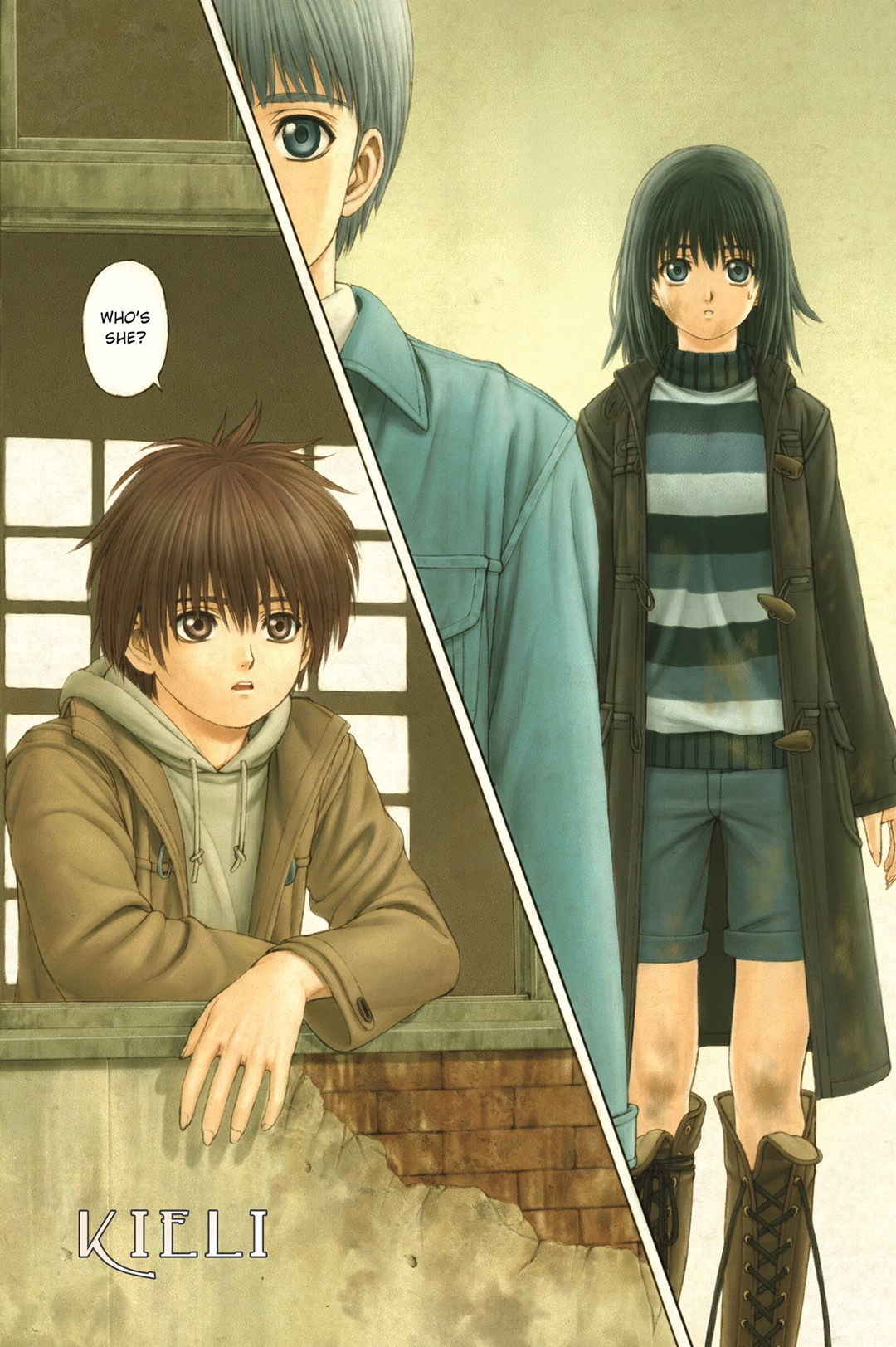
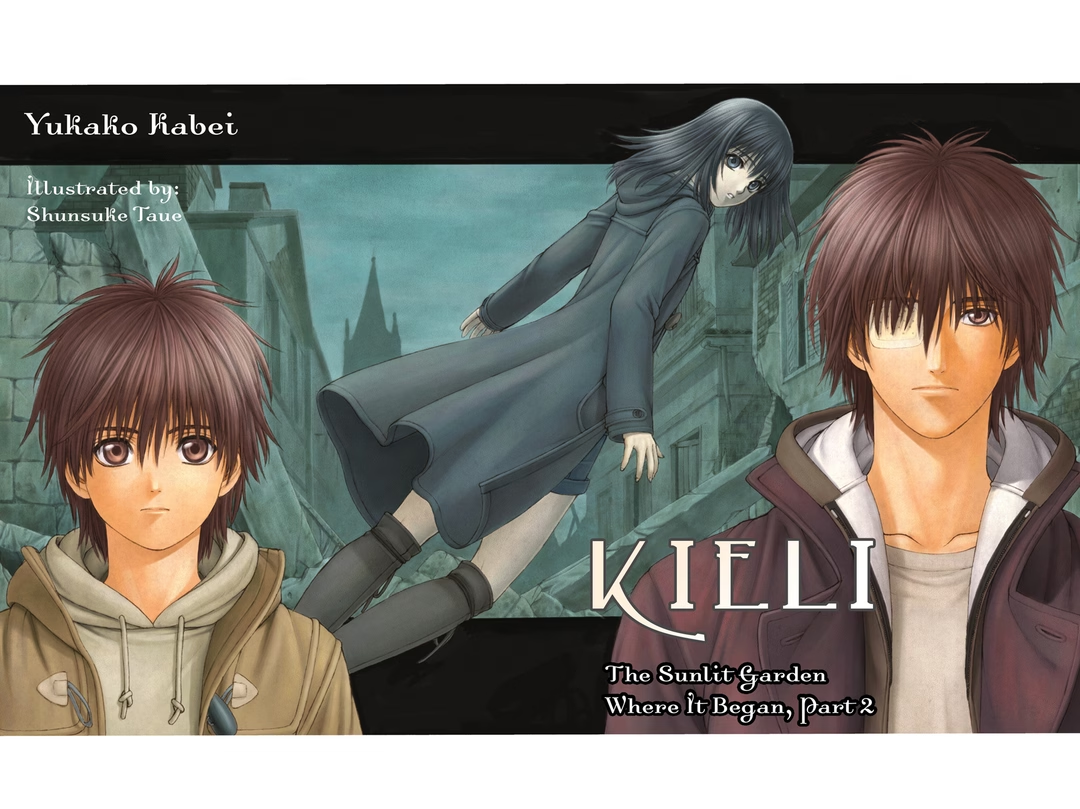
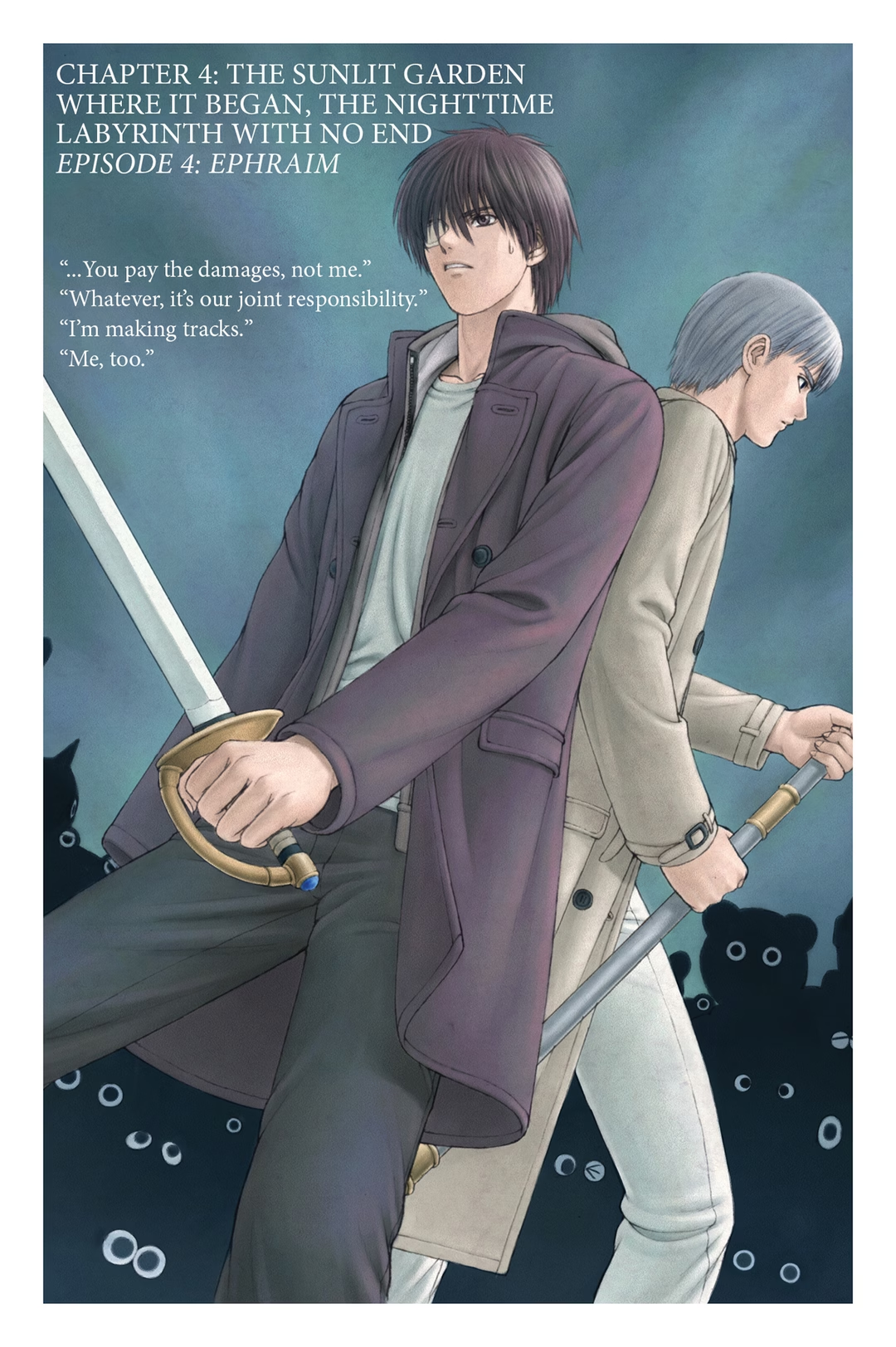
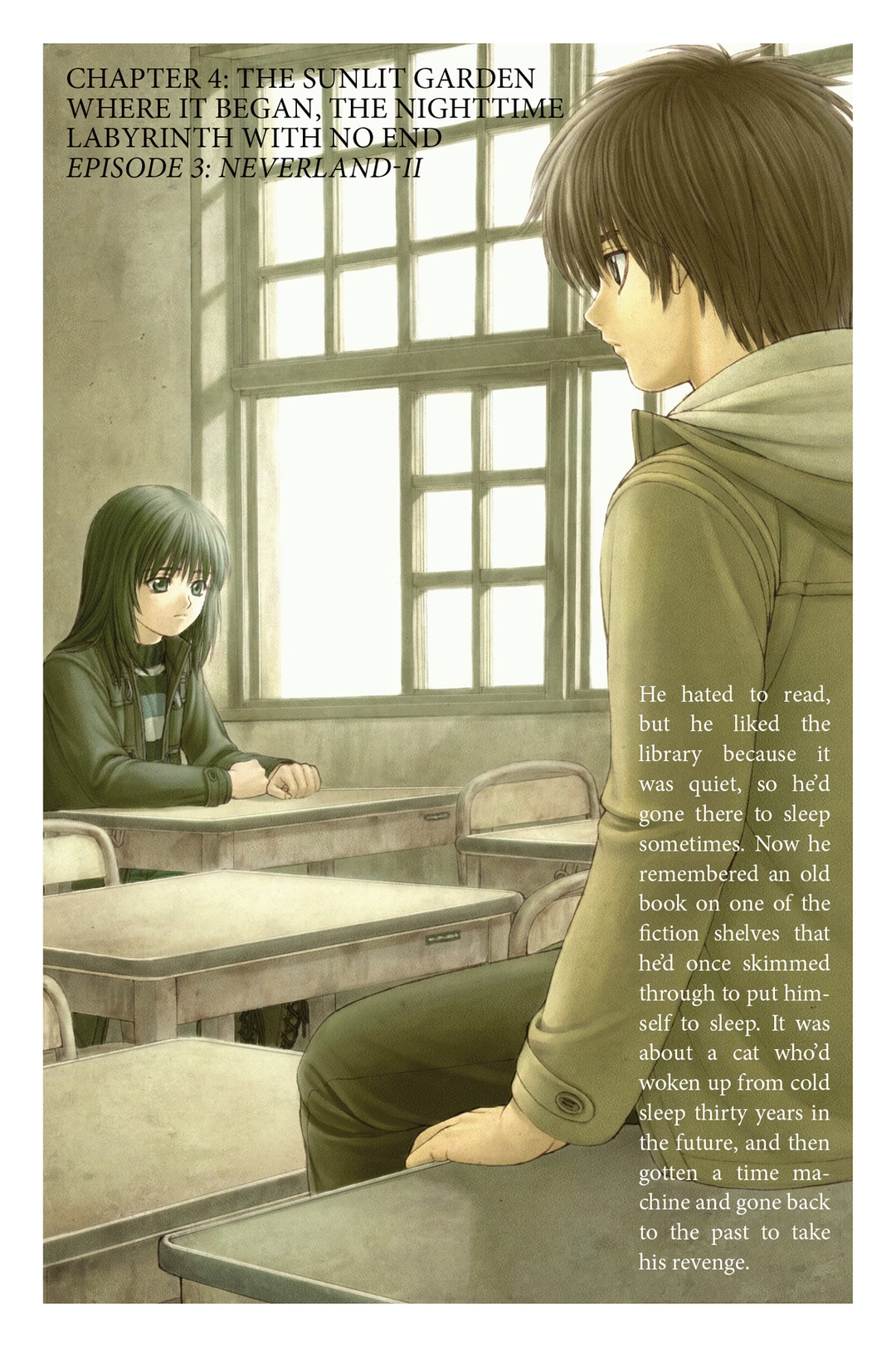
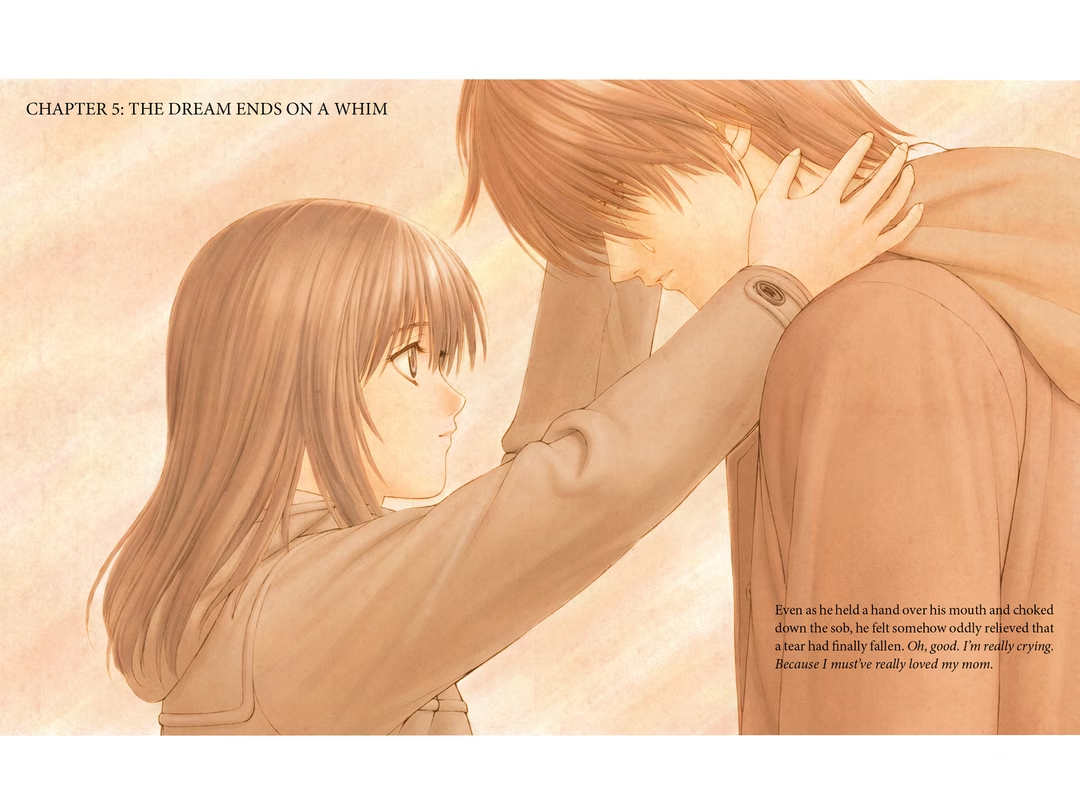
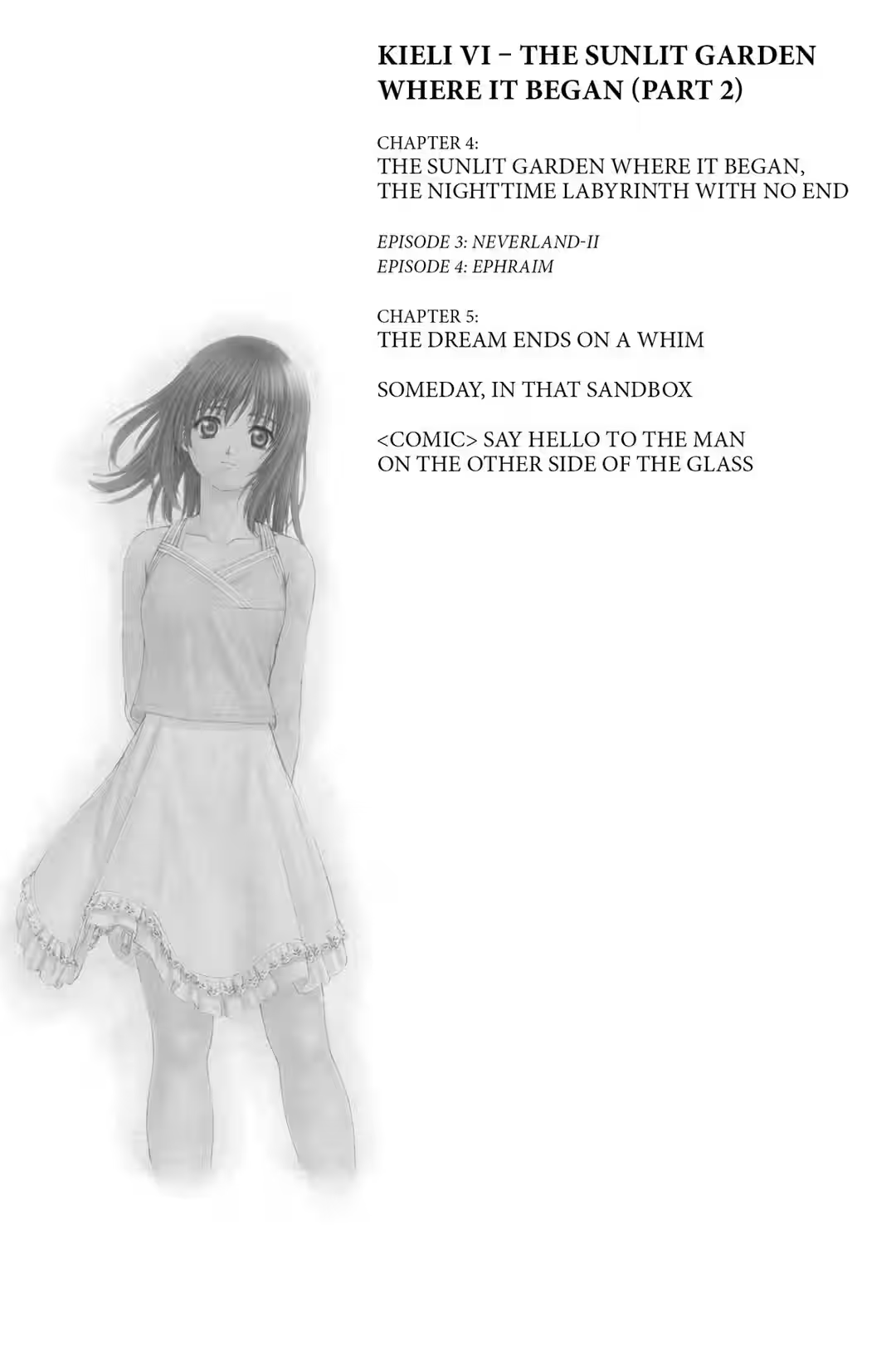

Episode 3: Neverland-II
We got word that your mother’s just passed away.
Wondering to himself whether he would have wanted to go home if he’d had any memories of his parents when he came back to life, Harvey suddenly remembered hearing someone tell him that.
He’d found himself thinking about the past a lot these last few days. Maybe it was Christoph’s influence. Defining “rebirth” just as the true first time—in other words, the time when he’d first become an Undying—he’d been sure he had almost no memories from before his rebirth. (He’d actually died and come back to life several more times after that, not that it was his favorite thing to think about, and he hadn’t lost any memories those times. He figured having your core taken out must be more like being in suspended animation.) And yet, when he finally buckled down after all these years and probed his mind for anything he might remember from before his death, he sometimes surprised himself by abruptly discovering new things—just fragments, tiny bits and pieces—buried down there near the bottom of his memories. It was like finding an old book that had been gathering dust in the basement for decades and then opening it, only to see all the pages fall out of its disintegrated binding and spill onto the floor every which way, so that he couldn’t tell what order they should go in anymore.
Still, he couldn’t find a single direct memory of his parents in the “pages” he’d gathered. But if he remembered someone telling him she’d “passed away,” that must mean that if nothing else, by the time he died his mother was already gone. In other words, going home had never been an option in the first place. He felt a little deflated.
He didn’t know exactly how old he’d been when he’d heard the news, but he got the impression he’d heard it at school, as a kid (even the fact that he’d gone to school was a revelation, although now that he thought about it, it was only logical). From what he could guess of the circumstances, his mother must have been hospitalized or something.
We got word that your mother’s just passed away.
The person saying it had been his homeroom teacher or someone, in a voice filled with sympathy. He didn’t remember what his reaction had been. Or rather, he got the feeling that maybe he hadn’t shown any particular reaction.
Anyway, that piece of his memory was fuzzy, and he couldn’t call up a mental picture of the conversation. There was just one scene that his memory did have full visuals for, though: himself, probably that same day, standing on the landing of the stairwell and silently crying. It was an oddly clear little picture, though faded. He’d gone through the whole day just like always, and then long after school let out, when the building was empty, he’d cried all by himself.
…Apparently that was the kind of kid he’d been. I could laugh; that sounds so much like “me.”
It was the eighth night of the Colonization Days holiday. There were only two more left. We should leave Westerbury the day after tomorrow, he thought, walking back into Shiman’s camp to find Nana standing under the light. She ran up to him as soon as she caught sight of him.
“Harry, welcome ba—”
But before she could finish, she tripped and fell flat on her face, squashing the radio around her neck, which cried, “Ow!” (as if it could possibly hurt!).
Fortunately, Nana bounced right back to her feet, so Harvey thought she must be fine—until he saw the blood oozing steadily out of some pretty amazing scrapes on both of her knees. He sighed and started walking toward her. Nana was standing in place, looking down at her legs with no reaction whatsoever; but as soon as he picked her up, her arms came up to cling around his neck and she started bawling, as if it had only now occurred to her.
“Talk about delayed reaction.” It kind of made him wonder if kids calculated the timing of their crying. Turning his face slightly away from the voice wailing right into his ear, he dropped his gaze to the radio squashed between them. “Where’s Kieli?” He got a burst of peeved static instead of a verbal answer. Apparently the Corporal had been ditched again today.
“Nana, what happened?”
Harvey looked up to see Nana’s mother running up to them from the trailers—she must have heard the crying—so he abandoned his conversation with the radio. “She tripped and fell.”
“Oh dear. I feel bad that you’re always having to help, but thank you.” As he relinquished the fussy child and lifted the radio off of her neck, he tried asking her mother instead.
“Isn’t Kieli here?”
“Oh, no, she’s not. I saw her leaving as I got back this evening.”
Harvey sighed. “Thanks…”
What is that girl doing…? He was about to walk away when a voice piped up, “She went to go see her man!”
Harvey turned to see five or six members of the troupe just making their way past him after cleaning away their card game. “I hear that passerby that helped her out the other day is pretty good-looking. You treat her so cold, she probably left you for him, huh?” teased Rat, wearing his usual grin. Behind him, Bearfoot paled and whispered, “Cut it out! I’m telling you, he’s scary…”
Before Harvey could say anything, a voice from the radio suddenly shouted, “What are you, stupid?! She would never—” He hid the Corporal behind his back and kicked him to shut him up, silently fuming, What’s gotten into you? You can’t talk in front of them! By the time he’d taken care of that, he’d forgotten what he’d intended to say to them, so his answer ended up just being “Huh.”
“‘Huh’?” Rat echoed. “That’s it?” He seemed disappointed.
“It’s not something for me to butt into,” Harvey spat, wishing they’d just give it a rest already. He was already stalking away by the time he’d finished the sentence.
He stopped to take a drink at the watering place out back and stuck his head under the faucet to wash his face while he was at it. He’d wanted to be alone, so it was a stroke of luck that nobody else was around—but since the radio took advantage of their solitude to launch a stream of complaints at him, it was hard to decide whether it was good luck or bad luck.
“The whole reason Kieli’s been acting weird lately is because YOU won’t take a line and stick to it, you know! Take some responsibility and try harder to find out where she’s going and what she’s doing!”
“Oh, not you too, Corporal…” Could he actually be taking what Rat said seriously? “She doesn’t want to tell me when I ask her, so what do you want me to do? Just let her do what she wants. It’s on her own head.”
“Do you actually mean that?”
“I told her to tell me if something happens. I’m not going to nag her anymore about it until she says something. She’s not a little kid anymore, so I guess she’ll take responsibility for her own actions.”
The radio gave a snort. “Yeah, you can try to sound wise all you want, but the truth is that you’re just afraid to get insistent with her, in case she calls you out for being a hypocrite.”
Harvey couldn’t think of any immediate reply to that. He froze there with the back of his head under the still-running faucet for a while before he finally reached up to turn it off, wrenching the knob more violently than strictly necessary. “…Shut up.” When he raised his head, he found himself more or less facing off against the radio, which was dangling off the pipe in front of him at eye level. Grimacing at the water that dripped down from his bangs, he shot the Corporal a hooded glare.
“Don’t blame it all on me. This isn’t about me—you’re feeling jealous because she keeps leaving you behind, aren’t you?”
He’d just said the first thing that came into his head, but apparently he’d been right, because after a short bark of static, the radio was the one to fall silent this time.
They glared sourly at each other, eye to center-of-speaker, before Harvey looked away with a sigh. It wasn’t as though the Corporal had been any less right about him, after all. It was true that the reason he hated interfering with people was that he didn’t want to be interfered with—and considering the way Kieli’d spoken to him last night, she’d definitely noticed that he wasn’t healing as fast as he should. He’d been a little unsettled by that, so when Bearfoot had shown up, he’d seized on the chance to end the conversation without ever asking where she was going.
He’d never thought he’d be able to hide it from her for long, but still, it had come out faster than he’d expected. Had he handed her direct proof, somehow? Harvey mentally tallied up his mistakes. Apart from getting called out on the cut he’d given himself bumping into that sign, he couldn’t think of anything in the last few days…
Oh, whatever.
Suddenly it was just too much of a pain to worry about it. He couldn’t change anything anyway.
Giving his face and hair a perfunctory wipe-down with the hood of his parka, he shoved aside all the confusion and forced his mind to go blank. When he looked up at the sound of running footsteps, a familiar face was just rounding the corner of the trailer.
“Mr. Harvey!”
“…You again?” And what’s with the “Mr.” all of a sudden? He glared out of the corner of his eye, and Bearfoot paled, losing all his momentum and cringing nervously. (Harvey didn’t think he’d particularly threatened the guy, but apparently Bearfoot was scared of him now for some reason.)
In no time, though, he recovered enough to burst out, “The leader says to come right away!”
“What for?”
“Just come on!” he cried, practically stamping his feet. Harvey traded an uneasy look with the radio as he unhooked it from the water pipe. Bearfoot, meanwhile, had already taken off running, seeming too impatient to wait even for that. He was trotting back along the trailer wall, and after a beat, Harvey followed. When he turned the corner, he saw a thin crowd of performers gathering in the clearing.
Harvey squinted into the darkness beyond the clearing and came to an automatic and immediate halt. Parked there with its headlights still on was a single light truck, its body painted a shade of black that melted into the night around them. Around the back stood two or three figures in white clerical robes.
Church Soldiers…What are they doing here?
When Bearfoot jogged up close to them, Shiman turned from a conversation with one of the soldiers.
“Harvey. Just get over here.”
Shiman had to know exactly why he didn’t want to get near any Church Soldiers, and he could hear that knowledge in the man’s voice, but the commanding tone made it plain he wasn’t going to accept a refusal. When Harvey stepped cautiously toward them, the soldier who’d been speaking with Shiman took a look at Harvey’s face (at the patch over his right eye, more like), and raised his eyebrows a little. “Oh, it’s you.”
There was the casually overbearing attitude that all Church Soldiers had, but Harvey didn’t sense any particular hostility in the way he talked. He rummaged through his memories, wondering if they’d met somewhere before, and just barely managed to fish the man’s face out of one of the many memories filed under “couldn’t care much less.” He was pretty sure this guy was that platoon commander who’d been at the station the day they’d arrived in Westerbury.
He looked questioningly at Shiman.
The only answer he got was a harsh-voiced question: “Harvey, why weren’t you with Kieli today?”
Harvey had no idea what that had to do with anything, and it sure as hell didn’t explain what he’d been called here for. He didn’t try to hide the irritation on his face as he said, “No reason…” Why was everybody ganging up on him about that today?
Shiman gave a displeased sigh and broke off the conversation for a minute to scatter the performers who’d come up to see what the commotion was. “You don’t all have to stick around here. There’s nothing to worry about, so just go on about your business.” He waited to turn back to Harvey until there were a few less eyes on them.
“Westerbury isn’t a carefree little place like those country towns you find east or south of here. You can’t tell me you don’t know how dangerous it is for a girl to go wandering around downtown at night by herself.”
“What are you talking about?”
“Kieli went downtown today, didn’t she?”
“…” That’s news to me. When he clammed up instead of answering, Shiman continued, admonishing him in a low voice.
“You’re the only one she has. Be responsible and look out for her.”
“Shiman, what are you talking about?” Harvey repeated, frowning. He was getting lectured for something he didn’t even understand without getting any answers to his own questions, and it was seriously starting to piss him off. “Do I have to know what Kieli’s doing every second of the day?” he growled, half to the troupe leader and half directing a protest toward the radio. “It’s not like I’m her guardi—”
Before he could even get the sentence out, a fist flew at his right cheek out of nowhere. His guard had been down completely, not to mention the fact that Shiman, who was right-handed, had deliberately come at him from Harvey’s blind side with his left fist; by the time he figured out what was happening, the blow sent him flying. Reflex kicked in before thought, and he shot his left hand out fast enough to keep himself from hitting the ground full-on, but he’d lost hold of the radio. It tumbled away along the ground.
“…Wha…?”
Never mind the pain or the rebellion some part of him must be feeling; for now he was mostly just feeling surprised at being punched. Propped there inches from a flat-assed landing on the ground, he raised his head and gaped blankly up at the other man. Shiman turned away without even sparing him a glance. Shaking out his left hand, he called out, “Bearfoot, you help carry her. You can put her in my truck.”
“Y-yessir!”
Bearfoot, who hadn’t gone back with the others, jumped up as if he’d been stung. Then he circled around to the back of the Church Soldiers’ truck, keeping the corner of his eye on Harvey all the while. Harvey heard him exchange formalities with the soldiers, and then before long he was climbing back down to the ground, carrying something big and heavy wrapped up in a blanket.
Shiman was still standing in front of him; over his shoulder Harvey saw the long black hair of the girl whose head was lolling on Bearfoot’s arm.
…He saw it, but that was all: His brain hadn’t caught up to his eye.
His mental gears had ground to a halt the second he’d been hit, and they wouldn’t start back up again. He’d missed his chance to stand up somehow, so he stayed sitting on the ground, watching the girl being carried away without any real reaction. Even when he saw the scrape on her cheek and the condition her clothes were in where the blanket didn’t quite cover them, for the moment, at least, he didn’t feel a thing. His eye was just superficially recording images.
After a small eternity the wheels began sluggishly moving at last, but one or two of them still didn’t quite engage…
And the first thing he registered was how grateful he was to Shiman.
If the man hadn’t hit him beforehand, he probably would’ve killed someone right then and there.

The park’s night watchman had found Kieli collapsed at the bottom of the footbridge, the Church Soldiers had been informed, and by sheer coincidence that platoon commander had been the one to respond. He’d recognized Kieli’s face, so she’d just been given rudimentary first aid and then transported to the camp. That much Harvey more or less grasped from the conversation Shiman and the others were having a little way off. But as he sat rolling the chipped-off fragment of one of his back teeth around on his tongue, about half of their words washed right over him without registering. He’d cut his tongue on the broken tooth. It hadn’t stopped bleeding yet, and his mouth was full of its bitter metallic taste.
The overhead light wrapped the rear of the truck in a dim glow. It wasn’t a wide space to begin with, and it was packed with luggage to boot. The truck Shiman called home was the only one to have a real, if simple, built-in bed: a perk of being troupe leader. Harvey crouched down next to it and gazed up close at the face of the girl lying on it. Though everything around them was bathed in yellow light, her scraped cheeks seemed to stand out, looking horribly pale. Suddenly Harvey felt uneasy. He touched her forehead with his left hand, and felt the relief come over him when he made out a faint but definite warmth there.
He didn’t care who’d found her. More importantly—
“…Who did they say did this?” he murmured without raising his eye. At the very edge of his peripheral vision he could see Shiman and the platoon leader, who were deep in conversation where they sat on the rim of the trailer bed, turn toward him. The platoon leader shook his head.
“They were long gone when we found her. I’m sure it was some of those downtown punks, though.”
“Huh. Downtown, eh?” repeated Harvey in an incongruously emotionless voice. That was all; he hadn’t said a word about what he planned to do next, but Shiman cut him off at the pass just as if he’d gone on speaking.
“Now look, you,” the troupe leader said sharply. “Don’t you even think about storming out there to find them right now, you understand? Stay with her.”
Harvey didn’t reply. Still without raising his head, he lightly brushed a lock of hair off her cheek. When he leaned his head in close, there was a sharp disinfectant smell. He touched his forehead to hers and mumbled, “I’m sorry…”
And that’s when he realized something was off.
He froze in that position for a few seconds before abruptly raising his head and staring hard again at the face of this girl who looked for all the world like she was just asleep.
“…Kieli…?”
Obviously there was no answer, but—something was wrong. “…Herbie,” whispered the radio he’d set on the pillow, pitched so that only Harvey could hear. He cast a sidelong glance at it, and they silently confirmed their thoughts with one another. Now Harvey was sure what was off.
She wasn’t there.
Somewhere behind him voices were exchanging pleasantries, and he could sense the two men at the truck entrance standing up.
“Harvey.”
At Shiman’s call, he finally turned to face them for the first time. The platoon commander had already left the truck and set off walking, but Shiman stopped in front of the entrance and jerked his chin, as though he wanted Harvey to come with him.
Harvey stood up without paying attention and whacked his head against the low ceiling. He didn’t react to that, though; he just started walking away from the bed, and then, a thought striking him, he leaned lightly back down and grabbed the radio’s strap. When he climbed out of the truck with it, Shiman was waiting outside. The troupe leader signaled with his eyes at the platoon commander’s robed back.
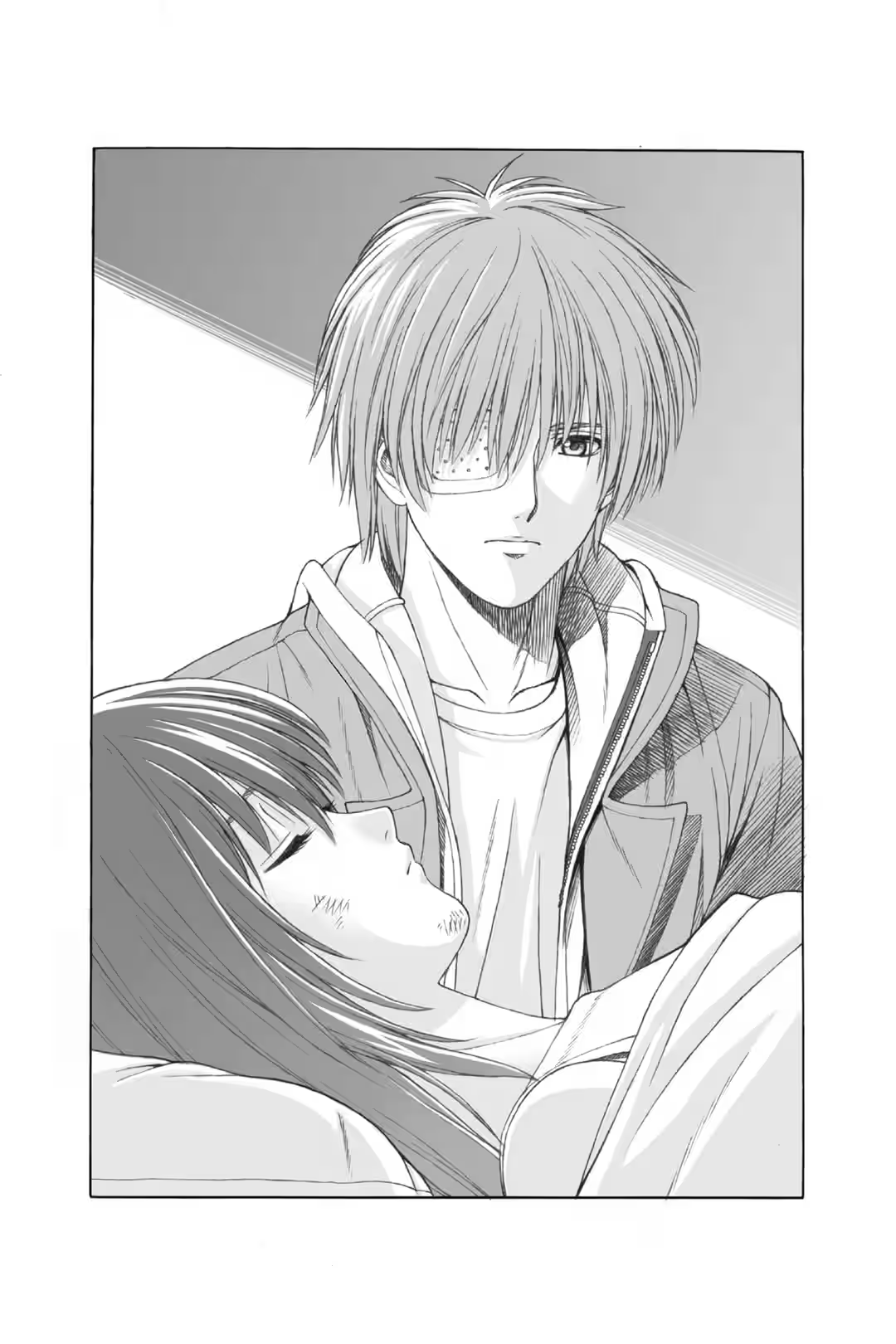
“We’re lucky; he’s a pretty understanding sort of guy. I’m going to the station with him for a bit while I’m paying my thanks. I trust I can leave things here to you?”
“Yeah. Tha—”
Halfway through the word, the pool of blood in his mouth got caught in his throat, and the thank-you he’d meant to say never came out. Instead, he coughed up a few gobs of blood and that shard of tooth; when Shiman looked down at them, his expression softened and he looked a little embarrassed.
“Sorry.”
“It’s fine,” Harvey said, shaking his head. He wiped the corner of his mouth with his coat sleeve. “Your hand’s probably worse off. You really let it fly.”
Shiman laughed, massaging his left hand. “Don’t worry about it. I’ve always wanted to try taking a swing at an Undying.” He flashed Harvey a grin. He might’ve said “Sorry,” but he sure didn’t seem particularly sorry. Not that Harvey could really say he cared.
“Good, so you can talk now. You’re sane, then?”
“Yeah…fine.”
Hearing the words out of someone else’s mouth, it finally hit him how normally he was managing to respond to conversation. Harvey’s head felt so clear it surprised even him.
“I’m fine,” he repeated, more definitely. A hand reached out and ruffled his hair—not a stuffed bunny’s this time, but a normal human hand. He was released quickly, and by the time he’d shaken his head and raised his eye to look, Shiman had already turned his back and begun walking away. Harvey could see the headlights of the truck that had brought Kieli here from where it was parked across the clearing.
After the sounds of several doors opening and closing, the beams changed direction and pulled away toward the camp exit to the loud accompaniment of fossil-fuel engine noise and tires crunching over rocky ground. But the sounds faded into the night even as he watched, and soon the usual faint white noise of the camp nights returned. The atmosphere in Shiman’s troupe’s quarters seemed a little strained now, but the other troupes were probably spending their night just like they always did.
As if to disrupt that peaceful silence, grating, ear-splitting static began to stream from the speaker of the radio dangling from his hand.
“…Who the hell did this?…I swear I’ll kill the bastard…!”
“Corporal,” he admonished quietly, but the static only got louder, and black particles spewed forth from the radio’s speaker in time with its snarling breaths, swirling together to form the face of an enraged soldier.
“Corporal, calm down,” Harvey repeated, sighing. “Don’t YOU tell me to calm down!” The fuzzy soldier’s mouth moved in concert with the howl of the speaker. “That’s why I told you to worm it out of her! This is all your fault for being so goddamn indecisive!”
“I know it’s my fault.”
“Then where do you get off looking so calm and—”
“Shut up and calm the hell down!” Harvey shouted back abruptly, jabbing his fist straight out to the left and slamming it into the side of the truck. The impact made a resounding bang and rocked the whole vehicle. A split second later the body of the radio swinging from his hand by its strap crashed into the wall, and the noise-cloud scattered like a swarm of insects dispersing.
The static cut off. Suddenly the mood was broken, and everything around them was quiet. Harvey stayed stiff for a while, clenched fist still pressed into the truck wall. Then:
“You calm now?” he muttered in a low voice.
“…Yeah.” The radio’s voice answered him back in the same lowered tones, and at that Harvey finally peeled his fist away from the wall and lowered his arm. The wall was more than a little warped, and some of the paint had come off, but it was an old truck to begin with. Probably nobody would notice as long as he didn’t say anything. A little of the radio’s paint had peeled off too, bringing it that much closer to junk.
Any other day, the girl sleeping in the truck might’ve jumped awake in a panic, but fortunately—if “fortunately” was a word he could use for this—there was no sign of her stirring.
Harvey’s left hand began to throb insistently. Maybe he’d cracked a bone. He didn’t shut out the pain, though; he just let it be.
“I’m heading out to look for Kieli. You stay here.”
“Don’t be stupid! Of course I’m coming with—”
The radio’s anger was rising again, but Harvey cut it off. “Somebody’s got to keep an eye on this one too, and you know it,” he reasoned quietly. “I’m asking you because you’re the only one I can trust.”
There were no more objections after that.
His left hand throbbed. When he clenched it into a tight fist it hurt even worse, but in exchange his mind cleared. Harvey felt as though he should probably be surprised at how coolheadedly he was managing to think right now.
Perfectly coolheadedly—
For maybe the first time he could remember, he was very seriously thinking about how to best kill someone he’d never even seen.

Kieli had entered boarding school the spring she was eight years old, when her grandmother died. Up until that point she’d never been to a real school; she’d just gone to a Church “playscheme” program two or three times a week. Considering that she’d been plunged into third grade with so little experience, not to mention the fact that (and this was probably the more important reason) she’d begun to grow introverted pretty much overnight, it seemed only natural that she’d had a hard time making any friends.
Now she found those memories springing to her mind as she walked slowly down the corridor, killing time.
She’d been far shorter than the average child; she remembered the top shelves of the lockers, the latches on the windows, and the flyers on the bulletin board all being too high up for her to reach, even when she stood on her toes. But now, walking down a hallway of classrooms for about that same grade level, everything was within easy reach. Nothing came higher than chest level.
Kieli’d come to this school just a few hours earlier, so it shouldn’t have held any memories for her, but for some reason the smell of it made her feel nostalgic. The long corridors, the dusty overhead lights, the thin tin-plated lockers, the bulletin board covered with ragged posters—they were all old and faded, but it was easy to tell that they’d been well loved and well used for many years. It all made for a tender scene that harmonized with the sandy sky outside the windows.
While she’d been getting her scrapes disinfected in the nurse’s office earlier, she’d heard a little bit about this ruined city and the school. (And “a little” really meant a little…the redheaded boy didn’t particularly like explaining things. Kieli couldn’t say that was unexpected.) Most of the students had evacuated once the street fighting had gotten worse. There were less than ten still at the school, all of them orphans. There wasn’t a single teacher left, either. A school where children lived all by themselves…
And apparently this place really was South Westerbury after all. But in the South Westerbury Kieli knew, the War had ended long ago, and there was a theme park standing over the ruins of this city.
I…guess I must be a wandering spirit now, huh…
The other Kieli lying on the ground hadn’t looked dead. She hadn’t exactly observed things very carefully, since she’d fled in confusion almost right away, but that Kieli hadn’t seemed obviously dead to her like the corpses of those soldiers she’d seen in the ruins. The spirit leaving the body—after Bearfoot had told her about his ability, it had occurred to her that she might have it, too; so, since getting here, she’d been figuring that maybe she’d unconsciously done it. Half figuring, and half hoping like mad.
Still, that didn’t explain what this space she was in now was…
When she ran her fingers over one of the hallway’s window frames, it felt cold and real. She’d gotten her wounds treated just like normal, too. The antiseptic had stung, and she’d cried out a little before she could stop herself.
She could understand that this was apparently the town back in the War era, but she had no idea what’d happened, what kind of space she’d wandered into, how to get home, or even if she could get home.
Harvey…I want to go home…
Thrusting her hands into her coat pockets, she trudged down the hallway with her head lowered. Now that she’d noticed how oversized her sixteen-year-old self was for the younger kids’ hallway, alongside the nostalgia came a feeling that she was a lone outsider, alienated from this place. It made the at-loose-ends feeling even keener.
“Aw, isn’t it time yet?”
“Just a little longer!”
Bright, excited voices and a warm, milky scent wafted to her from the other end of the hallway. Kieli lifted her head to see a sliding door a little way in front of her. It was wider than the normal classroom doors, and above it was a green sign with the word LUNCHROOM painted in white ink.
She walked past it and peeked quietly inside through the open hallway window.
“Yay, it’s got milk in it today!”
“It’s for our guest.”
“You’re in the way! If you’re going to stand there, carry that for me.”
There wasn’t much equipment left in it, but it seemed to be a kitchen, just as the sign had said. Five or six kids were pushing at each other as they gathered in front of a stockpot on a commercial stove that stood a little too high for a child to use.
At first Kieli thought they must all be working together to cook, but when she looked closer she saw that only about two of them were actually working; the rest were just chatting or peering into the pot and trying to sneak a taste. Aluminum bowls filled with milky-white soup were crammed so closely together on the counter that they rattled against each other, and the one on the end looked so much like it was going to fall off any moment that Kieli found herself getting anxious.
“Hey, Sarah’s putting more of the good stuff in Joachim’s soup than anyone else’s!” teased one of the younger boys.
“Cut it out, that’s not true!” the girl standing at the pot doing most of the work denied, red-faced. Kieli figured she must be in sixth or seventh grade. Her shyness was so cute that Kieli forgot the circumstances long enough to let out an embarrassed laugh of her own.
“Joachim”…they must mean the same Joachim…
She remembered the corpse-robbing boy who’d brought her here from the ruins of the battlefield. He’d certainly had the same cold blue-gray eyes as that Joachim.
And then there was the other one…
“Tick, tock, tick, tock!” Kieli heard an excited young voice sing to herself. She tore her eyes from the lunchroom and turned around to see the redheaded boy and the girl he’d called Elisha walking side by side up the hallway. Big bandages adorned the bare knees that peeked out from under Elisha’s jumper. Ephraim had patched Kieli up first without giving her any choice in the matter and then kicked her out of the nurse’s office, which was the whole reason she’d been wandering the hallways at loose ends.
“Tick, tock, tick, tock!”
Elisha had been crying just a little while ago, but it seemed like she was as good as new already. She was stressing the rhythm of the “tick, tock” bit a little and half-marching to the sound of her own voice. One foot lifted high in the air on each “tick,” and on the “tock” it hit the floor with a loud stomp. Kieli thought that would’ve made Elisha’s legs hurt more, but she didn’t appear to mind.
“You’re making too much noise,” criticized her companion, scowling. Elisha stopped singing and turned to look up at the taller boy next to her.
“When will the school clock stop, Effy? When the old incimmerator man dies?”
“‘Incinerator’…you mean the janitor? He’s been dead for ages.”
“So who has to die for it to stop?”
“Uh…”
The boy was stuck for a reply, and his fed-up expression and the way he let his gaze wander away from her were both exactly the same as Harvey’s reactions whenever Kieli asked him a difficult question. She pegged him as an eighth- or ninth-grader. He was about the same height as the boy Joachim; in other words, not too far off from her own. That made them average-sized for boys their age—a little smaller than average, in fact. Kieli’s imagination couldn’t even connect them with the two tall men she knew.
I wonder if they’re going to hit their growth spurts now, she mused idly, and then realized the situation she was in. A chill ran down her spine.
Decades in the past for Kieli, but probably several years into these children’s futures, Ephraim and Joachim had already died in battle…
“Food! Food!” caroled Elisha to exactly the same tune, stomping into the lunchroom. Only the “tick, tock” lyric had changed. The boy Ephraim watched her go with a resigned look; Kieli stood dumbly at the lunchroom window; and somewhere in there, their gazes met.
It’d been a long time since she’d seen both of those copper-colored eyes. That and a jumble of other things in her mind made her weirdly nervous. Eventually she figured she should at least thank him for patching her up, so she said flusteredly, “Um, thanks for before.”
“Eh, I had to clean up Elisha anyway.”
Yep, that was exactly the curt response she’d expected.
Glancing at the younger kids in the lunchroom over his shoulder, Ephraim lightly sat himself down on the hallway windowsill. “I’m the oldest one left, so for some reason these guys treat me like the leader,” he grumbled, with the air of someone deliberately making excuses. “Even though Joachim’s the exact same age!” Then he started fumbling around in the pockets of his duffle coat. Kieli was a little surprised to see him pull out a pack of cigarettes.
“I didn’t know you started smoking so young,” she said, and then panicked a little because it kind of came out sounding as if there was something behind it. But no, it probably wasn’t that weird a thing to say, as long as she didn’t make a big deal out of it…The boy didn’t seem particularly suspicious. He just nodded, drawing a cigarette out of the pack with his mouth.
“Yeah. I get can ’em from the soldiers sometimes. Half I sell, half I keep for me.”
“You get stuff like that from soldiers? Aren’t you scared…?”
That question got her a more dubious look than the first one.
“What good would it do to get scared? It’s a way to make a living.” This must be a matter of course to the kids in this era.
He proceeded to light the cigarette with a small cylindrical lighter that Kieli guessed was army issue too. The sounds of the little kids horsing around in the lunchroom wafted through the window from behind him. There was silence for a few moments, and Kieli watched, again a little anxiously, as more soup bowls were precariously lined up on the big counter in the middle of the kitchen.
“Next year,” murmured Ephraim as he blew out a stream of smoke, in the emotionless way that was so familiar to her. “Next year, Joachim and I will be soldiers. I mean, we’ll get paid, and we probably won’t die, but I kind of wonder what’s gonna happen to the runts after that.”
“Soldiers…you mean you’re going to war?”
“What else is there?”
He said this as though it should’ve been obvious. Without thinking, Kieli cried fervently, “N-no, you can’t! You’ll die!” Then she clicked her mouth shut, surprised at herself. Ephraim gave her a bewildered look.
…Was there any point in telling this boy that he’d die if he went to war? In the “present” that Kieli knew, that was a factual event that had been over and done with long ago—and she couldn’t even say for sure whether this place was really connected to the “present” she’d come from anyway.
“You’re weird,” said the boy Ephraim, furrowing his brow at Kieli and giving her an openly dubious look. Well, she had burst into a passionate appeal and then abruptly clammed up, so she couldn’t really blame him. Then he smiled a little, something striking him. “I won’t die. It’ll be fine.”
In the face of that totally normal, unguarded smile, Kieli felt her heart jump in spite of herself. While she was lost in the silly thought that Harvey might look cute wearing the same expression, Ephraim was bending his upper body backward through the window to look into the lunchroom.
“Something smells gross. What’s in today’s soup?”
“Milk and chickpeas,” answered the girl on meal duty as she put a slice of bread next to each soup bowl. She said it with an air of pride, so maybe that was fancier than what they usually had. Ephraim didn’t seem impressed. “Don’t put milk in it!” he griped, face twisting. The younger boys who overheard seized on this and instantly began to jeer.
“Ephraim, you’re too picky!”
“You shouldn’t skip your milk just ’cause the teachers aren’t here!”
“That’s why you’re so scrawny, you know!”
“You’re scrawny!” Elisha chimed, though Kieli was pretty sure she didn’t actually know what “scrawny” meant. Now even the littlest girl was ganging up on him…
Ephraim frowned around his cigarette. “Shut up! I’m not getting gum for you guys anymore.”
“You’re being a ty-rant just ’cause you’re older!”
“He’s a des-pot!”
“Come on, guys, be quiet. The food’s all ready, so go get everybody, okay?”
Unrelenting noise that made her want to cover her ears. Was this how loud a normal coed school was? The chatter of the girls at the boarding school had been deafening too, of course, but everyone’s voices had been relatively similar in tone, so it had never turned into a grating jumble of different noises like this.
While Kieli stood wincing at the racket so loud it spilled all the way into the corridor, Ephraim turned back to her one more time and jerked his chin toward the sliding door with the LUNCHROOM sign. “Go around that way.” Not that he used the real entrance himself—he just hoisted his legs over the windowsill and hopped down on the other side.
Kieli obediently started moving toward the door before changing her mind and copying Ephraim instead, putting a foot to the window frame with a grunt. She’d wanted to try this ever since boarding school, after all.
After she’d gotten over the sill and hopped down into the lunchroom, she heard a voice behind her say, “Something smells gross.”
Kieli turned her head. A boy with blue-gray eyes was peering in through the window, nose twitching. Kieli reflexively flung herself backward to get some distance between them. He only spared her a glance before returning his gaze to the center of the lunchroom.
“What’s in today’s soup?”
“Milk and chickpeas,” repeated the girl on serving duty. The boy Joachim’s face twisted. “Don’t put milk in it!” he griped.
The younger boys who overheard said in chorus, “Joachim, you’re too picky!”
“Shut up!”
Watching this exchange, Kieli burst out laughing before she could help it.
“What?”
“N-nothing.” Fixed with a piercing blue-gray glare of displeasure, she ducked her head and bit back her laughter. It took some work to control the twitching of her cheeks for the next little while, though. These two react the exact same way…
“This way, miss. If our guest would please follow me?”
Beckoned a little self-importantly by the cook, Kieli awkwardly let herself be urged toward the head of the counter and placed in what seemed to be a sort of “birthday-girl seat.” The other children all gathered around the counter full of bread and soup, too, dragging stools with them. Apparently, this was where they usually ate.
They were more or less seated by age: To the left of Kieli’s seat of honor was Ephraim, and the kids after him were in order by grade level right down to the last seat by the door, where Elisha sat as the youngest. And next to her, diagonally from Ephraim and totally out of grade order, sat Joachim. This must be the seating arrangement they’d settled into naturally; the one that felt best to everyone.
As soon as they were all seated, everybody closed their mouths, and the room fell so silent that all the ruckus of moments ago seemed unbelievable. There was a slight tension in the air, as if they were waiting for a signal.
The girl on lunch duty looked at the oldest student and said, “You’re not going to pray today, either?”
“Nope,” Ephraim replied without hesitation, jamming his cigarette butt into an empty can. She looked somewhat unhappy with him, so he added irritably, “It’s fine. There aren’t any adults here.” He picked up his spoon, propped his elbow on the counter, and started shoveling soup into his mouth.
There wasn’t even a “Let’s eat,” let alone a prayer, but apparently that was the signal, because the other kids all made little happy squeals and reached for their own spoons to begin the meal. Utensils clinking noisily against each other, chattering voices talking with their mouths full—the quiet had reigned for only a few seconds before, in the space of a blink, all the previous war-zone-level clamor returned to the lunchroom. Kieli found this mealtime scene so staggering that she forgot to eat her own soup and just gaped in wonder for a while.
“Aren’t you gonna eat?” asked Ephraim, glancing sidelong at her from his neighboring seat. (He really did seem to hate the milk soup, but he was grudgingly swallowing it down anyway, chasing it with bread to cut the taste, as if he refused to let a little unpleasantness make him skip a meal.)
“Oh, right, thank you for the food,” said Kieli, and hastily picked up her spoon. She was pretty sure she was the only one of them to give the customary thanks.
Feeling cowed by the high spirits of everyone around her, Kieli scooped up a spoonful of soup and brought it to her lips. She let it linger on her tongue before she swallowed, but it was so thin and powdery that she couldn’t really tell what it tasted like. Compared to the signature dish at Buzz & Suzie’s Café in South-hairo, a thick milk stew of poultry, eggs, and chickpeas, this was practically just flour and water.
When she glanced up, though, she saw that the cook and the smaller kids were all looking at her as if they were gauging her reaction.
“…It’s good,” she said. It wasn’t, at all, but she faked a smile before even thinking about it. Growing embarrassed, Kieli looked back down at her soup and stirred it pointlessly a few times before lifting the next spoonful to her lips.
A drop of water splashed down onto the surface of the soup there, making tiny ripples.
“…Kieli?”
The lively atmosphere abruptly chilled over.
“Is something wrong…?”
“Did it taste that bad?”
“Oh—I-I’m sorry…!” Kieli excused herself, quickly wiping her cheek. But the tears just kept welling up, and they wouldn’t stop coming. “I’m sorry, that’s not it…” The perplexed gazes of the children all concentrated on her as she covered her mouth with both hands, one still clutching the spoon, and did her best to hold in the wail. No, I can’t cry here…
Then Ephraim was leaning his own cheek on the counter to peer up at her face from below. “Does it have something you hate in it?”
“You don’t have to eat it!”
“No, I—” Kieli’s voice stuck in her throat before she could finish the denial, so she looked at her feet and just shook her head over and over. Those eyes on hers now, those eyes the same color as Harvey’s, made it even harder to control herself.
This was a place Kieli didn’t know. It was an era of people who’d lived through or died in wartime, long before Kieli had ever been born—
“…I want to go home…”
The murmur came out in the feeble voice of a lost child. She’d killed the wail threatening to escape, but now she was blubbering. She’d choked down that wail too hard. Now her lungs smarted.
Eventually Elisha started crying in fretful sympathy, and then even the rest of the younger kids’ chins began to tremble. The whole lunchroom felt as though they were in the middle of somebody’s funeral, but they all polished off every last bit of their bread and soup all the same.

Ephraim’s mother died right after he turned thirteen. The conflict between North and South Westerbury was still going on, but the street fighting wasn’t too intense yet; schools and city buses were still functioning more or less normally.
He didn’t have any particularly happy memories of his mother. She was a sickly woman who’d never had strong nerves or a strong body, but after they had gotten word that his father, who’d been away fighting the War for a long time, had died in battle, she’d gotten even worse. From then on she rarely left her bed, and she spent the last month of her life in the hospital. He remembered two visits to her there. The first time was when he’d gone to fill out the hospital’s admission paperwork, and the second time was a full three weeks later, when on his way home from school one day he’d boarded the bus to the hospital on a sudden whim.
His mother was sitting in bed, propped up with pillows, and she looked far thinner than she had three weeks before. Her twin plaits of coppery hair were so dry that he half-thought they’d crumble like ash if he touched them. He drew up a chair, not to the side of the bed but to a little ways away, by its foot, and sat down. He’d come all the way here, but he didn’t have anything in particular to say, so time marched on in silence. There was another patient sharing her room; on the other side of the curtain that divided their beds, that patient’s child was spiritedly reporting the goings-on at school. Ephraim wondered if he should talk about that kind of stuff, but he got the feeling that would be even more unnatural than the quiet. He didn’t remember them ever talking like that when they were at home.
About twenty pointless minutes passed like that. Just when he was starting to think about heading home, even if he still hadn’t said anything, his mother broke the silence to ask quietly, “Why did you come to visit…?”
He stared back at her blankly, wondering why she’d ask him something like that. She kept her eyes on her hands where they rested on the blanket (he remembered her eyes as being a fairly plain brown color; he had plenty of red pigment in not just his hair, but his eyes, and someone had once told him that when he’d first opened them as a baby, his mother had been half-crazed with shock) and said, “I thought you hated me.”
“…Why?”
It was the first thing he’d said since coming to her sickroom, and the first thing he’d said to his mother at all in a long time. He’d always thought that if anything, he was the one she hated.
She didn’t answer him, but after a little thought, he could come up with several reasons. Compared to his friends’ families, they certainly weren’t a close family. In fact, an outside observer might have described them as a broken family. He got up on his own every morning and went to school without eating anything much, and he had never come home to find dinner waiting, either (which meant that in his home there’d never been a custom of praying as a family before meals). And his mother spent most days moping in her bedroom, so even when he was home he’d never had much of a conversation with her. They were managing to make ends meet on a subsidy, but he was the one who’d gone to fill out the application for it.
Still, though, life with that kind of mother was completely normal for him, so he said in a normal voice, “Because you’re my only mom.”
His mother didn’t respond or even look up, so he fell silent again, wondering if he’d upset her. After a while, he realized that her hands were trembling slightly where they gripped the covers. Thin, skin-and-bones hands, and thin shoulders he could make out even through the cardigan she wore. Belatedly, he registered just how thin she really was. He thought for the first time that maybe he should’ve visited a little more often.
“I’m sorry, Ephraim…”
Transparent tears pattered down onto the backs of the fragile hands on her blanket.
“I’m a failure as an adult…I…I couldn’t do anything for you…”
“Yeah…I’m sorry, too,” he said in the same normal voice. Ephraim wasn’t in the habit of being hugged by his mother or anything like that; they’d hardly ever touched. But just hearing her call him by his name for the first time in a long while was enough for him. At that point the day became a pretty happy one.
And that ended up being the last time his mother ever called his name. A week later, at school, he was notified of her death.
Because you’re my only mom.
He hadn’t thought much about the words before he’d said them. They’d just been what had come out of his mouth at the time, but now they bounced back to him as something to reproach himself with.
These runts have lost the parents they ought to be relying on, and now I’m the only one they’ve got…Well, even assuming he split the duty with Joachim, since the idea of taking everything on himself irritated him.
“…?”
Seized by a sudden sense of déjà vu, Ephraim looked up.
His eyes traveled to the wall clock above the chalkboard without any real thought. It was the analog clock type: a round face with its circle of unfriendly black numbers, framed by a black rim. It was just about as far from “personality” and “decorative flair” as you could get and still be in this universe. 52, 53, 54…The slightly warped second hand crawled oh-so-slowly around the yellowing clock face, marking a sluggish time. 57, 58, 59—
The minute hand clicked forward, and according to the time system of a faraway planet that had been in use here since the colonization era, it was 2:57.
…What was that? He felt as if he’d lived that exact same moment before—No, this is wrong. It wasn’t the déjà vu itself that bothered him; it was the fact that the déjà vu felt off. That it felt like something was mixed into the déjà vu that wasn’t supposed to be there.
…What the heck does that mean?
He frowned in confusion. He didn’t even understand what he’d meant in his own head. There was no such thing as déjà vu that looked different from what it was “supposed to” look like. You wouldn’t even call that déjà vu to begin with, would you?
He reached for the cigarettes in his pocket, and then remembered that the one he’d smoked in front of the lunchroom a little while ago had been his last one. I’ll go get the butt from the can later. Feeling somehow as if he didn’t know what to do with himself, he sat on the teacher’s desk and swung his legs back and forth, gazing at the white chalk scribbles that filled the board in front of him.
“Today Sarah and Nahar are on duty!” “←That’s wrong! Seth changed it!” “Elisha had another ‘accident’ today!” “No I didn’t!” “Ephraim and Kieli were kissing in front of the lunchroom!” “Attention: No soccer allowed today!” —And there was more: drawings, like the one of the twisting railroad line that ran from one end of the board to the other, and the ones of what he could only assume were girls even though he got the feeling the human body didn’t actually work that way, and that tiny little note in the corner—
“Please let the War end soon so we can go home.”
He didn’t know whom that faint, unpracticed handwriting belonged to, or when that sentence had been written there. But for some reason, no matter how many times new doodles got drawn over the old ones, that one note was always left alone.
When he stretched out his right hand and rubbed at the board with his palm, he smeared part of the railway sideways. Chalk dust stuck to his fingers. He thought he’d scribbled something here, too, but he’d forgotten which one was his. It must have been one of these. Any of them but the Please let the War end soon one. He didn’t have a place to go home to anymore.
In the afternoon the classroom was quiet. Quiet, racking sobs could be heard behind him up until just a little while ago, but apparently somewhere along the line that had settled down.
He twisted lightly at the waist to look back at the classroom. A black-haired girl was sitting all alone at a desk three rows from the window—he didn’t remember whose seat that had been, but it was the one with the marks where somebody’d carved a short word (probably the name of a girl he liked or something) with a utility blade and then scraped it away. He pegged her as a year or two older than he was, but ducking her tearstained face and shrinking in on herself like that she looked awfully helpless, and against his every inclination he found himself feeling about her almost the same way he felt about the runts.
“You okay now?”
She nodded awkwardly. “Sorry I acted so pathetic…and when I’m older than everyone here, too…”
“Eh, don’t worry about it.”
She’d burst out crying in the lunchroom, but the kids here weren’t a sensitive enough bunch to stop mealtime for that, so they’d all sat through the uncertain mood of the room and finished their food before doing anything else. Afterward the runts had left to finish their soccer game (they were making a racket in the classroom, so he’d told them to clear out). From outside the wide-open window came the chilly late-autumn air and the innocent whooping of the young boys playing in the schoolyard below.
He might feel a certain responsibility for the runts here at school as the eldest of the students, but he sure as hell didn’t owe anything to this girl who’d crashed into their lives out of the blue. And anyway, Joachim was the one who’d brought her here in the first place, which meant he didn’t have even the tiniest reason to look after her. He should just leave her be.
After he’d silently chanted Leave her be to himself about five times, his shoulders slumped and he heaved a long sigh. He disgusted himself sometimes.
Ephraim swung his legs around to the other side of the desk and sat facing the opposite direction. “Where’d you come from? I’ll take you back.”
“…I don’t know how to get back.”
“‘How to get back’?” He didn’t really get what that meant. “Is it far away? Don’t worry about it. There are still cars that’ll run back at the ruins. I can’t drive, but Joachim can, so—”
“That’s not it,” she interrupted him in a slightly louder voice. Blankly, he stopped talking. The girl looked up through her eyelashes to search his face, then let her gaze fall back down to a spot on the desk near the old carving.
She went on haltingly, carefully, as if she were telling herself the facts more than him.
“In the Westerbury I’m from, the War’s been over for decades, and it’s peacetime now, and there’s no army, and they built a park with a clock tower on this spot, and it’s a town of clockwork dolls, and there are never lots of dead people lying in the streets or anything, and…”
She paused.
“I…know a red-haired man named Ephraim. A long time ago, in the War, he…” At that point the girl faltered, and a short silence fell.
Tick, tock, tick, tock…
Mixed in with the cries of the boys chasing after their ball, he could pick out snatches of timid singing. It was a lispy girl’s voice. Must be Elisha. He could picture the youngest girl in his school squatting underneath the chin-up bars, drawing a picture in the sand there and crooning her favorite phrases from the song in clumsy but clear tones.
He glanced at the seat by the window, a bit baffled.
“Um…” Are you all right in the head? he almost asked, but she seemed so completely serious that he couldn’t help hesitating. He didn’t quite know how else to respond, though.
He hated to read, but he liked the library because it was quiet, so he’d gone there to sleep sometimes. Now he remembered an old book on one of the fiction shelves that he’d once skimmed through to put himself to sleep. It was about a cat who’d woken up from cold sleep thirty years in the future, and then gotten a time machine and gone back to the past to take his revenge (or something, he might have the details wrong). Okay, forget that for now. A part of his mind started trying to remember if the medicine or psychology shelves had any books on habitual delusions or pathological lying or anything.
“Erase that,” said a grumpy voice somewhere out of his line of sight. He turned to find Joachim standing outside the window that opened into the hallway.
“‘That’?”
“That.”
He followed the direction of that slate-gray gaze, looking over his shoulder at the scribblings on the chalkboard, but he couldn’t tell right away which one the other boy meant. After he’d let his gaze wander around the board for a while, the “Ephraim and Kieli were kissing in front of the lunchroom!” caught his eye.
He blinked and looked back at Joachim. “This?” he asked.
“No—huh?” Now it was Joachim’s turn to blink. He looked as though he’d been tricked somehow. “What was it again? It’s nothing. But I thought there was something…” What the heck does that mean?
This scribble…was this always here? Ephraim had seen it, but it hadn’t registered in his brain until now. While he tilted his head in confusion, Joachim propped his elbows on the window ledge and asked, “So, were you really, then?”
“No, we weren’t.”
“Right,” the other boy retorted, grinning.
Ephraim grabbed a piece of chalk and threw it at him. “No we weren’t!”
“Okay, okay. You’re so violent.” Somebody’d probably written it there to hassle them. Seth or one of his buddies, most likely. Sheesh.
He shot a glance at the girl sitting by the schoolyard-facing window, and they exchanged uncomfortable looks. He quickly averted his gaze. He swung his legs around again and faced back toward the chalkboard to look around for the eraser. Not finding it, he just rubbed out the names with his hand.
Joachim only watched silently, still not saying anything even after Ephraim had finished, so after a pause Ephraim turned around and said without thinking, “That’s all?”
Joachim frowned suspiciously. “What, is there supposed to be more?”
“What about the tanks?”
“Tanks?”
“No…what did I mean again?” Why did he have tanks on the brain all of a sudden? He’d been the one to bring them up, but he didn’t know what he’d meant. Something at the back of his mind was bothering him, though. There was that same feeling of the déjà vu being off. It was only a vague sensation, but he had this feeling as if some foreign element had crept in that wasn’t supposed to be here.
Her…?
He turned back toward the seat three rows from the window one more time, and the instant his eyes met the girl’s, he was suddenly sure what was off.
A girl who wasn’t supposed to be here—he could swear he’d been alone in the classroom until Joachim showed up. She hadn’t been here. Joachim hadn’t taken the right route back here because he’d picked her up, so he didn’t know about the tanks—Ephraim’s head started spinning rapidly.
With a start, he turned his head back to look up at the clock above the chalkboard. It was almost three o’clock on the dot. The second hand beat out a countdown as it moved toward the highest point of the circle. 9, 8, 7, 6…He’d seen this hour time after time after countless time. He was circling through the same time loop over and over. Wake up in the morning, play, eat, loaf around, and at three o’clock sharp, stray artillery fire in the schoolyard—
3, 2, 1…
“Joachim! The runts!” he yelled in the direction of the hallway as he slid off the desk and scrambled toward the schoolyard-facing window—
…0.
He heard someone scream out in the schoolyard.
The instant his subconscious realized he wouldn’t make it in time, he switched gears and reached for the girl by the window. “Duck!”
“Huh?!”
He grabbed her by her clothes and dragged her down to the floor. Immediately afterward, every windowpane in the wall overhead swelled up in a distended bowl shape. A split second later, they all soundlessly shattered to pieces—well, maybe they’d made a sound, but the shock wave had ruptured his eardrums, and for a while the world was closed off in silence. A white mist filled the classroom, blanketing his vision and making him blind as well as deaf. He wasn’t sure if the mist was gun smoke or tiny shards of glass.
Ephraim cradled the girl’s head to his chest and took cover behind the desk. Robbed of both sight and hearing, the only way he knew anything about what was happening around him was from the sensation of glass shards hitting his back.
It all took maybe half a minute, or maybe only a split second. The rain of glass on his back had subsided, but fine particles in the air still shrouded the room in white. Coughing, he groggily lifted his face. The slivers that had piled up on his head slid to the floor like sand. The girl holding herself stiff as a board in his arms also timidly raised her face. As soon as their eyes met, her face changed color and she started speaking earnestly, but his eardrums still weren’t working right, and all he saw were lips flapping. It seemed as though she was asking him if he was okay or something. Still without a clear idea of what the problem was, he put a hand to his temple. When he pulled it away, there was a thick smear of blood on his palm.
Now that his hearing was finally starting to return, he was assaulted by an awful, echoing wail like someone ringing a bell nonstop. The noise pounding at his brain made his head reel even more than the pain at his temple did. In some dim corner of his nonfunctioning mind, he just barely made out the first sound that seemed to have any meaning; it was Joachim’s voice shrieking about something.
“—raim! Ephraim!”
Joachim had been taking cover in the hallway; now the other boy was rushing to his side almost before he’d stood up. Ephraim didn’t see any reason for Joachim to look that desperate as he called his name—but what worried him a hell of a lot more was why he couldn’t hear Elisha singing anymore.
He let go of the girl in his arms and crawled over to the window on all fours. When he grabbed on to the frame, the jagged edges of broken glass cut into his palms. Ignoring this, he used the grip for support to draw up his knees and stick his face out the window.
Outside, it was quiet. Elisha’s voice and the voices of the kids playing in the yard had broken completely off. It was an everyday quiet, as if the place were just deserted because it was lunchtime; as if five minutes from now the brats who were fast eaters would burst out the front door, shouting excitedly. He wished it were true.
In a corner of the scorched, smoldering schoolyard, an ownerless soccer ball rolled aimlessly. It came to a stop in front of a chin-up-bar set so warped it could have been one of those weird sculptures you saw in front of train stations.
A little girl’s body lay in the sand below.
The sky stretched on forever in its unchanging cloudy sand color, and beneath it, somewhere faraway-sounding yet close by, the long, low boom of a cannon sounded.

At the top of the stairs on the south end of the bridge, he stopped walking.
Down the steps directly in front of him was an arched gate flanked on either side by two knights in plated armor standing silent guard. He spent a while engaging in a pointless staring contest with them before shifting his gaze to take in the view of the park that lay beyond the gate. It was still dark. The white face of the clock on the tower standing in the center of the park provided a faint source of illumination, revealing a shadowy clockwork town penned in by a maze of walls.
He didn’t see any sign of the girl he was looking for in what he could make out of it from here. Guess I have to go down there…He raised his palm and reached it out toward the nothingness in front of him, and then jerked it to a stop when, sure enough, he could feel that same magnetic field from before just a breath away. Harvey hadn’t been here since the first day of the Colonization Days holiday, but apparently it wasn’t the sort of thing that just disappeared over time.
The joint at the base of his pinky finger was weirdly swollen, and blood was oozing from it. After a moment of thought, he realized that must be from when he’d hit the wall of the truck. This was the first time he’d really looked at his hand since then, come to think of it.
Leaving his hand in the air, Harvey closed his eye lightly and concentrated, picturing drops of coal-tar-like blood crawling like dark insects over the hand he’d just seen and cling to the edges of the wound, knitting the damaged cells back together.
When he opened his eye a short time later, the skin of his left hand was intact again, with only a few traces of blood left on the surface. The fracture in the joint itself wasn’t completely healed, but he’d managed some basic first aid, anyway.
In exchange, a throbbing almost like the beginning of a migraine started up behind his right eye socket. He grimaced and jammed his hand into his pocket—but before he could do anything else, the faint sound of voices caught his ear.
“I’m telling you, I back went to check, and she was gone!”
“‘Gone’? How could she be gone?”
“Beats me!”
“Maybe someone carried her away?”
Several people were crossing over the bridge from the “new city” to the north.
“You sure she just didn’t wake up on her own and go home?”
“Who the hell said she was dead in the first place, anyway?”
“You did.”
“Dammit, what a waste…”
The voices echoing out of the darkness came steadily closer until he could make out three forms in the patch of dim light under the triangular streetlamp. Harvey half-turned from his position at the south end of the bridge and waited. Eventually they noticed him, too, and looked at him with naked wariness. He hadn’t felt any inclination to remember their faces at the time, but unfortunately—or perhaps fortunately, in this case—he did recognize them. They were the punks who’d kicked away his lighter downtown.
“…Huh. So it was you.”
As he spoke, he slowly turned fully around to face them. His voice came out sounding almost disappointingly normal. No blood thirst or anything in it.
Maybe they were wary of him because they thought he was a park guard or something; once they saw how he was dressed, they immediately let down their guard and started acting arrogant instead, walking right up to him with a sort of What do you think you’re doing here? attitude.
Looking Harvey over from head to toe, one of them let out an “ah!” of apparent recognition, and said the same slang word as last time. He couldn’t catch it today, either.
Harvey arbitrarily assigned them numbers: One, Two, and Three. Sure, one guy had gauze taped over his face, so at least one of them had a distinguishing trait, but he didn’t feel like giving them snappy nicknames and recognizing them individually. Once he’d decided on them as numbers, his sense that they were humans was automatically expunged from his consciousness. They started to genuinely seem like just some numbers talking.
“What’s your deal? You got something to say to us?”
Harvey hadn’t made a single move yet, but apparently they were spoiling for a fight. The guy on the left, “One” (or had he dubbed the one on the left “Three”? Eh, whatever), thrust out his right hand and shoved Harvey’s shoulder.
No sooner had Harvey taken his own hand out of his coat pocket to smack it off than One let out a shriek and suddenly jumped back. As the other two gave him funny looks, he cradled his right wrist in his other hand and curled his whole body into a ball around it. Fresh blood began to pour from it. Two and Three rounded on Harvey excitedly.
“You bastard, how dare you pull a stunt like that all of a sudden?!”
“Oh, so the ‘sudden’ part was bad, then. Sorry,” he replied in a flat voice, feeling his grip on the handle of the folding knife.
He’d carried it on him as insurance while he was looking for the “moving corpse,” but now he’d found an unexpected use for it. He hated weapons so much he’d ended up choosing one he knew wasn’t cut out for hand-to-hand combat. During his encounter with Christoph, he’d hesitated until the very last second and ended up never even using it. And yet for all that, today he didn’t feel any qualms. He was ready to use it right off the bat.
Harvey lifted his gaze from the blade.
“Okay, let me tell you beforehand: I’ll kill you.”
Before he’d even finished the sentence, he’d closed the distance between himself and Two. Two gave a cry of dismay, but managed to draw his own knife and put up a fight. Handle struck handle with a dull clang, and he pulled back slightly. Three seized that moment to come at Harvey from the side with his knife. (So they’re all walking around with blades? Dangerous characters.)
Harvey had no right arm to block with. He ducked underneath the blow; Three had too much momentum to stop charging forward, and from his crouched position Harvey aimed for a leg. A femoral artery. He didn’t feel the slightest hesitation about aiming for the vitals.
With an unintelligible scream, Three collapsed to the ground and rolled off to the side. As Harvey watched, the fabric of his pants turned bright red between the fingers of the two hands clamping down on it, and a sea of blood spread out on the pavement.
It just wasn’t satisfying; the blade hadn’t felt as if it’d gone in as deep as he’d meant it to. His fractured bone was loosening his grip. “Well, it has been a long time since I’ve been in a knife fight…,” he justified himself to nobody in particular, awkwardly wiping the blood and grease off the blade with the hem of his coat. Okay, then. When he transferred his gaze to the lone man who was still unhurt, Lone Unhurt Man said—Dang it, what number is this one again? Oh, right, Two. When his opponent spoke, the man’s voice and face were almost comically tense.
“You’re no amateur, are you?! Th-that’s not playing fair!”
“You’re saying I’m not playing fair?” Harvey echoed dumbly before he could even think about it. How dare he. “Huh. But according to your standards, a bunch of guys chasing around one girl is fair?”
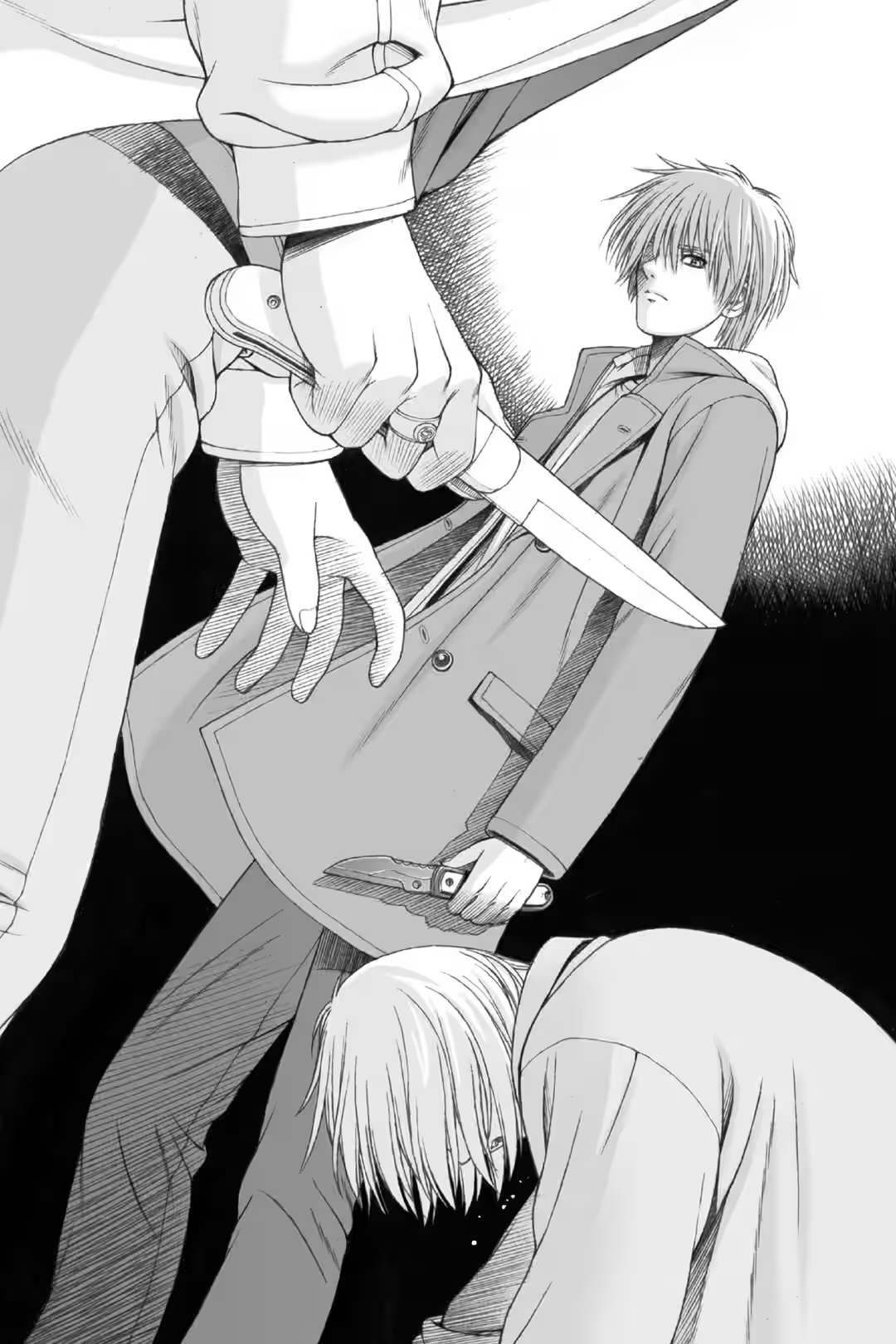
“Wha…?! D-don’t tell me that was your girlfriend?!”
Trying to take a step backward, Two tripped over One where he lay in the fetal position, cradling his hand, and landed gracelessly on his ass. One let out a sob.
The landing deposited Two in front of Three in the puddle of blood. Three’s consciousness seemed as if it was already fading; his body was being racked with jerky spasms. Advancing half a step toward Two, Harvey gestured briefly toward Three with his eye.
“That guy’s done for if someone doesn’t stop the bleeding soon. Not that it matters, since I’m gonna kill all of you.”
He figured that was fair warning, for what it was worth. Two shrieked, pale-faced, and scrambled away without even trying to stand up. He just scooted backward on his rear, feeling his way with his hands behind his back.
“Hey, man, we just teased her a little, we didn’t do anything…C-come on, calm down, okay?”
“I am calm. It’s almost funny how calm I am, really. Heh, it kinda makes me laugh.”
“Th-there’s something seriously wrong with you!”
“Really?…I think I’m just being normal.”
He looked down at the folding knife in his hand and adjusted his grip a few times experimentally. He’d only been carrying it around before; today was the first time he’d ever tested how it felt to use. Already it felt comfortable and right, fitting his hand perfectly. And it had been a long time since he’d really gripped a knife, but now that his feel for it was starting to come back, it actually felt pretty nice.
“Huh…I like this thing.”
A thin smile rose to his lips unbidden.
Two gave a shrill hiccup and bolted, practically on all fours still. He promptly tripped over Three’s prone body and fell again. Dragging his fallen friend up with him, he choked out to One, “H-hey, run—!” before starting to run himself. “Wait! Wait, damn it!” One hurriedly caught up to him, and they braced the incapacitated Three between them as they scurried off in same the direction they’d come from.
Well, look at that.
They’d actually taken their friend with them when they ran. Harvey was rather impressed. He decided to give them a five-second head start as a reward. 5, 4, 3—Eh, that was about two seconds short, but good enough. He regripped his knife and started to dash after the running men, when just then he saw a shadowy figure standing in front of them. “H-help us!” they cried pathetically, circling behind the newcomer as if he were their last hope. The bravado was completely gone from their voices (Great, now I look like the bad guy). As soon as they got a good look at the newcomer’s face under the gas streetlamp, however, those voices and attitudes did an abrupt 180.
“Why, you—”
Before Two had the chance to finish, the new arrival had already slammed an elbow into his face. For a split second Harvey remembered that Two was the one whose nose had been covered with gauze, but he didn’t feel any particular sympathy; it was forgotten again as soon as the memory formed.
“Joachim!”
Without slowing down his dash, Harvey switched targets and went after the newcomer.
The heavy sensation of piercing flesh—but the scream didn’t come from his target’s throat or his own. It came from Punk Number Two. Joachim casually shoved away the arm he’d yanked in front of him and used as a shield, filching its owner’s knife while he was at it, and launched an attack at Harvey without even pausing for breath. Two crumpled to the ground, cradling his mangled forearm and sobbing about something or other, but Harvey’d lost all interest in him by that point.
Skreee—!
The shrill screech of blade hitting blade rang across the bridge in the darkness. Their eyes locked over their still-locked knives. Faces close enough to feel each other’s breath, they paused long enough to each get a word in—“Yo! What’s got you so flipped out?” “You bastard…!”—before they simultaneously took one great leap away and immediately prepared for their next attacks.
Neither of them had a real reason for trying to kill each other on sight, nor did either feel the need for one.

Looking up toward the sky, Kieli realized that the clouds had stopped moving. The intermittent booming of the cannons in the distance and the dusty wind carrying the merry whoops of the kids through the yard had both abruptly died down. It was just like that final destination of all things drifting in the Sand Ocean: a place where everything had come to a complete halt, even the flow of the air.
One corner of the bleak schoolyard beneath that overcast sky was now dotted with little gray mounds. They were tiny, misshapen grave markers: nothing but a few stones piled together.
In the center of this crude collection of tombstones she hesitated to even call a graveyard, a young redheaded boy crouched piling up rocks bigger than his own fist, one by one. His silent back seemed to be warning her off even offering to help, so Kieli couldn’t do anything but stand still and quiet behind him, watching him work.
Snik. Snik. Snik.
For some time, only the dry sound of stone striking stone echoed emptily in the sky.
When a pretty stone meant to be the top of the last mound was laid down and they were all finished, little Elisha materialized above the grave. Her eyes wandered over her surroundings for a while, empty and expressionless, but when they focused on Ephraim’s face where he squatted in front of her, she smiled just a little, looking happy.
“Thanks for always making the graves, Effy.”
His drooped shoulders twitched as if he was holding something in, and Kieli’s heart hurt just watching him.
Without answering Elisha, Ephraim stood up in front of the grave and retreated to stand a little ways away. From that spot extended three sides of a square, marked out with mounds of stones—a makeshift graveyard holding not even ten people.
“He’s done!”
At the call of Elisha’s childlike voice, the other kids appeared out of the nothingness one by one to sit on top of their respective graves, knees drawn up to their chests. All of a sudden Joachim was standing next to Elisha, though Kieli hadn’t seen him arrive, and they’d naturally fallen into the same lineup as their seating order in the lunchroom.
“Today was no good either, huh?”
“It just never goes right.”
“And I even wrote a warning on the board, too!”
“I guess you have to write it so it’s easier to get.”
“Even if we make it easy to get, there’s no way anybody will get it.”
“I wonder how come we can never remember it when it’s happening, even though we can remember everything once it’s over?”
“Tomorrow we’ll forget everything again and start all over, huh?”
“I wonder if somebody will catch on tomorrow…”
And so they went around the ring of children, with each one making a comment.
Kieli had started to understand a bit about their circumstances after that stray artillery fire had landed in the schoolyard. This school was endlessly reliving a certain day from its past—she’d met a few spirits before who’d gotten trapped in time loops. The presence of a foreign element that shouldn’t exist in that loop, namely Kieli herself, had caused things to follow a slightly different course today, but in the end the results hadn’t changed.
If she’d done just a little more, taken some kind of positive action, could she have saved everyone? Or in the end, would something that’d happened so far in the past never change, no matter what she did?
“Okay, guys, see you tomorrow.”
“See you tomorrow.”
“Bye-bye, Ephraim. Bye-bye, Joachim.”
Their brief meeting over, the children vanished one or two at a time, fading into the sky’s thin, low-hanging clouds. “Bye-bye!” Elisha, the first to appear, was the last to vanish. Then all the younger children were gone, leaving behind only the meager graves they rested beneath.
Ephraim and Joachim alone were left, the two oldest students, facing each other diagonally just as they had in the lunchroom. But neither tried to meet the other’s eyes. They stood for a while staring at the ground in stony silence.
Finally Joachim parted his lips from their bitter, tightly pressed line and muttered in a strained voice, “…It came so close to going right today. If we just catch on a little faster…If we do it again tomorrow, maybe it’ll go right this time.”
“It’ll be the same tomorrow.”
Ephraim’s answer was even flatter and more emotionless than usual.
“No matter how many times we redo this, nothing will ever change. It won’t bring the runts back to life. We’re just wasting our time.”
“You bastard!” Joachim cried furiously, and then almost before Kieli could blink, he was springing forward and launching himself at Ephraim. They tumbled to the ground in a pile of limbs and kept rolling through the low cloud of dust they kicked up, starting up a real scuffle somewhere along the way.
“Why do you always, always give up right away like that?!”
“Quit yelling about it; you’re being a pain in the ass! You know it’s the truth, and anyway we’re all long dead by now!”
“This is what pisses me off about you, the way you act like you’re better than me ’cause you’re so calm and rational!”
“What’s that got to do with it?!”
Joachim straddled Ephraim and punched him in the face, and Ephraim, not to be outdone, kicked Joachim in the stomach from below. “Stop it! Stop it, you can’t do that!” Kieli had just been watching from the sidelines up until now, but she surely couldn’t sit back and watch this. She jumped forward and dove between the two boys, peeling them apart. They still both seemed determined to get their hands on each other, so she raised her voice. “I said stop it! Cut it out right n—!”
One of their fists caught her on the side of her head, and she let out a shriek. That seemed to bring them up short, and they both stopped moving.
All three of them froze in a tangle of arms and legs for a few moments. As they gathered their breath, the two boys glowered at each other as if to keep each other in check.
“…Hmph.” Joachim was the first to look away. Coughing a little with one hand on his solar plexus, he stood up and said offhandedly, “I freaking hate you.”
Then he turned on his heel and stalked off. “Oh, wait—!” Kieli called after him. You’re leaving the school grounds. Joachim ignored her, jogging a bit unsteadily out of the schoolyard and disappearing into the ruined city beyond its half-collapsed concrete wall.
“Leave him be. He’ll be back tomorrow,” she heard Ephraim spit from behind her when she just stood there staring bewilderedly after him. She turned around to see that he was literally spitting a glob of blood onto the ground along with the words.
“Are you okay?”
“This is nothing.”
Kieli reached out to touch him, but he warded off her hand with a sulky expression on his face and wiped his mouth off with the shoulder of his own coat. After that, they sat in their corner of the empty schoolyard for a little longer in silence, still covered with sand from the fight.
“Um…,” Kieli ventured hesitantly. “If I come back tomorrow, I think maybe it could go right this time. I mean, I’m pretty sure I’ll still remember today.”
“Don’t bother. It’s got nothing to do with you.”
Her shoulders slumped dejectedly at the flat refusal. She knew she was an outsider, and actually maybe she shouldn’t even be here at all, but that was exactly why she’d wanted to be able to do something for them…
After she’d stared at the ground without saying anything for a while, she heard Ephraim sigh. “Look, I didn’t mean it like that…” His tone was just a tiny bit softer, as though maybe he thought he’d been too harsh before. Kieli lifted her eyes a little. This side of him was just like the man she knew so well, too.
“I don’t care about tomorrow or whatever anymore. The only thing I regret is the first time, the real time,” Ephraim mumbled in a low voice, staring with downcast eyes at a spot somewhere just in front of his own crossed legs.
“I just think—if I’d paid a little more attention to the noises outside, maybe I could’ve called the runts back in, or if I’d gone outside with them instead of sitting in the classroom spacing out, maybe I could’ve saved even just one of them…maybe I could’ve saved Elisha, at least…If something had been even a tiny bit different, maybe the future would’ve been different, and it was my—”
The boy’s words broke off with a choke. He bit his lip, head hanging, and a few tiny stains started to dot the ground at his feet.
“It was my job to protect them…!”
The grief-stricken cry stabbed Kieli right through the heart, and for a second she was choking too. “Oh, no…don’t cry, okay?” She crawled over to him and tried to get a look at his face. Ephraim shook his head violently, wiping his face with one coat sleeve and turning away from her. “Hey, don’t blame yourself, okay? It’s not your fault. It’s not your fault, Ephraim…!”
Irritated at herself for not coming up with the right words to console him, Kieli couldn’t summon the nerve to say anything else, so she just gripped the back of Ephraim’s coat in both hands. Before she knew it, she was gasping out a sob and her own tears were streaming down her cheeks. “Hey, hey—why are you crying?” said the boy whose back she’d buried her face in. He sounded a little at a loss. It was the same gravelly voice and curt speech she was so familiar with, but more childlike and more helpless.
Kieli couldn’t answer verbally, so she just shook her head and clung tightly to a back no broader than her own—more slender than her own, in fact.
She couldn’t have stopped the wish for anything: If there’s anyone on this planet with the power to perform miracles, please, please end these children’s suffering and let them rest in peace. But if such a person really were out there somewhere, you would think they could’ve reached out a hand before so many young lives were taken. God was mercilessly fair to the world—so why was the world’s makeup so unfair?

They both took a wide leap back, braking with their heels. Their shoes gave a loud clack! as they simultaneously smacked hard against the asphalt.
Their knives were held in opposite hands. Other than the fact that Harvey had only one arm, their stances were virtually symmetrical. He felt as if he were facing himself in the mirror, and it sickened him. He deliberately broke his own stance to wipe his face with the back of his hand. Blood was seeping out of a shallow cut on his left cheek. With an annoyingly amused look in his slate-gray eyes, the mirror image said, “Come on, this is no fun. If a little scratch like that won’t heal up right away, you’re no better than some normal human.”
Now Harvey was so sickened he actually felt like retching. “So you’re the one who ran off his mouth to Kieli,” he ground out in a tight voice. From the moment he found out this guy was in town he’d had a hunch, but now he was sure. She’d been acting weird the past view days because she was in contact with him.
“Whatever do you mean? I didn’t tell her a single lie, for once. You’re the nasty one here, aren’t you? If something’s hard to tell her, you don’t tell her at all. Now that’s just selfish.”
“It’s got nothing to do with you. This is between me and her.”
“Oh, really. I wonder why she came to see me, then?”
“…”
This time Harvey gritted his teeth and didn’t answer. The man in the mirror laughed out loud at him, looking immensely pleased. “Poor Kieli. I’d take such better care of her, you know?”
The end of his sentence came out as a battle cry as he lunged at Harvey. Catching the tip of Joachim’s knife with his own and deflecting it to the side, Harvey jumped back again. He glanced over his shoulder to check his clearance just barely in time to bring himself to a grunting stop. He’d backed right up to the edge of the stairs. He felt himself tip backward and realized, horrified, that he was about to lose his footing. Joachim promptly seized the opportunity to make his next attack.
Crap!
A split second’s judgment told Harvey that he wouldn’t be able to dodge; he steeled himself to take the hit from the blade and launch a counterattack before the other man could withdraw it. It was like that saying: “Take a hit to win the battle.” But to his surprise, Joachim abruptly lost his balance right before Harvey’s eye. Harvey was suspicious of his good fortune, of course, but he didn’t let his chance go to waste. He knocked away his opponent’s knife with his left hand and slammed a shoulder into him with his whole body weight behind it.
Happily, the blow sent Joachim sailing off the edge of the stairs, but just before he fell, he grabbed the right sleeve of Harvey’s coat. “Gah! Let go, you bastard!”
“Not a chance!” And so Harvey was flung into the nothingness along with Joachim, and—
Gzzznnn—
—That low noise sounded again as he felt his body slam against a wall between him and the void. Repelled by the wall, Harvey’s body was flung up into the air for the briefest of moments—and he couldn’t believe his eye. The scene below him was a sky blanketed with twilit clouds over ashen ruins extending all the way to the horizon—and then gravity caught up with him and he started to fall again.
When they passed through that space, both of them screamed at once. The dizziness and nausea Harvey had felt sticking just his hand into it before was nothing compared to this. His inner ear wasn’t working; his balance shot, he couldn’t tuck to pull off a proper rolling landing; so his body hit every corner full-on as he tumbled down the stairs.
He couldn’t pull himself together enough to shut down his sense of pain, so it was a small blessing that, before he had to face the pain of hitting the ground, his mind abruptly blacked out, and all his senses were cut off.
Episode 4: Ephraim
“Nana. Come on, Nana, wake up. Go sleep in your own trailer.”
The tiny form curled up near the foot of Kieli’s bed gave an incomprehensible mumble.
Bearfoot shook her awake. Muttering something he couldn’t hear, Nana half-opened her eyes, but when he started to pick her up, she clutched onto Kieli’s blanket.
“I’m staying until Kieli wakes up!”
“Look, I’ll call you when she does, okay?”
“No!”
Bearfoot didn’t know the first thing about how deal with a fretful child. He was just about at his wit’s end when a voice at the door of the truck saved him. “Nana!” The girl’s mother, come to collect her! Nana’s resistance flagged a bit at the sound of her mother calling her name, and Bearfoot seized the opportunity to rip her away from the blanket, pick her up and carry her to the door as gingerly as he might handle a sand-lion cub, and deliver her to her mother. Nana meekly wound her arms around her mother’s neck.
Resettling her grip on her daughter, the woman glanced toward the rear of the truck and said, “She still won’t wake up?”
“No, but I think she’ll be okay. Mr. Harvey went looking for—er. Um, never mind,” he finished vaguely, flustered at how he’d almost blurted out the secret. Fortunately, she didn’t seem to notice the slip-up. She only frowned worriedly and said, “Oh…I wonder if it’s shock from the trauma…I’ll take over for you once I’ve put Nana to bed.”
“Nah, don’t worry about it. You go ahead and sleep with Nana.”
Bearfoot wanted her gone as fast as humanly possible, before he ended up letting the cat out of the bag. He pressed hard at her shoulder and practically forced her to turn away. “Night, Corp’ral!” the little brat called sleepily as they left. It sent his heart jumping straight up into his throat. He pulled back the curtain on the door just enough to let one eye peek out and watch them disappear back into the camp.
Then, finally, he could heave a sigh of relief. One catastrophe dealt with.
Other troupe members had been showing up periodically throughout the night to visit her or offer to switch with him; he’d sent each one packing with nervous assurances of “Nah, I’ll stay here and watch her; I’m fine, it’s fine.” When he thought about how Rat was sure to start up some messed-up rumor about him tomorrow, he started wishing miserably that tomorrow would just never come at all.
But, well, now wasn’t the time to be agonizing over little everyday problems like that.
Okay, then…
He steeled himself with a gulp and turned apprehensively around. He’d been half-hoping that when he next looked, it would be gone, but—
Oh, it’s there. It’s still there…!
—No such luck.
A black-haired girl was lying on the cheap fixed bed in the back. A banged-up old radio was sitting on the folding chair at her bedside, and firmly ensconced in that same folding chair was a man sitting with his arms folded. He wore a dark green army uniform caked with blood and mud. A blood-soaked sorry excuse for a bandage was wrapped around one of his knees, and there wasn’t anything left below the joint. The back of his uniform, riddled with bullet holes, made it plain how gruesomely he’d died—and now that battered soldier was exercising his authority over everything around him with nothing but his penetrating stare. His eyes glittered under the low brim of his army cap.
Bearfoot had never met a girl with a dead soldier for a guardian spirit before. Well, of course he hadn’t. There couldn’t be many people out there who had that kind of protector.
I’m heading out to look for Kieli. Guard the fort for a while. Put this down in there.
The troupe leader seemed to have left with the Church Soldiers, so Bearfoot had come to check on things. The redheaded man was just coming out of the truck, and as he’d passed, he’d uttered those three sentences, which Bearfoot couldn’t quite see the connection between, and shoved the radio into his hands. Then, unbelievably, he’d gone off somewhere. What the hell is he thinking, leaving Kieli alone after all that?! There’s no way I can trust a guy like that with her! Bearfoot had fumed to himself as he climbed into the truck (he was too scared to say it to the man’s face). But when he saw Kieli again, he realized something was wrong.
He didn’t have a reason he could clearly explain, but if he had to try, he’d say it felt like recognizing his own kind—because Bearfoot himself was made that way.
Kieli’s spirit wasn’t inside her body.
“…Hey, you.”
“Y-yes, sir!”
The words weren’t especially threatening, but hearing himself addressed in that lethally sharp voice was enough to make Bearfoot’s heart quiver in his chest. He found himself audibly clicking his heels together as he answered. His posture was so ramrod-straight he felt almost as if he might actually salute (usually when the troupe leader was yelling at him to do something about his stooped shoulders!). The soldier darted a keen glance his way without moving from his station at the bedside.
“Don’t just stand there; sit down,” said a staticky voice from the radio’s speaker; bits of the soldier flickered in concert, like signal noise on the screen of a transmitter with a bad connection.
“Y-yes, sir!” Watching the ghost apprehensively out of the corner of his eye, he moved to sit down in the second folding chair at the foot of the bed.
“…Wait,” the soldier ordered in a lowered voice.
Bearfoot squeaked and toppled off the chair he’d been lowering himself into.
“They’re here.”
He was sprawled on his backside with his limbs tangled up in the collapsed chair, but the soldier’s gleaming eyes seemed to drag his own gaze with them toward one corner of the truck. The ceiling lamp dimly illuminated all the corners but that one, where a darkness had sunk that was so complete it seemed to have swallowed up all the light.
No, it wasn’t a darkness—it was more like a pile of bizarre human shadows the same color as the darkness squirming on top of one another.
Slither…
Five grotesquely long, twisted fingers reached out to hug the floor, and one of the shadows began to crawl out of the corner toward them. Bearfoot, who’d slumped weakly on the floor with his legs splayed out, gave a shrill scream and hastily pulled them back.
“Damn low-class ghosts…You just try to lay one TIP of one finger on Kieli,” the soldier threatened in a growl, whipping out the saber at his waist and switching to a reverse grip. He plunged it down between his legs as if to hold the enemy in check. Cowed, the black shadow halted its advance—only to start pacing back and forth, hunched down low, as if waiting for its chance.
Bearfoot whimpered.
Somehow he’d gotten caught in the middle of a staring contest between guardian spirit and evil spirit, and it was just too much. He used both hands to scrabble backward, tripping himself up on the chair in the process and silently beseeching the man he’d just been fuming at for help.
Mr. Harvey, please hurry back…!

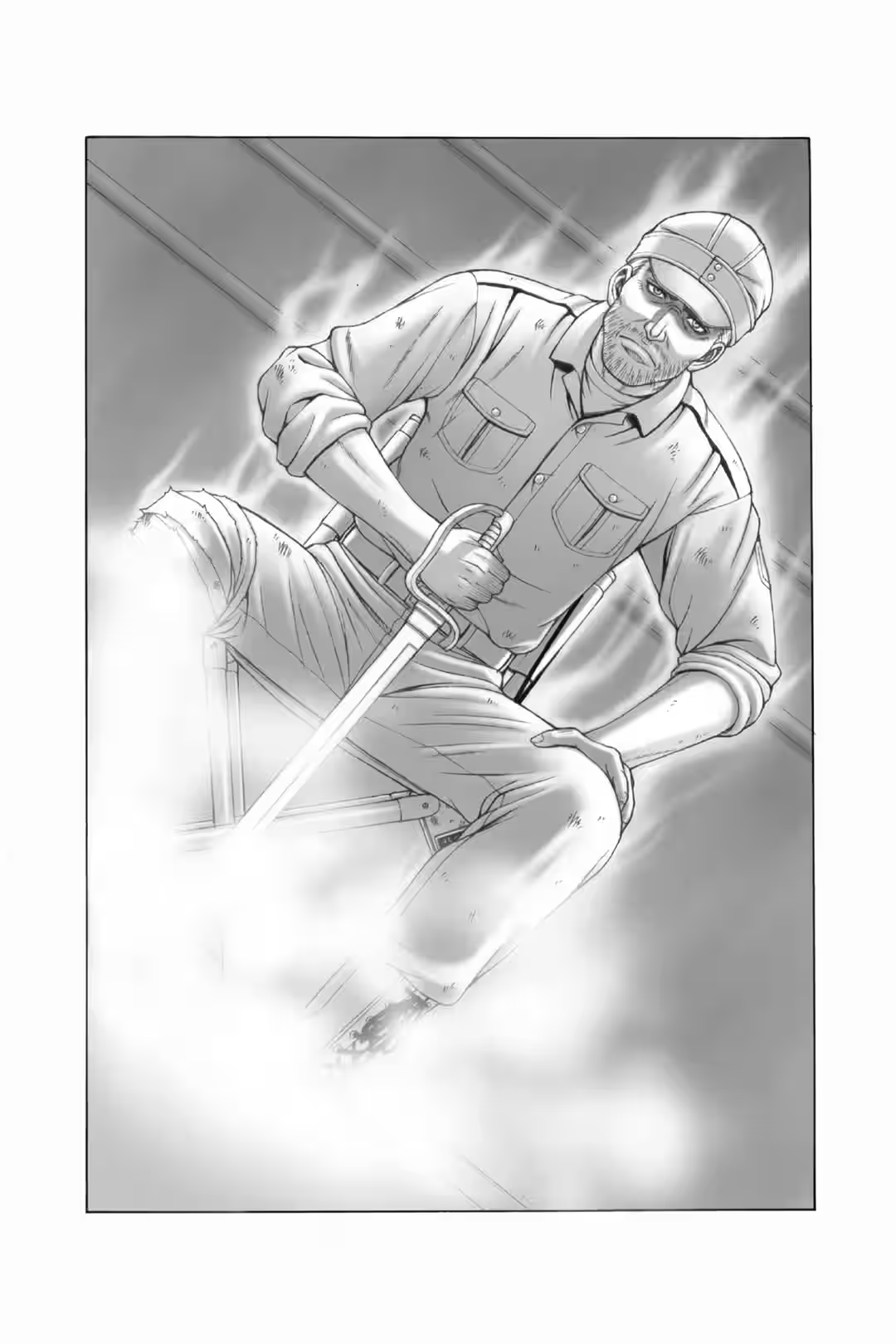
The thin, sandy clouds rippled like one big curtain, and for just a moment, Kieli could see a blue-gray night sky on the other side.
“What was that…?”
She looked up at the sky uneasily.
“It’s okay; that happens sometimes. Let’s go.”
“Okay…wait up!” Prodded by the boy’s voice, Kieli looked back down and hurried after the retreating back of his coppery head. The boy Joachim had brought her along this path through the ruins, and now she was walking back in the opposite direction with Ephraim as her escort. This boy climbed over the wreckage as if he was perfectly used to it, and Kieli followed after him clumsily. That was just the way it had been with Joachim, too.
When Kieli’d said she didn’t know how to get back, Ephraim had suggested they start by going back to where she’d first appeared, and it’d been settled that he would take her there.
“What should I do when I get there, though…?” she sighed dispiritedly, keeping her eyes on the ground so as not to trip over the rubble. She had no grasp whatsoever of her own situation at the moment.
“Eh, it’ll work out,” the boy walking ahead of her called back casually. Kieli shot him a slightly reproachful look. She decided to try complaining.
“Sheesh, you talk like it’s not your problem!”
“Because it’s not my problem. I don’t owe you anything,” he answered bluntly.
Kieli was struck speechless. What could she say to that? (And he was sure helping out a lot for a boy who “didn’t owe her anything”!) Ephraim tossed her a small smile over his shoulder, apparently enjoying her reaction. Kieli was the older one here, but she just knew he was teasing her.
“Big talk for someone who was crying a few minutes ago!” she fired back, pouting.
“You were the one crying.”
“I was just going along with you, Ephraim!”
“Hey, I didn’t cry,” he answered aloofly, and turned to face forward again. Kieli sighed, half exasperated and half impressed. Where did that just-a-bit-sweet attitude from before go? Still, she found it all strangely convincing somehow. He was a pretty Harvey-like child, really.
Thinking about it that way…
This Ephraim is Harvey from when he was a kid, right…?
When she consciously thought about that, she felt like asking him all kinds of things. Things about Harvey’s childhood—like his parents, whether he’d had any siblings, where he’d grown up. But his parents had evidently passed away, and since there hadn’t been any brothers or sisters of his at the school, she guessed that either he was an only child, or his siblings had passed away, too. There weren’t very many things she could ask lightly.
Kieli’s feet stopped moving without her noticing, and Ephraim slowed down and gave her a quizzical look. Flustered, she ran after him as she tried to think of an easier question, but even though there must be any number of things she’d like to know, the only things that popped into her head were stupid ones. Like his favorite foods, his favorite subjects in school, his favorite kind of girl…
“Eep!”
Odd thoughts had made her neglect her footing; when she put her boot down on an unstable pile of rubble, it crumpled under her and she fell to the ground.
“Whoa, what?!” Ephraim cried, startling himself. Then he picked his way back to her and lent her a hand. “Why would you fall there? You were walking slower than a snail.”
“Ow, ow, ow…” He steadied her by the elbow as she stood up and pulled her ankle out from where it was caught in the wreckage. When she lifted her face, his copper eyes met hers at close range, and she blushed a little before she could stop herself.
That scrawl on the blackboard was probably just childish teasing, but Kieli couldn’t help remembering it now. Ephraim and Kieli were…
She heard a humming like the beating of wings, and the sky shook again. Ephraim broke eye contact and looked up at the low-hanging clouds overhead. Just as before, the sky was rippling like a curtain, the clouds shifting from sand-colored to sunset-copper to nighttime-slate and then back to sand-colored again.
“…I don’t think it usually wavers this much,” Ephraim murmured, chin still tilted upward.
“It doesn’t…?”
Kieli glanced at him anxiously.
“Oh,” she breathed hoarsely when she saw the sight over his shoulder. Dumbstruck, she tugged on Ephraim’s coat sleeve and gestured with her eyes at it.
Her field of vision fluttered like a curtain in the wind, and past the ruins stretching out before her, she could see entirely different scenery. There, the ruined buildings had been torn down and everything flattened to level ground. It looked like the sprawling site of a new building project; construction equipment and people in overalls were hard at work on it. Out of nowhere, a trolley truck passed by in front of her, and she automatically cringed as she watched it pull away. One trolley after another followed it along the tracks on the ground, packed with piles of dirt and building materials.
Could this be the construction site of the park…?
No sooner had the thought occurred to her than the scene wavered violently. Her warped field of vision made her dizzy, and she was overcome with a feeling like motion sickness. She closed her eyes briefly.
By the time she opened them, they weren’t standing in ruins or in a vacant lot anymore.
In place of the half-collapsed buildings in the ruins, there were houses with all kinds of different roofs—round, conical, mushroomed; there was no unifying theme, and they were all crammed tightly together, one squeezing past the next or even sitting on top of one another. Something seemed off about them…Looking more closely, Kieli saw that they were all adorably small, half the size of any human home at most. Tracks lay underneath her feet instead of the debris she’d been treading on. They ran along the center of the pointlessly winding road (there was no way a normal urban area’s streets would twist so much), making their way through the throng of miniature houses.
“This is the park…!”
She’d only ever looked at it from the bridge, so this was her first time actually seeing the inside. But the clockwork cityscape was bathed in slate-gray dimness, and she didn’t see any trolley trucks carrying tourists or hear any steam engines operating. There were only the pallid emergency lights picking out the contours of the hushed artificial city.
Feeling someone’s gaze on her, Kieli half-turned to look behind her. When she looked up the wall of the cozy little round house standing there, she saw a figure by the second-story window covered head to toe with blood.
“It’s a doll,” Ephraim pointed out calmly as she started to scream. Kieli clutched his arm and held on, half-hiding herself behind it as she took another look. He was right. It was just a doll in red clothes. Nonetheless, the way only half of its faintly smiling face was visible at the window and one hand was frozen in midair (maybe it’d been about to wave?) was chilling in and of itself.
That wasn’t the only doll, either: there were a dog and a boy chasing each other around beneath a streetlight, a cute girl with a headscarf selling flowers…and across the tracks on the other side of the road, she saw a bear with a drum, a fox with a trumpet, a monkey with cymbals, and all manner of other animals forming a brass band led by an owl. They were all suspended midmarch, with their right feet raised high in the air. Perhaps if she saw the animals actually moving in the light of day, they’d seem fanciful and fun, but although the details like the fur and whiskers were exquisitely crafted compared to the patchwork costumes made by Shiman’s somewhat clumsy troupe stagehand, the sight of them motionless in the dark like this was just creepy.
Vnn…
The air shook again, and for the barest of moments Kieli was standing in the afternoon ruins she’d just come from; but then it was right back to the city of clockwork dolls again.
“What’s going on here…?”
“Dunno, but let’s hurry. I know which way we’re going.”
They started walking deeper into the clockwork city wrapped in darkness and silence. Both of them quickened their footsteps without thinking about it. It felt strange to be walking down the tracks of this city, when you were supposed to be taking in the sights as you rode through it in a trolley.
A bee merchant selling honey by the roadside, a rabbit mommy feeding a bottle of milk to a human baby in the window, a chimney sweep up on the rooftop—there were dolls arrested in midmotion everywhere she looked. Glancing around fearfully at them, she lowered her voice to a whisper, feeling as if they might leap to life at any moment if she made a loud noise. “They’re scary when they’re not moving, huh?”
Ephraim had never let go of her right hand after helping her up earlier. Now he gripped it a little more firmly, as if to tell her it would be all right. She darted a glance at him, but he was just walking along, facing forward and looking as if nothing had happened.
“…”
Kieli turned her head forward again too, and squeezed back tightly. His hand wasn’t much bigger than Kieli’s yet, but though slender, it was boyishly angular. It felt just like that same left hand on the adult version of him that she knew.
Harvey…
It heartened her, and at the same time made her impatient to get home. Her sense of time was all fuzzy now, so she wasn’t sure how long she’d been here, but if this park was really the one from the present, then it must be around midnight now. I wonder what happened to my body…Will it still be in the same place? What will I do if those guys are back again…? One anxious worry after another raced through her mind. What if I can’t ever get back into my body again?
Clackety-clack, clackety-clack
Kieli heard a faint sound behind her. Evidently Ephraim heard it, too. They both stopped walking and exchanged wary looks, then turned around to peer into the shadowy city. However, nothing looked especially different than it had when they’d walked by it. There were the girl selling flowers, the bee selling honey, and the owl leading the band, all smiling and still.
“There was a sound, right?” Ephraim said, glaring behind them and tilting his head in confusion.
Kieli tugged on his hand. “Come on, let’s go…” She wanted to get out of this place as fast as she could. She had a bad feeling.
So they turned back around and started walking again—
Clackety-clack, clackety-clack, clackety-clack
There it was again. When they stopped walking, the sound stopped just a fraction of a second afterward. Kieli started to turn around, but Ephraim glanced at her out of the corner of his eye and silently mouthed, Don’t move.
Gulping, Kieli signaled with her eyes that she understood.
They froze in place face-forward for a while, as if to hold off whatever was behind them, and then they exchanged looks, nodded, and abruptly spun around to catch it off guard. However, there still wasn’t anything particularly suspicious. There were the girl selling flowers, the bee selling honey, and the owl leading the band, all smiling and—
—and the band—
—seemed closer than it had been before.
“Ephraim…!” Her right hand still in Ephraim’s, Kieli grabbed his elbow with her left. The boy’s shoulder, not much broader or higher than her own, moved in front of her slightly, protectively.
Around the motionless animals, each carrying its particular instrument and smiling proudly, swirled a gritty black mist. Kieli could hear them saying something in rapid whispers that sounded almost like pouring sand.
The spirit of a child, the spirit of a child!
They say a child’s spirit is sweet
They say a child’s spirit is sweet and crispy
They say a child’s spirit is sweet and crispy and shiny
Sounds good to eat! Sounds good to eat! Sounds good to eat!
The bear drummer’s jaw dropped open impossibly wide. The owl conductor swiveled his big golden eyes, unfurled broad wings protectively colored to blend into the craggy wilderness, and raised his baton.
When he brought it down, Ephraim took that as his cue.
“Run!” he shouted, and Kieli pitched forward at the sharp pull of his hand as they took off sprinting down the tracks. She turned to look over her shoulder and saw the animals all give chase on cue from the baton, clacking their jaws open and closed. Mechanical feet marched to their own earsplitting clackety-clackety-clacking accompaniment. A shiver ran down her spine. “Don’t turn around! Hurry up!” Ephraim yelled, yanking her by the hand. Kieli faced forward again and ran after him with everything she had.
And then suddenly he slammed on the brakes, so she shot out in front, her arm stretching out like a rubber band before being snapped back.
“What’s wrong?!”
After Kieli’d instinctively shaken him off in protest, her ears picked up a metallic noise different than the high-pitched sounds the band made, coming from the opposite direction.
Clank, clank, clank
A new group of dolls appeared out of the dimness to block their path. They were about half as tall as Kieli and Ephraim, but they looked like the castle guards in fairy tales, with impressive, darkly shining armor. They each had thick ponytail-like decorations coming out of the tops of their bell-shaped helmets. The row with blue ponytails held crossbows with arrows at the ready, and the row with red ponytails held up spears taller than they were. Both rows marched toward them with perfect precision.
For a moment Kieli thought maybe they’d come to the rescue, but that hope was quickly dashed. With crazed smiles plastered on the adorable round faces beneath their helmets, the guards all brandished their weapons. Voices all began to chatter at once. These were different from the scraping-sand whispers of the band; if anything, they reminded her of the repetitive rise and fall of a siren.
Intruder alert! Intruder alert! Intruder alert!
Find them, catch them, give them jail cell beds!
Then up to the guillotine, and off with their heads!
Off with their heads, their heads, heads heads children’s heads
Their voices grew strange and distorted halfway through the chant, and then…
They say a child’s head is sweet
The say a child’s brains are sweet and soft like pudding
They say a child’s eyeballs are sweet and round like candies
The say a child’s earlobes are sweet and firm like—
Kieli and Ephraim had no obligation to stay to the end of that line, obviously, so they turned to run, but the animal marching band was bearing down on them from the other direction. They were trapped between the castle guards and the band with nowhere to run. Ephraim darted his eyes from right to left and made a profane noise.
“Over here,” broke in a voice different from either the band or the guards. When they looked around, unable to find its owner, the voice called out again, “Hurry, over here!” It came not from in front of or behind them, but diagonally above them. Kieli looked up with a start and caught sight of a two-story house with a signboard displaying a picture of a key. At the top of the spiral staircase attached to the outside wall as if to hem in the climbing vines growing along it, there was a little door. A doll’s hand reached out of it, beckoning them.
There was no guarantee he was on their side. While they hesitated, an arrow from one of the crossbows whizzed into view, and they simultaneously ducked and covered each other’s heads.
“Hurry,” urged the voice from the house for the third time. Ephraim seemed to make up his mind. He took off running toward the house, pulling Kieli along with him.
“You first.”
Pushed forward by the shoulder, Kieli stepped in front of him and put one foot on the steps. The staircase was so steep it was practically a ladder; as she used both hands and both feet to climb it, Kieli glanced down just in time to see an arrow scrape her leg as it landed smack between her feet. Terror almost made her miss the next steps, but she managed to sprint all the way to the top. When she arrived there and turned around to peer down, a jumble of hands from people and animal dolls were reaching for Ephraim from below as he climbed after her, straining together and stretching up like the tentacles of a single animal to catch him by the ankle.
“Ephraim!”
She gave him her hand and hauled him up the last few steps, and they fell through a tiny dolls’ door into the house together in a tangle of limbs.
The dolls jumped up after them, but at the last second the iron door was closed, and it rattled as something outside struck it over and over, hinges screeching. Escaping into the house was all well and good, but it looked as if they’d be overtaken in no time. Kieli’s brain was numb, though, and she couldn’t think what to do next. She just sat petrified on the floor until the doll who’d saved them began bolting the door from the inside with calm, steady hands on the locks.
Well, she wasn’t sure if “locks” was the right word…
No, each separate one was definitely a normal lock, but there were so many latches of different kinds, and together they formed some kind of pattern that completely sealed the opening. Kieli watched the doll’s small hands inserting so many keys into so many locks with blank astonishment, breathing hard. Finally he passed a thick iron chain across the door and hung an enormous padlock on it. Then, moving his hand as if to wipe sweat from his brow after wrapping up his work, the doll turned to them.
“This should hold for a while. It’s a ward against evil spirits.”
Kieli didn’t exactly understand that, but it was still amazing.
Exchanging looks with Ephraim, she breathed a sigh of relief for the moment.
The room they were in was cramped and close, partly because they were two humans crammed into a house for dolls, but also because it was filled to bursting with haphazardly piled belongings. The arched ceiling was so low that even Kieli had to stoop a little so she wouldn’t hit her head on the skylight. A heavy steel worktable sat in the center; the hunks of metal covering the majority of it must be tools for cutting keys. She recalled the sign with the key on it outside.
There was one lone wall that wasn’t obstructed by stuff, and all sorts of different keys hung there like a collection on display. Big keys, little keys, silver keys, copper keys, rust-covered keys with serpent carvings that looked as though they could open cursed treasure chests.
The master of the house was a doll in the shape of an old man, about half Kieli’s height and wearing a crimson waistcoat that suited him well. The big, self-asserting hooked nose in the center of a wrinkled face constructed in fine detail was distinctive, and his round, rimless spectacles were perched perfectly on his nose. A steel arm and some tubing that most likely connected to his power source sprouted from a hole in his back, but the arm’s fittings had been uncoupled at the joint, which probably explained how he could move freely around the room.
“What the heck are you?” demanded Ephraim outrageously, glancing casually around the room. Apparently he didn’t feel as fascinated as Kieli.
The old man lifted his nose a little, looking hurt. “You’re a mannerless brat, I see.”
“I was brought up badly.”
“Th-thank you so much, you really saved us,” said Kieli, hurriedly bowing as she elbowed Ephraim in the side. He looked grumpy, but he did say a brief, grudging “Thanks.” He’s so contrary…Kieli gave a small shrug and returned her gaze to the old man.
“So, um, you’re…”
“Well, I’m nothing unusual, really. I’m the same as you two. I’ve been a resident of this area since way back in the day. But not too long ago, the humans built this weird city of vessels with no souls. Suited me perfectly, so I’m borrowing this doll and this house.”
“You’re a spirit possessing the doll…?”
The old man dipped his hooked nose in a Sure, I guess? sort of nod.
“The neighborhood’s gotten dangerous since the evil spirits came. I’m thinking it might be about time for me to move. You’re some of the kids who’ve settled in that school, right? That place might start to feel the effects soon, too.”
“So you know about the school. Did you die in the War, too?” Ephraim responded, stepping over the man’s belongings to the opposite window. It was round to match the line of the ceiling, and countless latches were attached to it, just like the door; Kieli guessed it was another of those “ward” things. From where she stood, the dark glass only reflected the room back to her, and she couldn’t see outside. Every so often, though, she heard the high sound of something whacking against the frame. The soldier dolls must be firing arrows at it from below.
“I imagine they’ll give up eventually. Go on, sit down and take a load off—though I suppose that’s a strange thing to say to the dead.”
He offered her a stool next to the worktable, seeing how uneasy she looked, but it was piled high with thick books and covered in dust. Upon closer examination, the books turned out to be fake ones stuck to the stool. Kieli abandoned the idea of sitting there and began brushing the dust off a wooden box next to it (it wasn’t real wood; it was fake, too, and stuck to the floor).
“Hmm?” The old man pushed his spectacles higher on his nose with one fingertip and began peering at her interestedly. “You’re a bit different, aren’t you…?”
“Um, I’m not…” Kieli trailed off, thinking I’m not dead yet might be a weird answer. At a loss for how to reply, she glanced over to the boy at the window, not that she really expected any help from that quarter. Ephraim was staring out of it with his bangs pressed up against the glass, completely indifferent to their exchange.
“It’s started to get worse again…” Apparently those copper-colored eyes weren’t keeping a lookout for the dolls; they were trained on the sky hanging above the city. The slate-gray night sky warped like a fluttering curtain again, offering a glimpse of a different-colored sky on the other side.
“Mmm, this space is more unstable than usual tonight,” the hook-nosed doll muttered to himself, stroking his chin. Kieli watched his hazy reflection in the windowpane over Ephraim’s shoulder. She was kitty-corner from him, and Ephraim was closest of all to the window, touching the glass with both hands—but as she’d half-expected, their reflections were missing. The glass only showed a box with nobody sitting on it and the furnishings behind it, as if that were the natural state of things. Even though Kieli herself could clearly feel the box she was sitting on…
Averting her gaze from the old man’s reflection, she turned back to the real thing. Well, this probably wasn’t what he truly looked like anyway, so maybe it was weird to call him the “real thing.”
“This place, this space, what is it?”
“Have you heard of how the magnetic fields created by prewar fossil resources attract spirits to them?”
“Yes, a little.”
“I don’t know too much about it myself, and I’ve never seen one in person, of course, but…I have heard from spirits who’ve been around even longer than me that there’s an unexploded bomb buried around here somewhere.”
That didn’t give Kieli enough to follow the thread of the conversation. She stayed quiet and let the question show on her face; after a few moments, the old man began to speak again. As he spoke, he moved slowly about the room, dragging the tube attached to his back along with him. Sometimes he would clack his jaw open and closed in a way totally unrelated to his voice that made Kieli feel exactly as though she were watching the old storyteller character in a puppet theater performance.
“North Westerbury launched it into the heart of South Westerbury late in the War. Apparently it was their ultimate weapon, made by scraping together the high-purity fossil energy that was already showing signs of running dry at the time. If it’d gone off, it would have been a crushing blow to South Westerbury, make no mistake, but fortunately the city escaped damage; and after that the South switched to the offensive, launching a counterattack against the North.”
That part matched what Shiman had told her several days ago. After the South Westerbury forces got their hands on a platoon of Undying, they turned the tables and crushed the North army instead, and as an extension of that effort went on to invade Easterbury to the east. However, by then the depletion of the planet’s resources had become acute, and the War was gradually drawing to its natural close. It took a long, long time and many, many sacrificed lives before the people realized that they’d lost what they’d originally started fighting over through the very act of their warring, and there was no longer any meaning in continuing it.
Kieli glanced out of the corner of her eye at the profile of the boy at the window. She couldn’t tell whether or not he was listening to them; if so, he didn’t show any particular response. He was still staring outside. Come to think of it, did Ephraim know that he’d died in the War, and that he’d become an Undying afterward…?
The old man’s reflection in the window moved to stand in front of the key collection on the wall, crimson-waistcoated back facing them. As he walked along it, examining each key as if searching for something, he continued his story.
“This mysterious space only recently appeared here. When they built this artificial city they dug up old strata of the ground, and the magnetic field of the unexploded bomb that’d been sleeping under the ruins all those years spread out like ripples on a lake, engulfing the city. It’s so strong that ghosts from many different time periods have gotten caught up in it, and their planes of existence are mutually encroaching on one another. And another thing…this is probably another effect of the field, but in this space spirits, who are by nature unstable beings, maintain a curiously solid form—you two can touch things like any normal human, you get hungry, you feel pain when you get hurt, and at the end of the day I imagine you get tired and sleepy…Ah, yes, I think it’s this one.” The old man took one key off its hook in a corner of his collection and came back to Kieli.
“Here, I’ll give this to you.”
It was a rusty lead-gray key small enough to fit in his palm.
“It seems you still have a body to return to. This might be useful if you run into trouble. Though I’d rather you didn’t, of course.”
“…Thank you.” Bewildered, Kieli took the key from the doll’s small hand. She could clearly feel its metallic weight and coldness in her own palm. It was a rather businesslike key, with no adornment of any kind.
“You see, one of the human guards dropped it here one day. It’s called the ‘master key’ or some such thing, and it’s evidently quite important. When I picked it up and hid it among these keys, he went white in the face and looked all around the ground for them—but not up here,” he added mischievously, as if to say This is our secret, though Kieli wasn’t sure who it was supposed to be a secret from.
“Hey,” Ephraim blurted unexpectedly, and plastered his forehead to the glass as if he were trying to hang out the window. This time, he wasn’t looking at the sky overhead. He was gazing down at the street. “They’re leaving.”
At those terse words that could have been meant for himself or as an announcement to them, Kieli dropped the key into her right coat pocket and stood up.
She peeked out, tentatively, since there might be more arrows coming, and saw the crowd of dolls whispering to each other as they walked away from the house. They weren’t wandering off in all directions as though they’d given up; it was more as though they’d found something else to go after, and switched targets at once. Guards and musicians formed a single procession, all mixed together as if no longer aware of which camp they’d started out in. Heads of all different shapes and sizes bobbed in the crowd as they all disappeared off in a single direction.
“I wonder where they’re going…” Her forehead pressed to the glass now, too, Kieli stared in confusion until she heard the old man’s voice behind her say:
“Quite a number of unusual folks seem to have stumbled our way tonight.” The doll’s dim reflection in the mirror opened and closed its jaw in time with the words. “I think there’s something nearby that’s pulling strongly at all the spirits. That’s got to be what’s resonating with the magnetic field, making the space unstable.”
“Resonating—”
Could it be—one thing sprang to mind instantly. I know one thing that resonates with magnetic fields from fossil resources…!
“He came for me!”
Kieli shoved her cheek against the pane to check which direction the dolls were marching in, then spun around and left the window. She jogged up to the door to open it, but it was sealed tightly shut with all those locks and chains. The door that had been so reassuring when it cut off their pursuers and saved them from their plight was only driving her crazy now.
“Hold on, what’s gotten into you all of a sudden?” Ephraim’s quizzical voice reached her ears, but the words weren’t making it to her brain anymore. She whirled around and pleaded rapidly, “Sir, open it, please open it, quick!”
The old man appeared unruffled. “I told you spirits maintain a solid form in this space, but when you get right down to it, in the real world a spirit is like a phantom…If you take away the perceptions of your eyes, a real door might as well not even be there.”
“…?”
Puzzled by what sounded like a riddle, Kieli nevertheless turned back to face the door. When she reached out to touch it with her right hand, her fingers passed right through it with no resistance, as if she were touching the surface of a pool of water. Kieli unthinkingly jerked her hand back in surprise, and then experimentally touched it again, but this time her nails smacked hard against it.
She closed her eyes, took a deep breath, and swept the presence of the door out of her mind.
She stepped out with one foot as if she were just walking down a hallway. One big step.
She didn’t run into anything.
Gingerly opening her eyes, Kieli saw that she was looking down on the nighttime city from the top of the outside stairs. With the dolls gone, it was hushed and silent again. Right behind her was a door scarred by the arrows from their crossbows.
She turned to face forward again, and dashed unsteadily down the steep spiral staircase.
Harvey—
When she was only a few steps from the bottom, she jumped down (but her feet didn’t make any sound), made an immediate ninety-degree turn, and took off running down the street with the trolley tracks. The trolley path took a lot of excessive curves as it threaded its way through the town, and its forward visibility was poor in consequence; it wasn’t possible to keep the doll procession in her field of vision anymore.
Her feet naturally picked up speed. She could feel the pounding of the heart she didn’t even have thrumming all through her.
The moment she careened around the corner of a building on the zigzagging road, she nearly tripped over something lying at her feet. Reflexively she jumped over it, and then turned to see what it had been—
And then gasped, and came to a halt.
The scene that spread out behind her wasn’t the clockwork town she’d just run through; it was a ruined urban wasteland. When she craned her neck back around, the tracks she could swear she’d just seen ahead of her were gone without a trace, along with the adorable houses and the dolls peeking out of them. Corpses in military uniform littered what had become of the city all the way until they met the cloudy twilit sky at the horizon. A dry wind fluttered the hem of her coat as it blew by, carrying away the powder smoke that had settled around her legs. It smelled of sand and gunpowder and blood.
“Ephraim…?” she ventured, feeling suddenly anxious. She’d run off by herself, so the boy who’d stayed with her thus far was nowhere to be found. Kieli stood all alone in the middle of the ruins. As far as her eyes could see, there was no one and nothing else standing in this place but the bare walls of half-collapsed buildings. Otherwise, it was just an ocean of rubble and dead bodies lying at her feet in ashen waves.
“Ephraim, aren’t you here? Hey…”
Looking around her uneasily, she took a step back, and the thing she’d almost tripped over earlier brushed the bottom of her field of vision.
Don’t look! a voice from her subconscious warned, but some even more compelling force made her drop her gaze to the ground anyway.
Lying limply on the rubble was a dead young soldier. The back of his uniform was a ragged mess of burn holes; white bones and black-red patches of what must be his organs peeked out from beneath skin burned raw and coated with mud and blood. The best Kieli could guess was that he’d been part of the fallout from an artillery strike. She didn’t think that was what had killed him, though. He might have been lying here already when that happened. The wounds on his back were still fresh, but the blood that spread from one temple to cover half his face was already dry and stiff.
Kieli knew that particular face very well. Those wide-open eyes vacantly staring at nothing were the same color as the dried blood stuck to his temple.
“Har…vey…?”
Her knees crumpled underneath her, and she sank to the ground.
No…
Nonononono—Someone inside Kieli’s head was clamoring violently to run away right this second, but it was as if her motor nerves had been severed at the spine. Her body wouldn’t respond to the call. With sluggish movements, she reached out a hand and lightly shook the man’s back, though even she didn’t know what she was hoping to accomplish. His body jolted forward, freed from the rubble it had been caught on, and his head of coppery blood-encrusted hair flopped onto Kieli’s lap.
Coppery hair drooping over her knees and the weight of a corpse’s head. Kieli reached down dumbly to support it in place.
Harvey…no, not Harvey…is this Ephraim…?
Dimly, she became aware of the sound of tires crunching over the rubble toward her. There were no thoughts in her brain; she only lifted her face in automatic response to the sound. An army truck painted dirt-brown appeared through the gunpowder smoke hanging over the ruins, kicking up a cloud of dust with its back wheels. One truck…and a second one behind it.
The trucks and their dust clouds both parked in the middle of the ruins. Several soldiers in uniforms that matched the bodies littering the ground climbed out of the first one, followed by a man in a high-collared greatcoat who seemed like more of a big shot than the others (perhaps he was one of those “commissioned officers”?). From the other truck came a smallish man who didn’t look military at all. Soon they were engaged in muttered conversation that reached Kieli’s ears mingled with the white noise of the sandy winds: “Try to get fresh ones in decent condition if you can…” “What about this one?” “Hmm…yes, let’s take it with us.” Two soldiers hoisted up one of the corpses between them and carried it over to the bed of the truck.
They went on sifting matter-of-factly through the dead soldiers’ bodies, exchanging a few brief words over each one and determining whether to leave it there or pull it out of the debris and carry it back to the trucks. After they’d gone through about ten of them, one of the men said, “How about this one?”
“Hmm, he’s pretty badly damaged…”
Several shadows fell over Kieli, and the army men started up the same conversation while they looked down at the copper-haired youth in her lap. The officer in the greatcoat nudged him in the ribs with the tip of one army boot, and the coppery head slid off Kieli’s knees and thumped against the ground. “St-stop it!” she protested, reaching out to cradle the young man’s head back to her lap again, but the officer flatly ignored her presence. Instead of stopping, he casually plunged a hand into dead man’s uniform.
He tugged the bloody dog tags out from under his collar and glanced at the inscription on the metal. “Well, let’s bring him along. He’s young; we can probably still use him,” he grunted, not sounding particularly impressed. At the order, his subordinates hoisted the young man up between them. They didn’t seem to even notice Kieli, who gaped up at them in horror. They grabbed him by the shoulders and legs and carted him off to the truck the same way you’d carry a bag of flour.
Crunch, crunch, crunch…
The two trucks set off in tandem again, trailing exhaust fumes and the ponderous sounds of their fossil-fuel engines behind them as they left the ruins wreathed in gunpowder smoke behind. They carried about a dozen bodies between them.
“They’re collecting the materials to make Undyings,” she heard a voice say from above her and to the side. A voice like the wind blowing through the battlefield: dry and faintly gravelly. Kieli looked up to see a boy with the same copper-colored eyes and hair as the corpse standing behind her.
He watched the dust cloud sent up by the retreating truck impassively for a moment, and then said, “The guy who didn’t look military was an arms dealer who came to push his Undying technology. Apparently he was in North Westerbury before he started cozying up to South Westerbury. Are you okay?”
He lent a hand to Kieli and pulled her up as he explained. The gears in Kieli’s brain still weren’t quite catching. She didn’t even think to brush off the hem of her coat, which was solid white with dust now; she just let him deposit her on her feet, ducking her head to look up at him through her lashes even though he was hardly any taller than she was.
“Don’t look at me like that. I’m sorry you saw something scary because of me. I guess nobody feels good seeing a corpse with the same face as the guy standing in front of them, huh?”
The boy gave a wry smile, looking a little uncomfortable. Kieli lowered her eyes and shook her head.
“No, that’s not it, it’s just…You knew, then. About how you died in the War, and about being an Undying…”
“Well, I’ve ended up in this area a bunch of times walking around town—and that wasn’t my first time seeing that, either. I guess the time in this area is a little later than the time over by our school,” Ephraim answered plainly as he cast a cursory look around them. He sat down on the remains of a nearby wall that had crumbled to just the right height, and jammed his hand in his pocket to pull out his pack of cigarettes. When he turned it upside down and shook it a little, all that fell out into his palm was one lonely stick—and not a new one; just a stub.
“Want to sit down?”
After a moment’s hesitation, Kieli accepted the offer and sat down to his left. Their shoulders brushed lightly as Ephraim lit his cigarette stub.
“After the runts died, Joachim and I were drafted at fifteen. Our units split up pretty soon after that and I didn’t see him again for years, so I don’t really know much about it, but I heard he died in the battle to retake South Westerbury. My unit got wiped out not long after, too. And then, before I knew it, I was at the school. Joachim was there, and so were the runts, and we were all the same age as before.” The thin stream of smoke rising from the tip of his twisted cigarette accompanied his detached voice up into the sky, blending into the gunpowder smoke to be carried away on the wind. “I kept fighting the War even after I died, though, huh…? Undyings are just tools of war with no feelings, right? I wonder if I was killing people without thinking anything or feeling anything…”
“…I think you regret it now,” Kieli murmured softly, and Ephraim shot her a sidelong glance, looking a little surprised. It wasn’t something she could pretend to know for sure, and now that it’d come out of her mouth, suddenly she was losing her nerve. She let her gaze fall to her knees and went on in a voice so quiet she might almost have been talking to herself. “Um, you’ve regretted it all along, I think…and you still do, a lot…” Maybe Harvey regrets that as much as Ephraim regrets what happened to the little kids.
Silence fell between them for a few moments.
Ephraim let out a smoke-filled breath, carelessly, as if it meant nothing, and then said, “Huh. Is that so.”
That was all. In a casual voice, as if it meant nothing.
It wasn’t as if that would make the War never have happened. It wasn’t a justification or a pardon, and it didn’t save anything, and it didn’t change anything. Nonetheless, the boy repeated his “Is that so” one more time as if a tiny bit of the weight had dropped from his shoulders.
A dry wind blew through the South Westerbury ruins that were too vast for the eyes of someone as small as they were to even take in. Kieli thought this quiet, sandy wind blowing through a battlefield where all the fighting had ended reminded her of Ephraim, somehow—and Harvey, too. When she closed her eyes softly, she could faintly feel the presence of the boy to her right, and it was just the same as the feel of Harvey that was burned into her memory. They both had the copper-colored hair and eyes that she loved, and they could both be cold and mocking and lazy and childish, and deep down they could both be ridiculously soft-hearted, too.

There was no way he’d dream, but Harvey felt as though he’d been dreaming. He thought he had a vague recollection of what the dream had been about, and yet as soon as he tried to form it into words in his mind, it dissolved into nothingness. He did sort of get the feeling it had been about his childhood. Well, not that he’d ever really dream, but…When had he last had a peaceful, lucky man’s experience like that?
Awareness returned to him as abruptly as it had cut off.
“Ugh…”
There was no strength in his muscles; his whole body just felt dull and heavy, as if all his limbs had gone to sleep. With his cheek still glued to the ground, he took stock of his surroundings using only his gaze. It was so dark he could hardly see anything. As soon as his night vision had kicked in, though, he was startled to make out a sharp, spurred metal foot right in front of him. When his eye traced it upward, he found an iron gate guarded by two suits of armor towering above him. He didn’t know if that odd scenery he’d glimpsed for an instant before passing out been an optical illusion or what, but either way he was most definitely lying in front of the park gate.
After he’d waited there for a while, feeling came back to his hand and feet little by little, and he started more or less regaining his ability to move, not that he was very steady. Apparently the impact was the worst in the instant you passed over the boundary of the barrier. Now that he’d come through to the inside, the magnetic field’s influence on him had relaxed somewhat; he did still have a faint sense of “off-ness” and that migraine-like pain, but it didn’t seem to be enough to paralyze the functioning of his core.
When he tried to push himself up to a sitting position with his left hand, he realized he was still gripping the folding knife.
The marbled pattern of caked blood and fat on the blade sent a shudder through him, and he gagged. He tried to open his hand and let it go, but his fingers refused to obey his orders. It was as if the skin of his palm had melted under high heat and fused solid to the handle—
Let go…I said let go! his mind clamored; he propped the stub of his right arm on the knife to hold it down while he forcibly ripped his stiffened fingers from it one by one. When he’d gotten the last finger, his pinky, peeled off to the second knuckle, the knife fell away with a dry clatter.
Harvey lay perfectly still for a minute, lungs full of air he’d forgotten to exhale, and then he pressed his forehead to the ground and blew out a long, deep breath. The pavement leached the heat from him until the ability to think coolly gradually returned to his chilled head.
What was I thinking back there?
It was as if I was enjoying torturing amateurs to death…They were injured and trying to run away, and I went after them as if it was a hunt.
He shuddered at himself. A different kind of nausea roiled in him than the one that had attacked him going through the barrier; this time it was inspired entirely by his own deeds. If he threw up now, Harvey thought what came out wouldn’t be blood or bile but some dark, sordid monster.
His left hand still lay where he’d flung it out on the ground; one joint was so swollen from where he’d fractured it punching the wall of the truck that it stuck out like its own sore thumb. When he clenched his fist, it smarted angrily. Without shutting off his sense of pain, Harvey lifted it high in the air and—slam—rammed it into the pavement with everything he had. It throbbed even worse now, but the pain pushed back the nausea.
Damn, that hurts…
He should’ve held back a little. He knew he was acting incredibly stupid right now. Speaking of which, he guessed those guys from before must be long gone by this point, but somehow he didn’t really care anymore. They’d all be spending time in the hospital anyway, if he was any judge.
Kieli…
I have to hurry up and find her. What am I wasting time on this stupid crap for?
Harvey forced his throbbing left hand to push him up off the ground and into a sitting position again, and instantly sensed malice behind him. Instinctive reflex had him springing to his feet and speeding away in what was basically a controlled fall. His back thumped against the gate, and he sank down against it. Immediately afterward, a harsh clang sounded a hair’s breadth above his head.
He made a profane noise when he saw who was standing there. The eyes gleaming dully at him were the same blue-gray color as the night sky behind them. Immediately, the two men leaped in opposite directions, keeping their distance.
Joachim twisted one corner of his mouth up in a grin and flashed the knife in his right hand.
“Letting go of your blade? What are you, stupid? Or did you give up because you know you’ve got no chance of winning?”
Harvey just glared back, grinding his teeth, and didn’t answer. Not only was he weaponless, he had only one arm. It seemed pretty clear that he was at a disadvantage here, but now he realized that Joachim wasn’t looking quite right, either. He was bent over a fraction, cradling his stomach with the arm that wasn’t wielding a knife; he’d propped one shoulder against the gate next to him. Come to think of it, he’d faltered right before they’d fallen down the stairs earlier, too. And now Harvey remembered that the other man’s core hadn’t been working right when they’d met in the capital, either. Joachim might look more or less normal compared to the other failures, but Harvey guessed in the end he was still running on an imperfect, replica core.
“Seems to me like you’re not in top form right now either,” he spat, and focused for just a split second on his left hand, blocking out the pain. Regenerative powers aside, it looked as though he wasn’t necessarily at a total disadvantage when it came to physical shape.
They faced off on either side of the gate, each “attended” by a knight in a suit of armor, and glared for a while as they sized each other up. Harvey no longer understood why they were still trying to kill each other, under the circumstances, but then again, they’d never had an actual reason to begin with.
The first one to make his move was—
—a suit of armor.
“Huh?”
With a rusty metallic squeal, the suit of armor standing behind Joachim raised its broadsword. Harvey’s eye widened in shock. Joachim looked at him with the same expression. He was already reflexively dodging as he looked behind him; the suit of armor he’d been standing in front of was starting to move, too.
Both suits raised their arms in concert and swung their swords straight out to the side in a fast, lethal sweep. Harvey and Joachim were moving as mirror images again as they ducked, just barely managing to dodge, but then being flung back against the gate by the gusts of wind the broadswords created.
Slam!
Broadswords hit the iron gate on either side of them, crushing it out of shape and then over backward with a deafening roar that pierced straight through Harvey’s eardrums and rattled his brain. Caught up in the gate’s collapse, he fell right over it into the park, rolled once, and leaped back to his feet. All that choreography was synchronized with Joachim’s, too.
“What the hell? Why are those things moving?!”
“How should I know?!”
As they argued, two giant shadows loomed through the haze of mineral dust blanketing their vision. The suits of armor stepped over the fallen gate in one great stride, swinging their swords down at them again. Harvey and Joachim threw their bodies in opposite directions almost as if they’d shoved each other away, just as two broadswords simultaneously struck the ground where they’d been.
Stupid as it was, for a moment Harvey genuinely wondered if there were people inside them, but no, those weren’t the movements of a living creature. Rather, they were almost like the exaggerated motions of something being moved about with steel wires. But such big hunks of heavy metal couldn’t be manipulated with wires, obviously, and anyway, who could be doing it, and from where?
Something was possessing them—he could conclude that by process of elimination. Though probably a person with normal sensibilities would’ve eliminated a ridiculous possibility like that right off the bat.
The open plaza right past the gate seemed to be where one boarded the trolleys; several different tracks branched out from it in a fan shape, and on each one sat rows of roofless trolley trucks big enough to hold about four people each. As near as he could figure squinting into the dimness, there were around twenty of them. From this boarding area the tracks all converged into one for the trolleys to head into the clockwork city carrying parkgoers. Naturally there were no parkgoers or employees to be seen at this time of night; the lines of empty, shadowed trolleys stretched out solemnly in front of Harvey like a collection of rectangular coffins waiting for their turns to be sent into the graveyard.
Harvey and Joachim ran through the gaps between the trolleys, chased deeper into the park grounds by the armor. The grating clang clang clang of spurred boots pounded after them. Harvey got the impression that trolleys were being crushed one after the other behind him (sheesh…), but he had a sneaking suspicion that if he turned around to look he’d have to take responsibility; so he silently ordered himself not to turn around for anything. Don’t come crying to me later, I don’t know anything about this.
A steel pipe lying on the ground caught his eye—it was the perfect length for a weapon. Probably the control lever to one of the trolleys. He scooped it up with his left hand as he ran. In the very next moment, he instinctively sensed danger, and as he spun around he rammed the pipe into the ground to block the broadsword arcing down at him from behind. He heard a dull thud of impact near his hand. He’d pulled back just before it hit, avoiding the full brunt of the blow, so he narrowly escaped being sent flying. A heavy pins-and-needles sensation shot up his left arm, though. The fracture was getting worse; he just knew it.
“Whoa!” No time to even pause for breath—now the other suit was launching an attack at him from his other side, and he had no confidence he could block a second one. So he turned tail and ran, yelling, even though he knew it wouldn’t do any good, “Why are you both coming after me?! There are two of us, you know!”
Where had that jerk Joachim gone off to, anyway? Harvey made a profane noise, scanning his surroundings.
Clackety-clack, clackety-clack
A new sound, different than the big metallic strides of the suits: oddly short, quick footsteps. It was coming from deeper inside the park…When Harvey squinted down the trolley tracks, he saw a pack of small creatures approaching from beyond the miniature city’s night skyline, bouncing and hopping.
They were strangely pleasant little clockwork dolls with oversized heads. There were all kinds: some animals like bears and monkeys, some that looked like helmeted guards, and many others. The one thing they had in common was that there was no tension in any of their faces. “What are those things…?” he found himself mumbling, dully—but as it turned out, this wasn’t the time to be wondering.
A group of dolls dressed like guards had pushed a wheeled gun battery along in front of them, and now with a breezy “Ready, go!” they opened fire.
A bang, and a burst of white smoke belching out of the muzzle—Harvey quickly ducked, and an explosive roar ripped through the air above his head. (They weren’t shooting blanks; they’d loaded real gunpowder into the thing!) When he risked a look up, not yet raising himself off the ground, the suit of armor that’d been chasing him was missing its head. Its giant frame staggered, severed neck smoldering where it had been cruelly beheaded, and fell back onto the trolley, sending up a cloud of dust and deafening noise. On the one hand, Harvey was grateful that they’d so perfectly defeated one of the suits for him, but on the other…He felt a shiver run down his spine. Those things had a lot of destructive power for their size.
While he’d been distracted by the gun, the rest of the dolls had hopped right up to him. They started noisily crawling up his legs and all over him like a pack of insects swarming their prey, so he brushed them away with a series of kicks, shuddering. “Cut it out, you pains in the neck!”
It didn’t do any good, though. They just kept coming. One, two, threefourfivesix—Disgusted, Harvey stopped counting. Anyway, there were enough of them that getting an exact head count wasn’t going to help him handle all of them. And as if that weren’t enough, the remaining suit of armor brandished its sword and started coming after him again.
Hearing the metallic clatter of wheels start up behind him, he turned to look for the source of the sound. One of the trolleys that normally shouldn’t even be running at this hour (not that tonight wasn’t squarely in “weird” territory already, with suits of armor and dolls running around everywhere) was rolling down the track toward him. It just about crashed into him, too; he dodged in the nick of time, looking up as he rolled to see Joachim lever himself up into the trolley from behind.
For a split second Harvey was in danger of just watching him go by, but then he came back to himself with a start. “Don’t you dare try to escape alone!”
As the trolley passed in front of him, he grabbed on to the outer wall and forcibly vaulted himself over it. Joachim tried to kick him back out with one foot, looking annoyed. “This is a one-man truck! Beat it!” “Liar!” They were still tussling when the troop of guard dolls with the heavy artillery began bearing down on them from the track ahead. Two guards busily loaded the next round and spun the body of the cannon toward them, and there came that breezy “Ready, go!” again. In the instant that Harvey hastily dropped into a crouch and plastered himself against the inside wall of the trolley, the second cannonball whizzed by close enough to almost graze his head.
Screeching, the soldiers jumped down from the gun carriage and started running. The trolley, which had picked up speed on the downhill slope, knocked the miniature battery clean off the tracks and barreled right along into the clockwork city.
“What the hell are you going farther into the park for?! That’s backward!”
“If you don’t like it, get out! This is a one-man truck!”
“I know you’re lying!”
Busy with all that fruitless bickering, neither of them noticed right away that they could hear twice as many wheels on the tracks now. When they came back to their senses and looked behind them, a crowd of animal dolls were crammed to overflowing into another trolley chasing theirs. “Urk…” Two of the dolls were pumping the control lever in the rear of that trolley up and down, so they were gaining speed like nobody’s business, and the gap between their two trucks was practically closed in no time. As for Harvey and Joachim, their trolley’s control lever…
…was missing.
Both of them stared wordlessly at the empty space where it should have been for several seconds.
“…Ephraim,” Joachim asked with hooded eyes, “You were carrying a steel pipe earlier, weren’t you? That was the lever, wasn’t it?”
“I chucked it,” Harvey shot back with the same hooded gaze.
After they wasted several more seconds glaring at each other, the shouting started again.
“Why are you always so damn careless with things?! How many hundreds of lighters have you lost?!”
“Shut up! You’re the last person I want to hear that from!”
While they were preoccupied with fighting, the trolley behind them had been gaining on them. Now it crashed into them from behind. The violent impact sent their own vehicle rocking back and forth hard enough that Harvey wouldn’t have been surprised if he’d ended up with whiplash, and he definitely couldn’t keep his mouth open through this. He gritted his teeth and rode out the shocks.
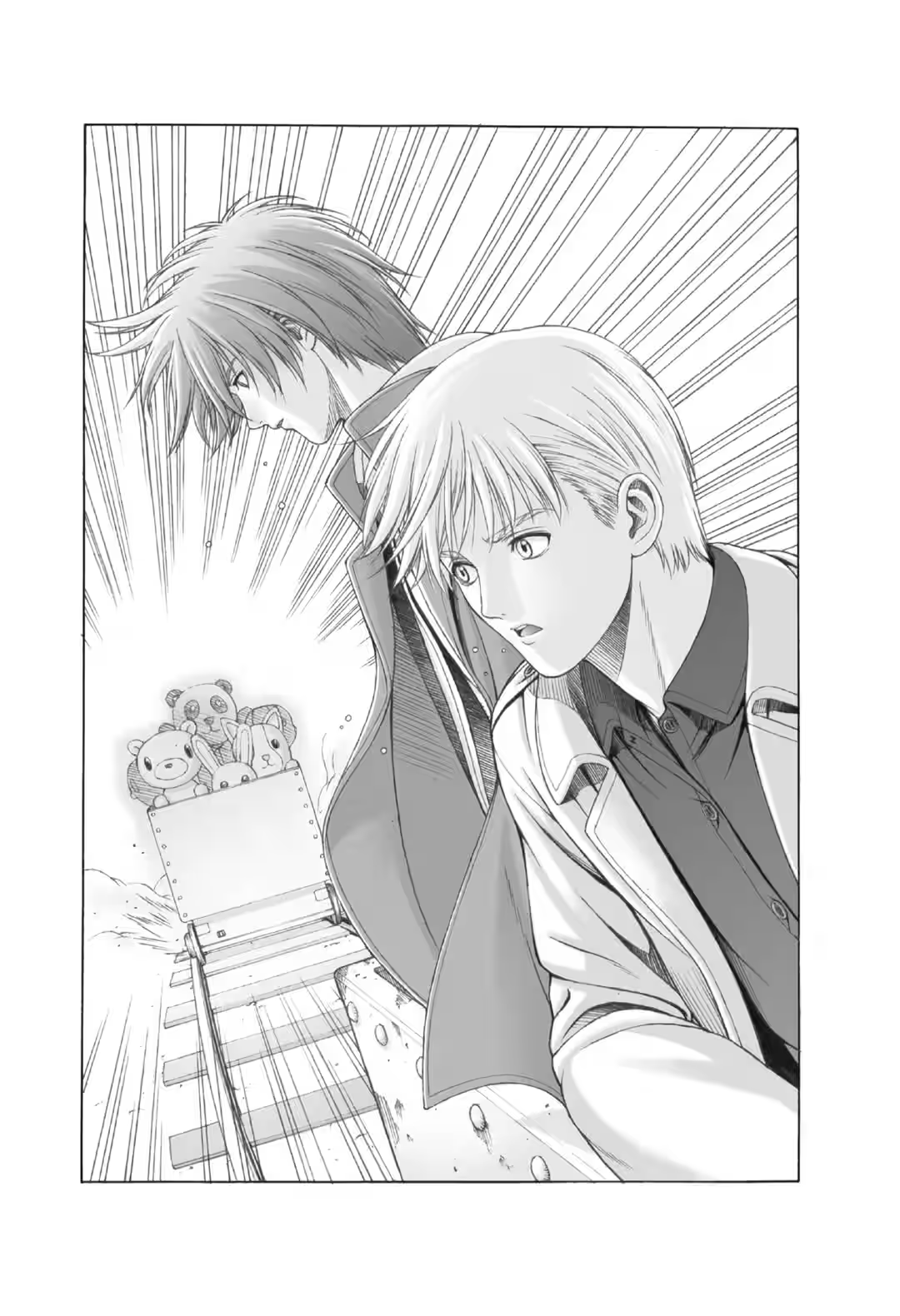
The force of its own attack had temporarily pushed back the other trolley; before it could make its next hit, they jumped out from either side and flung themselves away. The second crash happened immediately afterward, and the trolley truck they’d been riding in pitched right off the tracks and barreled into a building by the roadside. In a real city street they’d be witnessing a tragic disaster, but luckily there were no residents here to complain about the damages.
Harvey rolled out of his controlled fall and promptly got back up again. The dolls that had been riding in the other trolley jumped out one after another on either side of the tracks and stayed divided into two groups that way, each fanning out around its target—Harvey on this side, and Joachim across from him. The dolls’ teamwork seemed surprisingly good. Before long they had him surrounded in a tight, flawless semicircle and were slowly closing in.
His stare never wavering from them, Harvey retreated backward. His back hit a wall after only a few steps, and he heard something clatter to the ground. Glancing quickly over his shoulder, he saw a sort of club lying on the ground with a spiked ball attached to it. Though he’d never actually seen one before, his memory said it was one of those whatchamacallits, those ancient weapons…but what was it doing here?
Harvey cast a brief, wary glance around him. He was standing in a wide-open space. What looked like spectator seating formed an oval that closed him in on all sides. There were two doors, one on each side of the ring, that he assumed were entrances. Weapons of war stood propped against the wall by each one like a collection: swords, lances, axes, shields, and everything else. And then there were the lights: a massive lighting fixture was strung up on wires hanging from the top of a support column. Although only tiny emergency lights were on now, every lamp was pointed toward the center of the ring. Sure, considering that the train tracks were running right through it and all, it did seem like part of the tourist-attraction doll town, but—it was a coliseum.
Whatever bad luck had him facing the enemy in a place like this, Harvey certainly hadn’t seen it coming.
Sizing up the dolls out of the corner of his eye, he went for the weapons behind him. There were so many of them that he froze in indecision for a moment before snatching up one of the single-edged long swords he was relatively familiar with (there were some weapons that might give him a longer reach, like the jointed thing that looked like a bunch of short clubs strung together, but he didn’t know how to use them). It was sized for the dolls, so it was a good bit smaller and shorter than a normal long sword, but that meant it was perfect for wielding with one hand. He wouldn’t be able to swing a regular long sword one-handed.
With a single gleaming swing, he beat back the pack of dolls jumping at him all at once. They smacked against the coliseum’s walls and ground wherever they happened to land, but then they just got back up, necks and limbs contorted at impossible angles, and swarmed once again. The easygoing smiles plastered on their big round faces just looked crazed when you saw them dangling from necks broken at ninety degrees.
“Argh!” There were too many of them; it was starting to get seriously annoying. While he was shaking off one clinging to his back, several more worked together to trip up one leg, and he lost his balance and fell with a surprised “Wah!” to the ground. A mass of dolls was pinning him down in no time.
A jewel!
He’s hiding a jewel!
Take the jewel! Take the jewel!
Their shrill whispers grated at his ears. He was dragged down to the ground by the pack of dolls, and one of them swung an ax straight for his heart. Harvey rolled to one side, dodging by a hair’s breadth, and heard a bone-chilling crack as the thick blade buried itself in the ground where his upper body had been just a split second ago.
Rolling over once and bouncing to his feet at lightning speed, he ended up back-to-back with Joachim (who’d slipped through his circle of dolls too, apparently) in the center of the coliseum, each of them facing off against his personal band of enemies. Joachim’s weapon was a long staff with wedged-shaped blades on each side: one of those giant axes called “halberds” or whatever. This whole town must have “olden days” theming; all the weapons were the kind of classical ones that existed only in historical records from the mother planet.
We want the stones, we want the stones
Big, pretty, sweet candies
Give them to us, give them to us!
The dolls formed a circle around them and pressed in. Dizzied by their lilting half-song, half-incantation whispers, Harvey hissed, “Are these ‘jewels’ they’re after cores?”
“Looks that way. Are they so desperate they even want your broken-down piece of crap?”
“Yours isn’t even real. Just give it to ’em.”
After trading a few snarky comments over their shoulders, they subsided into annoyed grunts.
A wave of dolls gave a queer cry and flew at them; Harvey and Joachim cut them down, but it felt like a drop in the bucket. There were just too damn many of them.
If only there was a way to destroy all of them at once and avoid any more trouble—
The lights.
The lighting fixture hanging from the very top of its thick pillar caught his eye; by the time the word “lights” had finished forming in his mind, his body was already moving. Joachim moved at the same time, possibly with the same idea.
They cut their way through the encirclement with brute force, dragging a few of the dolls on their heels along after them as they made a beeline for the pillar. Running side by side, they exchanged glances.
“Who takes the bottom?” Harvey asked.
“You.”
“Why me?”
“Like you could even climb. I’m on top.”
It didn’t sit well with Harvey, but there was no time to argue about who’d draw the short straw here. They were already right below the lights. Joachim had tossed away the halberd; he started scrambling up the lighting pillar with an open knife in his teeth while Harvey held off the dolls who tried to follow after him, knocking them down like some kind of bizarre festival game. Okay, true, it’d be hard to do the climbing with one arm.
Now he was stuck taking on all the dolls himself, though, which meant he was swamped in no time, and one of them leaped straight at his face and clung on. Seeing its blank, manufactured smile right in front of his eye gave him goose bumps. “Get off!” He immediately tore it away, catching a little of his own cheek in the process, but in the brief moment it obscured his sight, a whole pack of dolls managed to push him to the ground.
“Ephraim, get out of the way!”
At the shout from above, Harvey barked out a panicked, “No, wait a—” But apparently that “get out of the way” was just for form’s sake anyway, because Joachim displayed not the slightest intention of actually giving him time to dodge. He cut the wire holding up the lights without a moment’s hesitation.
The great downward whoosh of air hit first. Harvey somehow managed to claw his way out from under the mountain of dolls one-armed just in time for the disc-shaped lighting fixture to graze the tip of his retreating shoe as it came crashing down.
Their shrill dying screams felt like blades scraping at his skull. Unable to take it, he covered his ears, but just like the gate earlier, the screams pierced straight through his eardrums and bit into his brain.
As Harvey stood gritting his teeth, left hand and right stub clapped to the sides of his head, the cloud of dust and glass shards gradually settled back down to the ground, and he could see again. By then there were no more screams to hear, either; just echoes that sounded like wheels spinning in the air.
Underneath the warped iron framework that once held up the lights lay a pile of crushed dolls wearing broad smiles. Harvey sank to the ground and took great heaving breaths for a while, at which point Joachim came shimmying down the pillar, pretty much sliding toward the end, until his knees touched the rubble and he plopped down next to Harvey in a fit of light coughing.
“…You pay the damages, not me.”
“Whatever, it’s our joint responsibility.”
“I’m making tracks.”
“Me, too.”
A brief exchange where either of them could have been saying any of the lines, and then nothing. They just sat mutely for a while, without further energy to talk or move. Eventually, Harvey managed to breathe a grunt of displeasure at the idea that they’d actually joined forces, emergency or no emergency. That really deserved a more extreme negative reaction than one little grunt, but he didn’t have the energy left for that, either.
Here and there, a doll pinned under the lights twitched as if it had suddenly remembered movement. The motion looked strangely human to Harvey, and something bitter rose up the back of his throat. Anyway, they’d managed to wipe them out, at least.
He let some of his tension relax for the moment and let out a long sigh.
“…Wait, aren’t we forgetting something?”
Something was tugging at the back of his mind. Joachim tilted his head at the question.
“Now that you mention it…”
“What was it?”
As they exchanged quizzical looks, an enormous shadow fell across them. Harvey tipped his head back to look up, his sense of danger not quite kicking back in, and saw a dark-gray suit of armor looming behind him, appearing suspended in midmotion. Its raised broadsword gleamed dully as it reflected the emergency lights.
In the instant that sword was brought down, he and Joachim both made little “whoa!” noises and scrambled away, half-crawling. The tip of the broadsword smashed the piece of rubble they’d just been sitting on clean in half. Harvey confirmed this out of the corner of his left eye and shuddered even as he started to stand up, which was when Joachim’s shoe stepped on the empty right sleeve of his coat. Unable to react fast enough, Harvey pitched forward and fell.
“What the—you son of a bitch!”
“I’ll let you take it from here. I’m sick of this,” Joachim tossed coolly over his shoulder, already running through the spectator seating. Soon enough he disappeared beyond the coliseum wall. “I’m plenty sick of it too, you know!” Harvey shouted pointlessly after him—not that he could spare the time, since the suit of armor was taking a great stride toward him to deliver a follow-up attack. Harvey snatched a large fallen shield from the ground and blocked the blow, but it still sent him flying backward until his back crashed into the weapons collection against the wall. The whole set of weapons collapsed on his head with an almost musical clatter.
“Ow…dammit…”
He silenced the pain in his creaking back, and then the next attack was coming without giving him time to pause for breath. Rolling out of its path and letting the sword bury itself in the wall instead, he grabbed the shaft of the first weapon he saw, which turned out to be a long spear. It was easily taller than he was, and definitely too heavy to swing around with one hand, but he kicked the end up with his foot and managed to get into some semblance of a defensive stance.
The armor yanked its broadsword free with a great heave and turned back to face him, lifting its weapon overhead again like the fool who just repeats the only thing he knows. “You have to do more than just”—Harvey ducked to evade the slash, at the same time launching himself right up against the armor—“swing the damn thing around!”
He put all the weight he possibly could behind it—the momentum of his forward leap, the weight of his weapon, and the entirety of his own body weight—and plunged the tip of the spear into the tiny joint at the suit’s abdomen. It went straight through its hollow torso and came out the back to strike the concrete wall behind. The force of the impact drove more heavy pins and needles up Harvey’s left arm and let them zing through all the bones of his body.
After freezing there for a few moments with his face pressed up against the suit’s breastplate, Harvey let go of the spear and stumbled back a few paces. At that point his knees gave out, and he landed on his rear in the rubble.
When he looked up, his lungs heaving violently, he saw the suit of armor dangling in front of him, staked to the wall with a spear sprouting out of its stomach.
“…And don’t you forget it,” he spat, dropping his gaze and sighing…and seeing the armor’s arm twitch in his peripheral vision.
His gaze jolted back up again. It was lifting the broadsword again, the broadsword it still held even after being pinned to a wall. Unable to move in that moment, Harvey’s eye stared fixedly at the tip of the blade as it swung down toward his head where he sat.
Fwish…!
The blade whooshed by his left shoulder close enough to feel and plunged into the ground with the force of the sword’s own weight, sending up a spray of debris and dust that combed up Harvey’s hair from below.
The right arm that had gripped its sword hung down limply, and the suit of armor went still again, presumably for good this time.
Harvey’s head was just fine, but the experience seemed to have short-circuited his brain for some reason. Stunned and unable to snap out of it, he looked vacantly around him. Overturned trolleys, a wrecked coliseum that looked as if a sandstorm had just passed through it, dolls crushed to scrap wood under the stage lights, and a suit of armor that he was sure had been standing outside the gate until the park closed this evening hanging crucified against the wall like some crazy religious symbol.
When the park employees discovered this disastrous sight in the morning, they’d probably wonder what cult had snuck in overnight and what the hell kind of ritual they’d held here. Harvey didn’t even want to think about it.

Ninety years without slumbering,
Tick, tock, tick, tock
Harvey could hear someone singing softly. It wasn’t singing so much as murmuring, really; a little off-rhythm and a little off-key.
Walking on a bit unsteadily, he began to discern a space like a tiny walled garden in one corner of the city’s slate-gray dimness. The only lonely equipment was a miniature set of chin-up bars, a sand pit, and a swing set; there was no sign of any dolls playing there. A park with no one in it didn’t need any help projecting a poor, run-down aura.
It looked deserted, and yet it wasn’t.
There was a bench wide enough for two people over in one corner, and on it sat a black-haired girl in a black duffle coat, hugging her knees to her chest. Her presence there was so faint and weak that he felt as though, if he didn’t concentrate on her, she’d just melt into the scenery and disappear from his sight. He could see the subtly transparent scenery of the other time there, making her normally pale skin look even bluer, which in turn made her presence seem even less substantial.
His life’s seconds—
The song broke off, and the girl on the bench raised her head.
“You’re so tone-deaf,” Harvey murmured in amazement from the park entrance. The girl quickly plopped her feet down from the bench onto the ground and sat up straight (not that he could see any point in her trying to keep up proper appearances after all this time).
“I wasn’t trying to sing it. I can sing a little better than that!”
“Uh-huh,” he said in a teasing I’ll let that go tone of voice. She gave him a miffed look.
“You took too long to come get me.”
“Yeah…I’m sorry.”
“It’s not your fault,” she said, cutting off his apology with a shake of her head. Hey, make up your mind. She dropped her eyes to her knees and pressed her lips together. It was her same old look, the face she made when she was a breath from crying and yet refused to cry.
Harvey pushed himself off the fence at the entryway and walked over to the bench. He tried to walk as normally as possible, but he lost his ability to balance before he got all the way there; and just as he made it up to the bench he folded at the knees and slumped into a barely controlled crouch. The girl stooped forward and peered at him worriedly.
“What’s wrong…? Are you okay?”
“I’m just tired.”
Without standing up, he hung his head and rested his forehead on her knees. It slid through her legs and smacked against the cold metal bench. He could sense her hand hesitantly touching the back of his head and stroking his hair. He could sense the gesture, but he couldn’t feel the touch.
“You weren’t done with the song, right? Go on.”
“No, you’ll just tease me,” he heard the girl’s voice say above him, a little primly, as if she were trying to act tough. Harvey wished he’d listened a while longer instead of interrupting with stupid comments.
In lieu of singing, she started up another line of conversation. “See, this is a song about how a clock that ran for ninety years starting when the old man was born broke down right when he died, and wouldn’t run anymore.”
“Huh. Depressing song.”
“Yeah…but here’s what I think: The song isn’t really about the clock breaking down. It’s about how the clock was alive. It’s about a clock that lived with the old man from his birth to his death. Even though it knew they’d have to say good-bye someday, it cared about the old man so much that it stayed by his side until then, watching over him.”
“…Huh,” Harvey said, trotting out his favorite handy answer. Frankly, he couldn’t care less what she was talking about. He’d just slid his eyelid shut and lost himself in the voice above him. A voice that blended a little into the dusky park sky and the faint noise at the edges of the night air; a voice neither too high nor too low; a comfortable voice. It was so frustrating that he could hear her, but not touch her.
“Kieli,” he said, finally calling her by her name. It felt like a long time since he’d last done that. “…Are you all right?”
He thought the situation probably called for saying something more than that, but nothing really thoughtful was coming to him. When he pulled his forehead back from the bench a little, there were her scraped-up knees right in front of him. When he lowered his head to rest it on those knees, they disappeared from his vision, and there was only the bench after all.
“Yeah. I’m fine.”
She didn’t sound cheerful, no, but her voice was the same as always. Harvey felt a little relieved.
“See, someone brought me back here. They could tell you had come for me, though, so they left just now. Want to know who it was?”
“Not really…who?”
“It’s a secret.”
Why’d you bring it up in the first place, then? He raised his face to look up at her, slightly disappointed. Her cheeks, just as scraped as her knees, wore an impish smile. “I’ll tell you about that later,” she said cheerfully, but by the time she was finished she’d already tucked the smile away.
Lowering her gaze, she began a quiet, halting confession. “Harvey, I met Joachim…”
“I know.” Harvey could pretty well guess what had happened, so he hadn’t pressed her about it, but maybe Kieli thought she had to say the words to him herself; she went on without lifting her head or heeding his response.
“And he said he’d tell me lots of things if I came to see him, so I went. I heard lots of stuff about the capital, and other things you didn’t tell me.”
“…Yeah.”
“And then I ended up leaving late for camp today, and I was in a hurry, and then there were people following me, and I got scared, and I ran, but they came after me…”
Her tightly clenched fists trembled slightly where she held them against her knees, and drop after clear drop of water fell on the white backs of her hands. “Kieli, you don’t have to tell me now. It can wait.” The girl shook her head fiercely, scattering teardrops onto the bench. However, the drops didn’t stay where they landed. He tried to touch her hand, but all he felt was the bench. Teardrops slid right through the back of his own hand. Harvey didn’t think he’d ever been this frustrated before. He could hear her—she was crying there in front of him—so why couldn’t he reach out right now and hold her?
“Let’s go home, okay?”
“But I don’t know how to get back.”
“It’s okay. From what I hear, if you wish really strongly to come home, it’s not too hard to do.”
“But then it really might be impossible. I mean, right now, I don’t really want to come back…,” blubbered Kieli, still sobbing. It took a second for Harvey to actually register what she’d said, and then he was struck speechless.
After a blank interval of nothing passing between them, he peered at her face and ventured, “…Why not?”
Wiping at her tears with her coat sleeve, Kieli answered in a hesitant, tearful voice. “…While I was waiting for you just now, I started thinking maybe it’d be okay to stay like this forever. I thought…if I stayed like this, I could be with you forever, and maybe that would be better—”
“No it wouldn’t. Don’t be stupid,” Harvey said immediately. Kieli shrank back a little in surprise. However, she didn’t seem inclined to take it back, either. She was wearing a very stubborn expression as she stared at her shoes.
…There she goes into one of her fits of confusing selfishness again. She’d said stuff like this before: “I wish I was a ghost,” or “When I die, I want to be sent out to sea…”
He couldn’t afford to dawdle here very long, either, since he wasn’t about to let anyone brand him as the criminal who’d wrecked the coliseum. Harvey sighed, at a total loss. Then: “…Okay, okay.”
An idea occurred to him. “Let’s do this,” he suggested. “If you can make it back, you can ask me to do one thing, and I’ll do it.”
No sooner had the words left his mouth than Kieli lifted her face alertly. “Really?”
All of a sudden Harvey had a bad feeling about this. Backing off somewhat, he tried tacking on a bunch of conditions: “It has to be something I’m capable of. And short-term. And if you ask for something too hard I’m saying no.”
Kieli dried the tears from her face, reining in her expression almost meekly, and said, “Okay, I have something to ask.”
“What?”
“Well, um…” She trailed off into silence for a second, and then, although Harvey was pretty sure nobody was listening, she leaned over and brought her face close to his. Her lips hovered lightly over his ear, and he heard a soft little whisper.

Damn it…
It got hard to even put one foot in front of the other, and Joachim sank to his knees, cradling his stomach. When he doubled over in a fit of coughing, a clump of dead organ tissue landed on the ground in front of him, twitching for a few seconds as if maggots were writhing around on its surface before all the moisture evaporated out of it unnaturally fast.
All he could see in his darkened vision were his own vomit and the dull black shadows of the tracks. He had little idea of his surroundings, but he was sure the dolls were looking down from the pitch-dark windows of the houses and sneering at him.
His core’s regenerative powers were in overdrive once again, and all the cells of his body had started going haywire. He’d already sensed this coming when he dumped the suit of armor on Ephraim and split, so he’d meant to hightail it out of the park as rapidly as he could, but his core moved faster than he’d expected, and he lost the ability to move before he’d made it all the way.
“Ugh…”
It felt as if somebody’d poured a bucket of overboiling water into his stomach. Unable to stand it, he fell down onto his hands and knees and set to work making his puddle of vomit bigger. He tried to cut off his sense of pain, but every time he threw up another chunk of the guts forcing their way up his throat his concentration was shot, and he writhed in agony. All five of the fingernails on one hand had torn off when he clawed at the hard ground, and blood was seeping out of the wounds. When he made a fist, ignoring that sight, his fingernails got mixed up in the regeneration and started transforming into something grotesquely shaped. Joachim shuddered.
“Help—someone—,” he started to say, and then grunted at himself in disgust. There wouldn’t be anyone around here, and it was even more unthinkable that someone would go to the trouble of coming here for him.
And yet no sooner had he finished the thought than he was surprised to sense someone standing over him. Crouched pathetically on all fours in a pool of his own vomit, he raised his head to see a figure standing on the tracks in front of him.
He felt the letdown right away when he registered who it was. Great, a freaking kid.
A skinny boy was staring intently down at him with dark eyes in this low light. With dark eyes—with eyes whose color depth changed subtly depending on the light or dark of the world around them. Dark gray eyes with a shade of blue.
“You’re—”
The boy took a step closer and reached out his right hand wordlessly. His fingertips touched Joachim’s forehead and kept going, plunging right into his head up to the first knuckle as if he were just sticking them into a mud puddle. Joachim cried out and tried to jerk away, but his body froze over from the forehead down, and he couldn’t move. He couldn’t even feel the touch, and yet there was a definite discomfort, and very real pain where the fingers pierced his forehead.
The boy opened his mouth.
“Thief…” The voice picked up by his ears and the voice flowing directly into his brain through the fingers were just slightly out of synch, so that he heard them separately, overlapping each other, and he was overcome with a dizziness as if his whole field of vision was melting out of shape.
He’d heard that voice before. It sounded almost exactly like someone else’s.
“Thief…Who gave you permission to use my body?”
“Body? What are you talking about, kid? I’m me!” Joachim answered, gritting his teeth against the pain in his brow. It was a bizarre pain that he couldn’t shut down through the normal means. He couldn’t even figure out where or how his sense of pain itself was interpreting the sensation.
The boy lifted his jaw a little, jeering at him. From this new angle, his eyes were a light gray.
“Who’s this ‘me’? You’re nobody. This body originally belonged to me. You’re just a thing, a thing that thinks it’s me when really it’s nothing and no one.
“Get out.
“Get out of my body.
“You didn’t exist to begin with, so nobody will miss you if you’re gone, will they?”
“Shut up and get lost! Stay away! Stop—”
The boy’s fingers sank deeper and deeper into his forehead. From the first knuckle to the second, then the hand, the wrist…when he was all the way to the elbow, Joachim felt his throat being grabbed from the inside, and he couldn’t speak anymore. He couldn’t breathe either, obviously. He just stared wide-eyed at the boy’s approaching face. It was twisted and crazed; Joachim felt as if he was looking into a mirror, and that mirror reflected back at him the most infuriating eyes in this world, more infuriating than those copper ones, even—the slate-gray eyes he hated more than anything else.
“This world doesn’t need you,” echoed his doppelgänger’s voice in his head. Shut up! Joachim shouted back silently, resisting. But the voice invaded even his thoughts, blending with his own voice until This world doesn’t need you shut up this world shut up doesn’t need you he couldn’t tell whose thought was whose anymore this world doesn’t need you this world doesn’t need you this world doesn’t need me—
He could remember it all until the hand reaching down his throat seized his heart, and then nothing.

Kieli brought her mouth close to one ear half-hidden by coppery hair, and whispered a few short words.
Then she drew back a little to gauge his reaction. Harvey just crouched there frozen in front of the bench with all expression vanished from his face, so eventually she spoke up again.
“…That’s a no?”
She’d thought it qualified as something he was capable of, and as something not only short-term but momentary.
“…Is it too hard?” Kieli asked, looking straight at him even if she let her eyes lower a little. Harvey himself broke the eye contact, seeming uncomfortable for some reason, and put his hand over his mouth, mumbling, “No, it’s not hard, or anyway it’s not hard for me, but—no, wait! Look, that’s not the issue…”
He was totally floundering. Kieli’d said her piece fully prepared to be turned down flat; she hadn’t thought he’d be so genuinely rattled. Just getting to see him look this flustered felt pretty satisfying all by itself—
“Huh…?!”
It felt as if someone were grabbing her by the back of the collar and yanking. At the same time, in the corner of her vision her own hand blurred shakily for a moment. There was no one behind her, of course. “Harvey, there’s something wrong with me…” She raised her hands in front of her and flipped them over a few times, watching them. Like a bad video feed, they shook periodically and went fuzzy with signal noise, and then the video began steadily breaking up into individual little particles.
Kieli knew the rest of her body must be doing the same thing, too, because Harvey was gazing at her in shock.
“I—guess you can get back after all?”
“Huh? That’s not fair! I haven’t wished to go home yet—,” she cried frantically, though wasn’t sure who she thought was being unfair, and then—
A heavy roar sounded, like something collapsing far off in the distance, and the whole area around them shook.
Harvey got to his feet at once, his face tensing. Kieli stood up from the bench, following his example. Fine sand dribbled down from the walls of the homes surrounding the park, and the chains of the empty swing began squealing insistently.
“What is that…?” Harvey muttered, looking warily in the direction the sound had come from. Even as he spoke, Kieli’s sense of being dragged by something intensified until the whole park was blinking in her vision and filling with static. Probably Kieli was the one blinking, though, and not the park.
“Harvey, what should I do…?!”
“You go on ahead to the camp. I’ll be back there soon too.”
“No, I want us to go together!”
Kieli fought the dragging force at her back, trying to cling to Harvey’s arm, but she slipped right through it, and suddenly with nobody touching her, without even any air resistance, the sight before her eyes was receding into the distance as if she’d been blown backward. “Don’t forget, Harvey, you promised me—” Even her own voice was abandoning her, slipping away, and that was all she could get out before
Boom!
An explosion, and white smoke billowing up into the sky in one corner of her vision.
In her rapidly fading view of the park, she could just barely make out a person rushing straight out of the collapsed wall. A green giant—!
She saw Harvey look over his shoulder and say something, but at that exact moment her vision was suddenly cut off like a signal being lost. All she had left at the end was her hearing, and it picked up the edge of his voice in the darkness.
Roger.
That night, he changed out the old hallway lightbulb. Evidently it’d been burned out for quite a while now, but it’d be dangerous for his mother to climb on a chair and stand on tiptoe to reach it, and his younger brother Toby wasn’t tall enough to reach it even on a chair.
I’m glad I came home.
It was such a little thing, really, but Christoph felt so satisfied as he carried the chair back inside and returned it to where it’d come from. There on the kitchen table was a basket holding three glossy yellow apples. He tilted his head, trying to remember what day it was. There was no breadwinner in their household; they certainly didn’t have the money to be bringing home fruit when it wasn’t a special occasion.
He figured it out right away.
“Toby,” he called as he put away the chair. His brother was reading a book in a corner of the room, looking innocent. As if reading weren’t the last thing he’d normally do—not to mention that this book, an old, thick volume of the collected Epistles of the Eleven Saints (someone had given it to them a long time ago, and it was the most expensive book in their meager collection), had to be too hard for him; and what’s more, Christoph doubted Toby would even be interested in it. Though he imagined their mother would be happy if Toby were…
Toby lifted his gaze from the book, and started making preemptive excuses before he’d even so much as opened his mouth to say “apple.”
“Oh, right, those. Someone gave them to me. Don’t they look good?”
“You’ve been stealing, again?”
Thus confronted, his brother made an “oops” face as if he knew he was in trouble, but then unexpectedly turned defiant and came back with a sulky, “Jeez, what’s the big deal about two or three apples? That fruit seller’s dog’s bitten me before, you know. Now we’re even.”
“Go, give them back,” answered Christoph, taking a bit of a stern stance as the older brother in the room. Not that it came off so cool, considering his words came out clumsy and without inflection.
“It’s okay, I’m telling you, nobody’ll know it was me. If I go give them back now, that’ll give me away. I want Mom to have one.”
“It’s not about whether you get caught. This kind of thing, won’t make her happy. Go on, give them back.” He shoved the apple basket at Toby. Toby took it, but then tossed one of the apples back to him with a sullen look.
“Sheesh, it’s not worth getting so worked up ab—”
The sound of a sudden squish coming from his own hand startled him. His brother gulped and stopped talking.
When he looked down, he saw that he was crushing the apple in one hand. Cloudy juice seeped out from between his fingers and dripped onto the floor. But I didn’t think I gripped it tightly at all when I caught it—why—?
As he stared aghast down at his own fingers, still clutched tightly around the ruined fruit, Toby sing-songed, “Uh-oh, now you’ve done it. Now you’ve done it!” He started jumping around him in circles as though this was some kind of children’s game, babbling Now you’ve done it over and over. “Don’t blame me! We can’t give it back now! It’s your fault!”
“Shut up!”
All of a sudden the sound of his younger brother’s jeers was really getting on his nerves.
The apple basket fell to the floor, and the yellow apples rolled around at his feet. “Huh…?” His brother’s body slid down the wall and crumpled to the floor, leaving a trail of blood in his wake as if someone had flung the flesh of a red fruit there.
For a moment Christoph didn’t know what he’d done.
“Toby…?”
You’re over-acting; all I did was push at your shoulder a little! This is just teasing, teasing that I’m so slow…
However, his brother stayed slumped against the wall, unmoving. He showed no signs of jumping up and laughing, “You fell for it!” What’s wrong with him? Something’s strange…something’s strange…
“Hey, Toby…”
As Christoph timidly ventured toward his brother, he heard a sound behind him.
His mother was standing in the doorway. Clutching the ends of the shawl around her shoulders with trembling hands, she stared ashen-faced at the sight of her older son standing rooted in place with an apple crushed to pulp in his hand and her younger son collapsed on the floor bleeding from the head.
“Wh-what are you doing…?!”
“Mom, wait, you have it, wrooong…” He couldn’t quite wrap his tongue around the end of the last word, and it stretched out low and long like a groan. The hand he reached out in an appeal for help was bony and misshapen, with soggy fruit pulp sticking to its greenish skin. His mother recoiled in plain rejection, and covered her mouth with her shawl. She’s going to scream at me again…!
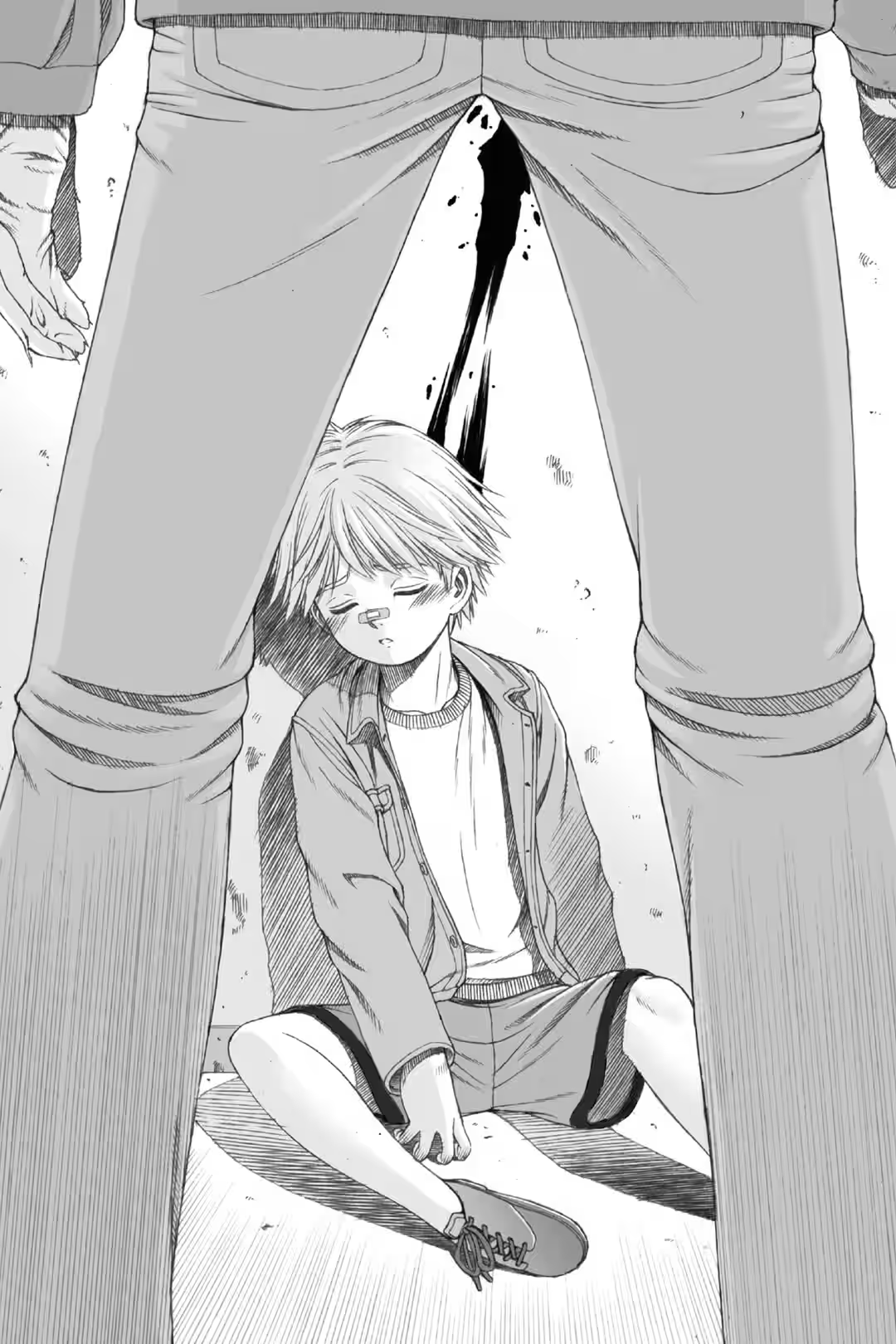
Kill her—
Someone whispered in his head. All you have to do is kill her before she makes a fuss; it’ll be easy if you just squeeze her throat; come on, do it just like you did to your brother—STOP IT! With a strangled cry, he held his head in both hands and tore off running toward the window with exaggerated, sweeping motions, as if he could shake off the voice that way.
He rose light as a feather into the air with just a tiny push off from the floor, and jumped right through the windowpane out into the road. The skin he’d cut on the shards of broken glass was already healing in the time it took for the cuts to register in his mind. He crashed square into the wall of the building on the opposite side of their street, and then took a ninety-degree turn without giving a thought to left or right. As he burst into the main road, he bumped smack into a woman passing by.
As soon as she took in his appearance, she opened her mouth in the shape of a scream. He reached out a hand to cover her mouth, but before he knew it the hand was gripping her by the throat and preparing to slam her into a wall. He let go with a start and reeled unsteadily backward, panting. Then he spun on his heel and ran.
A beat later, a shrill scream sliced right through him. A passerby walking in front of him turned in surprise at the sound; he should mow down this one before he had a chance to scream at all—No! That’s not right! Right in front of the man, he changed direction and charged into the road itself.
Help me, help me…!
Over and over as he ran blindly through the city, he ran across other pedestrians and got screamed at, and each time he changed direction and ran away. He had a horrible feeling that if he got too close to someone he’d kill them, and that simple terror kept him running, searching for somewhere with no people. But where in Westerbury, of all places, was there somewhere with no people in it?
Desperate with impatience, he looked around. An indistinct white moon hung in the sky in front of him. There ought to be two moons, but he could see only one, with the black shadows of two needles falling across its surface.
That’s…
The clock tower of the park. His heart began to ache. He’d promised Toby that they’d go there together sometime. When he’d tried to refuse the invitation at first, saying he couldn’t go outside, his brother had snorted proudly and whipped out something he’d been hiding behind his back. A wool cap that covered the whole face except for holes for the eyes, nose, and mouth. Toby’d said he would be fine wearing that; he’d answered with a wry smile that he’d just look a different sort of suspicious, but he’d pinky-sworn to go all the same. His finger was warped and crooked, its skin puckered, but his little brother had wrapped his own young finger around it without hesitation.
“Freeze!”
Truck headlights came to a stop in front of him amidst the sounds of commanding voices and many squealing brakes. Armored men with long shields swarmed out and aimed bayonet guns at him. Bayonet guns? These weren’t the Church Soldiers who carried those horrible big-bore guns that hurt. As long as he wasn’t facing one of those, it wasn’t too scary. Hollering a war cry, he ignored the commands to stop and charged right through them.
From the other side of the wall of interlocking shields, gun after gun spat fire. He jerked backward briefly, pierced by several rounds at once, but they’d started to heal by the time he regained his footing. See? You can’t hurt me with those things!
…Huh?
Even though his wounds were half-healed already, the pain was getting worse and worse. Heavy pain, as if someone had pounded wedge after wedge into the very heart of his body. The bullets had bitten into his flesh and stayed there, and now his regenerating cells were taking them in, pushing them deep into his body. It hurts, it hurts, it hurts, it hurts…Why is this happening to me? I haven’t done anything. I’m just running.
Kill them, kill them—
He heard that voice whisper again. They’re all trying to kill you; your only choice is to kill them before they get you—SHUT UP! He shook off the voice and plunged through the Church Soldiers’ barricade to make a beeline for the clock tower. He could hear trucks and gunfire chasing after him—but I won’t die from that. Please, I’m begging you, don’t follow me!
I don’t want to kill anyone! I have to run away to someplace where there’s no one around, so I won’t kill anyone. If someone tries to stop me, I have to get away no matter what, even if it means killing them—
He didn’t notice then that he was taking leave of enough of his senses not to notice that he wasn’t making sense.

Bearfoot screamed again and flattened himself on the floor as the one-legged soldier sliced the saber through the air over his head with a yell and split the black shadow attacking them in half. But there were too many; eliminating one or two of them hardly seemed to reduce their numbers at all. They kept on leaping one after another out of the corner of the trailer like waves of black water, and making for the body of the girl sleeping in the bed.
“Dammit, there’s no end to them,” groused the soldier’s ghost irritably as he fought them off. Then he called abruptly, “Hey, you!”
“Sir?!” Bearfoot squeaked, still holding his head.
“Grab Kieli and me and get out of here!”
“U-uh…when you say ‘me’…?”
“Don’t you get it, you halfwit?! The radio, obviously!” the soldier barked. He sliced through a new shadow springing at him with one flash of his saber. Well, it was easy for him to call that obvious, but—“H-how was I supposed to know?!” Bearfoot half-wailed, crawling for all he was worth toward the bed, pulling the limp Kieli into his arms, and seizing the cord of the radio on the folding chair.
With no tension in any of her muscles, the girl’s slight form felt heavy as a corpse. Shielding Kieli’s head and keeping himself low to the ground, he darted through the black shadows and dove through the curtain across the doorway out of the truck.
“Okay, sir, now what?!”
“For now, just run straight!”
“What, that’s it?!” I thought he had some amazing master plan or something!
The evil spirits that had made it out of the truck followed them through the air, forming a swirling black mist. Bearfoot ran for the camp clearing, cradling Kieli and looking over his shoulder every moment.
Particles of noise spewed out of the speaker of the radio strapped to his hand and gathered together to form an indistinct human face. The enormous form of the soldier writ upon the nothingness in midair glared at the mist overhead and opened its mouth wide—
“Get lost, every last one of you!”
With a roar, an invisible blade shot out of the speaker, slicing through the air clean and deadly toward the mist and piercing right through it. “Gah!” Bearfoot, knocked over by the recoil, tumbled to the ground and rolled, Kieli in his arms. He managed to protect her through desperate force of will as the hard ground hit every last centimeter of his back until he thought his soul would literally fly out of his mouth.
“Oh, ow, ow, ow…”
If he could just actually pass out and let his mind slip free for a while, he could evade the pain, but unfortunately the blows to his head weren’t hard enough to knock him out. At last they came to a stop and he sat up, coughing at the creaking pain in his back. Instead of standing, he raised his face dumbfounded to the sky.
The black mist had vanished, leaving nothing behind but a few wisps of signal noise. The post supporting the camp light, which had been in the path of the shock wave, was warped in a mushy-looking sphere shape like a candy sculpture.
“Wow…,” Bearfoot breathed admiringly before he’d thought not to.
“Heh. Well, now you’ve seen…a pro…at work…”
Static began to mingle into the boastful answer partway through until it eventually broke up. When he looked down, little tendrils of smoke were rising from the radio on the ground at his feet. The soldier’s ghost was nowhere in sight, either. The only ones here in this clearing surrounded by trailers were Bearfoot, slumped on the ground in its center, and the girl sleeping beside him. Other than the deformed light post, there was no sign left that this had been the site of a desperate battle of offense and defense mere seconds ago.
Well, that was all settled, at least. No sooner had he let his shoulders slump and given a sigh of relief than a voice above his head said, “What are you doing?”
Bearfoot forgot to inhale the next breath. It was a low voice full of anger; a voice even more terrible than the enraged shouts of the dead soldier; a voice that sounded like a lethal weapon all on its own. Come to think of it, what must I look like I’m doing right now, carrying an unconscious girl outside while nobody’s around and rolling around in the dirt with her?
He twisted his neck jerkily around to look up at the man behind him, slapped a fake smile on his face, and gave an experimental “W-welcome back, sir…,” just in case that would help.
“I asked you what you were doing,” their troupe leader repeated without softening his forbidding look one whit. He folded his arms and proceeded to loom over Bearfoot from behind.
Mr. Harvey…
Bearfoot prayed even more fervently for the redheaded man’s quick return than he had when the evil spirits chased them out of the truck. For him personally, this was the greatest and most mundane pinch he’d been in today—whether or not he’d be able to keep eating and sleeping here was on the line.
His prayers weren’t answered, but another savior appeared much closer to home.
“Nng…nn…”
The girl cradled in his lap began to groan. When Bearfoot looked down, hardly daring to hope, the eyelids that had been so firmly closed flew open, and she sat straight up. There she was, wearing a camisole and sitting on his lap with his arms around her as they gazed into one another’s eyes, and Bearfoot’s heart unthinkingly began to race at this happy state of affairs until she opened her mouth to speak her first word, which was “Harvey!” and then unceremoniously shoved him away. The back of his head knocked against the ground. When he looked up, the tip of the troupe leader’s shoe was resting right up against the crown of his head.
“Kieli, so you’re awake. Are you okay?” Shiman asked, concerned, his anger relaxing. As Bearfoot stayed sprawled on the ground, lamenting his broken heart to the skies, Kieli all but stepped on his chest in her hurry to get to Shiman.
“Sir, please take me to the park! It’s Harvey!”
“What’s gotten into you…?”
“Sir!” broke in a new voice, accompanied by crunching footsteps. Bearfoot’s coworker and partner in crime, Rat, entered the patch of sky in his field of vision. After Rat had called for their leader, he happened to glance down at Bearfoot’s face. “…What are you doing, man?”
“Oh, nothing,” Bearfoot answered vaguely, earning himself a funny look from his friend.
The formerly silent nighttime campground was starting to get pretty noisy.
“Did something happen?”
At the troupe leader’s question, Rat turned back to him and refocused. “Seems like the whole town’s in an uproar, saying there’s a monster on the rampage.”
“Monster?”
“I don’t really know, but anyway they told me it ran into the park and holed up there.”
Bearfoot half-listened to this exchange from flat on his back on the ground. He felt as if he’d missed the right time to get up, somehow.
His vision was still blanketed by a cloudy sky the color of dark slate, without a glimmer of dawn in sight.
It looked like the eighth night of Colonization Days wouldn’t be over for a while yet.

The last two days of the Colonization Days holiday began in the morning, and Harvey figured the park had probably been planning to liven things up with a special finale, but either way he doubted they’d be open for business at all come tomorrow. It was in no way the time for him to be casually thinking about stuff like that, but think about it he did, feeling pretty indifferent about the problem.
He tested his body to see if he could move.
He’d slammed back-first into the playground’s far wall, along with the bench and swing, and that had been quite enough to leave him down for the count for a while. Now, when he managed with some difficulty to pull himself out of the rubble his back was buried in, one or the other of his bones made a funny noise. The physical damage had definitely piled up during that battle in the coliseum, and evidently he was now hitting his limit.
No sooner had he pushed his body up alongside the wall to a standing position, coughing, than the figure in front of him jabbed straight for his throat. Throwing himself back against the wall as far as he could, he grasped the other man’s wrist and squeezed bare millimeters before it reached his throat.
Then Harvey heard a disgusting wet sinking sound coming from inside his own neck. Five freakishly gnarled fingers dug into it all the way to the knuckle, cutting off his breath. Clenching his teeth, Harvey concentrated all his strength into the grip of his left hand and narrowly managed to halt the fingers where they were, though they were still trying to work their way even deeper into his throat. He traded glares with his opponent at their close range.
Tight, desiccated skin and bulging lidless eyeballs. Harvey didn’t know where the other man had gotten his injuries, but his clothes were in tatters and black blood like coal tar oozed from all over his body. He quickly realized it was coming from bullet wounds.
“Ngggnngghhh…” The moan never formed words. The man’s spinning eyes that couldn’t quite settle on a focal point conveyed his confused thoughts to Harvey loud and clear, however.
It hurts kill them humans hurts kill them all…
No matter how you sliced it, Harvey was at a definite disadvantage in terms of power—with their reason impaired, they were governed by aggression, and they didn’t seem able to rein in their strength. The fingers were gradually digging deeper.
“Chr…is…”
Harvey used up every scant molecule of air in his throat to squeeze out the name, and the other man’s shoulders twitched as if perhaps he’d recognized that he was being addressed. For a moment, his hand relaxed around Harvey’s neck as he gave a pained groan. Harvey seized the opportunity and kicked him off, regaining his breath. Breath or no breath, though, he couldn’t move right away; he crumpled and slid down the wall to the ground, coughing violently.
Christoph didn’t seem to have hit an artery, but blood nonetheless welled up from the base of his neck as if someone had pulled out the stopper. It felt as though it’d get really bad if he didn’t do something about it, so he concentrated his attention and at least closed up the surface of his skin, forcing himself to ignore the throbbing that always started up deep in his right eye socket when he healed himself. As for Christoph—
“Ugaahh!”
Christoph, who had been holding his head and moaning, suddenly gave a ferocious roar, turned around, and took off running in the opposite direction. There was a wall in his path, but he crashed right through it as if he hadn’t seen it, and tore off into the clockwork city.
“Wait…” Clutching his neck, he struggled to his feet. “Chris, wait!”
Harvey rushed out of the playground after the other man on slightly unsteady feet, but by the time he’d gotten back out into the street, Christoph already had a giant head start. He looked small now as Harvey watched him from behind, destroying whatever he came across as he ran, disregarding the winding path and simply cutting straight through the town. He was heading for the tall tower at the center of the clockwork city. In the night sky overhead—and this was the one thing to be seen that wasn’t set against an artificial sky backdrop for dolls, but the real sky—the clock tower’s round clock face gleamed hazily.
“Chris, I’m telling you, wait! You recognize my voice, right? Listen to me!” He shouted to the man in front of him as he gave chase, then gave a hiss of irritation and began grinding his back teeth.
He’d half had the feeling this might happen one day. Still, the hunch didn’t exactly tell him how it could be avoided, and he suspected the truth was that it couldn’t be avoided. That didn’t make him any less exasperated with himself for not finding a way.
Up ahead, Harvey saw a house with an elaborate scene of a chimney sweep taking a break to play with a little bird on its triangular roof. Christoph barreled through the house’s wall without paying it any mind, tilting the roof where the doll stood and running through to the other side. Immediately after Harvey slipped through the crack in the wall after him several moments later, the whole wall crumbled at his back, taking the dolls on the rooftop with it.
It was chilling, but he retrained his gaze in front of him, at which point he realized he’d lost sight of Christoph. He could see the evidence that the other man had charged on straight ahead, so he followed the trail of wreckage farther along.
He found himself in a long, narrow, closed-off space with a peculiar smell of fuel and rusted iron that reminded him of the bottom of a sand ship. Piping and gears fitted vertically and horizontally together in all directions jostled against each other in the cramped space, making it even more claustrophobic. This must be the power area where they operated all the clockwork houses and dolls from behind the scenes. The steam engines didn’t seem to be running right now, of course. In the glow of the emergency lights, the contours of the stationary gears rose out of the gloom like a collection of megalithic monuments made by some ancient culture.
“Chris!” Harvey’s own voice echoed dully back to him in the enclosed space.
Then he began to hear the low clang of a motor drifting back to him from somewhere up ahead. Squinting, he saw that in the deepest section of the otherwise dormant power area, a lone set of gears was moving.
All sorts of different gears interlocked together in a tall column that reached the ceiling and disappeared into the darkness beyond it; the smallest of them was still wide enough in diameter that it looked like an adult would have room to lie down on it. It was all set up in a long, narrow vertical space like a tower. A steep spiral staircase ran along the inner wall.
If there was one machine that would be running after the park closed, of course it would be the clock in the tower. Gong, gong, gong…Now that he knew what to listen for, he could hear that the low clanging that reverberated in his gut was pounding in time with the enormous pendulum hanging from the ceiling, beating precisely once per second.
A figure crawling from gear to gear up toward the ceiling caught Harvey’s eye.
“What are you climbing up there for?! Get down here!” he called from directly below.
“Gnnaaagh!” Christoph didn’t form words, but he raised one hand and punched a nearby gear as if to tell Harvey to stay away. The gigantic gear cracked, and Harvey took cover, barely escaping before chunks of it came tumbling down on him. They sent up a massive cloud of dust at the walled-in base of the tower. Meanwhile, Christoph climbed up and up and up, haphazardly destroying his own footholds as he went until Harvey was sure he’d fall too.
“What are you thinking?! Right, you’re not thinking at all, are you?!”
Harvey reluctantly circled around to the staircase along the wall and started running, taking it two or three steps at a time. Scrambling through the gaps between the moving gears seemed to give even Christoph a hard time, so thankfully the stairs were faster, if only somewhat. Harvey caught up to him about halfway up, and called over the railing, “Chris, go back down; that’s dangerous!”
But Christoph merely kept climbing on and on, occasionally losing his footing, and showed no signs of stopping. Harvey’d only get left behind if he stood around here, so he clicked his tongue irritably and gave up on talking. Instead, he poured all his energy into sprinting up to the top of the stairs and rushing into the loft between the ceiling and the roof.
“…I’m…” I’m definitely getting weaker, Harvey complained mentally. He was breathing too fast to get all the words out. With each ragged breath, his lungs gave a weird, creaking scream. My lungs’ve gotta be losing their ability to purify air by now anyway; maybe I should start smoking a little less, he thought (as if he’d ever actually act on that). Leaning his hand on his knee, he stopped to rest just long enough to suck a good breath down, and then quickly raised his face again and took stock of his surroundings.
He seemed to be in the very tip of the clock tower. A domed roof hung over his head, and arched windows in three of the walls let the wind flow in from outside. The large round steel plate fitted into the remaining wall must be the back of the clock face. The clockwork machinery coming out of the floor all came together there.
Gong, gong, gong…
The second-by-second vibrations filling the domed space echoed heavily in his chest, dragging his heartbeat along with them and making him feel sick.
There was a great circular hole in the middle of the floor, where four support pillars rose up into this space from below: one from the center of the hole, and three around the edges, holding up the gears and the enormous pendulum. When Harvey got down on his knees beside one of the pillars and peered over the edge of the hole, he could see Christoph climbing up the gears toward him. The whole mess of gears was beginning to crumble from the ground up thanks to Christoph’s own destructiveness.
“Chris!”
As Christoph raised his face in response to Harvey’s voice, a large crack appeared in the gear he stood on.
With a tremor that shook the very air around them, it fell apart beneath his feet, and his hands scrabbled for purchase against thin air. Harvey half-lowered himself down through the floor and grabbed one of those hands just before it slipped away, but that meant a heavy weight wrenched at his left shoulder, and he only just barely managed to hold his ground by hitching what remained of his right arm around the support pillar.
Then Christoph uttered the first actual words Harvey’d heard from him so far.
“Nggh, don’t touch, me…!”
“Wah, you idiot!”
The other man was kicking wildly with both legs, trying to escape Harvey’s hand, which put so much strain on his shoulder that it was seriously not funny. He clenched his teeth, feeling the fracture in his left hand lengthen unmistakably, and wrestled his sense of pain into submission.
Below Christoph’s struggling feet, one set of gears had escaped collapse and retained its function, turning around and around with a ponderous grinding noise. Harvey didn’t even want to imagine what kind of mottled mincemeat a person would turn into if they got dragged through those gnashing teeth.
“Please, don’t touch, me! If you, touch me, I’ll end up, killing you! Let, me go, please!”
“Just stop squirming around, or we’ll fall!”
“Let me, please, let me fall, I won’t die, even if I do fall!”
“You might not die, but it’ll hurt! Even if it hurts so bad you want to die, even if dying would be a hundred times better, you won’t die—imagine that for a second!”
“I-I don’t want to hurt! I don’t want to hurt…!”
“Obviously! I don’t, either!” Harvey yelled, the other man’s wrist slipping abruptly in his grip. Christoph uttered a short scream. For a moment he almost lost hold, but he managed to regrip, and so the only thing that fell was one of Christoph’s shoes, which slipped off and was swallowed up by the enormous clockwork mechanism below. His mother must have bought that pair for him after he was welcomed home; it was a cheap shoe, but it was brand-new, and it pained Harvey to watch it get crushed between the teeth of the gears before it disappeared.
“You have to grip me back; I’m not strong enough by myself!”
“But, I, I—”
“No buts! Cut the crap and—” This time Harvey thought he might scream; he closed off his throat before any more sound could escape. The bones of his left hand creaked, and an excruciating pain shot through his shoulder.
Hesitantly, Christoph gripped back at his hand. Now instead of a dead weight dangling from his shoulder, Harvey had a grip so tight around his wrist that it felt as if it might rip right off. He winced, but it was still a relief; he let the muscles of his left hand relax a fraction and used every ounce of his strength to drag the other man’s large, heavy body up, supporting himself with his right arm around the pillar. When he’d gotten as far as the edge of the hole, Christoph crawled up the rest of the way on his own power. Relieved, Harvey let the ball of tension in his stomach relax, and his entire body went limp with it.
He sank to the floor, more or less slumping on top of Christoph’s back where he lay curled up on himself, and took a breath. His jaw just brushed Christoph’s blood-smeared back, which trembled beneath him. Coming from further below him, he could hear the sound of sobbing. The tears that trickled to the floor weren’t transparent; the fluid was cloudy.
“Toby,” he blubbered, “I hurt, hurt Toby…I only, pushed him a little, but there was so much, blood…Mom was, scared, so I ran…and then, everybody chased me, and it was, sca—sca—”
“Yeah, it must’ve been scary. It’s okay now; nobody’s here chasing you now.” His hand was useless; he couldn’t rub Christoph’s back if he wanted to. So he just said soothing things.
“Yeah, I was scared, I was so scared…,” Christoph mumbled in a muffled voice, rubbing his forehead against the floor as if he were confessing his sins to Harvey. His back shook.
Christoph’s bizarre fingers were still clinging to Harvey’s left wrist, digging in deeply. Harvey couldn’t really tell so well anymore how much pain he was in, so he chose not to think anything about this beyond, “I bet that’ll leave a bruise.”
“I’ll, I’ll be one of them, soon…I’ll be like the other, monsters, at that place. I’m already, turning into that…I’m scared, I’m scared…”
“It’s okay, Chris, you don’t need to cry.” What’s okay about it? he asked himself silently even as the words came out of his mouth. He didn’t know himself what that was supposed to mean. In fact, the longer this went on, the more he was forced to realize that nothing was “okay,” and yet until Christoph calmed down a little and stopped crying, Harvey sat there over the other man’s back as he repeated the words “I’m scared,” and answered “It’s okay” over and over. The sound of the huge running clock kept on beating dully, heavily against his eardrums and heart until it made him want to vomit, and that was his only solace. It threw off his sensibilities along with his heartbeat. He couldn’t summon any particularly deep emotions.
Eventually the sobbing quieted down at last, and by then the fingers biting into Harvey’s wrist had loosened. When he attempted a very slight tug, he was freed easily.
“Let’s get down from here. You have to go home and check on Toby, right?” he asked the back of the man below him. Christoph nodded, though he still sniffled occasionally, and sat up.
“I, have to say, I’m sorry, to Toby.”
“Yeah.” Harvey nodded, trying to stand up. He got only halfway before he fell flat on his ass. He hadn’t planted his hand right, because he couldn’t feel it. Christoph, who’d gotten up already, cocked his head in confusion; he probably wasn’t aware that he’d been gripping Harvey’s wrist like a vise all that time. “You can’t stand?” he said, offering a hand to help him up.
Harvey flinched slightly. He had a hunch that if Christoph gripped his wrist again it would shatter for sure this time. Still, it’d be too much of a hassle to stand up on his own power, so in the end he obediently reached out his hand. Before they made contact, though, all of a sudden a blinding glare hit him in the face over Christoph’s shoulder.
A harsh white light was shining through the wall’s arched window from below. Is that a searchlight—?
“Ugh, what’s that?”
Christoph turned and started walking over to the window. Startled, Harvey called, “Chris, wait—” But in the same moment, several rounds of gunfire echoed outside. Thick sounds like bursts of compressed air—
carbonization guns—
and then—
Boom, boom, boom!
Three shots. The first two dug big chunks out of the arched window frame in deafening blasts; then Christoph was exposing himself to view in the white light, and the final shot hit him square in the chest.
In a strange slow motion, as if to deliberately, stubbornly burn the sight frame-by-frame into Harvey’s brain, Christoph’s body tilted backward. And with the violent thunking sound of a heavy suitcase being tossed on the floor, his giant form fell at Harvey’s feet in a cloud of dust.
Not a single drop of blood spilled out of him. The center of his chest was a hollow half-sphere of nothingness, as if the whole complex network of human innards it should be stuffed with had never been there at all; as if his rib cage had always been a void. At the bottom of the cavity, the heart buried in his innermost depths was exposed to view. A misshapen black stone, slightly larger and coarser than the real ones.
Still unable to stand, Harvey crawled over to him on elbows and knees. “Chris…!” he said, searching his face. Christoph was convulsing violently and darting unseeing eyes around the emptiness in front of him, but at that he seemed to register Harvey’s face, and looked up at him pleadingly.
“Hurts…it, hurts…”
Cloudy tears streamed from both eyes. His misshapen fingers twitched as they wandered in the empty air as if tracing some kind of pattern there, until they lightly brushed Harvey’s cheek.
“It, hurts…help me, please, help me…”
Harvey couldn’t answer him. He only shook his head, biting his lip hard enough to cut right through it.
Wounds from a carbonization gun couldn’t be easily healed, but Christoph didn’t have the ability to block out pain. Here he was, wrecked, carrying enough pain that death would have been preferable, and yet he couldn’t die or even lose consciousness; he could only keep moving—
Harvey’s left hand was so numb that it took him a moment to realize someone was holding it. Christoph tugged his hand over to the cavern in his own chest. Over to the stone he could see at the bottom of the cavern, to be precise.
“Kill me, kill me, please, take this…”
“What the hell are you talking about?!” Harvey tried to shake him off, but Christoph forced his hand closer to the stone where his heart should be with a strength he was probably unaware of. The bones of his captured hand creaked.
“I don’t, want to hurt…I don’t, want to suffer, anymore…Kill me…”
“That doesn’t mean you can…!”
“Please, I’m asking, you…”
“Don’t you—,” Harvey started to yell, and choked on his own breath. “Don’t you push a job like that on me!” He yanked his hand out of Christoph’s grasp, no longer caring what happened to the bones and tissues inside it. After the rebound sent him tumbling backward into the clock face, he regretted shouting.
When he raised his face to apologize, a figure was standing in front of him.
Shunk.
The heavy yet somehow inane sound of piercing flesh. The blade of a broadsword impaled the center of Christoph’s chest where he lay faceup, and his upper body bent sharply backward just once. The black stone that came tumbling out of the cavern in his chest rolled along the floor with strange innocence, like a child’s toy ball, and was swallowed up by the hole in the floor where the gears came up.
Shkreeuuhhh…
With one last grating creak of the gears, the loft that had been filled with such maddeningly loud machine noise went silent.
The clock behind Harvey had stopped.
Christoph wasn’t moving anymore, either. The two things happened at the exact same time, as though Christoph himself had been the great clock’s power source—it stopped as he stilled on the floor, cloudy tears trailing from his lidless eyes, and the hand Harvey’d shaken off reaching out toward him as if to follow after him.
Then the broadsword was casually pulled out of the now heartless corpse. It was the sword from the suit of armor he’d left skewered to the wall back in the coliseum.
His mind still somewhat vacant, Harvey looked up at the person standing in front of him holding the naked broadsword. “Joachim…,” he rasped.
Those blue-gray eyes steeped in the darkness of the loft glanced emotionlessly down at the corpse at his feet, then lifted ever so slightly in his direction, and before he knew it, Joachim was lunging at him with no warning, slashing out with the sword.
The instant Harvey ducked, a metallic thwonk echoed scant millimeters over his head, so loudly it rattled his brain. He rolled away, shuddering as he saw a crack form in the back of the clock face out of the corner of his eye. But now he was almost exposing himself to the searchlight’s circle of light, so he dived into the shadow of the window. Pressing himself against the wall, he looked down to see armored men in white surrounding the bottom of the tower, armed to the teeth. Undying Hunters.
Harvey realized the soldiers were preparing to storm the tower, and turned to say, “Hey, we don’t have time for this—”
Joachim paid him no regard. The second attack was already coming, and Harvey hurriedly dodged. The blade sideswiped the wall, its momentum taking out a chunk of the concrete. This attack had exactly the same exaggerated, puppetlike motions as the suit of armor’s had—there was something off about how Joachim was acting, Harvey thought, but there wasn’t time to think too deeply about it. “Why, you!” He evaded the third attack by stepping sideways just in front of the hole in the floorboards, and then—
“You bastard!”
Joachim stumbled forward under the force of his own momentum, and Harvey tried to knock him down the hole with a full-body hit, but Joachim twisted his body and got a lock around Harvey’s neck; so, unable to escape, he ended up skidding along the floor with him instead. In a pile of limbs, Harvey on his back on top of Joachim, they stopped their slide with their upper bodies already over the edge.
Slam, clang…
Overhead—or was that below his eye?—the abandoned broadsword smashed against one of the great gears, bounced once, and was sucked down into the murky depths of the tower.
Harvey had just figured out why the big clock had stopped, not that it was exactly his most urgent problem at the moment. Christoph’s core was stuck in between two gears, keeping them from turning. The gears squealed, trying to crush the obstruction with their teeth, and with each grind, the core’s amber light flickered arrhythmically. It’s hurting—Harvey knew it was a silly thing to think, but that’s how it looked to him.
“Let go…!”
He wanted to break out of the grip around his neck, but he couldn’t feel his hand, and he didn’t have enough strength left in his arm to pull free anyway. Meanwhile, whether Joachim wanted to fall and take Harvey down with him or just wasn’t thinking, he refused to unlock his arms even as he slid little by little over the edge.
“Joa—”
“Joachim, stop it.”
Harvey heard his own voice from inside and outside at the same time, like a chord instead of a single note, and after a beat to take that in, his flesh crawled. One of those voices hadn’t come from his mouth.
Standing on the opposite side of the hole, he could see the upside-down figure of a boy. Seeing that face upside down could never be enough to mistake it. In fact, seeing it upside down made it seem all the more familiar, as if he was seeing his reflection. It was a boy with rusty red-brown hair who looked exactly, disgustingly like a certain someone.
The boy darted a glance at Christoph’s corpse on the floor and bit the corner of his lip, his cheek twisting slightly. Do I make that face at times like that, too? Harvey wondered, feeling oddly coolheaded, or more like numbheaded.
“…Why did you kill him?”
“‘Why’? He wanted to die, so I killed him, that’s all,” Joachim answered from beneath Harvey with a scornful laugh. That familiar snide way of talking was unmistakably Joachim’s, or it should have been, but now Harvey realized that something wasn’t quite right. “I wouldn’t mind killing this one too, but I’ll give him to you if you want him. He is yours, after all.”
“Joachim, this is pointless. It won’t change anything. Our time was over long ago.”
“Hmph. I figured you’d say that.” As the voice climbed higher and higher, the arm around Harvey’s neck tightened, and it grew harder to breathe. He slid with Joachim a little farther over the edge of the hole, and with a lurch his upside-down field of vision sank one level lower.
“See, this is why you piss me off. You always act like you’re the good one and talk like you’re all enlight—”
“I’m not enlightened! I didn’t want to die either!”
Joachim snapped his mouth shut for a second, seemingly daunted by the sudden angry yell. For just that second, the screeching of the gears overhead—or rather, below his eye—came to the fore in Harvey’s hearing.
The next voice he heard behind him was the same one, and yet something was slightly different again.
“…Get…out…”
A scratchy, barely-there voice, as if it had been forced up his throat from his very heart.
“Get out!”
At the same time that Joachim repeated himself in a stronger voice, the arm around Harvey’s neck was removed, and it shoved him in the back instead. The push sent him just high enough that he managed to grab hold of the support pillar. Clinging, he looked back over his shoulder to see the bottom of Joachim’s shoes disappearing from view as he fell headfirst down along that same pillar.
Slam.
Joachim seemed to trace the same arc as the broadsword, crashing into one of the great gears and bouncing once, and then his body doubled over backward and there were two of him for a moment before a slim, ghostlike figure was thrown out. The actual body stayed on top of that gear, revolving with it several times, before sliding off the side. Moments later, Harvey heard a thud of impact and saw a cloud of dust rising from the bottom of the tower. He didn’t think Joachim would actually die from that, but man…
He couldn’t afford to worry about what was going on down below right now. With a hiss of effort, he hooked his numb left arm around the pillar and dragged his upper body upward, and, after nearly slipping many times, somehow managed to use his right elbow and knees to clamber back into the loft proper. At some point after he’d collapsed on all fours a short way from the edge, Harvey sensed someone’s presence above him.
The ghost boy who’d been thrown out of Joachim was standing in front of him and glaring down at him. Just like that redheaded boy, this one looked disgustingly like a certain someone; Harvey didn’t know what had him looking so displeased (probably there wasn’t anything that did please him, and therefore everything displeased him), but his dark eyes were filled with resentment and hatred.
The boy reached out and touched Harvey’s brow with the fingertips of his right hand. Not that he could even feel the touch—but he could tell that they dug straight into his skin up to the first knuckle.
Fine, your body will work too. It pisses me off, but since I’ve got no choice, I’ll go ahead and use you…
The fingertips passed through his skull and reached his brain, and Harvey heard the voice doubled, sounding from both inside and outside. Blue-gray eyes that normally held so little presence of their own that they took on the color of whatever was around them became curiously present now as they drew closer to him. His body went rigid, as if he’d been stunned, and he couldn’t tear his gaze away.
Harvey—
It felt as though a girl was calling out to him. He almost took no notice, unconsciously dismissing it as a hallucination, but—
Below them, there was a swell of deadly malice, and a shock wave flew at the boy’s ghost with a shout of “Back off, brat!”, knocking him out of Harvey’s line of sight. Then Harvey himself was knocked over by the backwash of displaced air. He somersaulted backward once, realized he had control of his body again, and picked himself back up just in time for the second wave: a blade of air flew up at them from beneath the floorboards along with the giant, staticky form of a soldier, which glared menacingly at the ghost boy who’d fled through the ceiling.
From Harvey’s crouched position, he looked over his shoulder through the hole in the floorboards. Down at the bottom of the tower, a figure was starting to run up the spiral staircase. It was hard to make out in the murky darkness, and it still looked tiny at this distance, but it looked like a girl holding a radio.
“Harvey!”
This time he knew for sure it was her voice he heard, and along with it a sudden burst of cheering outside the tower.
“Oh, wow!”
“Yay!”
“Look at that!”
All sorts of different voices blended together until, in the blink of an eye, the individual voices melded into one uproarious round of cheers and applause that shook the very air around them. “What the…?” Avoiding the searchlight, Harvey peeked out from the shadow of the arched window. He didn’t believe what he saw right away.
A giant parade of street performers led by a band of musicians in divided skirts had assembled at the base of the tower in a crowd that swallowed up the armored Church Soldiers surrounding it. Dancers in light blue feathered costumes twirled around the soldiers, taking their hands and inviting them in high voices to dance; the band surrounded them playing cymbals and trumpets. As if that weren’t enough, all the other performers broke in and started doing their acts, each determined not to be outdone. Glittering light filled the doll city that had been so dark and silent, illuminating the twisting and turning road with its trolley tracks that covered the whole town. The light overflowed from the road as the parade ballooned bigger and bigger, overrunning the square below the clock tower with people.
After an interval during which Harvey forgot his circumstances and just gaped in mute amazement, his eye lit on a pair of performers in giant-headed bear and mouse costumes jumping around in the thick of the mob. Behind them, a yellow bunny was waving his hands around in some sort of signal.
The Church Soldiers had offered no resistance so far, off guard and jostled by the throng of people, but at around that point they finally seemed to come back to their senses, and they started suppressing the crowd.
“What are you people doing out here so late?!”
“Out of the way! Go home!”
Men began shouting here and there around the square; shrill whistles rang through the air. The ruckus didn’t look as though it would die down quickly, but it probably wouldn’t last too long, either.
“Harvey! Hurry!” urged the girl’s voice from the bottom of the stairs. Harvey obediently left the window and got ready to run.
SKREEEEEEE…!
That was when he heard a screech louder than any he’d heard from the gears so far. The amber light in Christoph’s core, jammed in between the gears, was growing almost blindingly bright.
The spiral steps had been a serious pain in the butt during Harvey’s climb up, but thankfully the trip back down was easy. He basically slid down the railing. About halfway to the bottom, he met Kieli running up to him.
“Are you okay?!”
“More or less.” On second thought, Harvey reflected as she seized him in a hug, that wasn’t actually true. But he wrapped his arm around her and confirmed that he could touch her for real this time, and then buried his face in her hair for just a moment before quickly letting her go. “Corporal.”
“Yo.”
That too-short-to-call-a-conversation exchange pretty much took care of the business between him and the radio. Kieli was here and she could be touched. That explained everything important.
Kieli lifted her face then and looked up over his shoulder into the loft.
“Ephraim…!”
Harvey thought that might be the first time he’d ever heard that old name come out of her mouth. She wasn’t talking to him, though. When he turned around and looked up, the redheaded boy was standing at the edge of the hole that led to the loft, watching them.
The light bleeding from the core got even brighter and stronger, until thin beams of light seeped out of the cracks between gears and began to illuminate the inside of the tower just like a searchlight. However, the boy alone wasn’t illuminated: the beams of light passed through him as if he didn’t exist, and no shadow of him darkened the ceiling.
“Hurry up and get going,” Ephraim said, breaking the silence. “I’m pretty sure we weren’t ever supposed to meet you guys. Don’t come back here again.”
It was awkward and uncomfortable, somehow, like the first time Harvey’d ever heard his own voice through a communications device. He didn’t entirely grasp the situation, but he found himself feeling mysteriously unsurprised.
He opened his mouth to answer, but in the end he just exchanged one glance with those eyes the same color as his own, and then turned to leave without saying anything after all. He got the feeling that thank-yous and apologies and good-byes weren’t the kinds of things you said to yourself, anyhow.
Instead, he urged Kieli in front of him and they ran down the stairs, speaking rapidly.
“Your idea?”
“Nope, the troupe leader’s. He invited people from other troupes, too. ‘Our gig here is finished now, so how about we all paint the town red together before we go?’, he said.”
“Oh brother…” Honestly pained, Harvey couldn’t help the wry laugh that escaped him. He didn’t even know how much he owed Shiman anymore.
He took the last bit of the stairs by sliding down the rail again, and darted his eye around them as he hopped down to the floor. They probably didn’t have time to escape on foot. “That way,” said Kieli. Harvey looked where she pointed and saw a single trolley parked in a corner. It seemed to be designed for employees, not parkgoers; a thin track stretched away from it toward the power area he’d come through on his way here instead of around to the front of the tower.
He cast a glance at the mountain of rubble heaped up in the middle of the tower floor. Joachim’s arms and legs were sticking out from in between the broken gears like the limbs of a thrown-away doll. When he turned unconcernedly back to Kieli, she was gazing at him with this complicated look on her face that was half entreaty and half If you don’t want to, though, that’s okay with me.
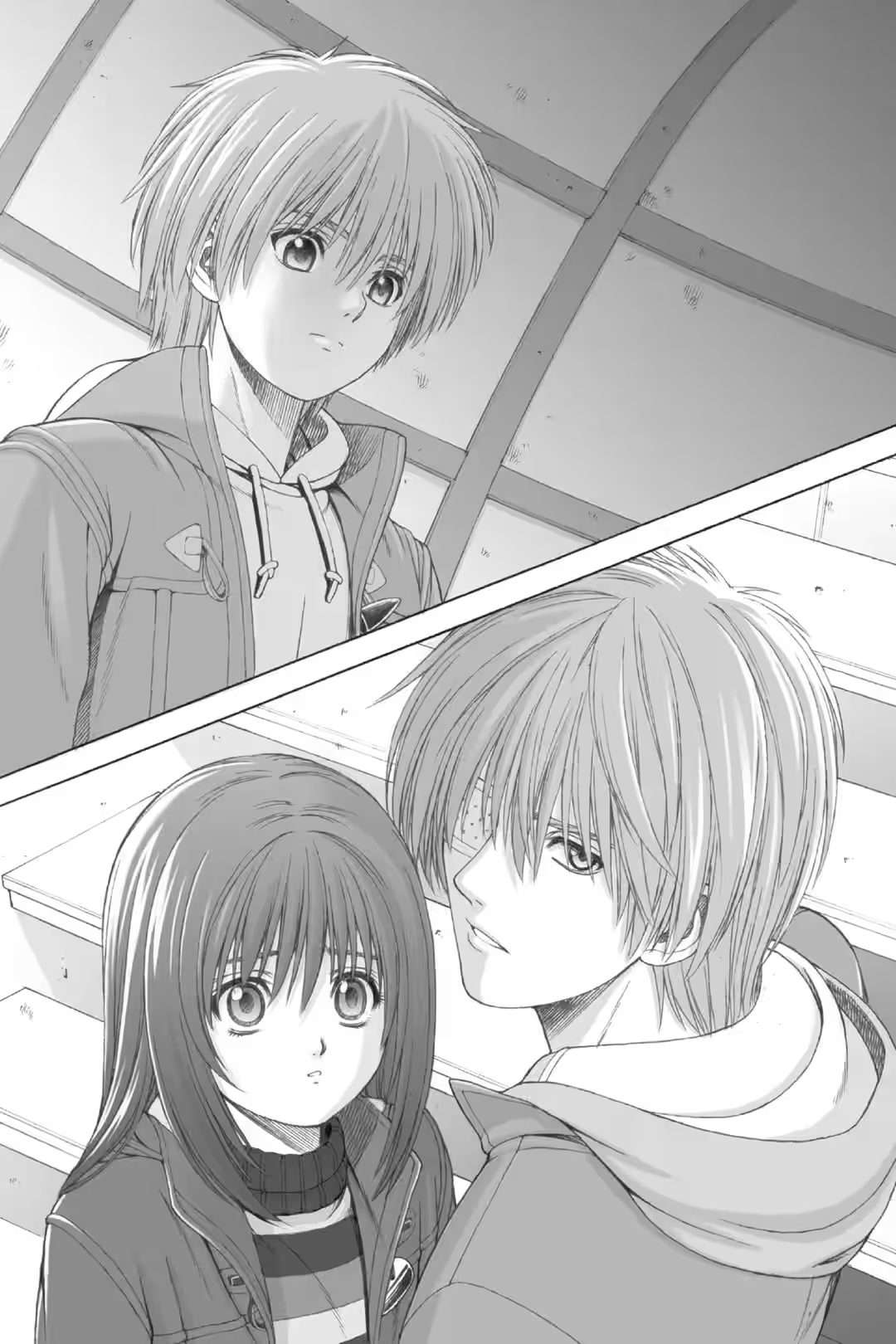
“Sheesh,” he griped, doubling back to the ruined pile of gears. He dug out Joachim by kicking aside debris until the other man was uncovered. He probably wasn’t dead, but apparently he was completely nonfunctional. It would’ve been good enough to just grab a leg and drag him along, but Harvey’s left hand was practically useless at the moment, so he was forced to wriggle underneath the other man and bump him onto his back. Kieli came running over, and between the two of them they got Joachim over to the trolley and tossed him in.
“You first.” Harvey pushed at Kieli’s back to send her clambering aboard, and then set the trolley in motion by shoving his whole body weight against its rear wall. It started rattling its way down the gentle slope, and he chased after it, kicking it a few times to speed it up. When he finally vaulted inside with a helping hand from Kieli, a wall of white light began spreading behind them as if to shelter them from behind.
Harvey turned to see more beams of light, countless beams, streaming out of the gears overhead. They grew brighter and brighter as he watched. The whole dim interior of the tower was enveloped in light, as if it suddenly had its own noonday sun—no, on this overcast planet wreathed in dust pollution, even the sun wasn’t this brilliant.
Without thinking, he shielded his face from the blinding light source with his arm, and in that instant—
Kab—
Harvey heard only the first split second of the explosion. After that, his hearing blanked out. He thought he’d told Kieli to be careful not to bite her tongue, but since he couldn’t hear the words himself, he didn’t know whether she’d gotten the message or not. He cradled her head to his chest and took cover on the floor of the trolley. As the ceiling began to cave in behind them, their little trolley truck slid along the downhill track, now with an extra speed boost from the force of the blast.
That same blast carried the remains of wrecked gears with it, which grazed the walls of the trolley as they whizzed by. The ceiling’s collapse steadily caught up with them like a great sweeping wave; the aftermath of the torrential downpour of debris all around them jarred them on the track.
…Huh?
Harvey abruptly realized something strange. The one and only place the debris wasn’t falling was on their heads.
At the thought, the contours of a human figure hovering protectively over the trolley flashed before his eye for the barest moment before disappearing, like a video feed that lost power right after it was turned on.
No matter how much Harvey rummaged through his memories, he didn’t recognize the face at all. It was just some totally ordinary town youth, the kind you might see anywhere; Harvey doubted he’d take any notice of him if they passed on the street, and even if he did, he probably wouldn’t think much more than Good muscles, but he looks kinda dim-witted before forgetting all about him a moment later—and yes. He’d never seen what the man had originally looked like, but all the same he didn’t have to ask who this was. Logically speaking, Undyings shouldn’t have spirit forms like normal humans, so maybe it was just an illusion. Or, on the other hand, maybe it was something like the ghost of his last wish.
“Thanks…”
Harvey had to close his mouth for fear of biting his own tongue before he could get the man’s name out, but he half-felt as if he’d caught a glimpse of his face again, smiling shyly.
“Whoa…”
For several seconds, Bearfoot stood rooted to the spot in his bear costume, gawking at the spectacle overhead and actually having the dazed thought, It’s beautiful.
Countless beams of amber light streamed from the arched window of the clock tower, decorating the slate-gray night sky with glittering patterns. It looked so much like one of the effects rigged by the park that he thought anyone seeing it from the new city would probably believe them if they said it was a Colonization Days finale event.
He wasn’t allowed to stay happily spellbound by the view for long, however.
“It’s coming down!” someone shouted, and it seemed to jerk everybody standing in the square back to their senses. As one man, they all started running. “H-hey, let’s get out of here!” cried Rat, prompting Bearfoot to hastily turn on his heel to follow suit. They were in the area of the crowd closest to the tower, practically right underneath it, so they were among the last to evacuate the square. No sooner had they stumbled away than an even fiercer light shot out of the tower, and the clock face at the top peeled off with a hollow clonk…
RumblerumbleRUMBLE—
…And with a thunderous roar, the tower itself began to crumble from the top down.
They all covered each other’s heads—Church Soldier, performer, it didn’t matter; they were all mixed together—and huddled as small as they could under the rain of rubble and dust pouring down on them. The enormous clock face crashed into the ground with such a deafening noise that it seemed as though the world was ending, and raised a thick cloud of mineral dust made up of mixed sand and metal shavings and chunks of concrete that blanketed Bearfoot’s entire field of vision.
The dust mercilessly invaded his crudely made costume from the eyes and mouth until he couldn’t take it anymore. He yanked the headpiece off and fell into a violent fit of coughing. When it started to taper off, he riveted his teary eyes on a certain point above him, wearing his bear head half-on like a hat. The people around him who’d escaped danger were the same: some of them were coughing up dust, and others were just sitting on the ground in a daze, but all of them were sighing in relief as though they’d just survived a trip to the deepest pits of hell, and one by one, they all raised their faces and slowly looked up at the sky.
Their gazes were fixed above the fog of dust which had yet to settle, on the pitiful sight of the clock tower whose top quarter had crumbled away. No—now that its symbol, the clock, was gone, these were only the ruins of an ordinary nothing-tower standing against the sky.
“Chief…is someone going to have to take responsibility for that…?” he murmured dumbly.
“…Let’s bow out fast,” answered the bunny sitting next to him in the same dumbfounded voice.

“Harvey, you’re heavy…,” she groaned from underneath the arm covering her, but the arm showed no signs of removing itself. “Harvey…?”
There was no response to Kieli’s second call, either, so she crawled out from beneath Harvey’s arm on her own power, scrabbling at the wreckage around them for grip. Then she squatted next to him, examining him. He was still lying motionless where he’d fallen. She heard him give a brief, soft moan, but that was all. Maybe he’d gotten hit hard somewhere? He didn’t seem able to get up.
Think, Kieli: what happened…?
She cradled his coppery head on her lap and looked around them; but there was no light, not even the faintest glow of emergency lights, and her eyes could hardly identify anything at all. Judging by the echo of her own voice, she thought they were closed up in someplace fairly small. She managed to just barely make out the outline of the trolley truck turned over on its side a little ways ahead of them, and that was when she remembered. A blast had knocked them off the rails. Kieli seemed to recall them flipping over a few times, so the fact that she was uninjured must mean that Harvey had protected her.
She saw Joachim lying on the ground near the trolley, too. He evidently couldn’t move, either.
“What should we do, Corporal…?”
“Want me to blow a hole through something and make us an exit?”
“We’ll get buried if you do that…”
Their voices echoed in the confined space, which was walled in by rubble on all sides, and tiny fragments of debris sifted down on them from above. She didn’t think it was the vibrations from their talking that caused it, but her voice naturally faded out of fear that the ceiling could come down on their heads any second.
At a loss, she ran imploring eyes all over their surroundings, and discovered that now that she was gradually adjusting to the dark, she could see something very like a door at the far reaches of her vision. It was still there, not buried in rubble. It seemed to be the power area’s emergency door.
Setting Harvey’s head down for the time being, Kieli crawled over to it at a snail’s pace, careful not to disturb the rubble around her if she could help it. She’d gotten her hopes up that they might be able to get out, but when she drew near it, her heart sank.
A sturdy-looking padlock and an iron chain. And of course she didn’t have the key. Only a park employee would have a…
…a key?
Here, I’ll give this to you. This might be useful if you run into trouble.
The words of the old man possessing the locksmith doll suddenly popped into her mind. But, but it couldn’t be—I wasn’t in my body when he gave it to me.
Was it in my left pocket, or my right…? Gulping, Kieli gingerly put her hand in her right coat pocket. After a little bit of feeling around, her fingertips touched metal.
“No way…”
She drew her fist out of her pocket and stared down at it in disbelief. When she gently opened her fingers, she was holding a rusty lead-gray key small enough to fit in her palm.
Near the point when she managed to drag Harvey through the door and outside, clasping his tall body in both arms and struggling hard, she encountered a resistance. It felt for a moment as if a wall of air was pushing her back. Kieli was puzzled, but she took another step.
“Gah!”
Harvey abruptly doubled over violently, and Kieli accidentally let go, sending him tumbling to the ground and rolling. “Wh-what’s wrong?!” she cried, running after him in a panic and catching him in her arms. She tried to get a look at his face, but he was slumped facedown where he’d landed, clutching his chest.
“Harvey!”
“’m—fine…Just—can’t—move…,” he ground out between gasping breaths. Then he stopped talking and, face still planted in the dirt, twitched the tiniest of gestures toward the door they’d just come through. Immediately understanding what he meant, Kieli retraced her steps and set about carrying Joachim outside. She laboriously dragged his tall body through the door, exactly the way she had Harvey’s before, and the instant she passed through that same spot, she felt herself catch on something like the surface of a pool of water.
Amazed, she stared hard at that place, but she couldn’t see anything different, and when she tried touching the nothingness with her hand, it naturally just slid through, and she couldn’t feel a thing there.
As she gripped the back of Joachim’s coat and dragged him along backward, Kieli looked all the way up the emergency-door wall as far as she could see. Apparently they’d exited the park from the back. On the other side of the long, high wall that enclosed the sprawling park grounds, she could dimly make out the tip of the wretched, partially collapsed tower against the Westerbury sky where dawn was just now beginning to break.
The former clock tower, now significantly shorter and missing the clock at its peak—it was an empty sight, as if a one-night-only “Whimsical City” truly had ended as a fleeting, whimsical dream and vanished at daybreak.
The cool, white breeze of early morning caressed Kieli’s cheek as it blew by. When she took a deep breath and sucked that breeze in, it smelled like sand and dust.
It was the sort of morning when you woke up from a long, long dream of adventure and felt just a little bit sorry to leave it, as though it left a hole in your heart; but at the same time the sort of morning when you were relieved to have been able to wake up from that dream. A clean, quiet, definitely real morning.

That afternoon, after she treated Harvey’s wounds, they went downtown to Christoph’s place together. “I’m coming, too,” she’d insisted firmly to Harvey, who’d apparently intended to go on his own as if that were a given. Maybe he’d finally gotten it through his head how stubborn she was, though, because he let her come along without protest. They left the radio behind with Nana.
Toby came out to meet them in front of the apartment door with a bandage wrapped around his head. Luckily, it seemed that his injury hadn’t been a serious one. In fact, Harvey was by far the worse off of the two—he was banged up from head to toe—and yet Kieli noticed him breathe a sigh of relief at the sight of the boy.
Toby was just as bad, too: instead of being concerned about himself, the first words out of his mouth were, “Tell me about my brother.”
After looking down at the much shorter boy’s face in silence for a few moments, Harvey gave him an extremely simple explanation of what had happened. Literally extremely simple: Christoph had to go far away, and he’d asked Harvey to tell his family that he wouldn’t be coming back to them. The end.
It was rare for Harvey to lie at a time like this. It was a ridiculously bad lie, the kind of lie you assumed someone would call you out on before you even told it.
Kieli couldn’t tell how Toby took the story. Maybe he believed it, or maybe some sort of brotherly intuition had already told him the truth. At any rate, he didn’t question them any further; he just nodded and said, “I see…”
After that, he stared up into Harvey’s battered face for a bit, and then bobbed his own injured head politely. “Thanks for taking care of my brother. I’ll tell Mom myself. I wish I’d gotten the chance to tell him not to worry, because I’ll protect Mom. We’ll be okay.” He’s a tough kid, Kieli thought. Maybe this boy who’d grown up in a poor downtown family, sometimes stealing things along the way, had some particular sort of strength in common with those kids at the school who’d lived in the wartime city with stubborn persistence.
After that brief conversation in front of the door, a minute or two at most, they parted with Toby and headed out of the apartment building. That was when it happened.
“Wait!”
Kieli and Harvey turned around to see Toby’s mother burst out of their apartment. She was in her nightgown (Toby’d said she was sick in bed), with only a shawl thrown over it and her long hair hanging loose and tousled over her shoulders. She half-stumbled to Harvey and clung fast to his arm.
“Give me back my son…give back Chris!”
“Mom, stop!”
Ignoring Toby, who was jogging out after her, and ignoring the plaster wrappings around Harvey’s hand, too, she shook his left arm fiercely and cried, “Why?! Why make me so happy and then crush my hopes?! I bought him new shoes, you know! I made meatloaf! I thought so hard and planned out everything: today’s breakfast and lunch, and tomorrow’s, and the day after tomorrow’s! I wish…I wish you’d never brought him back in the first place if you were just going to take him away again! That’s just cruel! It’s cruel, it’s cruel…”
“Mom! Stop it; it’s not his fault—”
“Toby.” Harvey cut him off as he tried to calm his mother down and pull her away. Harvey quietly looked down at the mother clinging to his arm and breaking down in tears, not supporting her, but not trying to shake her off, either. “…I’m sorry,” he said at length in a voice of ordinary sincerity, without his usual coldness. He bowed his head lightly.
Kieli didn’t know what he was apologizing for; maybe for not being able to bring Christoph home today, or for lying—but either way, she didn’t think Harvey deserved the blame for any of it. Yet Harvey didn’t say a single word in his defense.
Kieli didn’t voice any objections, either. She thought that if she said anything, all of Harvey’s forbearance would go to waste; so she stood silently behind him and just bit her lip, looking at nothing but Harvey’s left hand as Christoph’s mother squeezed it hard enough to crack the plaster.
She was glumly silent on the way home, hardly looking up from her own feet, until Harvey sighed and slackened his pace a little so that she could catch up.
“This is why I didn’t want to bring you. I knew you’d get angry.”
“I’m not angry,” Kieli answered, pouting. She was relieved to hear that his voice had gone back to normal. True, lately she’d been angry all the time, but today she really didn’t think she was angry about anything.
They both lapsed naturally back into silence again without the conversation getting anywhere in particular, becoming just another part of the crowd for a while as they walked through the lazy bustle of the downtown afternoon.
Shortly after they’d come out into the main street, Harvey unexpectedly stopped.
“Let’s get on that.”
“‘That’?” Following his copper gaze, Kieli saw a sign for a bus stop by the roadside. A rattletrap old bus was just clattering to a stop in front of it. “The bus? But that’ll take us out of our way, you know. If we’re just going back to camp, we can get there on foot.”
“I’m tired, and walking is a pain. We’re taking that back,” Harvey insisted, almost like a peevish child. He started walking off toward the bus stop. Nonplussed, Kieli quickened her pace to catch up.
Over by Central Station and uptown there were new double-decker buses running, but the bus making its sluggish circuit of downtown was a secondhand vehicle whose red paint had almost entirely peeled off, so that it only looked gray now. It was a midsized bus structured similarly to the troupe’s trailers, with three wheels in front. Harvey got on with no ticket and no money, calling back “You get the change,” so Kieli quickly counted out enough to cover two passengers’ fares and put it in the box before running up the steps.
The ridership was sparse, possibly because they were riding in midafternoon when nothing was happening. One or two people shot them annoyed glances, but overall nobody paid any special attention to them as they took seats next to each other on the wide seat at the very back. Then the bus lurched into motion with the noisy sound of fossil fuel combusting.
In the back, the engine sounded pretty loud, and she could feel the wheels vibrating right through her seat. It’d looked like a great seat at first glance, as the widest one, but Kieli was kind of regretting the choice now. She could see why nobody had taken it before them. Harvey, on the other hand, didn’t seem bothered. He tossed his legs out wide in front of him, sank deeply into the seat, propped his head on the backrest, closed his eye, and promptly went still.
…Okay, he really did seem tired.
Growing bored, Kieli leaned her head against the window and let her eyes roam the scenery outside.
The run-down gray bus lumbered along the run-down gray landscape of downtown.
She did see the odd abandoned building with broken windows, but the buildings lining the main street were all large ones, and the street itself was wide, too. Now that she was getting a more leisurely look at the city as it flowed gently by, the sheer size of Westerbury struck her all over again.
I guess this is the last I’ll see of it…
It was afternoon on the ninth day of the Colonization Days celebration. Tomorrow would be the last day, and also the day they planned to leave Westerbury. Despite how much Kieli felt she had done and seen in the exactly ten days since they’d first arrived at East Station on the afternoon before the holiday began, she’d hardly spent any time at all in the town proper, so maybe it was a good thing she had the chance to ride on a bus that made a full circuit of it before they left.
Plus, she’d never ridden a bus sitting next to Harvey before.
She looked at him out of the corner of her eye without lifting her head from the glass, and saw his left hand resting right next to her right hand on the seat. It was held fast with plaster from the wrist all the way across the back, with bandages wrapped on top of it; he could technically move his fingers, but he couldn’t manage too many fine movements. Harvey had objected to that loud and long and exactly like a peevish little kid, but Kieli was dead sure that he’d aggravate the injury again before it healed if she didn’t put a cast on it. He didn’t have a right hand, so she very much wanted him to cherish the left hand, at least.
The back of that hand looked a size bigger now thanks to the rough plaster, and the long fingers sticking out of the top looked even thinner and bonier than usual in contrast. They were close enough that their fingers would touch if Kieli moved her own hand just a tiny bit, but she hesitated, and only squeezed it into a light fist.
Joachim’s words came back to her:
Ephraim’s going to die one of these days, you know.
He’d always been someone who seemed only just barely fixed to this world by a thread, but now if he took one wrong step, the thread might really break this time…Kieli bit her lip and clenched her fists hard.
Just then, the long fingers right next to one fist suddenly twitched, and with a small startled sound, Harvey jolted upright. Thanks to the way he’d been sitting, which even the politest person would’ve had to call sloppy, he immediately slid off the seat onto the floor, prompting another small sound.
Startled herself, Kieli froze for a second before hurriedly moving to drag him back up from where he’d landed on his butt below the seat. “Wh-what are you doing?” Peering into his face as she straightened out the back of his rumpled clothes for him, she asked, “Were you asleep?” He sort of seemed as if he’d jumped awake from a dream of falling.
“No…I was, um, thinking,” Harvey mumbled. He looked slightly dazed, as if maybe he’d surprised himself, too. He accepted Kieli’s help to reseat himself, leaned his head against the backrest again, and looked up at the ceiling, resting the back of his plastered hand on his forehead and heaving a tired sigh.
He went still again in that position, so she tentatively asked, “Harvey…?”
Nothing.
After watching what she could see of his face underneath the plaster for a while, Kieli couldn’t think what else to say after all. She turned her gaze back to the window.
Once she’d taken her eyes off of him, she heard a muffled voice speak up from below the plaster. “…I…”
A faint voice that sounded as though he was wringing it out of himself.
“…I couldn’t do anything for him.”
The wheels below their seat bounced lightly on a dip in the road.
Outside the window, the scenery kept flowing on monotonously, sluggishly past as the bus slowly made its way through the lazy downtown afternoon.

The loop-line bus completed its circuit around the downtown area and passed in front of the park. Kieli was giving Harvey a confused look, but he nudged her forward, and they got off the bus there. He’d planned to from the time he’d decided to board it, after all.
With two days left of the festival, the park was closed (as expected, or perhaps as was only inevitable); but what with the Church Soldiers investigating and the workmen clearing away rubble and the curious onlookers with too much time on their hands who’d come especially to get a look at the ruined tower, if anything there were more people here now than when it was open for business. Harvey went around to the side of the property to avoid the crowd. He wasn’t positive that it was the right way to go or anything, but as a starting point, he tried circling the park’s outer wall on foot.
On the other side of the long, tall gray wall that divided the park from the wilderness, sprawling across the land like the massive enclosure said to have confined the prisoners back when this place was an exile planet, he could see the remains of the clock tower now missing its clock. Its backdrop was the usual cloudy sand-colored sky.
Vvnn…gnnnnn…
When he held his hand up to the void running a little in front of the wall, he heard a low drone like a machine gauge going past the red zone, and the air radiated outward from his palm. The magnetic barrier that had existed on the pedestrian bridge in front of the front gate extended all the way out here, as a sort of second wall enclosing the physical wall that enclosed the park.
Harvey trailed his hand along the invisible barrier as they walked, and after a period of time, he came to a spot where the wall seemed to have been torn down from below.
“Ah, here we go.” He’d figured there must be a loophole somewhere that had let Christoph sneak into the park without being affected by the magnetic field. And just in that area, be it from a warp in the geological strata or whatever, he didn’t feel any of that strong magnetism in front of his outstretched hand.
“Kieli.”
She looked up when he turned to her. She’d been following behind him so far, seeming anxious.
“You go up first. I’ll give you a boost.”
“Huh? But…”
“Go on. I want you to help me.”
When Kieli appeared hesitant, he pushed her in front of him without waiting for her to make up her mind, and lent her his elbow and shoulder so that she could climb up the wall. The pile of ruined concrete might be crumbling, but it was still easily taller than Harvey was. Though ordinarily he’d still have no trouble scaling it, it was a little beyond him when he didn’t have free use of either hand.
Kieli reached her hand down to him from the top of the crumbled wall. As she helped him by pulling on his plaster-stiffened left hand, he used the debris for a foothold to scramble up to where she was.
He didn’t exactly marvel at the view on the other side or anything, but a little impressed breath did escape him.
For a little while, they crouched side by side on the rubble and took in the sweeping view of the dormant doll city that lay before them under the afternoon sky. It pained him to see the trail of destruction winding through the houses up to the half-wrecked tower on the hill that must mark Christoph’s passage, but he decided not to think about anything for the moment.
“I thought maybe it would be more fun if I saw it in the daytime…,” Kieli murmured ruefully.
“It’s not fun?”
“Not at all…”
Well, probably that was only natural after she’d been chased around by a horde of evil possessed dolls in the middle of the night here, Harvey guessed. He felt a little guilty for never managing to show her the clockwork when it was working normally.
“Let’s go inside.” He slid down the other side of the wall into the park and reached out a hand to Kieli. After a touch of hesitation, she wound both arms around his neck and hung on. Harvey embraced her and set her gently down on the ground. As he did, he asked her with a straight face, “Hey, have you gained weight?”
When she shrieked “Huh? Huh?!” and jumped away from him, though, he couldn’t hold back the laugh.
“Actually, I’d rather you be heavy than be a ghost or whatever.”
“…That didn’t really make it any better.”
Kieli scowled at him, and he let his gaze wander away from hers, still half-smiling. She seemed a little more like her normal energetic self now, which was a relief. He’d said something kind of weird back there on the bus, and it’d bugged him how concerned she was.
Vnn…
The same drone from earlier reached Harvey’s ears, and the scenery flickered around them. One moment he was dizzied by the distortion in his vision, and the next, the scenery in front of him was utterly different, as if a curtain had flown up in the wind to reveal something else behind it.
It was the same thing he’d seen falling from the stairs during his scuffle with Joachim on the bridge—twilit sky, and ashen ruins sprawling beneath it. The ruins were blanketed with a fine sediment of mixed blood spray and gunpowder smoke. A sea of rubble spread out over the whole area; scattered here and there, Harvey could see the backs and limbs of men in army uniforms peeking out from the crevices.
He unthinkingly retreated a step, and his back bumped into something. When he looked over his shoulder, the view of the ruins fluttered, and for an instant the park wall appeared, but by the time he looked ahead again, the wall at his back was gone, and he was standing in the middle of the ruins.
“Harvey…”
He felt his sleeve being tentatively tugged from behind.
“Are you okay?”
“Yeah…uh-huh.”
Harvey schooled his expression. The horrible scene of urban warfare embedded itself in his eye like a shard of glass, but instead of turning away, he took a good look all around him. Were the thick smells of blood and iron rust assailing his nose and the sounds of distant cannons present here in this space, or were the deepest recesses of his memory calling them up as part of a chain reaction triggered by the sight?
“…It’s fine. This is what I came to see.”
He’d wanted to get a look at it. At the scenery he’d grown up in, in a distant past that he couldn’t remember.
He began to walk around the ruined city, treading on the rubble. Though it wasn’t the sort of hostile sensation he’d felt going through the magnetic barrier, he could sense a slight resistance in the air, could almost feel himself pushing his way through a pool of water. Maybe you could call it the feeling of the like poles of two magnets repelling each other. In all likelihood, Harvey wasn’t welcome in this space.
“Kieli, did I really live in this city?” he mumbled as he walked and took in the sights, almost as if it had nothing to do with him. He had to say, though, it did feel kind of weird to ask Kieli about his life when she hadn’t even been born at the time.
“Yeah…I think you did.”
“Huh…”
Harvey had thought he might remember something, but so far nothing was sparking any memories. Every so often the sky rippled, and the park peeked out from behind the warped air. A dry gust of wind blew along the ground, carrying away the dull red dust that had accumulated there at his feet.
His vision cleared with the wind, too, and he could see a large building in front of him.
He heard voices whooping, and suddenly a soccer ball appeared in the air in front of him, with five or six little kids chasing right behind it before Harvey had even had time to process the ball. The moment they seemed about to collide, they passed right through him; when he turned around, there was no one there.
What was there, though, was a line of crude grave markers made of piled stone, exactly enough for each of the children.
This is…a school…
All of a sudden he found himself standing in the middle of a schoolyard.
“Kieli?”
She should’ve been right next to him, but he couldn’t see her anywhere. Schools were alien to him, and though he knew it was childish of him, he felt strangely helpless left all alone in one. He was darting his eye about like a lost boy when he heard a voice call out, “This way!”
He turned his head toward it, and saw Kieli standing in front of the schoolhouse entrance. “This way, this way. Hurry!” She was waving both hands wildly. Harvey started walking toward her, feeling a bit reassured, and she ran back up to him.
“Effy,” she said, innocently wrapping her hands around his arm.
“You…”
“Effy said that if a grown-up Effy came, I should show him around!”
“Kieli…where is she?”
“I just borrowed her for a minute. It’s okay.”
The girl who lisped clumsily in Kieli’s voice pulled him along by the arm until he stepped through the entryway into the school. The overall scene ahead of them was vague and blurry, but as they progressed down the hallway, his field of vision was distorted and the objects up close unfolded crisp and clear. Classroom doors with signs indicating the classes, a bulletin board, lockers, rows of windows…When Harvey felt the girl jerk at his arm and turned back to her, stumbling slightly, everything behind him warped like melting rubber, going back to its former blurry milk-white.
“This is the nurse’s office! It’s where they dis-infec’ you.”
The girl pretty much delivered a monologue as they walked, and he heard her telling him stories with half an ear.
Effy always felt bad in the mornings, so the nurse used to call his house and tell them to make sure he ate breakfast, but really half the time he was just playing pretend because he wanted to take a nap—By the time the girl had explained this in the childish vocabulary that was all she knew, they were long past the nurse’s office; next they passed by a door that said “lunchroom” (This is where we all ate together, but Effy was really picky, and he didn’t hold his spoon right), and then she pointed out the marks where somebody’d cut into the hallway window frame with a utility knife (This is from when Effy and Joachim were racing to be the tallest, but the teacher found out and they got in trouble, but then after everybody ’vacuated and all the grown-ups were gone, they didn’t measure anymore).
No matter what he heard, Harvey didn’t feel as though any of it was really about him. It seemed as though even if he didn’t have any concrete memories of the school he ought to at least feel some attachment to it, but he didn’t, in particular.
Like it or not, it all reconfirmed what Harvey’d been vaguely thinking in the back of his mind for a while. He and the boy who’d attended this school were probably different people. They might be one and the same in terms of their physical vessels, but perhaps Harvey was basically a pseudo-personality derived from a few scraps of memory left in this body’s corpse after its rightful owner had died. The self in the earliest memory he could definitively call his own had already died once and been reborn, and was participating in the War as a living weapon.
What the heck am I…?
Something that had never existed in the first place, with no thread connecting it to anything.
“Effy. Effy!”
Someone was yanking hard at his sleeve. When he looked down, Kieli—no, the girl inside of Kieli—was looking up at him with a seriously miffed expression on her face.
“Grown-ups gotta listen when people talk to them. You forget your lunch money ’cause you don’t listen, Effy.”
“Ah, sorry…What?” He apologized before he’d thought the better of it. Not that this lunch money thing had anything to do with him.
“The other kids said Effy was sliding there, and he fell and his arm got fact…frak…”
His ‘arm got fact’…? Ah, right, his arm got fractured.
The girl pointed as she explained, clearly reciting something she’d heard from someone else and knew only a little about. When Harvey followed her finger with his eye, the milky-white blur warped, and a staircase appeared by the wall of the corridor. She must mean that he’d fallen trying to slide down the banister. From all he’d heard from her so far, he never did anything decent.
“Sarah told me. Effy’s mommy came, and she cried really hard, and Effy apologized.”
Harvey heard the girl’s voice in one corner of his mind, unconsciously transfixed by the sight of the stairs.
Those stairs, I’ve seen them somewhere…
His feet took him toward them almost as if they were pulling him in. When he reached the bottom of the staircase illuminated by the dim, hazy light filling whatever space they were in, a square landing came into view.
The instant he put his foot down on the first step, he thought he felt the sight before him blur just a little.
“…?”
Raising his face, he looked around him. The walls and ceiling of an old schoolhouse, stained reddish brown in places. There wasn’t anything particularly strange about them. And yet for some reason, something felt just the slightest bit off…Is my eye level different? Was the ceiling really this far away before?
“…What am I doing, again?”
He cocked his head, confused, and then remembered: That’s right, I have to go home.
Pushing his messenger bag around to hang behind him, he thrust his hands into his coat pockets and started walking down the stairs with his head lowered. School was out, and it was pretty late already. Maybe there was still a kid or two playing in the schoolyard, but the inside of the schoolhouse was wrapped in chilly silence.
I gotta stop by the hospital and fill out a bunch of forms. I’ll have to pay the bill, and collect the body, and what’ll I do about the funeral? I don’t know how that works. What did we do about Dad’s, again? Oh, right, it was easy with Dad, because his body burned on the battlefield and didn’t get sent home. I’m pretty sure I get some kind of subsidy or something now, so I’ll have to go apply for that at some point…Sheesh, I wonder how come I only think of practical stuff like this…He thought that normally people had more feelings and stuff at times like this, but nothing was coming to him.
His feet reached the landing. His bag was starting to slip off his shoulder; as he adjusted it, a drop of water plopped down in front of his shoe.
He stood still for a while, gazing at the tiny water stain on the floor.
“Oh…,” he breathed, head still bowed. A tiny, spent breath.
Even as he held a hand over his mouth and choked down the sob, he felt somehow oddly relieved that a tear had finally fallen. Oh, good. I’m really crying. Because I must’ve really loved my mom.
…I’m sorry, Mom…
Neither of us hated each other, really, huh? We just couldn’t do the “family” thing too well, was all. If I had been a little older, more of an adult, would we have been able to manage some things a little better? If he were as adult as his father, could he have been more considerate of his mother, maybe? By the time he realized anything it was too late for everything, and he thought his mother probably hadn’t ever been a really happy person, not to the very end.
“Effy?”
The girl’s voice calling him yanked him back to himself.
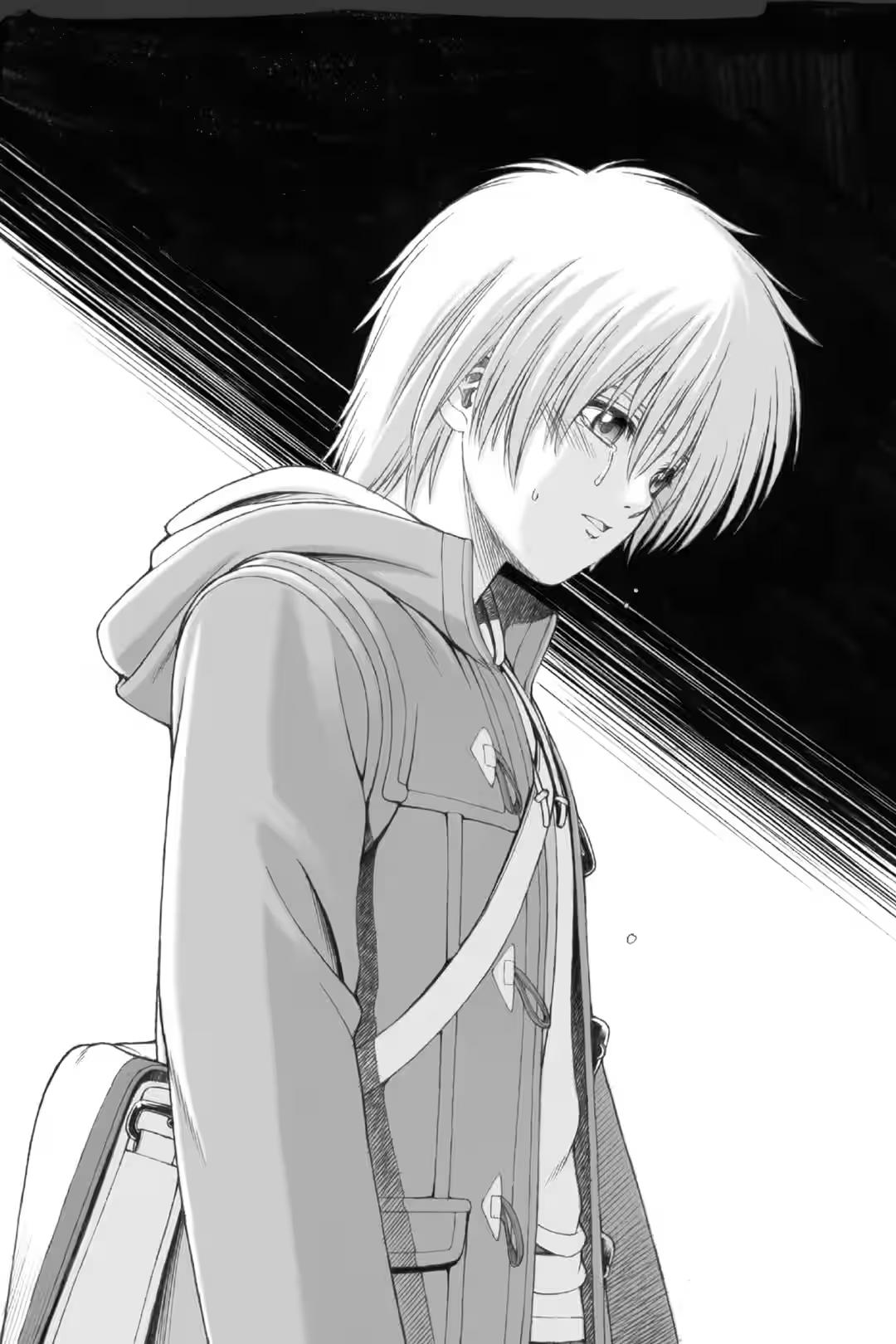
“…Mmm?”
Big black eyes were peering at him from below and a little to the side.
Harvey groggily lifted his gaze. He was still standing in the same place, but the ceiling that had seemed so far away was a bit closer now. He’d gone back to his normal eye level. He was back to only seeing out of his left eye again.
“That…”
I remember that. That’s really my memory. From the day my mother died, here at school after hours.
“Do you feel bad, Effy? Is it your tummy?” the girl asked curiously.
“Ah—” Startled, Harvey wiped his cheek. He stared down at the teardrop stains on his bandages, and felt surprised at himself. How many decades had it been…?
“You’re weird. Grown-ups aren’t supposed to cry even if it hurts, you know.”
“Oh, uh…” He gave the blinking girl a vague, wry smile, and tried to collect himself, but—“Huh? They…won’t stop…”
It just was too rare for him; he didn’t know how to stop them. He could remember how to shut down his sense of pain in no time, but not this. “Ugh, this sucks…” Wiping his one tear-stained cheek with his hand, he turned his face away from her. He was lucky it wasn’t Kieli with him (though technically it was Kieli). There was no way he could let her see him looking this pathetic.
“Oh, grown-up Effy, what will we do with you?” said the girl in what she clearly thought was an adult voice, but even as she spoke, she stood on tiptoe and reached out her hands to him. “It’s okay, Elisha forgives you. I mean, I’ll never be a grown-up, so I don’t have to try not to cry. That’s not fair, huh?”
Harvey felt so pitiful meekly letting her pull his head down and stroke his hair that he could have cried for a different reason.
He was stupidly taller, so the ceiling was closer, but that was about it. In the end, growing up hadn’t made him able to manage anything better. Even now all he did was fail and screw up…But, oh, hey—
He really did have a connection to some of the past, even if not to all of it, and that was a part of who he was now, and somehow, he kind of felt as if that was enough.

Harvey squatted in front of the stone grave markers in the schoolyard, resting his cheek on his knees, and lapsed into a daze for a while. He reached out his left hand to touch one of them, but it only passed through, pawing at the air. This schoolyard no longer existed in the present.
The red tint of evening was beginning to glow faintly in the sandy clouds. He’d sent Kieli home ahead of him, and come back here one more time alone.
As he dropped his arm back down, frowning irritably at his plaster-hardened hand, a voice behind him said, “Sheesh, you really messed up my body. What happened to the arm and the eye?”
When he turned around, a boy was standing behind him. Harvey had no idea how long he’d been there. He was glaring harshly at him with coppery eyes that reminded even Harvey of the color of dried blood.
“Didn’t I tell you not to come back here again?”
“You could’ve just stayed out of sight, then. You even left me a guide. What are you trying to do?” Harvey stood up and turned to face him properly, deliberately answering him with the same face. The boy’s expression quickly softened, and he let his gaze slide off to one side.
“I got the feeling you’d come, and I was curious, so I figured maybe it wouldn’t hurt to talk to you just a little.”
“…You’re pretty fickle.”
“Yeah, well, you’re the same person as me, aren’t you?”
At that, it was Harvey’s turn to let his gaze wander with an unreadable look on his face. They shared only a few memories. Probably you couldn’t say they were completely one and the same. You could say that the moment Ephraim died, his personality had split in two, or to put it less nicely, you could say that Harvey wasn’t really even human.
Still, maybe they were the same person to some extent after all, because they seemed to share the same sharp instincts. After Harvey’d gone silent for a while, the boy gave a good grief sort of sigh and smoothed things over himself, even though Harvey hadn’t really complained at all.
“Relax. You don’t have to be considerate. I don’t mind if you think of yourself as me. I’m the real freak here anyway, still wandering around this place after all this time.”
“I’m not being considerate. You quit being considerate and act your age. You’ve got a grudge against me, really, don’t you?”
“…Well, I used to have a lot of ’em, frankly. But once I saw you, I pretty much stopped caring. If my Undying is you, I don’t really mind.”…So there was a possibility you’d have declared me no good? The idea of having to pass some test by a childhood version of himself didn’t entirely sit well with Harvey, but he confined himself to a sulky expression.
“I won’t be able to take very good care of it, just so you know,” he mumbled in a low voice without making eye contact. He hadn’t thought in advance about anything he might especially want to say to this boy, but if there was something he wanted to tell him, it was this. So maybe Harvey had actually been waiting for him to show up. “There’s still something I have to do. So…I think I’ll be pretty rough on it for a while yet.”
“Do what you want, if it’s something you’ve decided. After all, that means you’ve got your own will. You’ve still got a path you can choose for yourself.”
A path I can choose for myself…Harvey recalled someone else once telling him something similar. At the time, though, he’d thought, I’ve never even seen a path.
He looked up. His eye met the boy’s eyes: the same color as his own, but there were two of them, and they were considerably lower to the ground. To an outsider, maybe it would look as though he was standing in front of a mirror that reflected a different time.
However, it was very clearly not a mirror.
The wilderness wind smelling of sand and iron rust fluttered Harvey’s hair and the hem of his coat. Neither the clothes nor the copper-colored hair of the boy across from him twitched even a fraction.
Faced with this boy standing in a frozen time, Harvey was at a loss for a response.
The boy was the one to break the silence. “Oh, but hey,” he added lightly, as if something had just occurred to him. “Try to take care of it if you can. Don’t make that girl cry. Kieli.”
Harvey was speechless for a second. “…Obnoxious brat.” He felt all his energy drain out of him, and at the same time, he got the feeling they were definitely different people after all. Like hell would I ever say something like that, out loud, to another person.
The boy quirked the corner of his mouth in a smile, apparently enjoying Harvey’s sullen look.
“Well, hang in there.”
Harvey always felt that it was irresponsible for dead people to tell him that, but today he accepted it with strange meekness, and nodded with a little wry smile. “Right, for a while yet, anyway.”
Facing each other on either side of an invisible mirror, their smiles then were probably identical. Harvey noticed for the first time that he evidently had a habit of smiling with just one side of his face, and the thought that he’d had the habit since way back when made him feel self-conscious and weird for some reason.
“Okay, I’m off.”
“Yeah. Bye.”
And with that exchange of simple parting words, Harvey turned on his heel and walked away from the graves. It was highly unlikely that he’d ever see that boy with the same face as his again, yet he was casual about it the way he would be with a (much) younger brother, as if it was nothing much at all, as if he was just saying, “Okay, I’m going to run some errands before I go home,” and then he walked away at his normal pace, without feeling any particular urge to look back. He figured there was no need to exchange any big speeches with himself, after all.

“Tick, tock, tick, tock.”
“Tick, tock, tick, tock.”
A girl’s childlike voice, and a man’s gravelly voice. Kieli let their uneven duet (it’d be hard for her to say even out of politeness that they blended together well) wash over her as she carelessly swung her legs.
The radio was beside Kieli on the doorframe, and Nana sat on the other side of him, copying her and swinging alternate legs from where they hung off the edge as she quietly but happily sang the song about the old clock.
Kieli was starting to get genuinely sick of that tune. She searched her memory for something else Nana could manage, wanting to teach the girl at least one more song—but the only ones she’d learned at boarding school had been hymns, and she hadn’t really sung those seriously at the time, so she’d mostly forgotten them.
She’d wanted to give Nana some kind of present before they said good-bye tomorrow. But there were very few things that Kieli could give somebody.
The color of night was beginning to gradually overtake the sunset-streaked sky above the camp. She’d been hearing the sounds of lively activity in the clearing for some time now as they prepared for their celebration.
Kieli had woken up to find herself on the bus back to camp with the troupe members leaving the park earlier that evening. Since it was closed for business now, instead of doing their entertainment jobs today they’d all been recruited as laborers to help clear away the wreckage. According to Bearfoot, Harvey had escorted her to the park entrance and then wandered back in alone.
By now, just one day after the clock tower’s collapse, the incident had been blamed on a fault in the clockwork city’s engines that had made them run wild, and things were largely settled. Kieli didn’t know whether they just hadn’t found Christoph’s body or if there’d been a cover-up, but so far she hadn’t heard any word of a mysterious corpse found at ground zero of the explosion. Shiman had apparently been called in by the authorities and grilled about the street performers’ nighttime spree, but the charges against him seemed to have been dropped. Most likely, Kieli thought, they’d escaped this turning into a big thing because of pressure from the capital. They wouldn’t want the public knowing about the replica cores. Just this once, she was rather glad for that.
I wonder if Harvey’s okay…
In truth, she did remember loaning her body to Elisha, although it was all pretty fuzzy. She had no intention of telling Harvey that, though.
“Tick to—”
Nana’s singing abruptly broke off.
A tall figure stood over them.
“You bastard, how dare you—”
“Corporal,” Kieli said, silencing the murderous, static-spewing radio by placing a light hand on it. She let her wariness clearly show, though, as she raised her eyes and gave their visitor a hard look.
A lanky man in a full-length coat was looking down at her with two light blue-gray eyes that blended in with the color of the twilight sky behind him. He didn’t have that mushy look as though his organs were melting today.
“You got better, then?”
“More or less. For now.”
Kieli hadn’t asked out of any special concern, so she just gave a noncommittal “Hmm,” and then asked with open hostility, “What do you want?”
“I’m leaving town, so I thought I’d get one last look at you first.”
“I didn’t need to look at you.”
“So cold.” He let his shoulders slump dramatically, but without looking really hurt. “Come with me,” he said, casually getting down to his real business.
Just like that, as if it were no big deal. Kieli looked up at his face and blinked. It wasn’t that she didn’t understand the words; she just couldn’t imagine how they would merit the slightest consideration. After she’d stared blankly back at him for a while, he clicked his tongue and backed down without a fight.
“Meh, it figures.”
He hadn’t expected her to agree in the first place, it seemed. Even the tongue click seemed like a Yeah, that’s what I thought sort of sound.
Then he unexpectedly bent over and brought his face to Kieli’s ear to whisper, “I’ll be coming to kidnap you later,” his breath and lips ever so lightly brushing her ear. Shocked, Kieli turned her face away, but by then he was already straightening back up, coat flapping around him as he turned.
“Later,” he tossed breezily over his shoulder as he walked away from the trailer.
Kieli wordlessly watched the tall, lean back that would have looked exactly like Harvey’s if not for the color of his clothes and hair as it retreated. Then something struck her. “…Hey.” The man paused, sending her a glance over his shoulder and raising his eyebrows in slight surprise. “Do you still both hate milk?”
“What?”
“Nothing. As long as you don’t hate it, it’s fine,” Kieli said, promptly ending the conversation with no change of expression. He stared at her stupidly for a few seconds, but she kept her mouth firmly closed, so eventually he walked off into the darkening nightfall, this time without turning back. The sandy wind sent his long coat billowing up around him, and before it had settled back into place again he was gone, as if he’d vanished into thin air.
“Kieli?”
Nana’s arms came winding around her waist, nervously, as if she’d picked up on the threatening atmosphere. The radio stuck between them spewed static as if it couldn’t figure out what to vent its anger on. “Kieli! Why did you let him leave?!”
“It’s fine for now,” Kieli replied in a low, subdued voice, and then she stared wordlessly into the evening darkness where the tall man had disappeared—at the afterimage of the Undying man who was like a distorted reflection of Harvey; who was nothing like him, and yet for some reason was also very like him in a way.
Joachim came to a halt in front of the camp exit.
A figure his exact height was standing there by the wall of blocks. He’d had the feeling he might meet this guy here. He got his grunt of annoyance out of the way up front, since just the sight of that face had already pissed him off.
“What are you here for?”
“I didn’t do anything. Don’t look at me like you’re about to rip my head off.”
They glared at each other with quiet but blatant malice. There was no reason for their conversation to be so menacing on sight, but neither of them felt the need for any special reason at this point.
“I just came to leave a word of warning, as my way of saying thanks for saving me.”
“I don’t think of it as ‘saving’ you. If you want to thank me, never show your face around me again.”
“You know,” Joachim continued, ignoring him, “if you go back to the capital, you’ll die for real this time.”
The other man lifted his eyebrows slightly, falling silent for a moment as if he didn’t know what to say to that. “…Why should I go to the capital? I don’t have any business there anymore.”
“Huh. So that’s how you’re going to play it, eh?” Joachim snorted. You just can’t ever admit what you’re thinking, can you? “I’m going, though. To tear the heads off those senile old fools on the Council of Elders.”
“Go ahead and get yourself killed for all I care. Nothing to do with me.”
“Well, that’s fine. Let’s meet again in the capital someday, fate and luck willing.”
“I told you, I’m not going.”
“Sure, sure. Whatever you say.”
The other man had clammed up. One last slanting beam of sunlight the same infernal coppery color as his hair and eye hit his glum cheek before sinking between the clustered buildings of the new city. Taking that as his cue, Joachim started walking again. His companion stayed in place, waiting.
As Joachim passed him, their equally tall shoulders brushed each other.
“Next time I see you, I’ll kill you,” they murmured simultaneously without meeting each other’s eyes, and neither of them looked back after that.
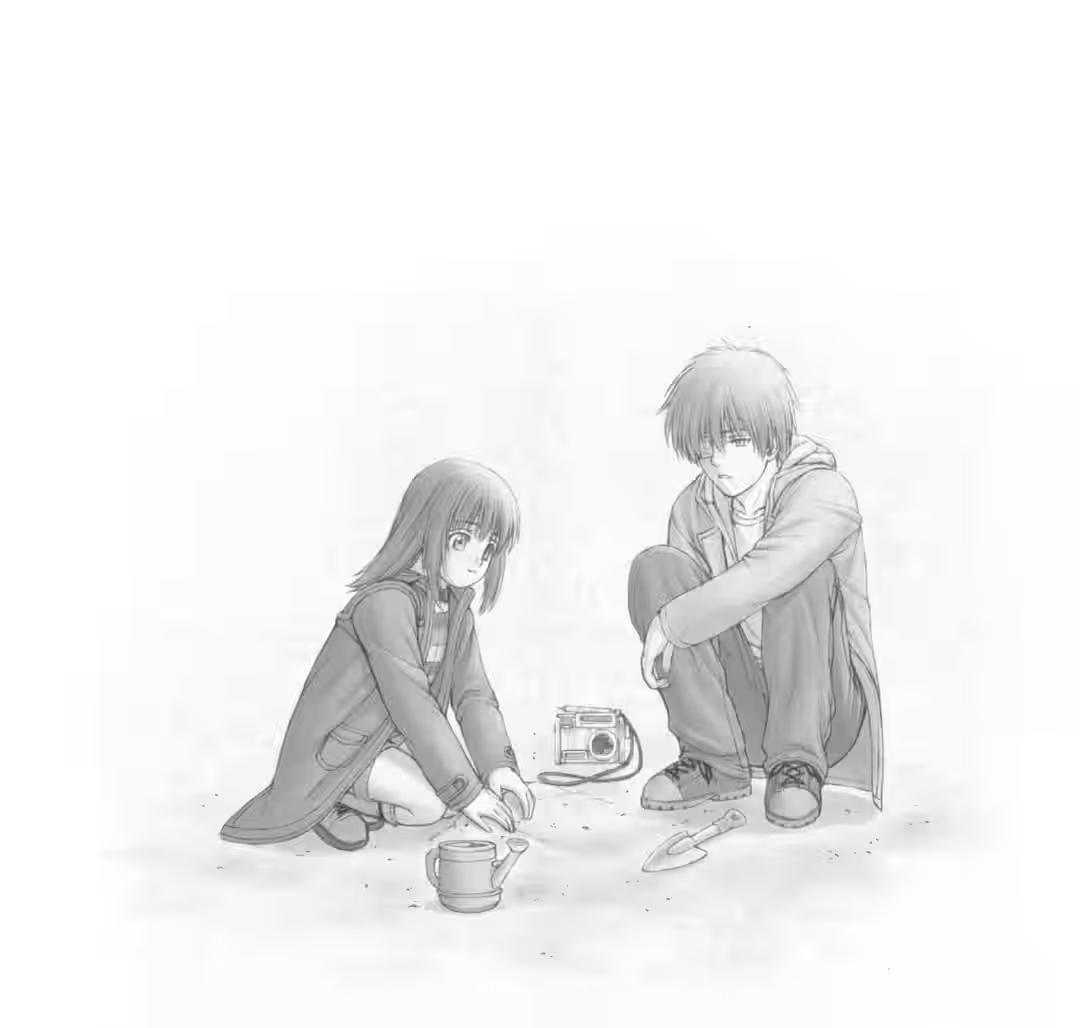
Harvey, you’re doing it wrong. Dig that part so it’s more “vrazoom.”
How am I supposed to know what that means? What are you even making, anyway?
A giggle. That’s a secret until it’s finished.
Rifling through buried memories as he tried to recall something, Harvey sometimes suddenly heard scraps of conversations as if they were happening all over again.
In the corner of the sandbox sat a little pile of sand, the evidence of someone trying to build something that hadn’t ever come to anything in the end. For some reason it tugged at his mind, and while he was cocking his head and trying to remember why, Kieli’s voice popped into his mind, and then his own voice in its wake. That became the trigger that finally brought back the memory. Kieli’d said she wanted them all to make something in the sandbox together, so he’d gone along with her on the second morning of Colonization Days, and this was the remains of the sand sculpture they’d started building.
He’d gotten tired of it before they finished, so he’d abandoned it and gone into town. Come to think of it, he still didn’t know what it was Kieli had been trying to make. He only had the echo of her playful That’s a secret branded into his ear.
This makeshift sandbox and half-finished whatever-it- was would both be cleared away without a trace tomorrow anyway. Maybe Nana would take the tin watering can and the shovel home with her, but that was it.
Harvey sat on the low blocks penning in the sand, and after a bit of struggling with his bandaged left hand, he lit a cigarette. If pressed, he’d have to say the most irritating thing about the plaster was that since he could barely move his fingers, he couldn’t handle the lighter very well. And here he’d just finally gotten used to being short one hand. Earlier, he’d asked one more time to have it removed, but Shiman and Kieli had both shouted him down with amazing ferocity.
He sucked the first puff of smoke into his lungs, and craned his neck back to look up at the night sky as he exhaled.
“Harry!”
Harvey couldn’t even work up the desire to correct the nickname anymore. He looked down to see a little girl approaching him with a radio around her neck, skirt flapping behind her as she ran.
No sooner had the foreboding struck him than, just as he’d predicted, she tripped over a dip in the ground not far from him. He put out his hand and caught her at the last second, so they were safe this time. Which was all well and good, but the weight on his hand still hurt like hell. It didn’t look as though he was going to convince anybody to take off the plaster anytime soon.
Nana sat next to him on the blocks and put the radio on her lap. Then she nodded to herself for some reason (maybe having the radio there was more comfortable?), and leaned her body right up against Harvey’s. He was getting very seriously uncomfortable the longer she stared up at him with those big, barely blinking eyes.
“You’re leaving tomorrow?”
“Ah…yeah.”
“Can we play again sometime?”
“Hard to say.”
Even if “sometime” ever came, who knew how old this girl would be? By then she might not be able to see invisible friends anymore.
As he evaded her gaze and blew a cloud of smoke in the opposite direction, a small head plunked down on his thigh. “Hey…” Harvey peered into her face, and then gave up on saying anything else. She’d been totally awake up until just a moment ago, and now in the space of a second she was dozing.
He sighed and let his eye wander again. Apparently it was pretty late for children to be up, but it looked as though the adults’ merrymaking would go on for good a while yet.
They’d built a bonfire in the camp’s central clearing, and the muffled sounds of high-spirited talking, laugher, and music reached his ears as a jumble of white noise. By tomorrow evening, all the troupes would pack up and head out to wherever their next gigs were. As it had been explained to Harvey, tonight there would be a little (not that it looked very “little” to him) wrap-up party. If they had the energy to do manual labor clearing away rubble in the park all day and then whoop it up late into the night like this, they must have even sturdier constitutions than the Undyings. Harvey was kind of impressed.
Dancers in their performance clothes formed a ring around the fire for a folk dance, taking the men’s hands and drawing them one after another into the circle. He scanned the clearing for a yellow bunny, but he didn’t see one in the field of vision his left eye afforded him.
He wanted to go say good-bye before morning, but he couldn’t quite get into the mood.
“So this is our last night, eh? We owe them big for all they’ve done,” said the radio from Nana’s lap. It was a gentler, kinder voice than usual; Harvey felt awkward just hearing it. Nana’s warmth and her slight weight pressed softly against his thigh as she lay there fast asleep.
“You’ll miss her, right? You want me to leave you behind with her?”
“Nah, that’s all right.”
Harvey had meant that as a joke, naturally, so he was blindsided and rather rattled by the dead-serious answer.
“After all, kids grow up so fast…”
“What’s with you all of a sudden?”
Creeped out, he pulled subtly away; Nana frowned and stirred. The radio lost itself in silent thought for a while before saying, “Say, once Kieli grows up some more—she can’t very well go around with me hanging from her neck forever, huh? I guess one of these days, she won’t need me anymore…” The words and the humble voice they were delivered in struck Harvey momentarily speechless. They’d known each other for a long time, but the radio had never come to him with anything like this before. In that moment of silence he did about a million seconds’ worth of floundering for a response, but in the end the only thing that came to him was banter.
“Come on, I thought you were looking forward to her turning seventeen or eighteen.”
“Shut up,” the radio retorted, “That’s another issue, involving YOU.”
“There you go pinning all the blame on me again,” Harvey grumbled. Then he adjusted Nana’s head on his lap, which had started to slide off, and whacked the radio’s case while he was at it. “Well, it doesn’t look like you’ll lay off scolding me anytime soon, anyway.”
“You oughta grow up a little more. Lately you’re more liable to get yourself in trouble than Kieli is.”
“Yeah, yeah, so sorry.”
He looked up at the sky and sighed out a puff of smoke, and then on a whim he let himself fall backward into the sand, careful not to move the leg Nana was using as a pillow. There was a small whmph when his back hit, and sand billowed up around him.
The thin white plume of smoke rising from his cigarette left him to be swallowed up by the sea of slate-gray clouds blanketing his field of vision.
“…What are you lying on the ground for?”
A girl’s face cut in between the nearby smoke and faraway sky along with her quizzical voice. Harvey shifted his gaze to her without moving from the ground. As soon as he took in the entire picture of the girl standing next to him and peering, his single eye blinked unbidden, and then blinked again.
That was a skirt.
“Oh, um, they made me wear this and told me to join the dancers—I told them I don’t know anything about dancing and stuff, but—” Kieli looked down at her clothes self-consciously, then grasped the knee-length skirt with both hands in a nonseductive, inexperienced way and lifted it up a little. Harvey’d had a feeling things might go this way, so he’d tried to steel himself for it—and sure enough, she tossed him a look as if she was trying to read his face, and said, “It doesn’t suit me?”
“It’s not quite that,” he said, still staring a little stupidly. He didn’t even get the urge to tease her. So he ended up blurting out the first thought that came to his mind, which was, “I’m not used to it.”
“Give her more to work with than that!” the radio remonstrated. Harvey thought for a bit.
“It doesn’t match.”
Then he got the feeling his second attempt had made things even worse.
He honestly didn’t have much of a standard by which to judge whether clothes “suited” or “didn’t suit” someone, but it did seem like a mismatched outfit. The thin, light-blue shoes from the dancers’ wardrobe were fine and all, but above the costume she wore her usual crude duffle coat.
As he looked up at her from below and to the side, he realized that the white legs peeking out from under the hem of her skirt were still scraped and bruised. He hadn’t been thinking about it, so he was caught by surprise, and he didn’t know what his face looked like for a moment. Kieli yanked the skirt down to cover knees, as though maybe she’d caught him looking.
“Ah, I’m fine now, okay?”
“You’re not fine,” Harvey overruled her immediately, mouth twisting. He felt the murderous rage against those punks from last night welling up again, making him sick—
“Um, okay, so if you keep…!” Kieli suddenly burst out. But then the wind seemed to leave her sails right away; she took a breath as if to firm her resolve, and started over again in a strangely stumbling way, sounding almost like Nana. “Okay, so, if you keep your promise, then I’ll be fine.”
“Promise?” Harvey remembered it by the time the question was out of his mouth, but he’d already started to echo her before he’d thought.
“…You said ‘Roger.’ At the park,” Kieli clarified, looking peeved.
She might seem as if she was monitoring his face hesitantly, but he knew she’d never be the one to break eye contact; her straightforward black eyes bored right into him. For several seconds two Harveys held a whispered conference in the back of his mind (Do we dodge the issue? What now?). In the meantime, the greater part of his brain that was left over directed its attention to other things, like the distant sounds of laughter and the drums livening up the dance.
Then he propped himself up on his right elbow and levered his back up off the sand to catch Kieli’s hand at her skirt with the restricted fingers of his own injured left hand and tug, just lightly. Awkwardly careful of the hem of her skirt, Kieli plopped down to sit in the sand next to him with her hands clasped primly in her lap.
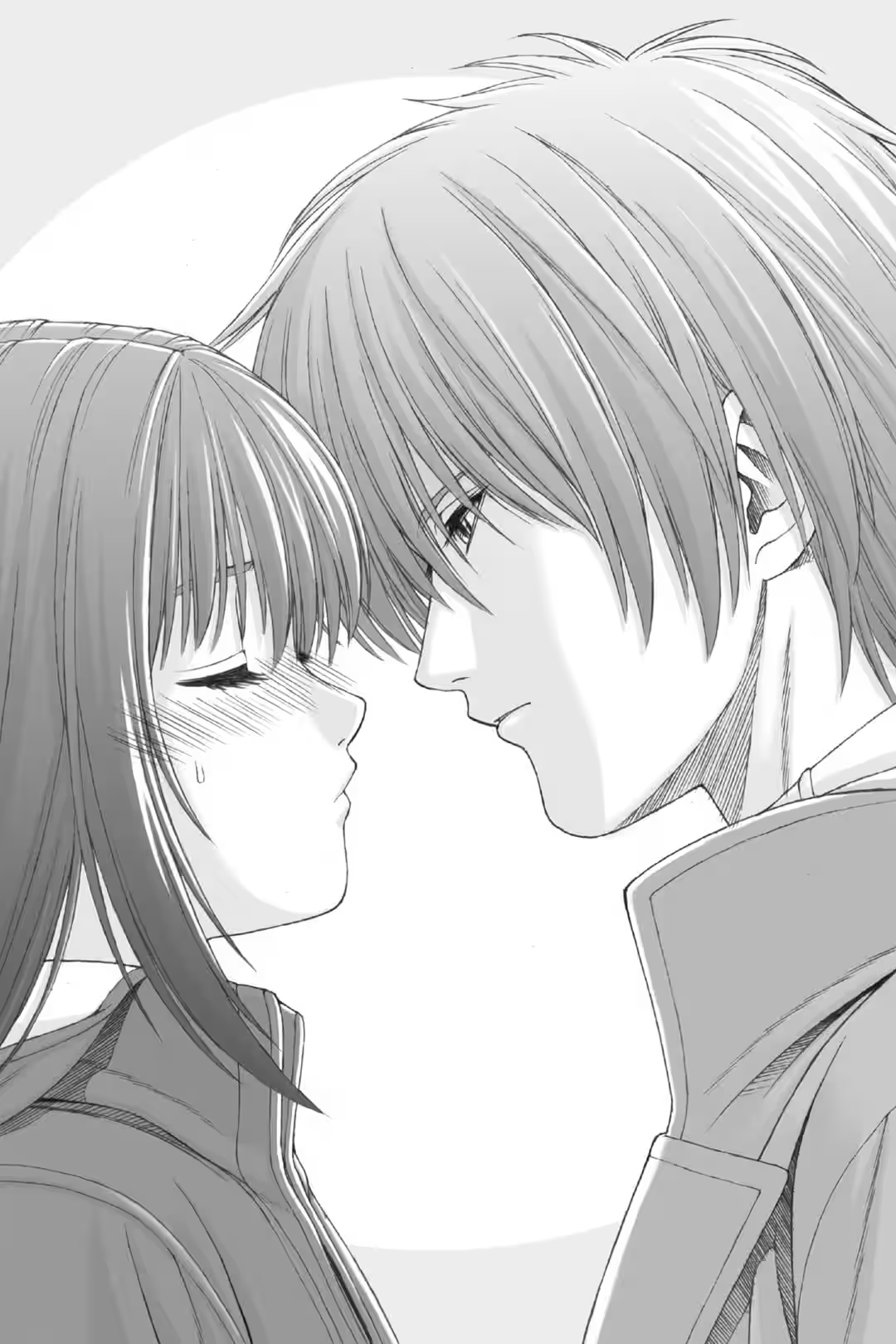
“Hey, what’s this ‘promise’ about, guys?” broke in the radio at Harvey’s feet. He fumbled blindly for the power switch, and the voice cut off with a short burst of static.
The smell of tobacco and a faint puff of breath brushed her lips—
—and that was all.
When she opened her eyes, Harvey’s face was just a few millimeters from touching her own; his single copper eye blinked once before, without warning, he dropped his gaze straight down. Kieli bent her own neck, following it, and found that Nana had crawled halfway up his chest and was staring intently at them.
She exchanged another look with Harvey at that very close range.
He averted his eye and abruptly stood up, sending Nana sprawling down into the sand, and the radio around her neck with her.
“Looking back on it, I don’t think I made any promises.”
Harvey’s face assumed a look of complete, and belated, innocence as he adjusted the cigarette in his mouth and brushed the sand from his clothes and hair. Then he got up and started walking away from the sandbox. After an interval during which Kieli sat in stunned silence, she leapt to her feet as if struck by lightning, and started running after his tall form.
When she caught up, she stalked after him from right up close, pulling at the back of his coat with both hands. “What?!”
“What!” Nana mimicked, coming up beside them and hanging off of the hem of Harvey’s coat.
“That’s not fair!”
“Not fair!”
“Argh, leave me alone. Knock off the stereo effects, you’re bugging me.” Harvey strode forward in long steps, half-dragging the two clinging girls after him and not once looking back at them.
“Oh, I can’t believe you…!”
“Hey, you three, time for fireworks!” someone called to them from a distance. When Kieli peeked over Harvey’s arm, a mouse in striped overalls was waving from in front of the fire in the clearing. Harvey, who had displayed zero intention of even going near the party up until this point, jumped at the chance and transferred his interests in that direction.
“Listen to that—fireworks. Have you ever seen those before?”
“Hey, you’re changing the subject!”
“Fireworks!”
Kieli resisted, pouting, but Nana had immediately lost interest in the issue at hand, and was apparently all about fireworks now. She brought the radio up to stomach level and cried excitedly, “Corp’ral, Corp’ral, it’s time for fireworks!” Then, confused, she started shaking it and turning it upside down.
“Corp’ral?”
“Gah! You idiot, don’t—”
But by the time Harvey hurriedly tried to stop her, her young finger was already touching the switch.
“You bastard, what was that for?!”
Out came the expected bellow of rage, and also—
“Here we go!” came the shout from the clearing, and a sudden hush fell over the boisterous ring of partying entertainers.
Nana let out a little whoop and took off running for the clearing; and the radio, its rant cut off, streamed protesting static as it bounced against her back. “Come on, Kieli,” whispered the man next to her, and a bandaged hand wrapped around her shoulder and urged her forward too.
While the whole crowd looked on with bated breath, a streak of light shot up from the center of the clearing and straight into the sky as if to rip the blue-gray curtain of night.
They all looked up as one, following the light, and—
“…Wow…!”
A chorus of cheers filled the air.
The beam of light reached all the way to the clouds covering the sky, and then little bursting sparks of light filled her vision like scattered sand and rained down on them from above. “It’s beautiful…” was all Kieli breathed, staring stunned into the sky. It was such an uninspired thing to say, but it was from her heart, and it was all there was. Without any conscious thought, she reached up to squeeze the hand on her shoulder.
Could this same sky be seen from the park right now, too?
Could this same sky, those same pinpricks of light, be seen from that school in the ruins, too? Kieli hoped so. She hoped that somewhere out there, little Elisha was running around squealing just like Nana was now, reaching up with both hands and trying to catch the lights. She hoped that the young eyes of the kids looking up at the sky from their classroom window—Elisha’s and the little boys’, and Sarah’s and Joachim’s, and the sunset eyes of that boy with the matching copper hair—were seeing those same sparkling grains of light.
That those grains of light would rain down just the same way on the tiny stone grave markers in the corner of the schoolyard, sparkling and sparkling and sparkling.
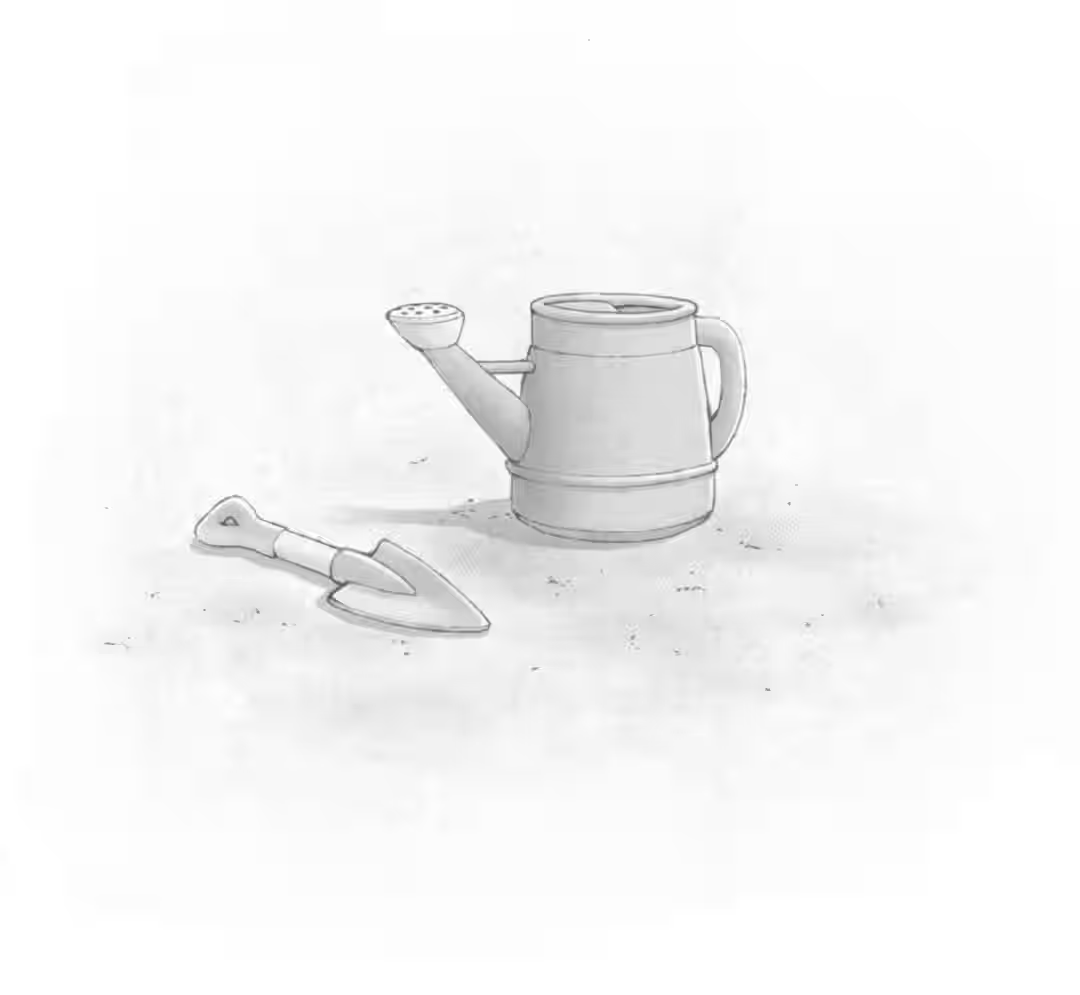
I was fishing through old files on my computer looking for something when I stumbled across the “alpha version” of Kieli Volume 1 (this is an earlier manuscript than the one I submitted for the ninth Dengeki Game Novel Awards; really a very clumsy one from when I was just starting out). I read over some passages, and discovered that since the Corporal’s speech patterns and age hadn’t been established firmly in my mind yet, he was in his thirties in some places, in his forties in others, and in some places much older than that, even. He wasn’t frank like he is now, either. He spoke in more of a tough-guy military way, and sometimes referred to himself as washi, like an old man would…I don’t want a Corporal like that. The fact that he ended up the way he is now is…more or less a coincidence.
While I was writing the first volume I never dreamed I’d be able to write any sequels for it—or, more accurately, the very idea that my book would be published at all naturally seemed like a concept from some faraway other world. And yet now it’s like, “Wow, I’m on the sixth book,” and I feel both profoundly moved and as if it doesn’t quite seem real.
Er, hello. I’m Yukako Kabei.
So, I’ve somehow managed to present you with the second half of Kieli: The Sunlit Garden Where It Began. It’s an undeniable “second half,” picking right up where the first one left off, so although if you look at Part 2 by itself the amount of action is unusually high, the Kieli novels are…probably not action novels. Not that I think anybody is misunderstanding me on that point, particularly…Normally I like to write low-key, leisurely scenes and places (and it’s also strangely fun to write the parts where Joachim shows up).
At this point in the story’s development, I do have the whole thing decided right up to the very end in my mind, but in any event, Kieli will keep going for a little longer…um, if they let me keep putting it out.
I hope you’ll do me the favor of following the story of these characters’ for a while longer.
Well, I used up the standard “girl with a complicated personality” line in Part 1, and I don’t have much to write, so I worried about what to do with this Afterword, but luckily the Kieli radio drama was recording as I was working on this volume, so I’ll write a little bit about that. Oh, wow. It’s a radio drama. The day has come when I can hear the radio’s voice over the radio.
The manager brought me to the studio on recording day, and I forced poor busy Taue-san to come along, too, for moral support. We watched the recording session from the back of a room with a thrillingly large machine in it (I think it’s called a “mixer”). Since I guess I’m technically the author, sometimes they would ask for my opinion: “How was that?” And I would say things like, “Um…I think it would be good a little more spaced-out, like ‘durr’…” A highlight of the whole experience was seeing the cast and staff’s masterful job of intuiting, and reflecting in their work, the fine nuances that I was trying to express with such clumsy language and endless sound effects that any sane person would think, Do you seriously write Japanese prose for a living? The thing that made me the happiest is that Hiroshi Isobe, who played Harvey, struck up a casual conversation with me. His first words were, “Kabei-san, have you been eating properly lately?”…So that’s the image people have of me, huh? I was so excited I couldn’t talk sensibly, but I’ll treasure the memory for a lifetime.
Isobe-san was a distressingly wonderful Harvey, and Hochu Ohtsuka fit the part of the Corporal so perfectly that I got goose bumps the very moment he said his first line. Kieli had strangely few lines for a heroine (I-I’m sorry about that, now that I think about it), and yet Mai Nakahara brilliantly brought her personality to life with them. I truly appreciate the hard work that you, and all the other cast and staff, did so well. Thank you very much.
And now my acknowledgments for the novel itself. To my managing editor; and all the other publishing staff I’m indebted to; and Taue-san, who enriches the Kieli world from the visual side of things: thank you again, from the bottom of my heart. Plus, we were able to include the comic Taue-san serialized in Dengeki hp at the end of this book! This is a truly deluxe edition. Wow.
Thank you to all my family, friends, and acquaintances, and most especially to Reiko and Fujiwara-san, who always took the time for me and gave me advice. I’m getting along okay, as always.
Thank you to all the readers who’ve sent me warm letters of support. Several people who wrote to me asked me, “Are you reading this on the train?” and quite often I really was on the train, and I couldn’t help grinning (I’m a sketchy passenger).
And I give my very finest thanks to you who are holding this book in your hands. It’s thanks to all of you that I’m able to write novels the way I am.
I hope we get the chance to meet again.
Yukako Kabei
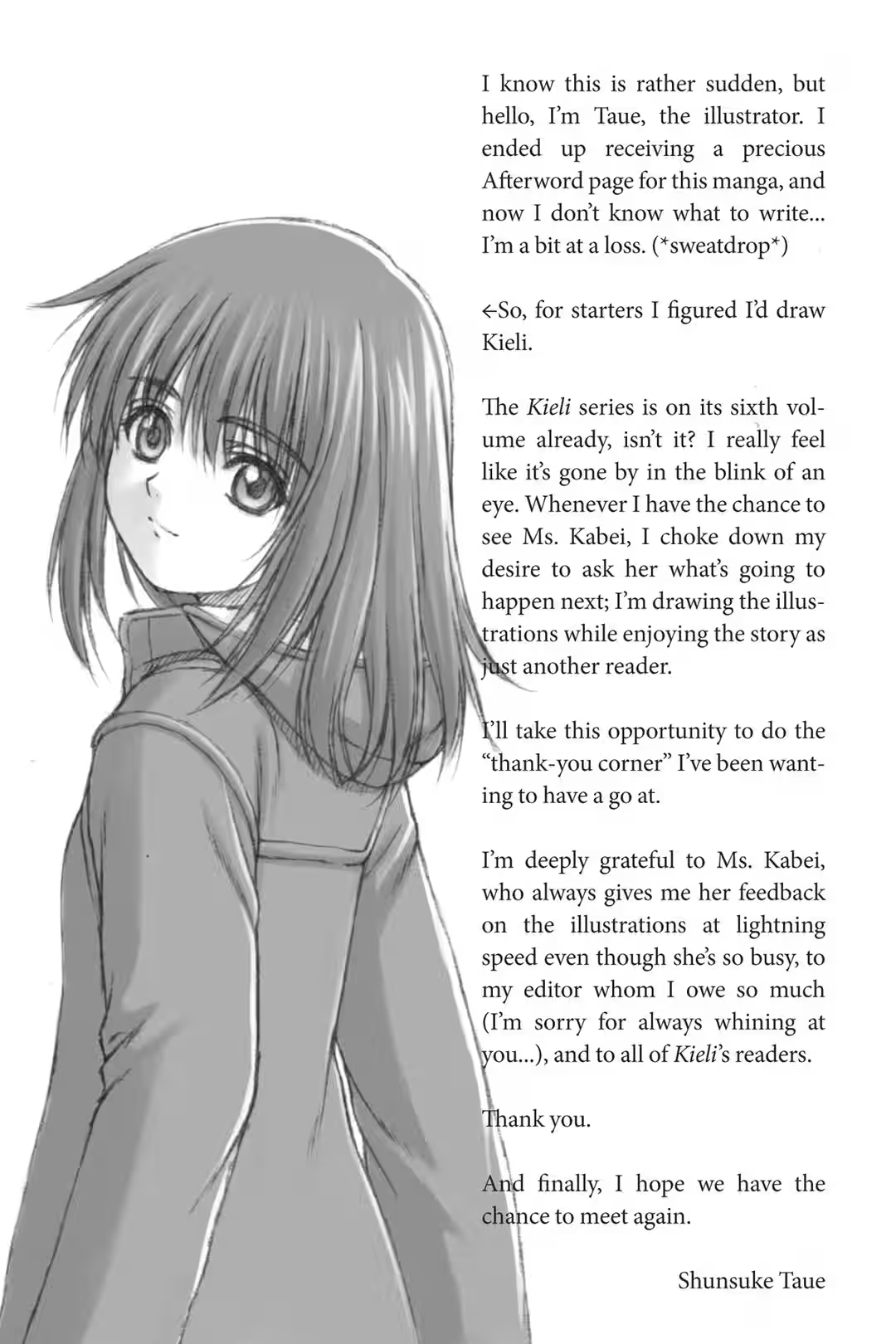
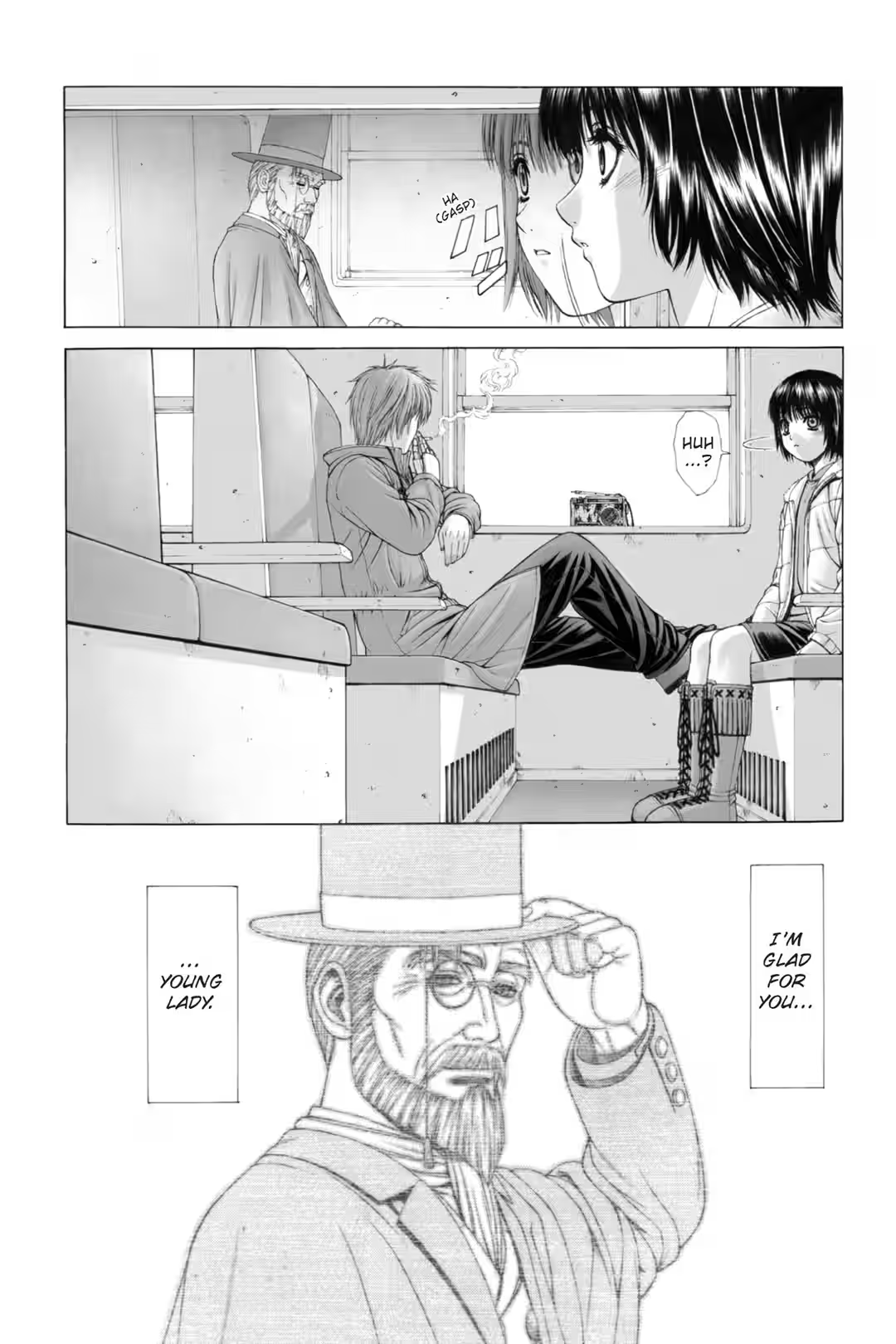
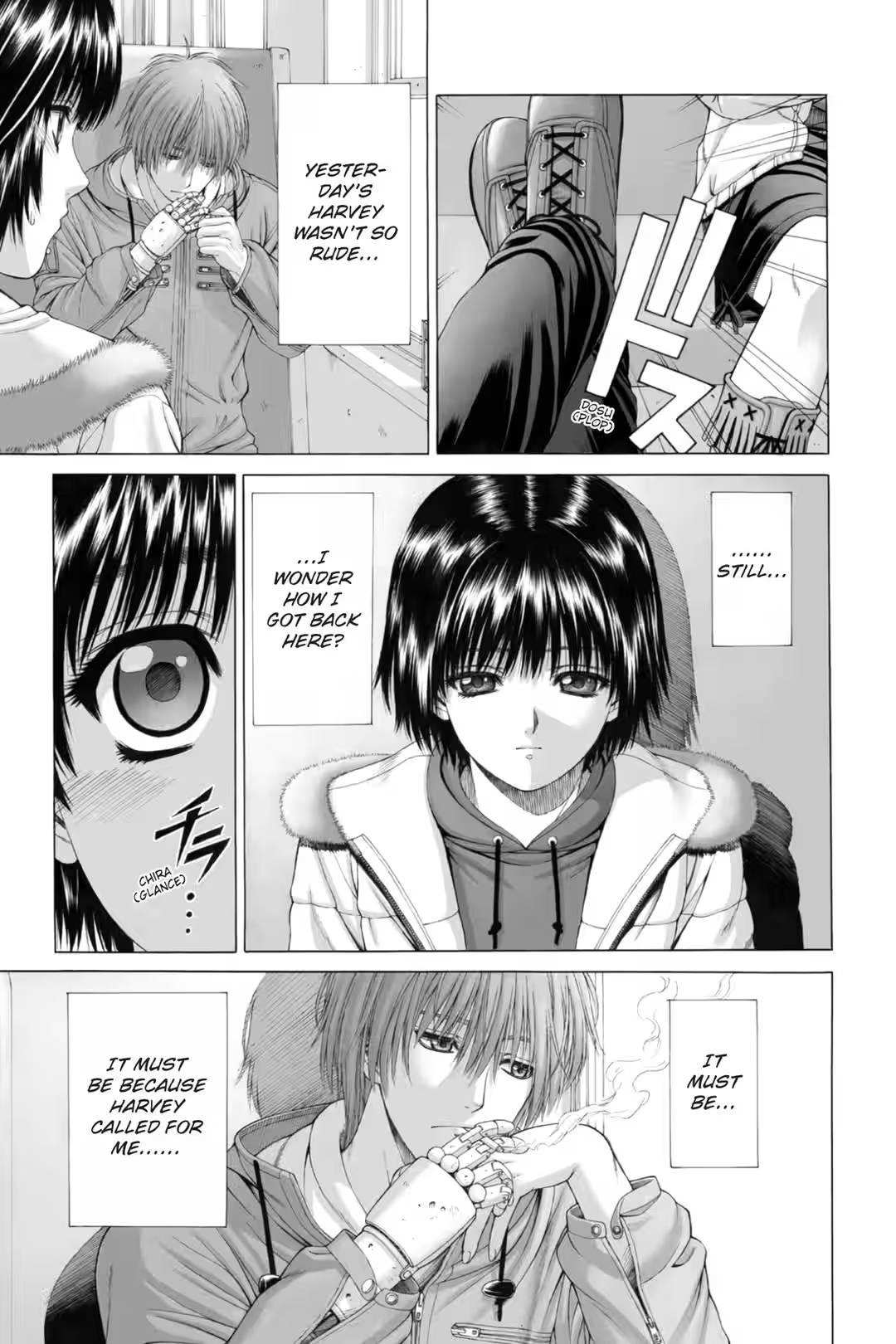
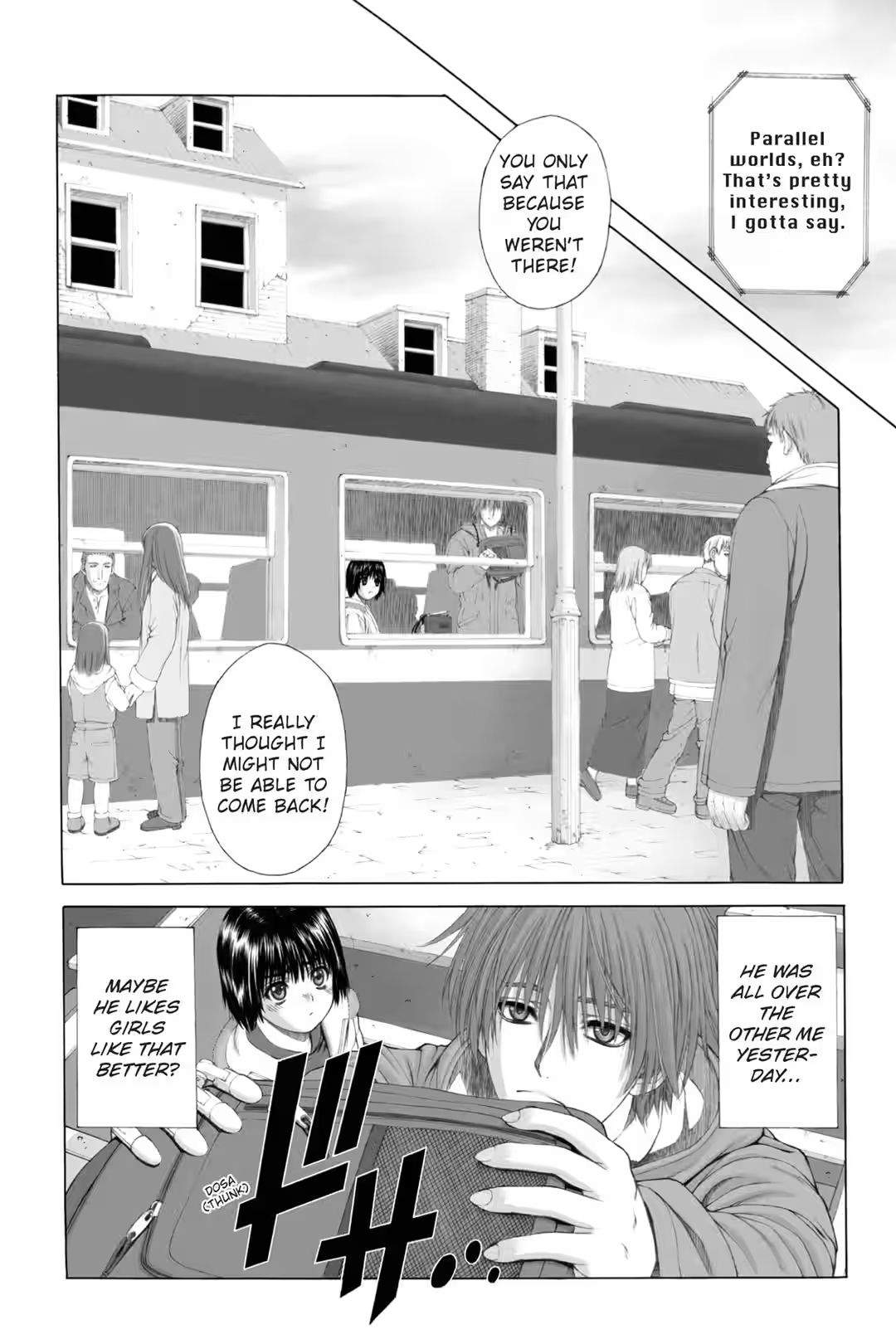
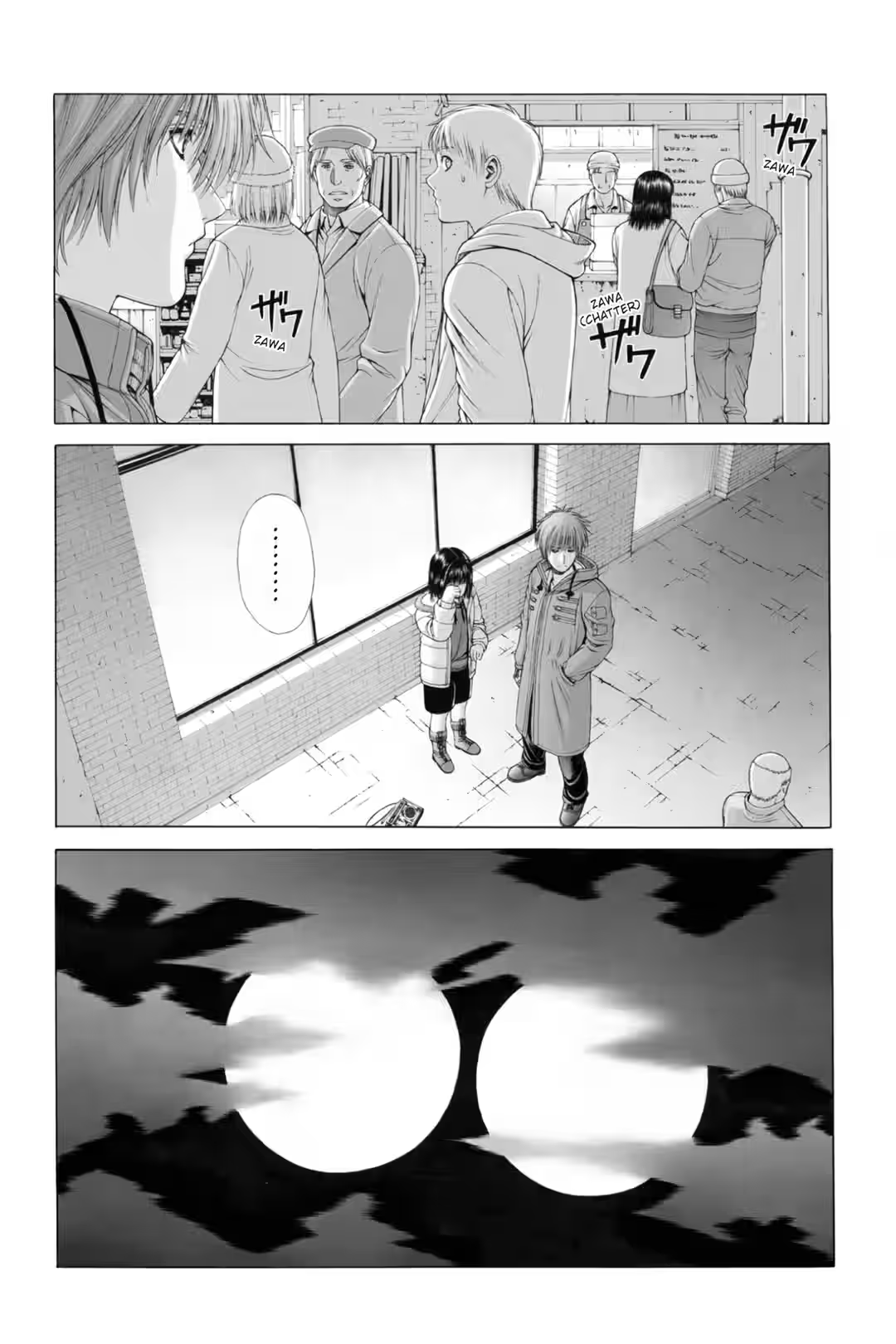
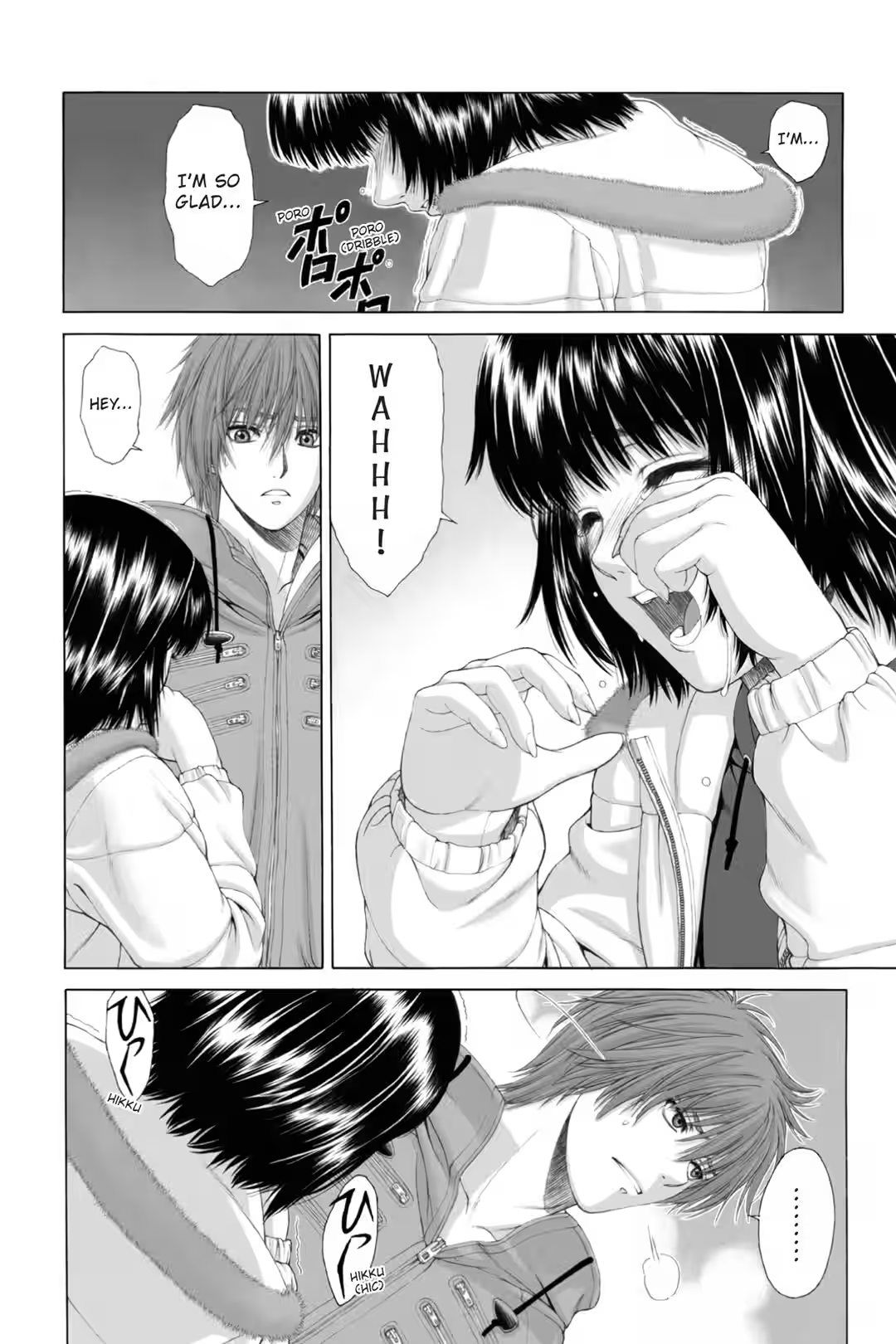
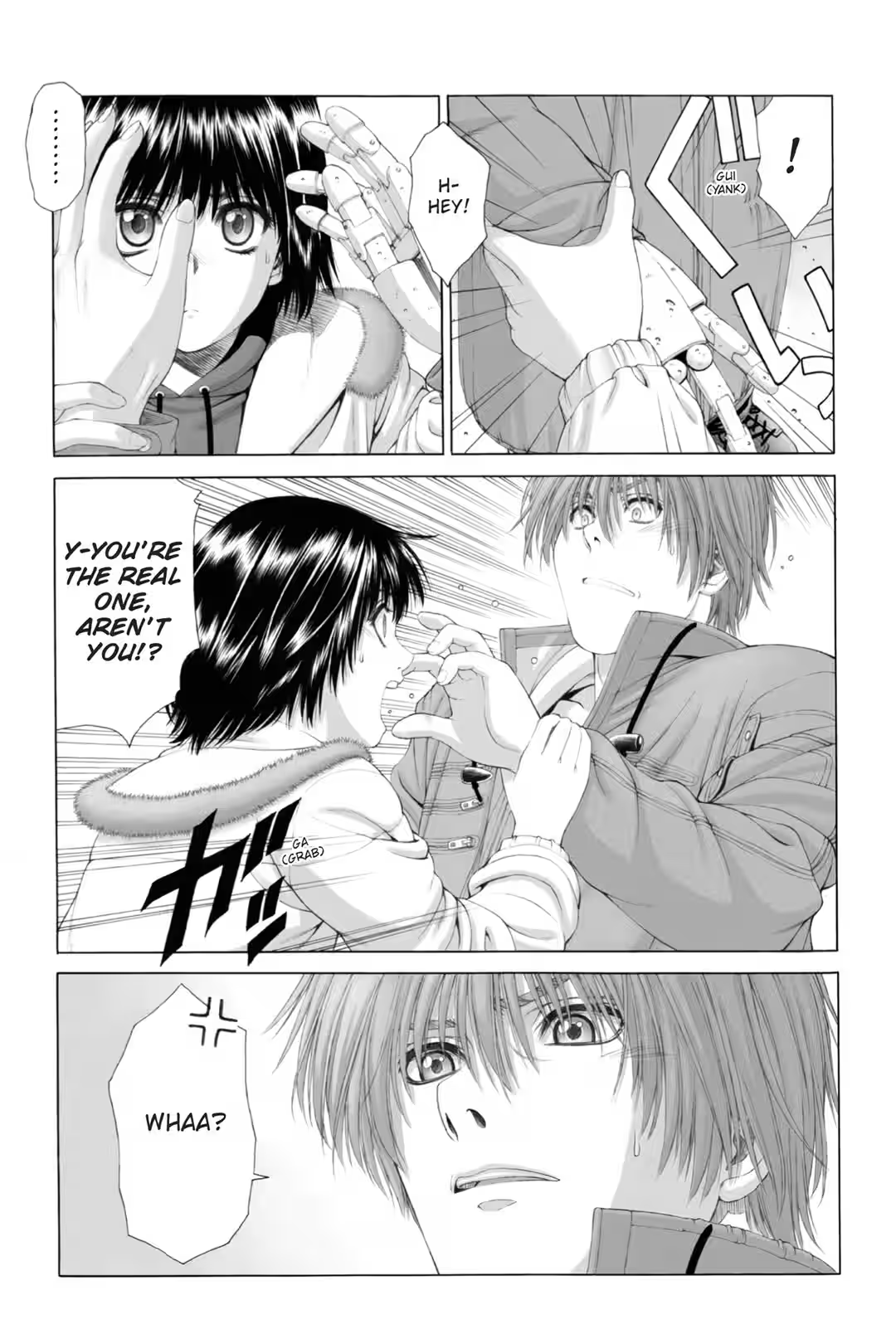
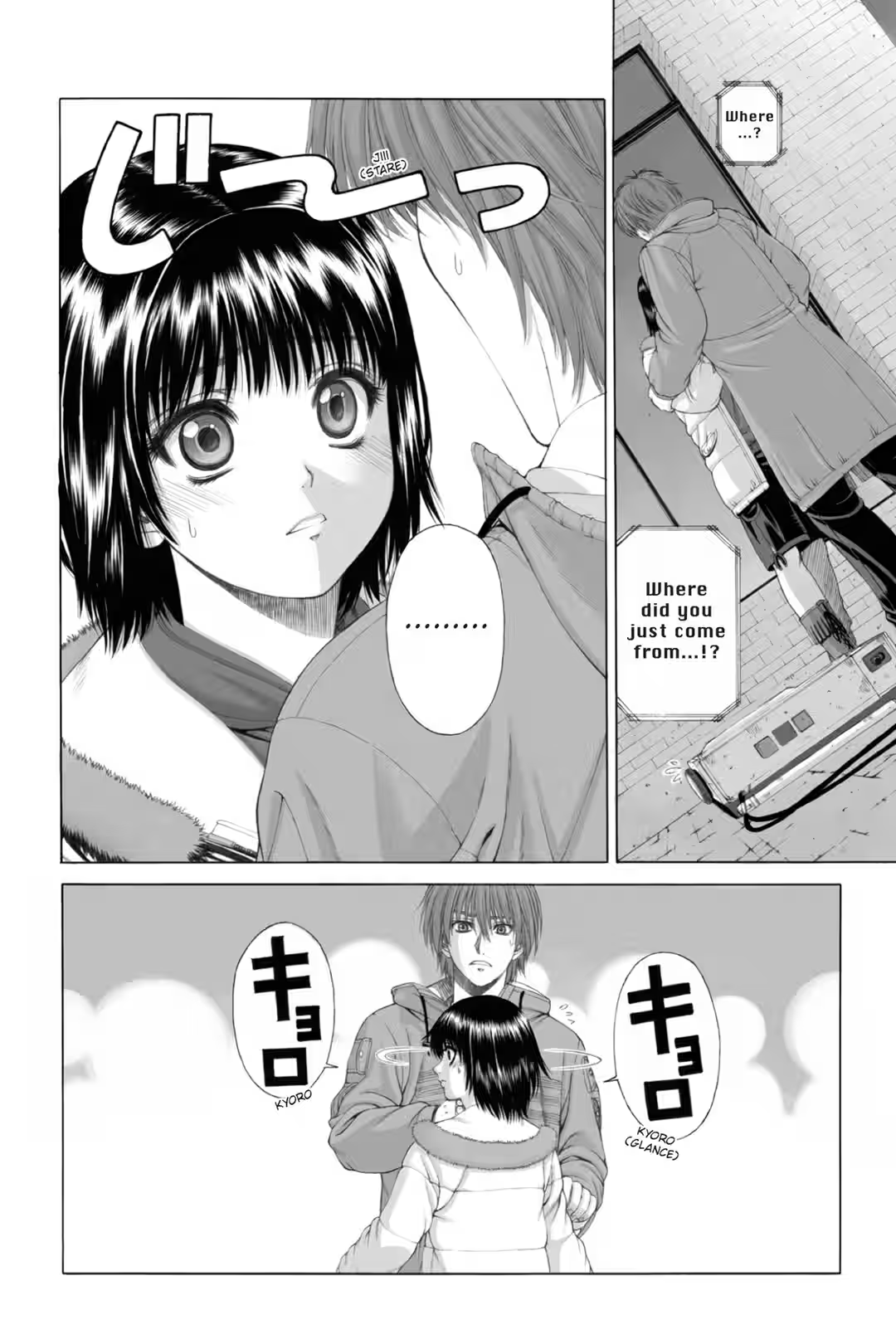
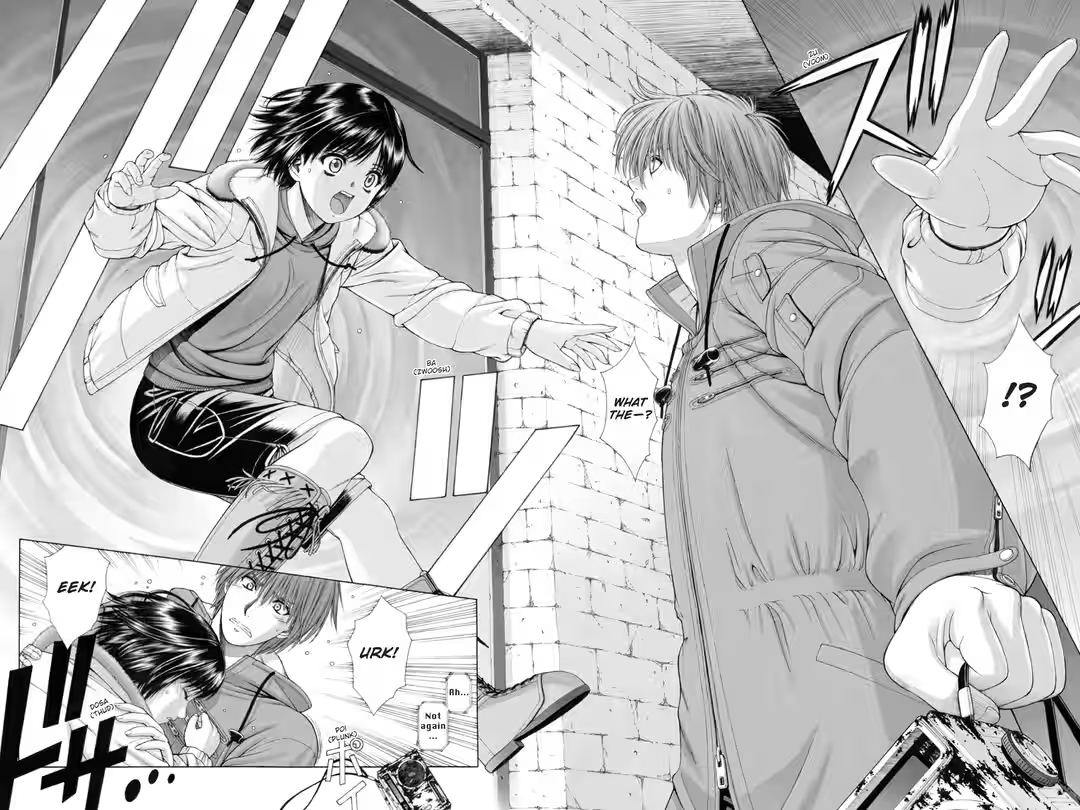
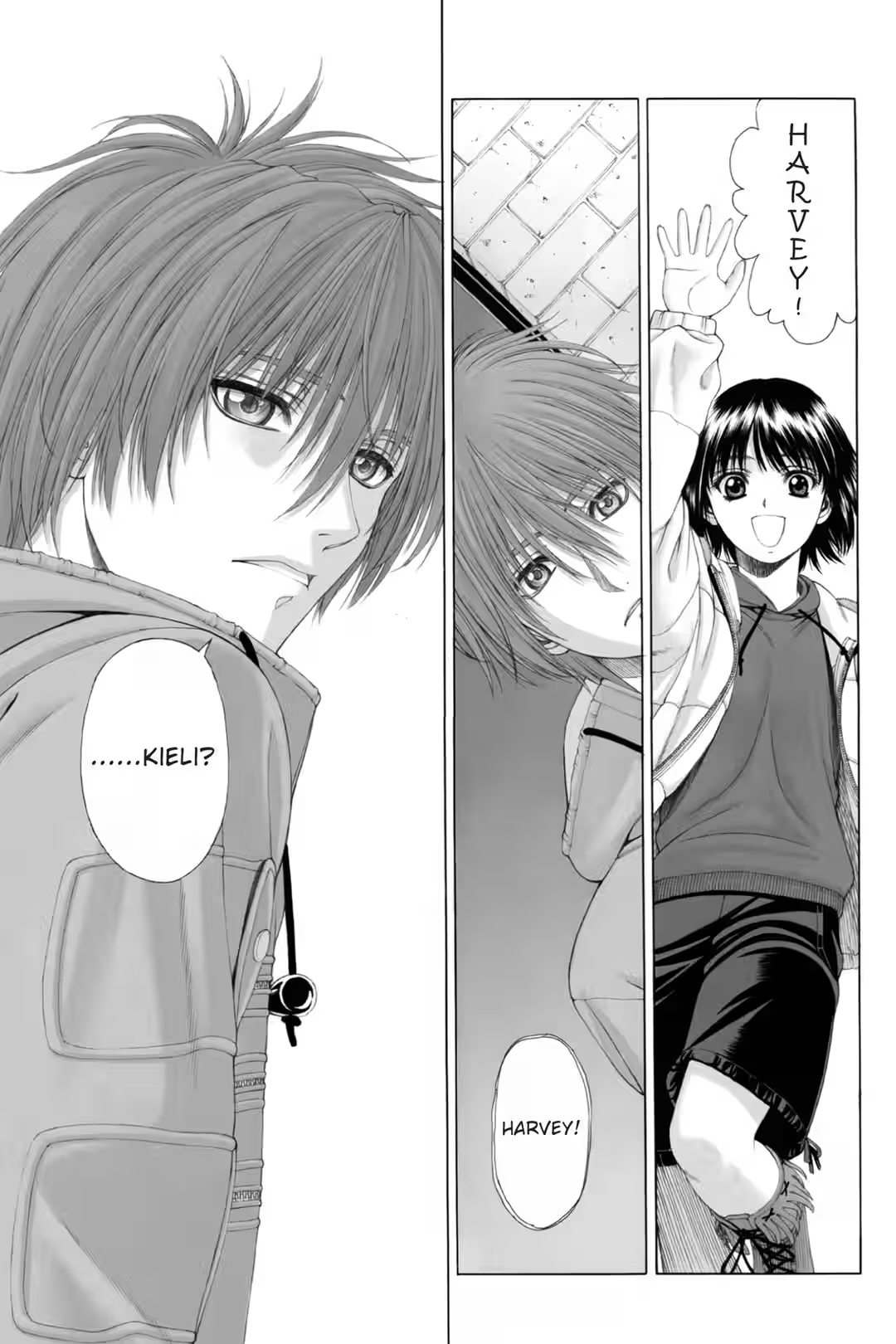
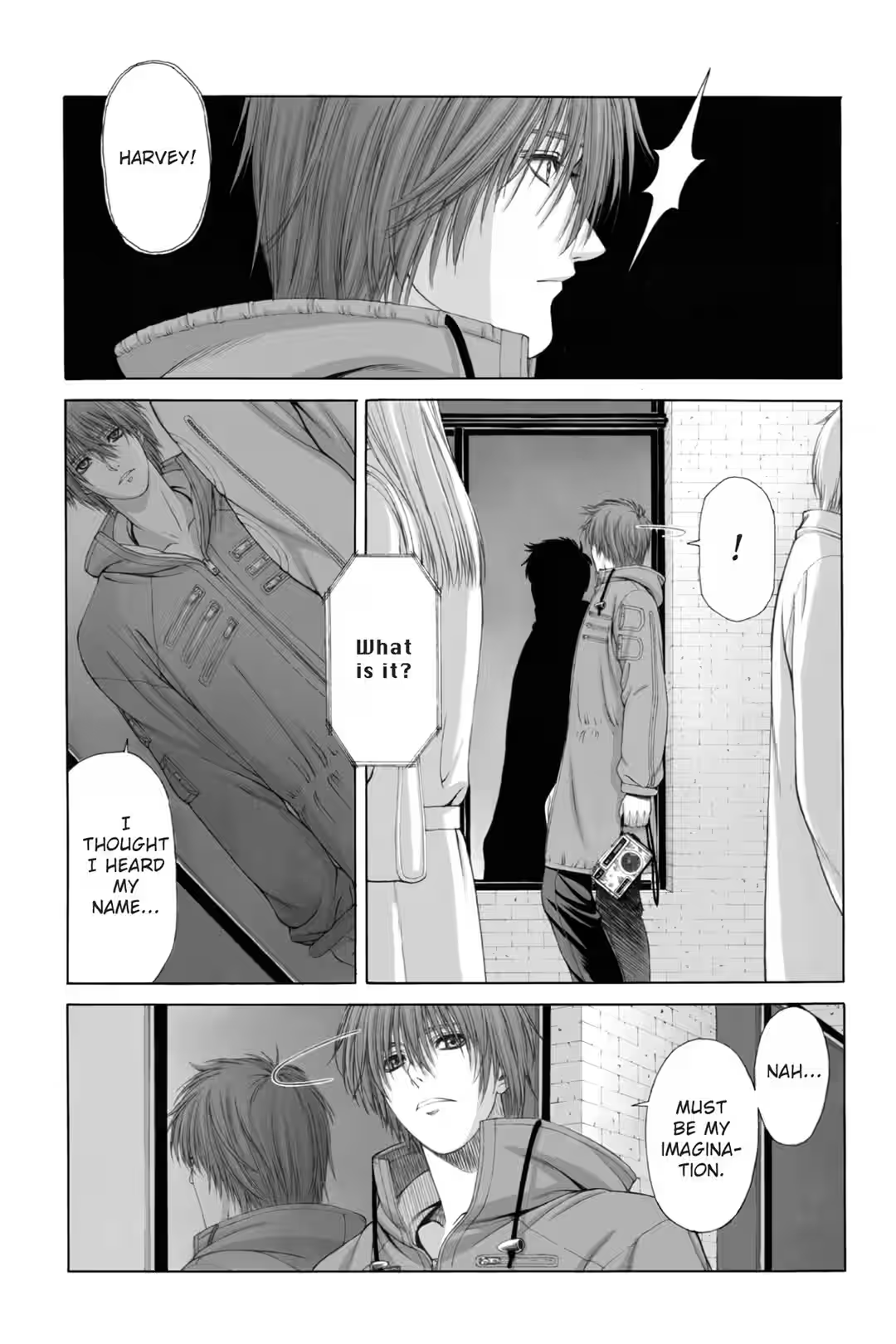
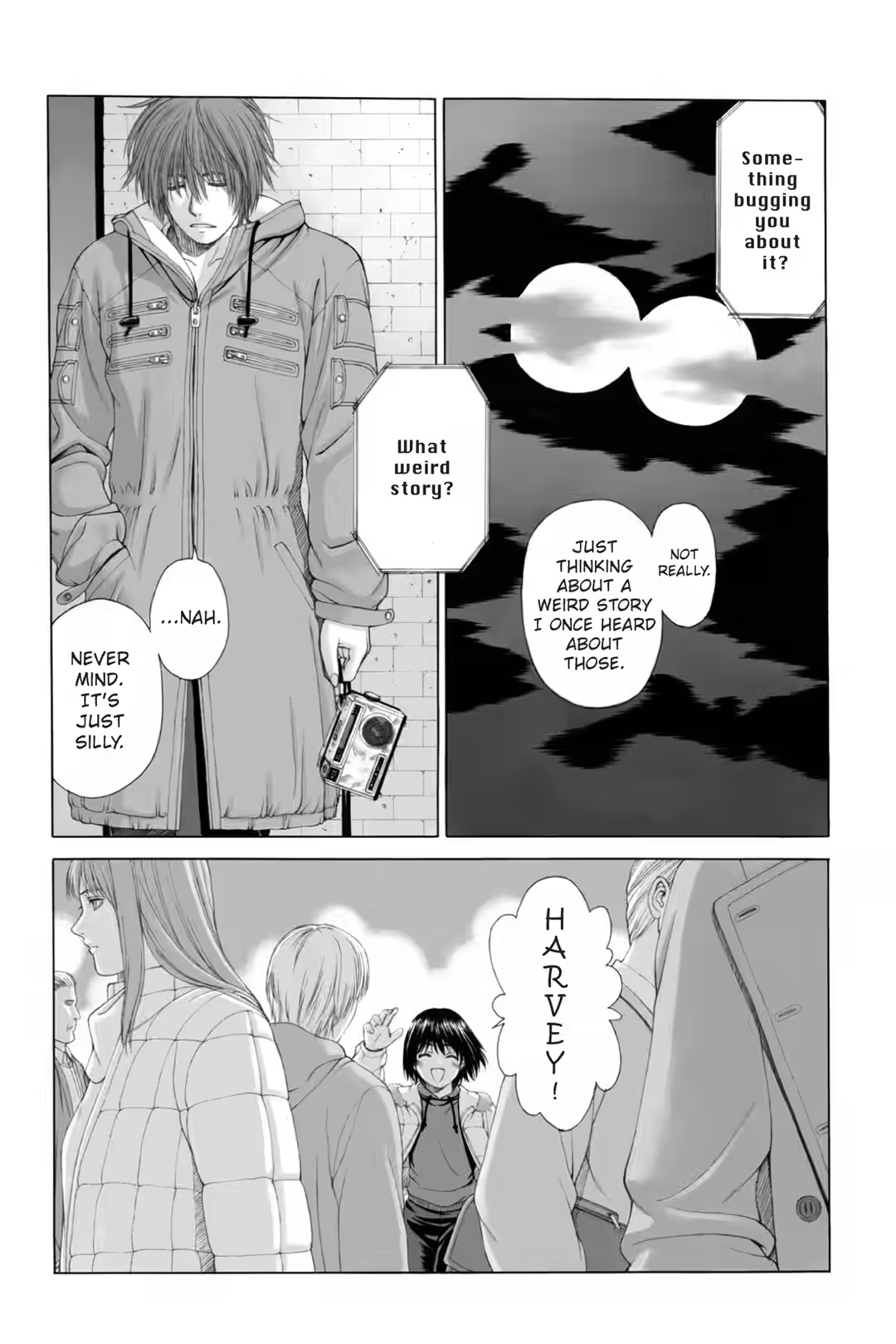
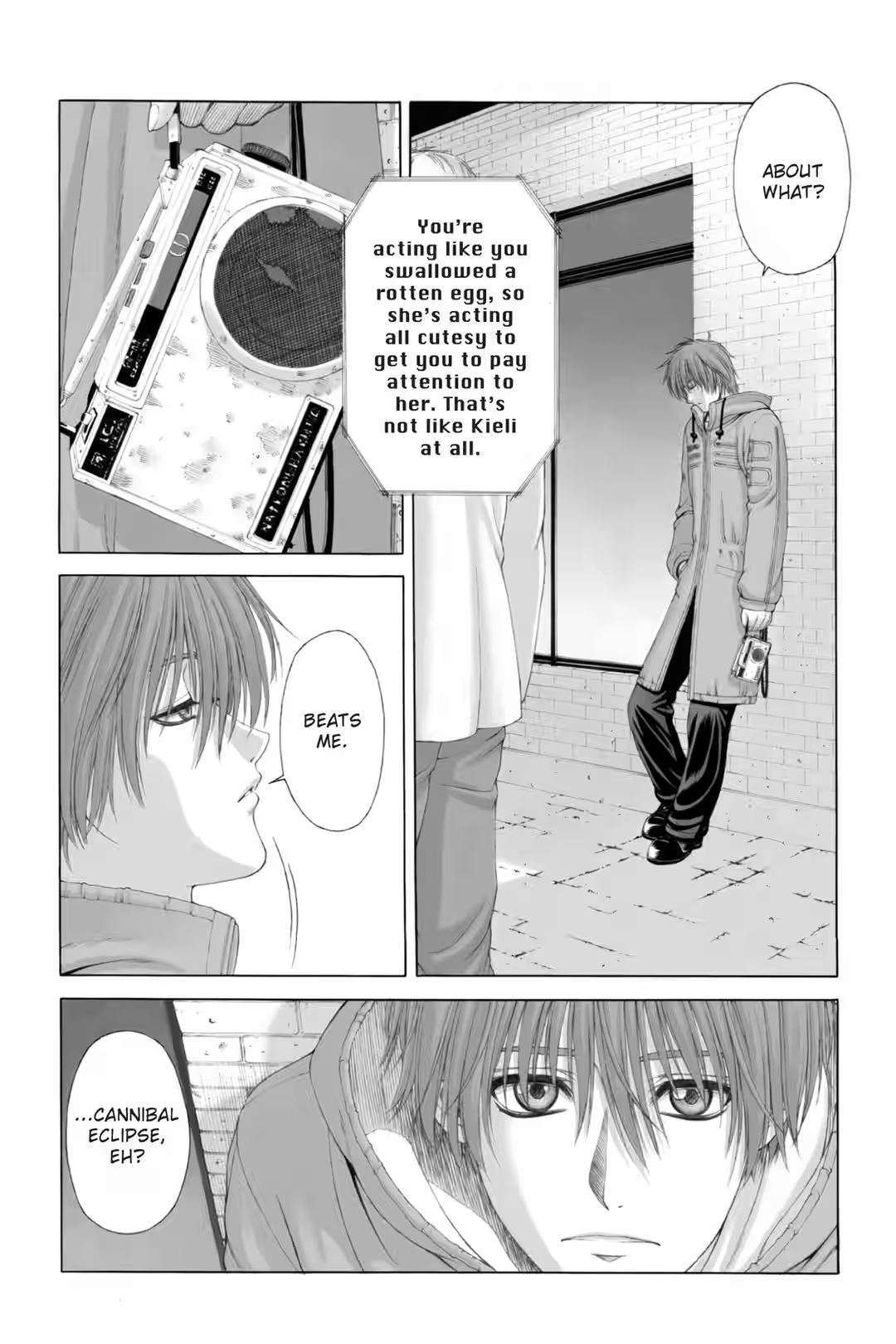
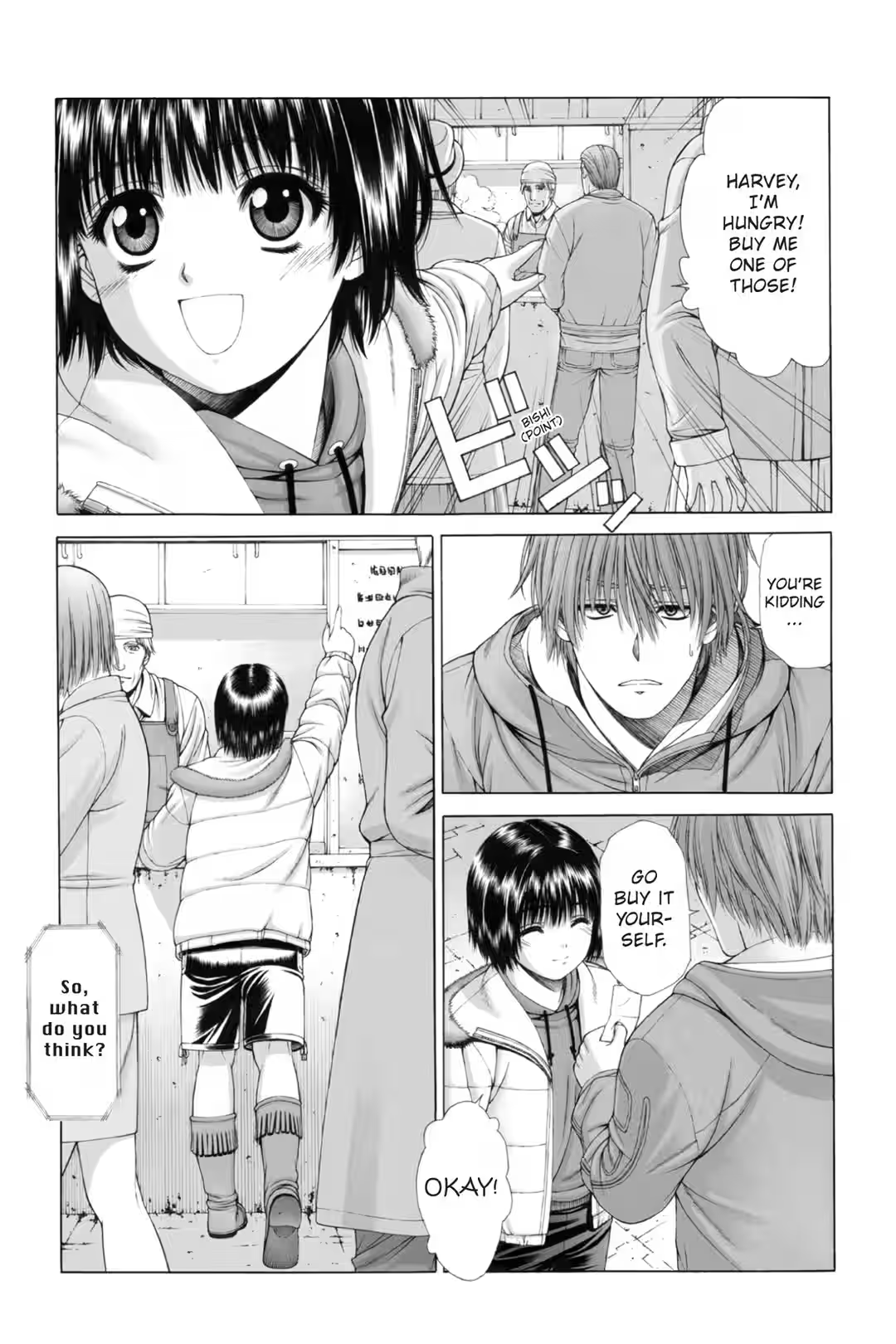
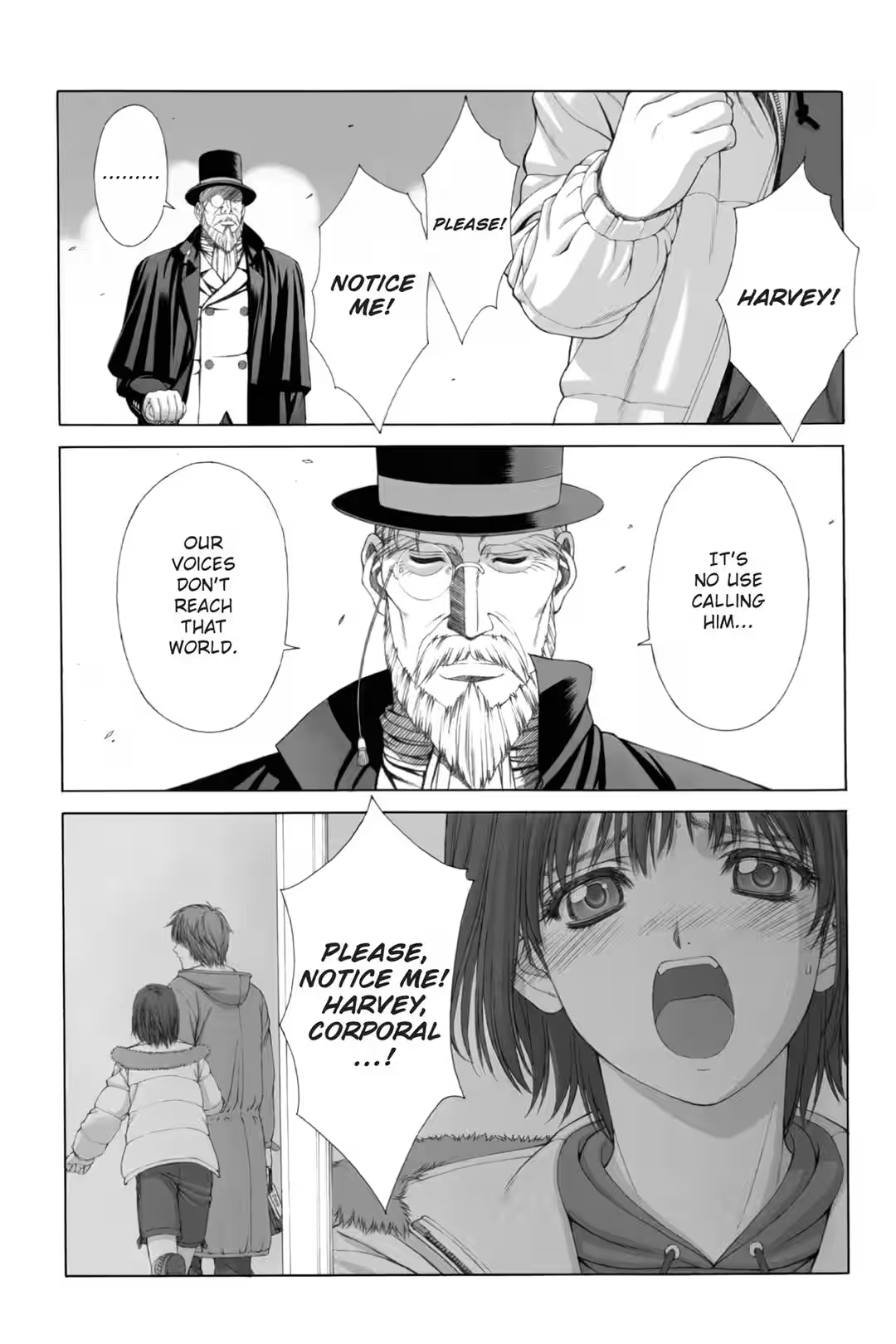
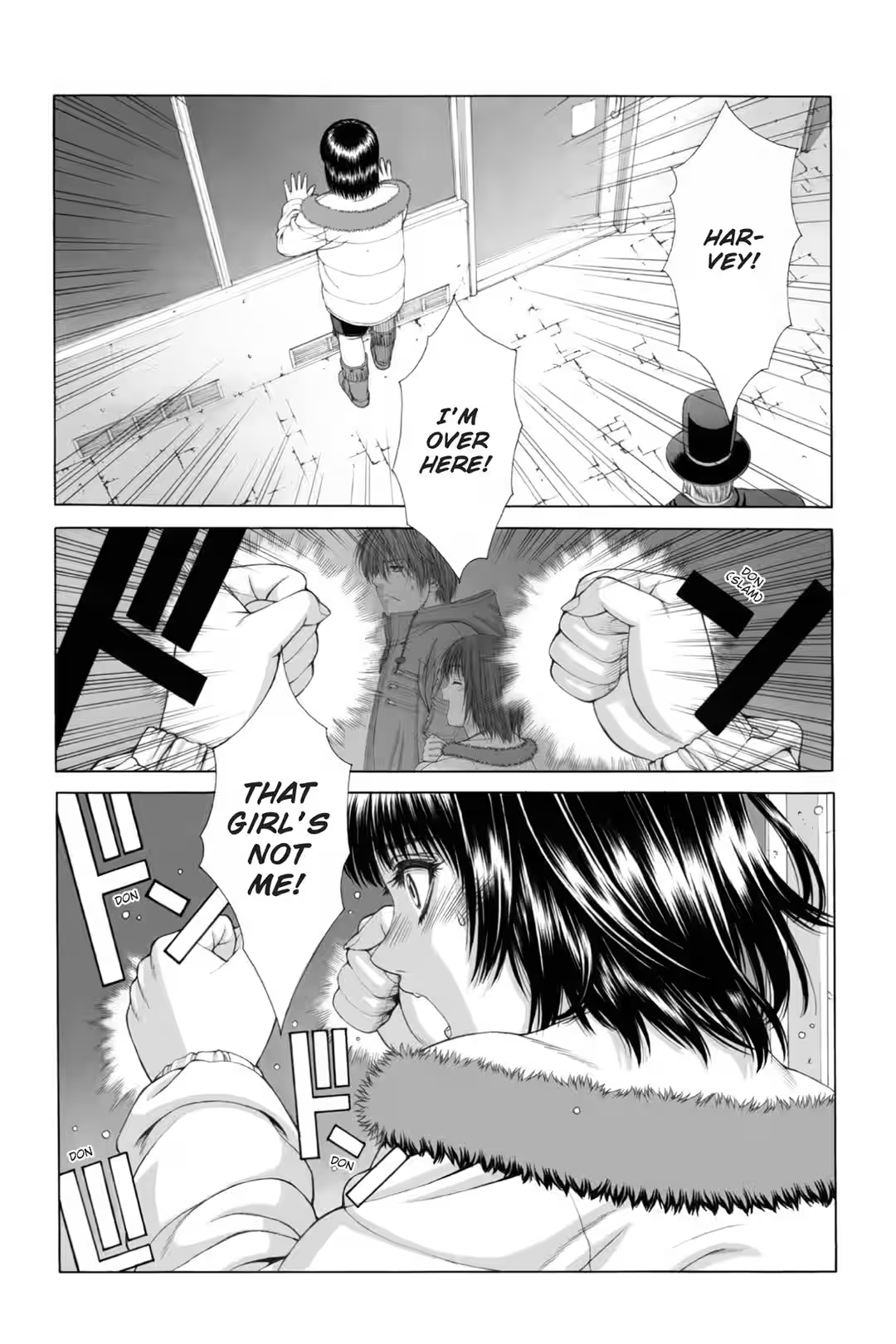
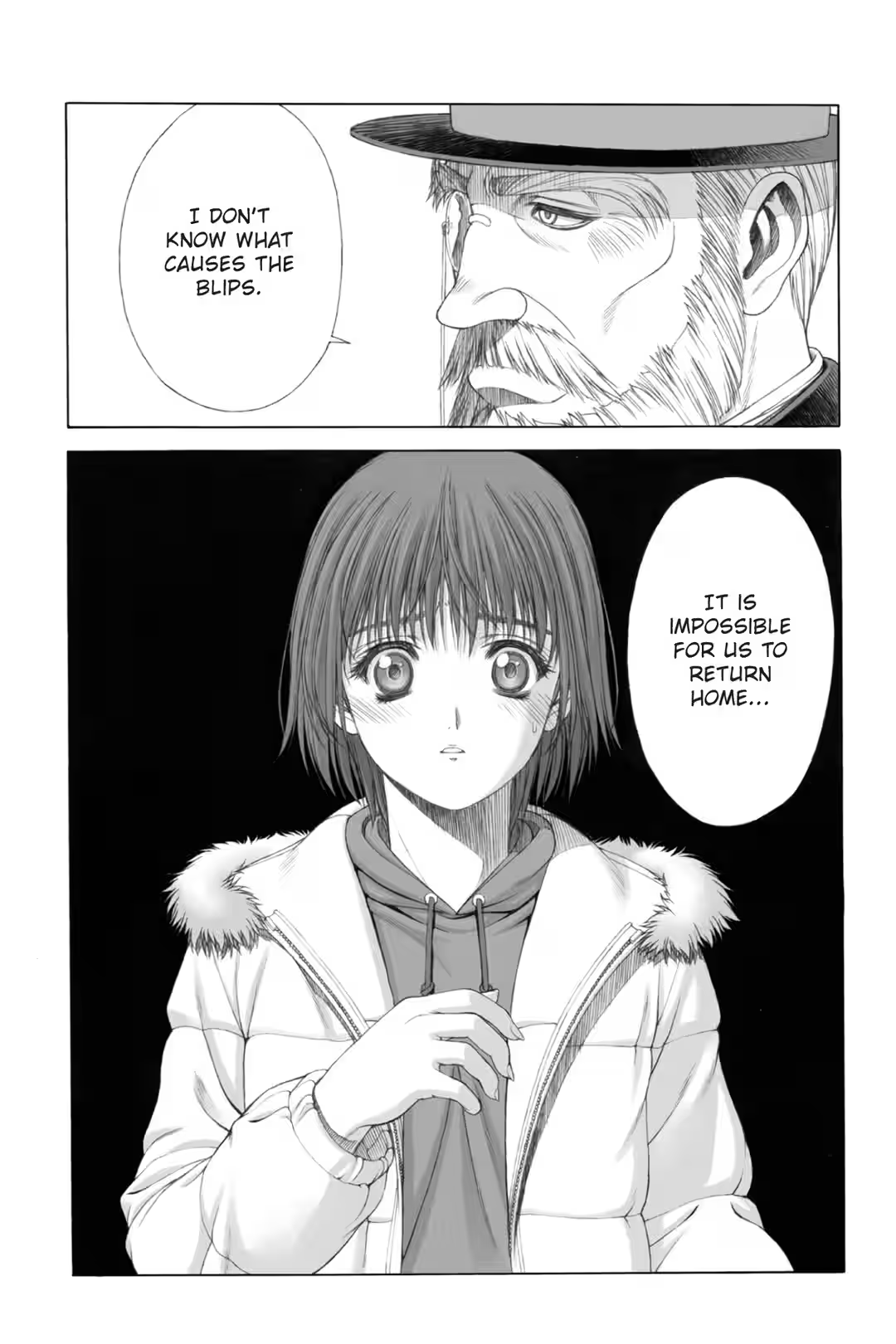
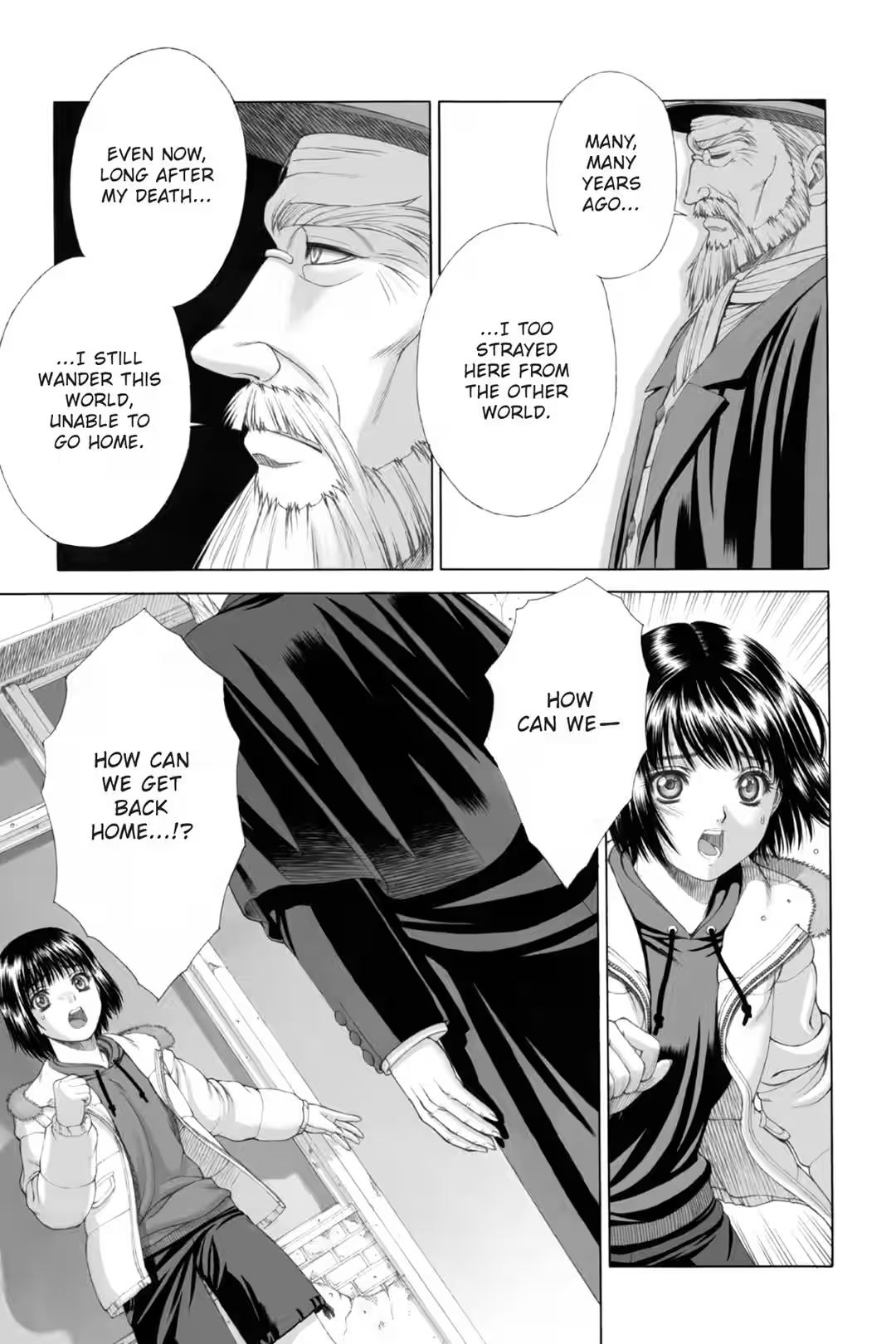
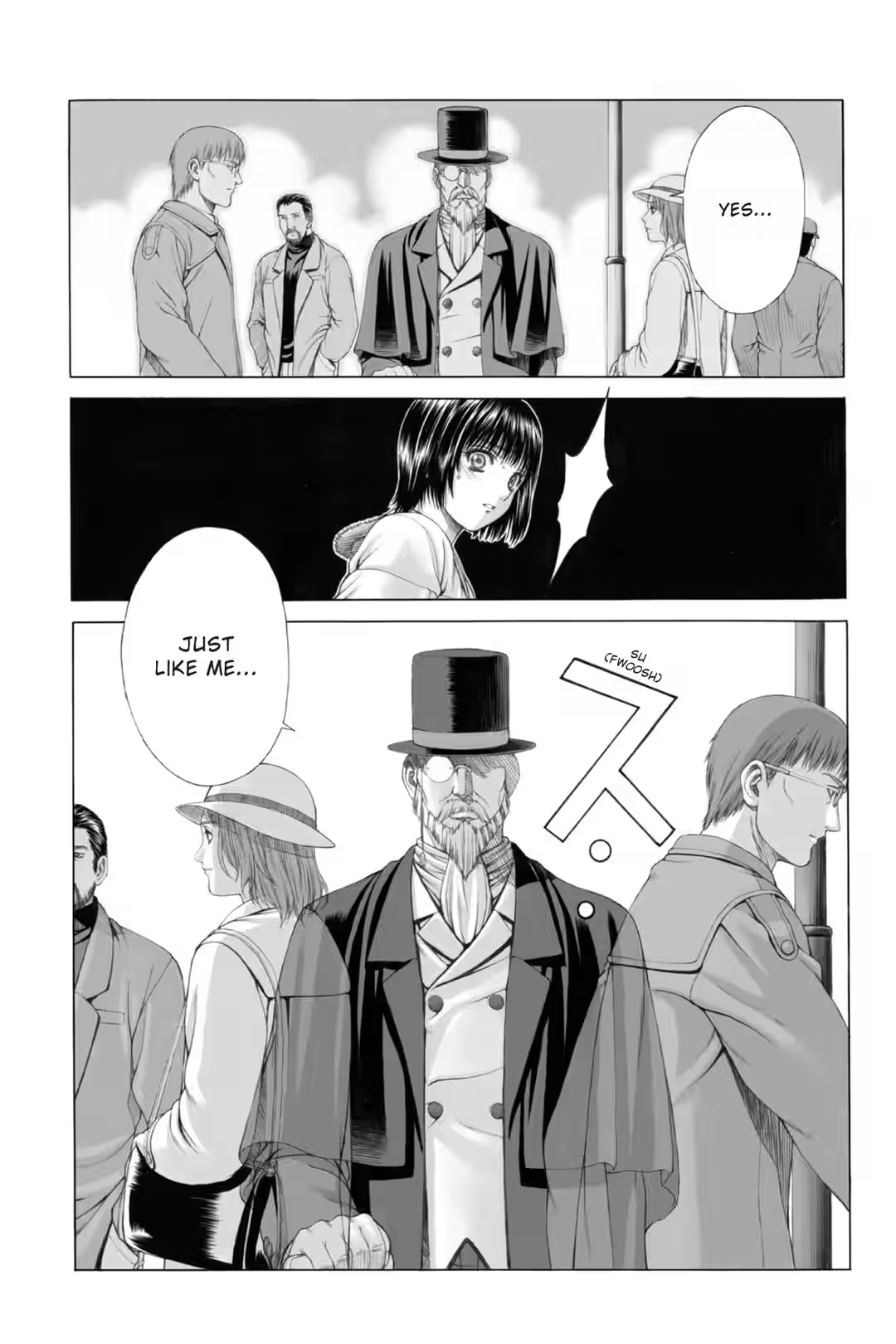
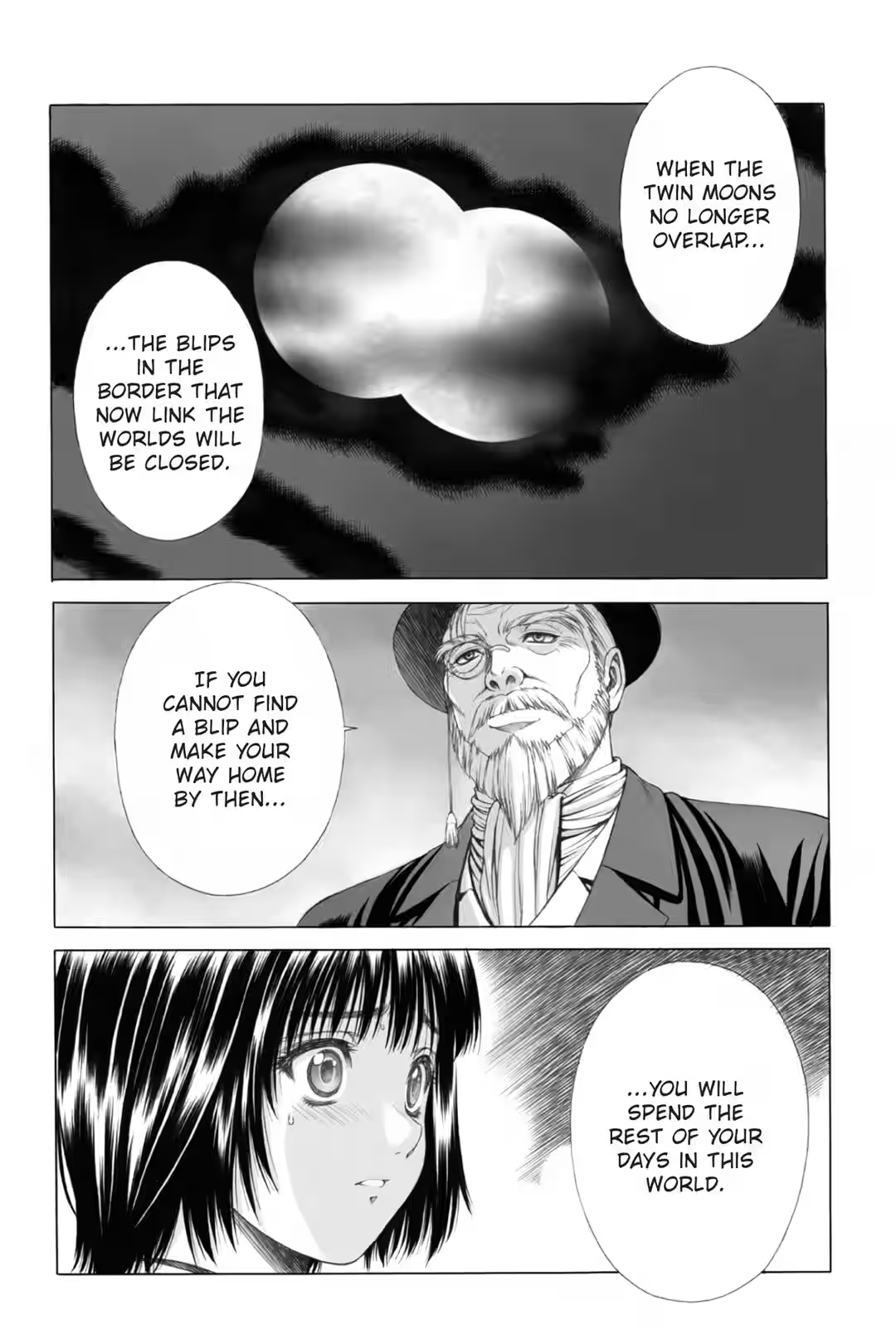
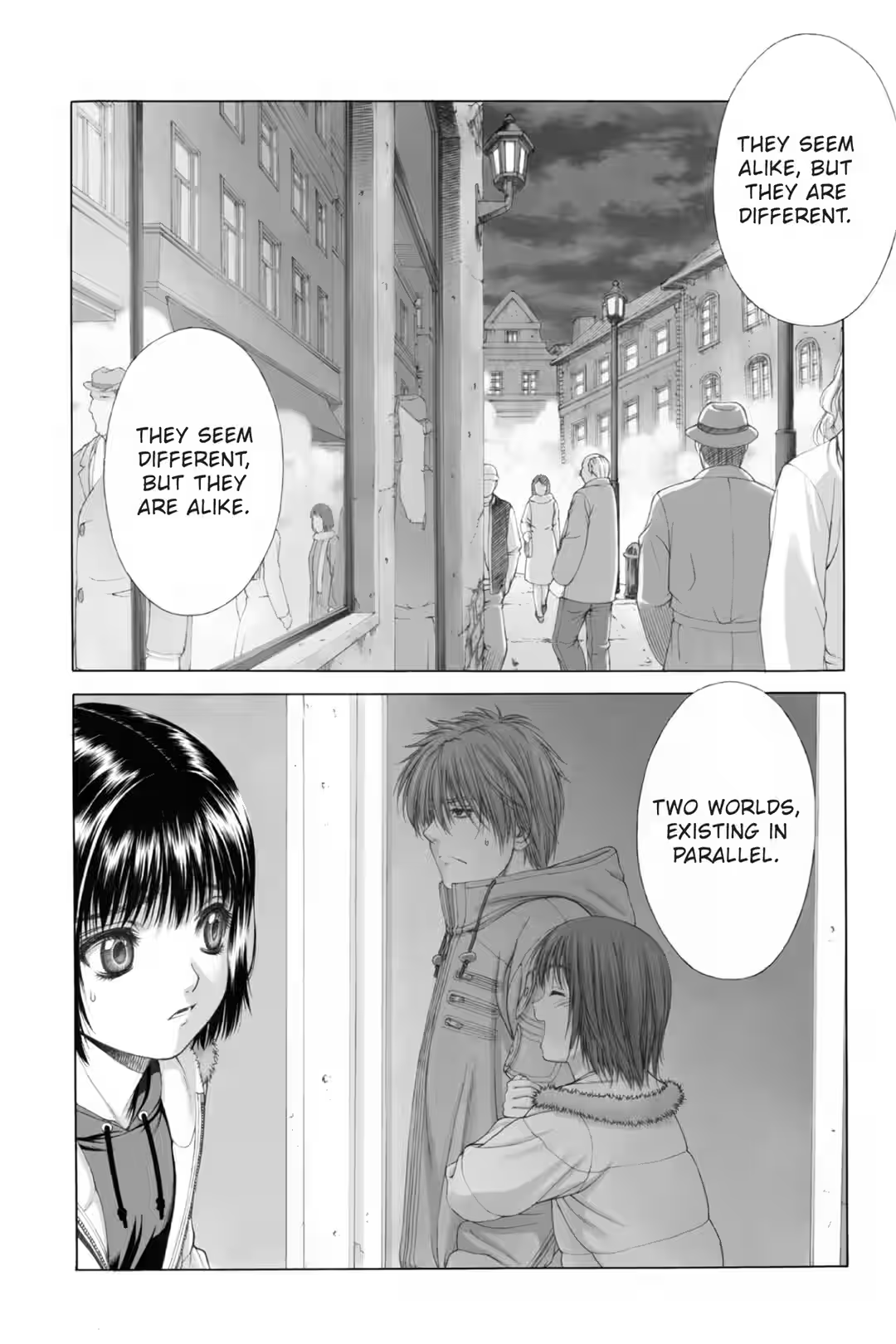
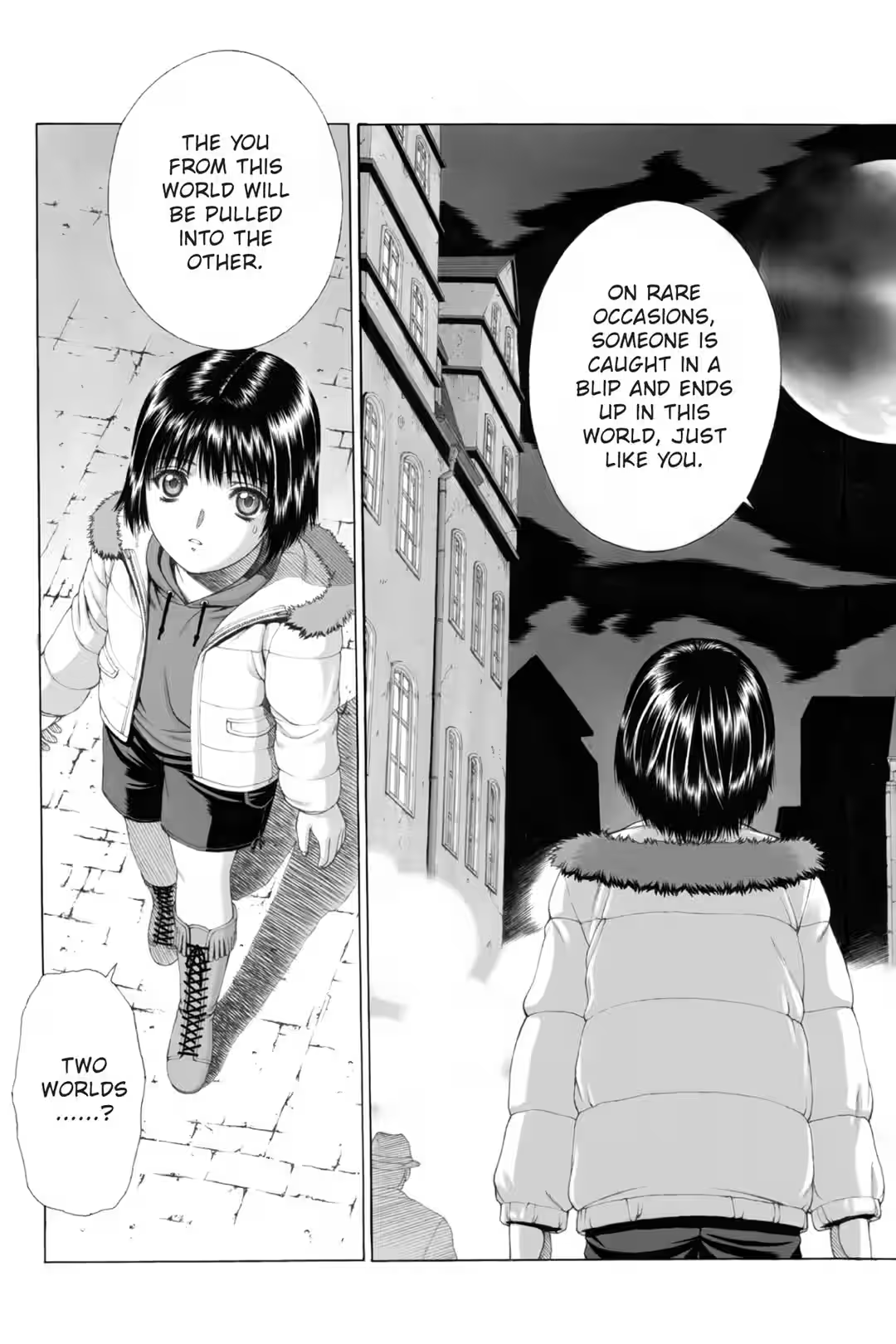
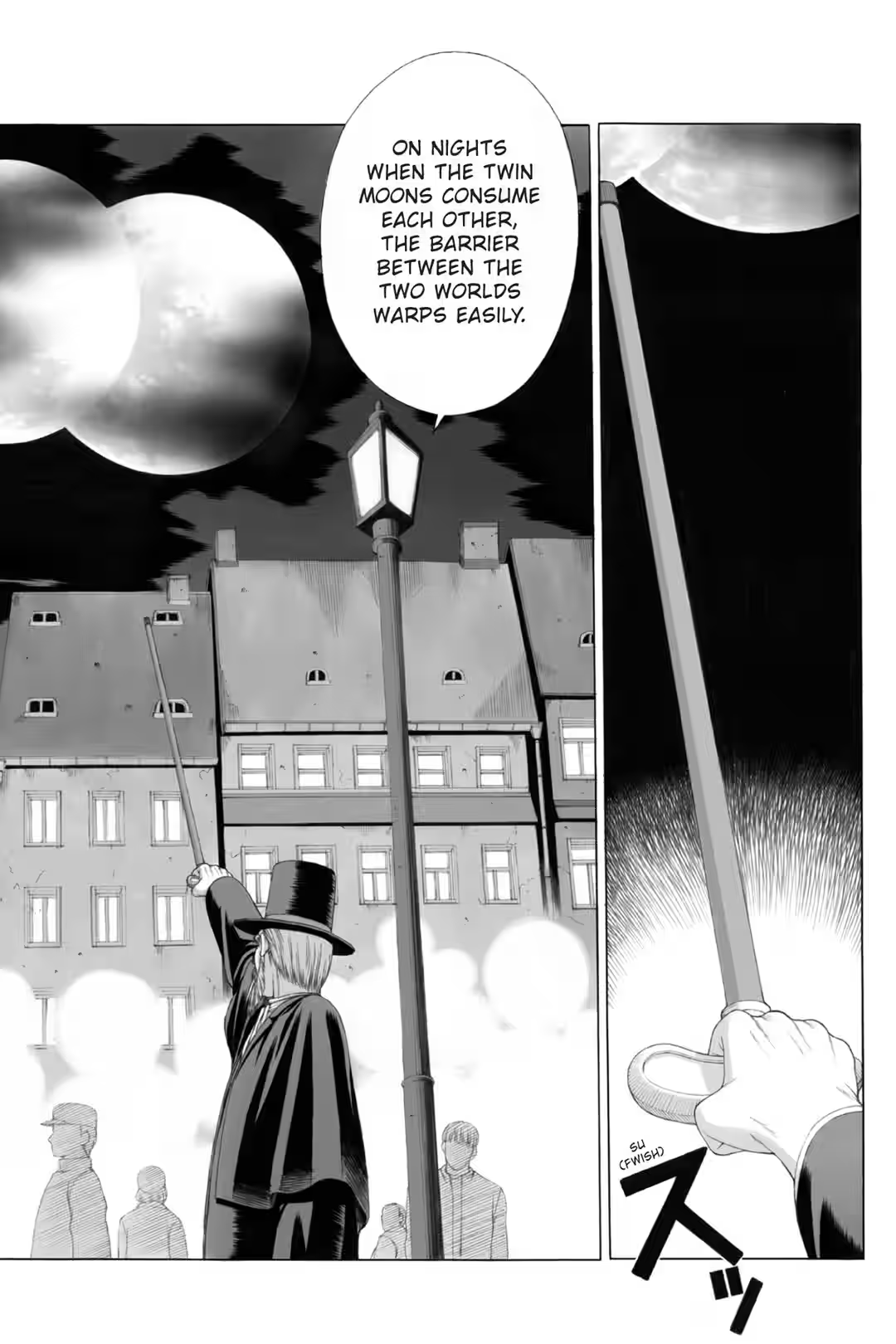
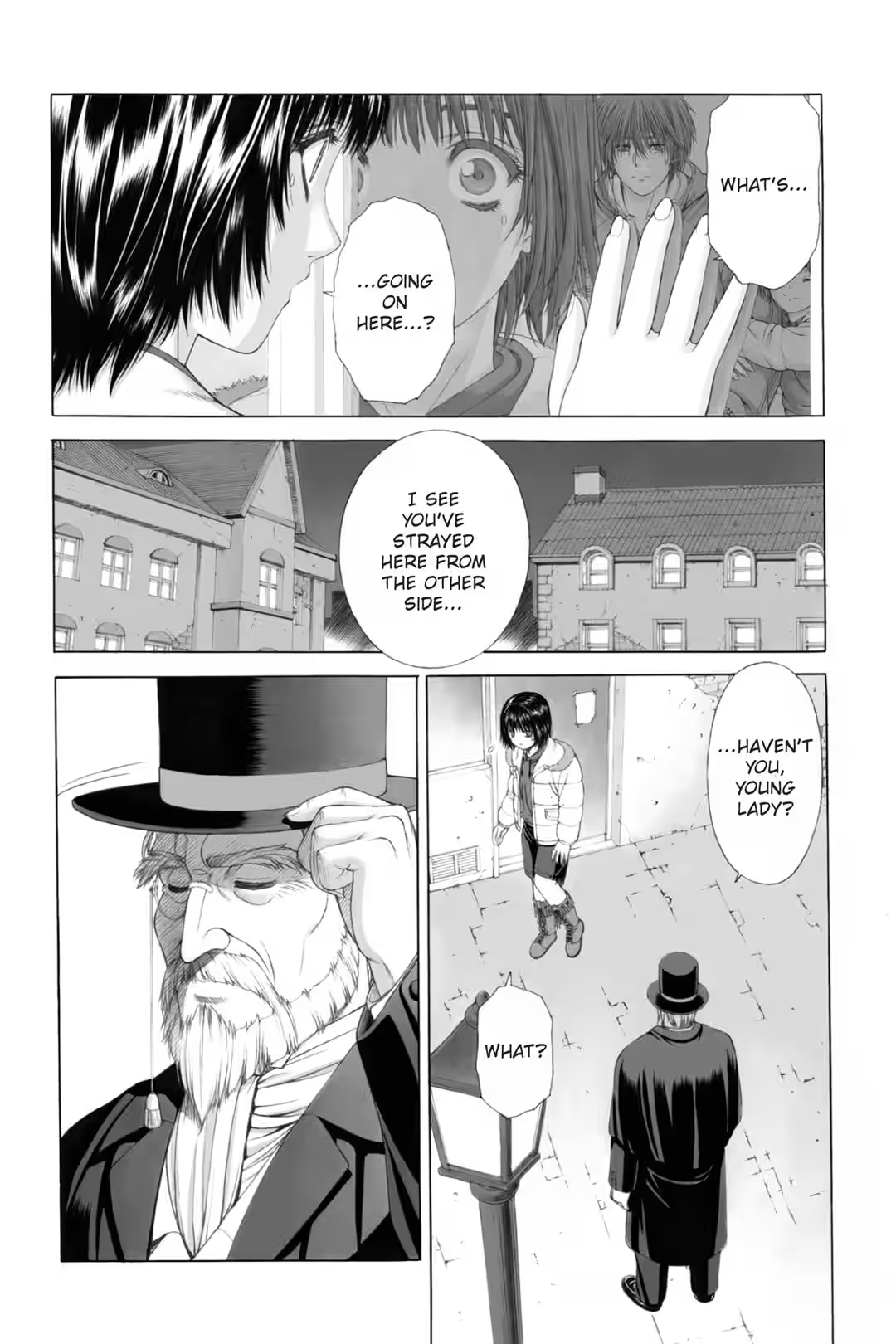
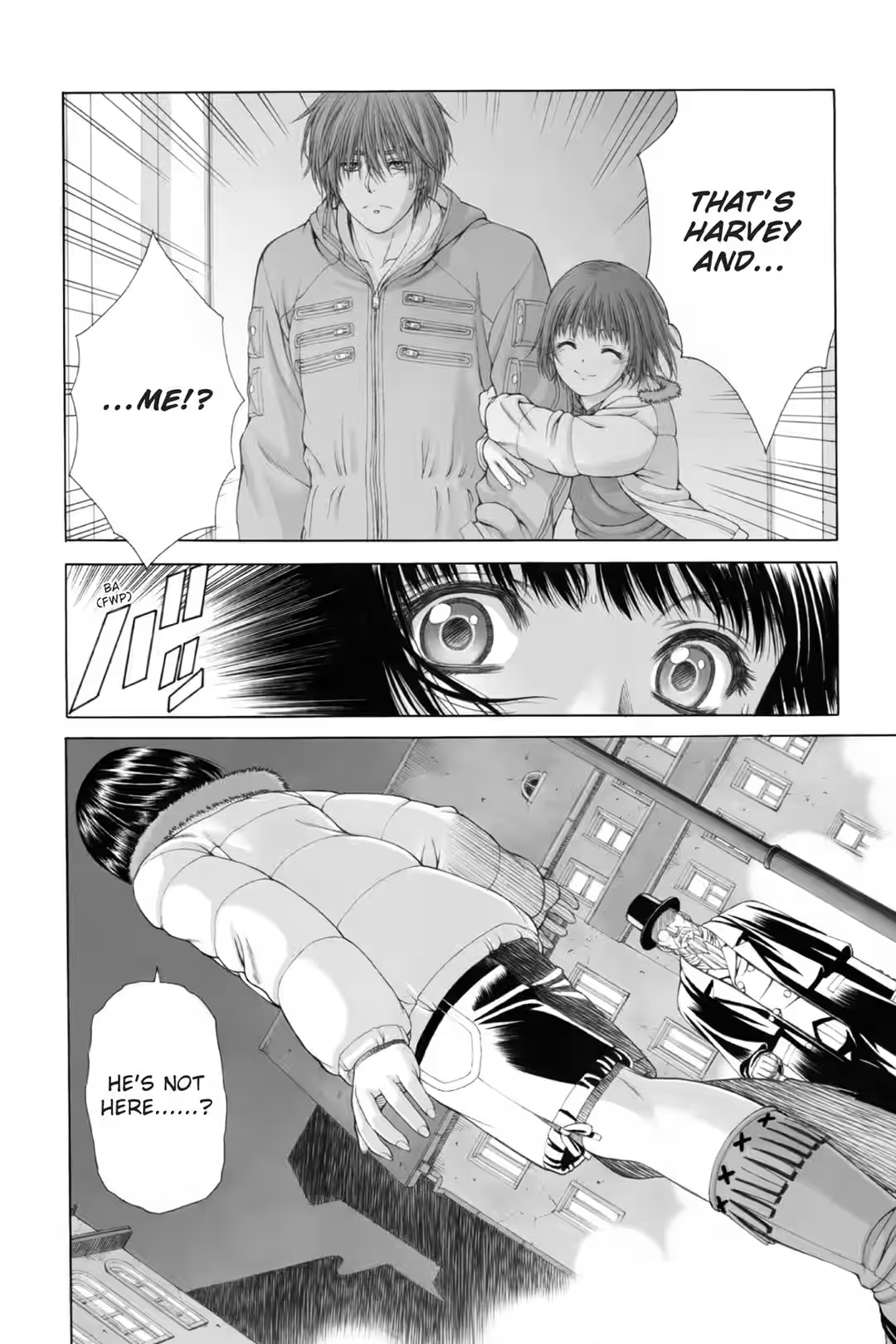
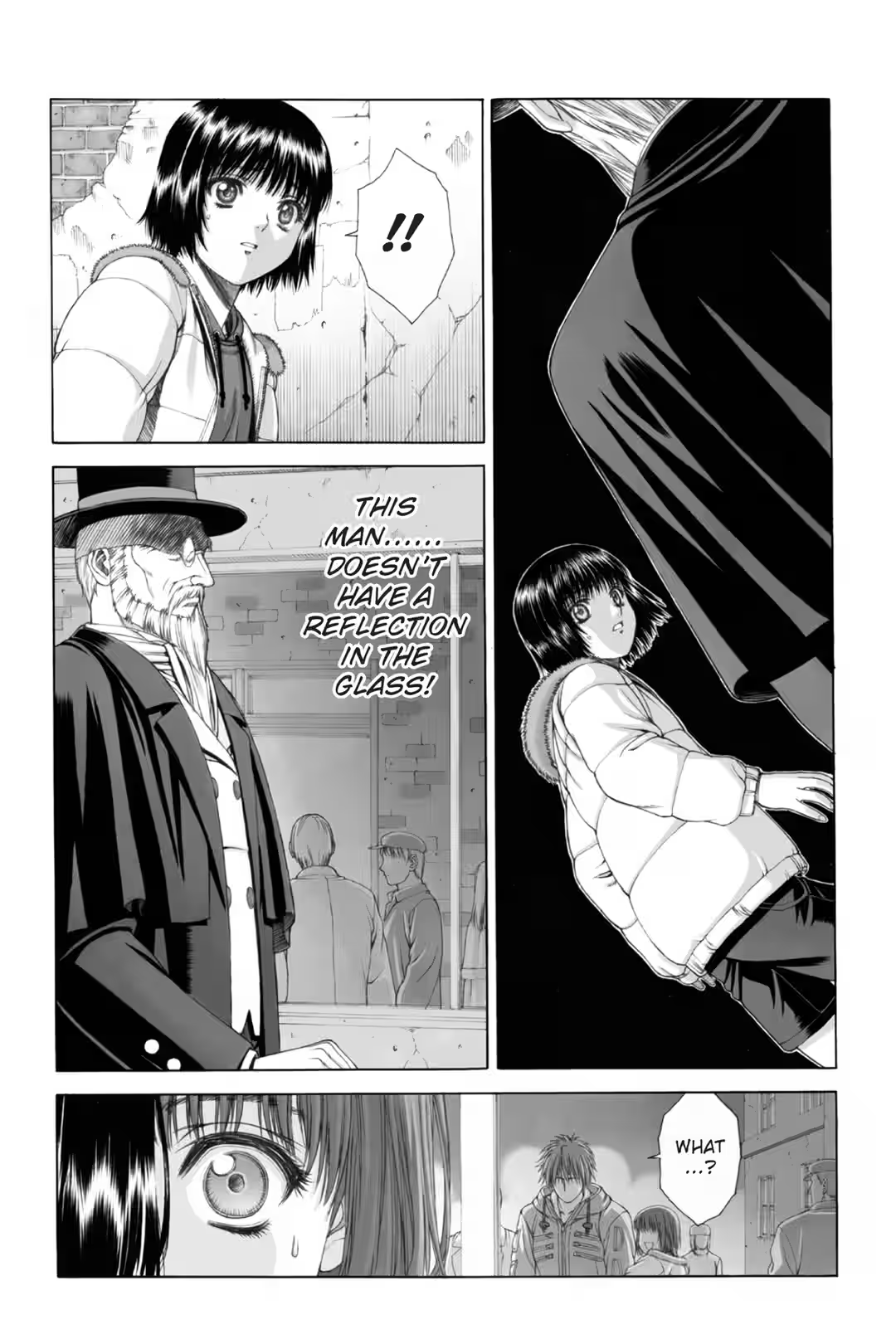
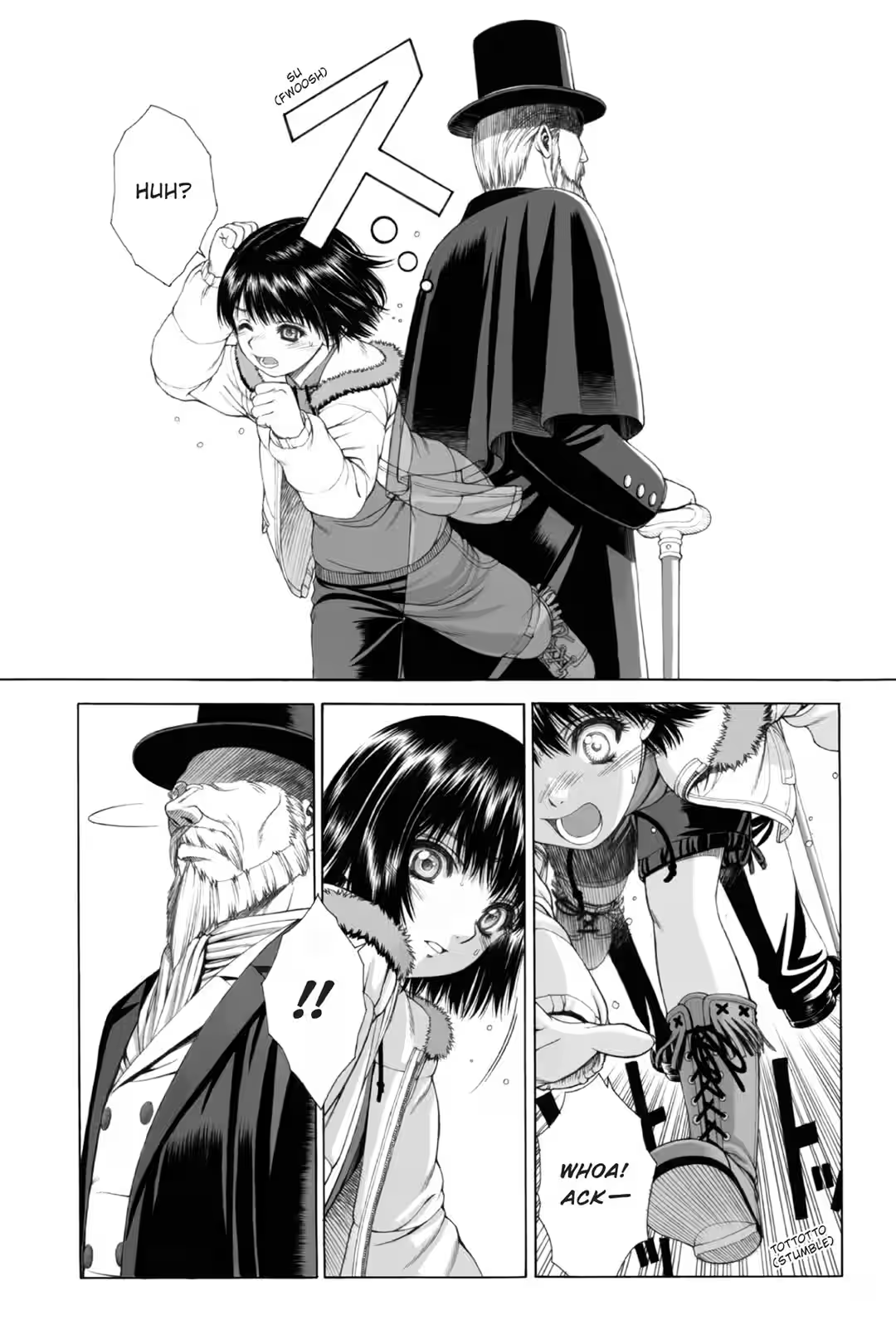
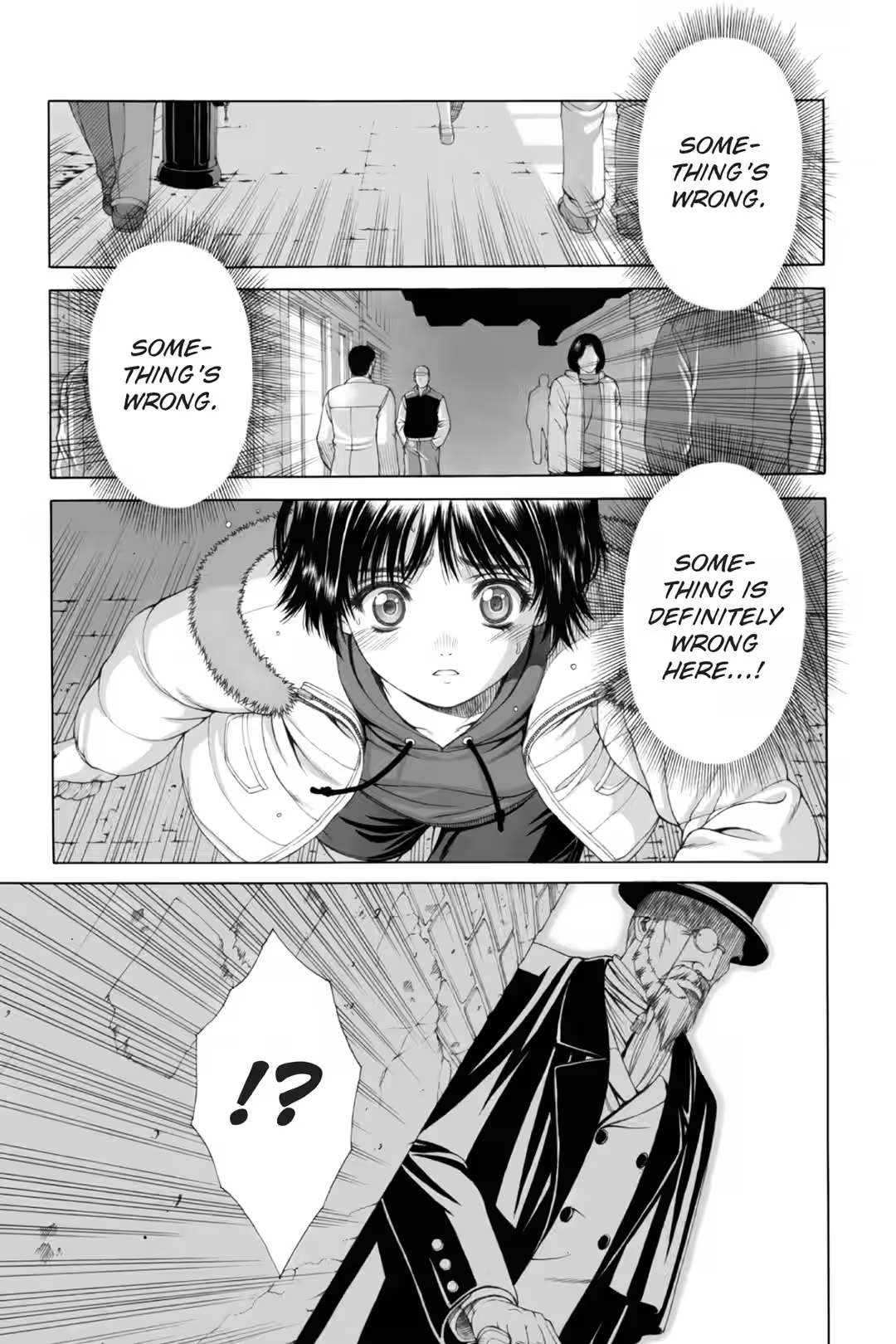
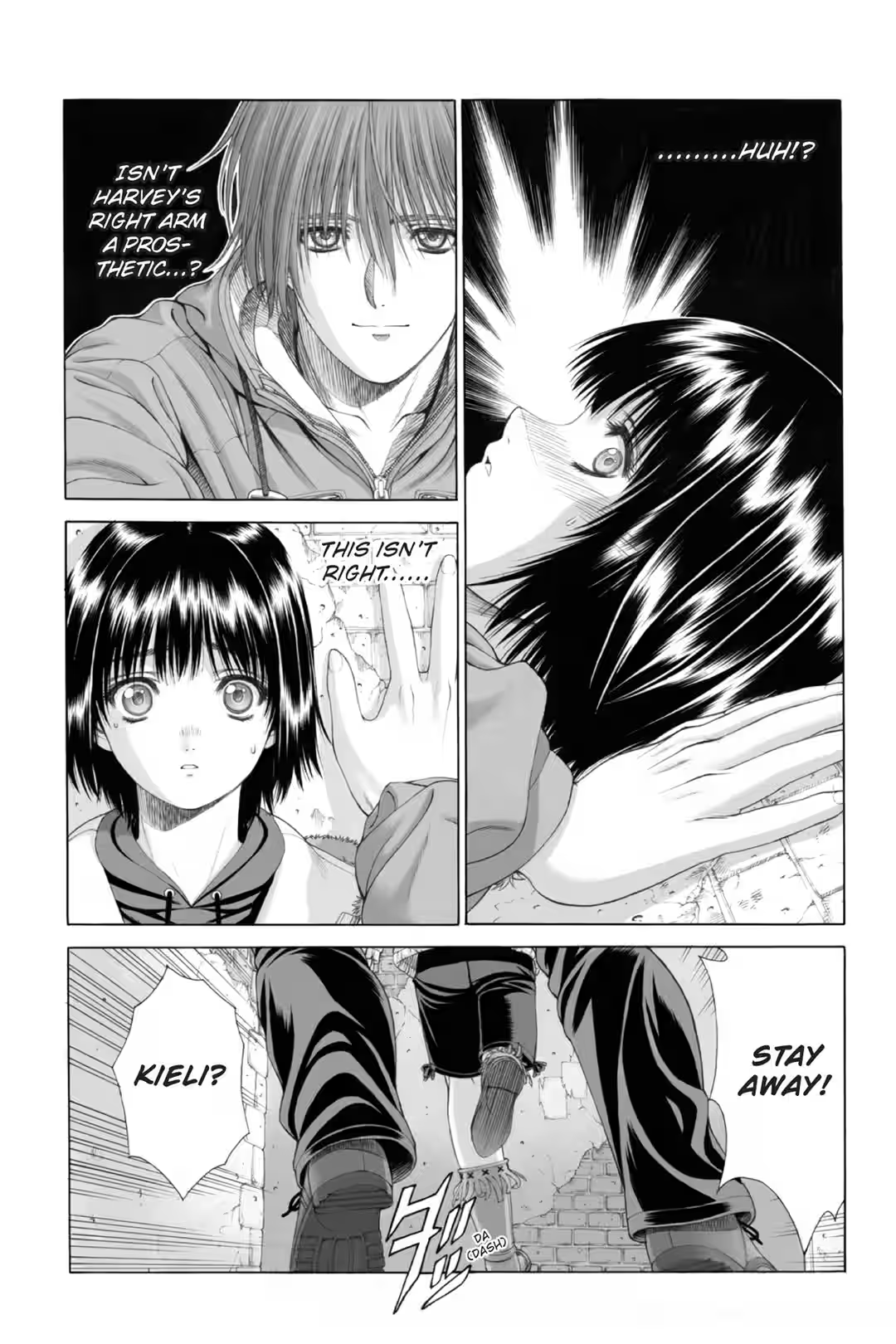
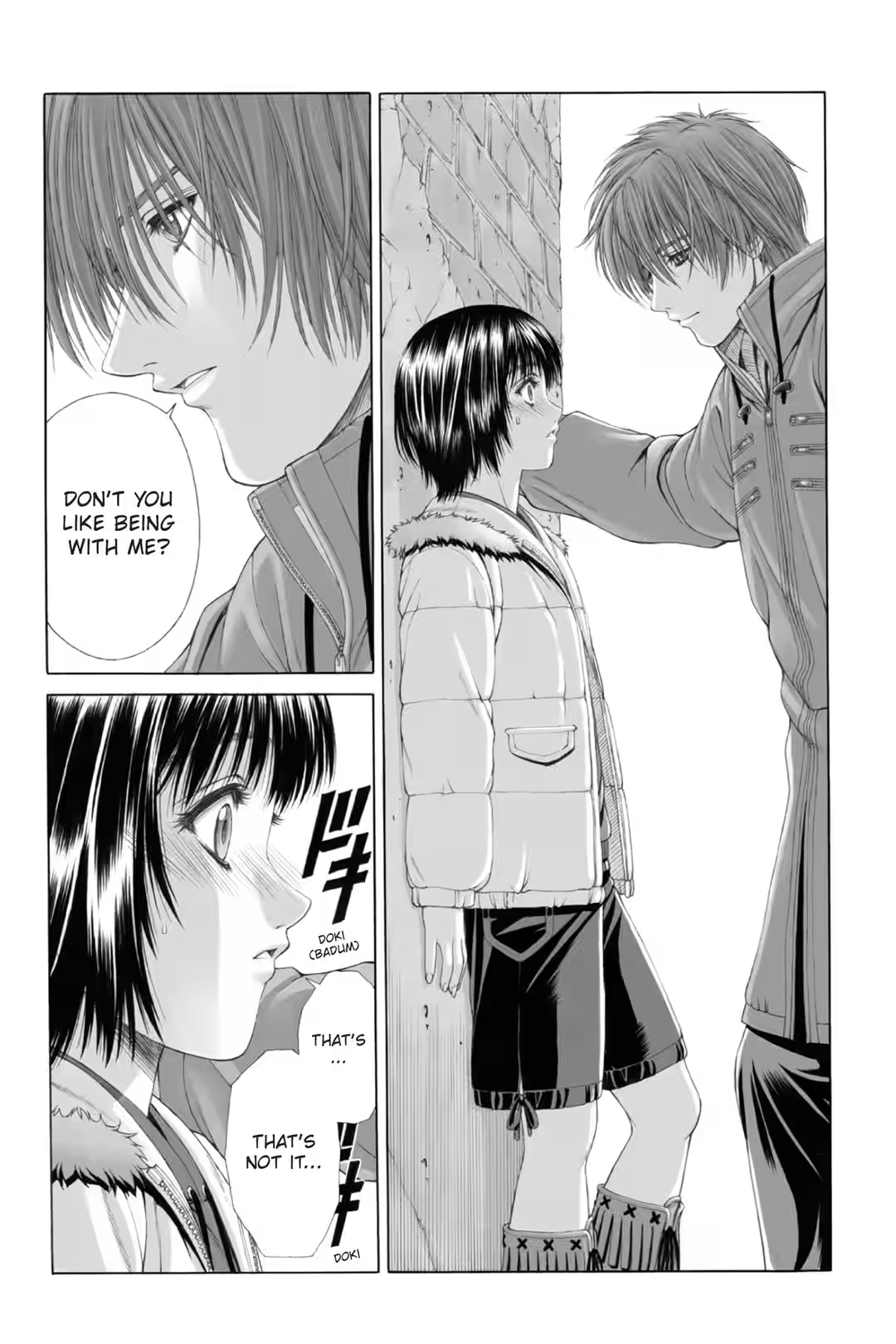
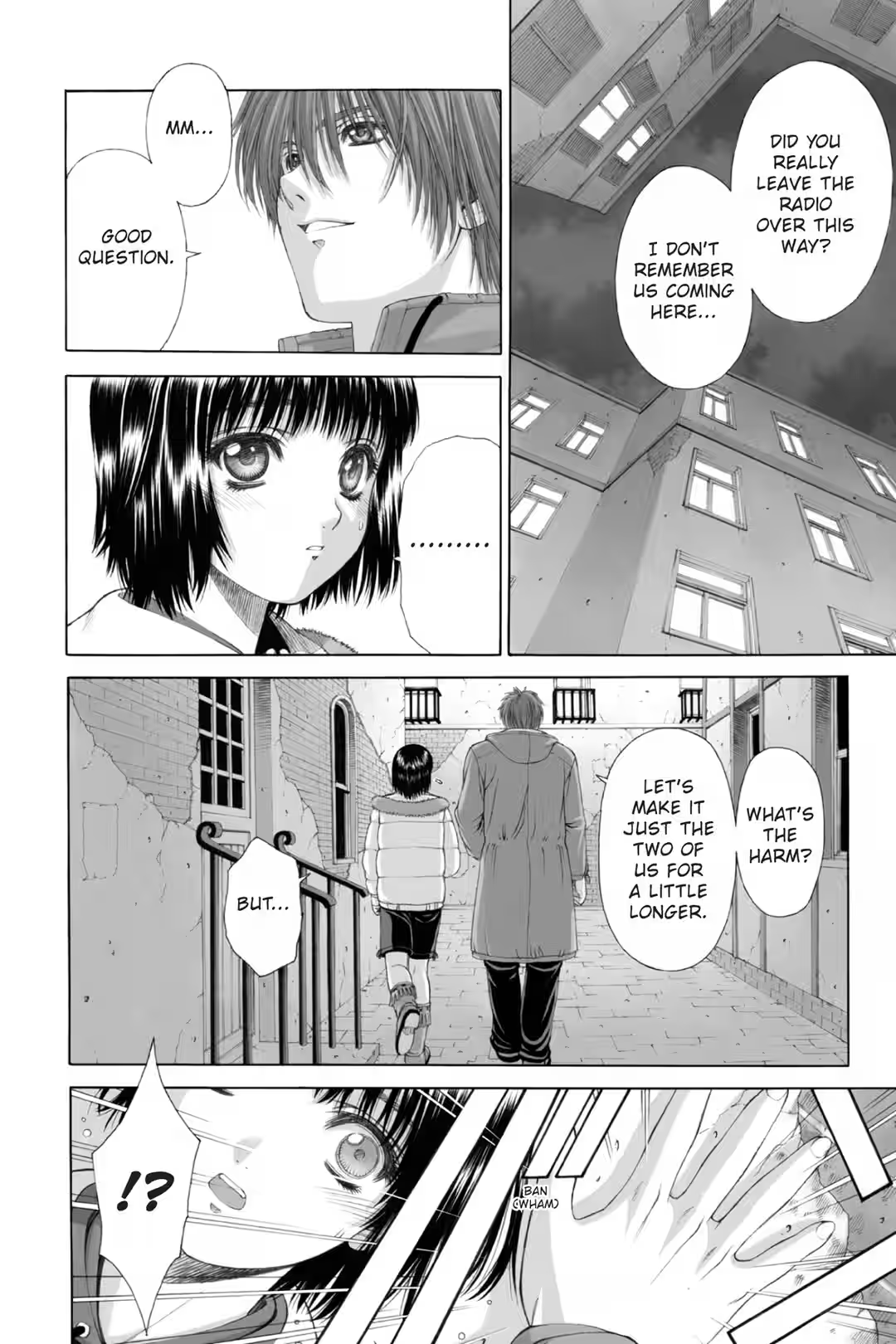
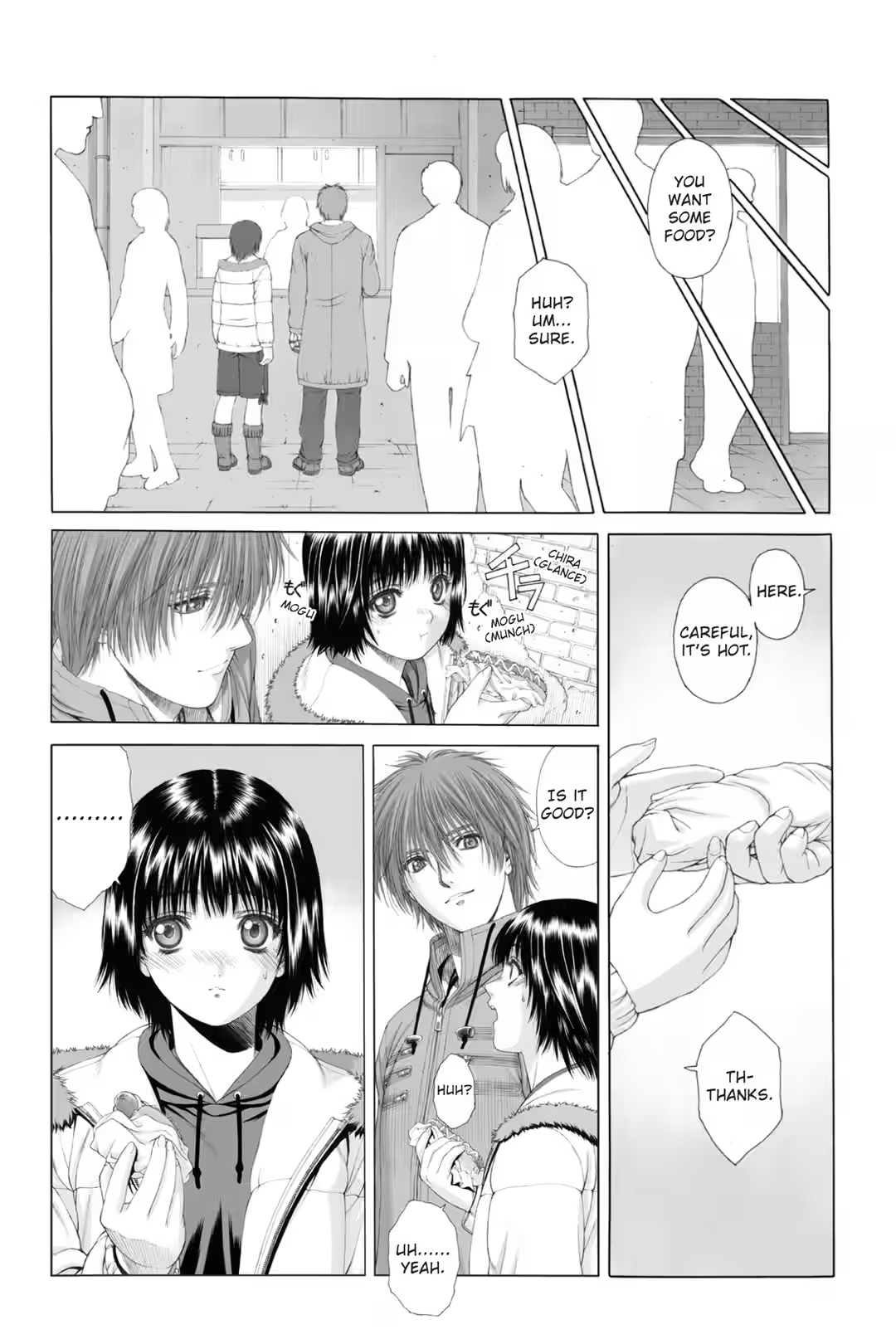
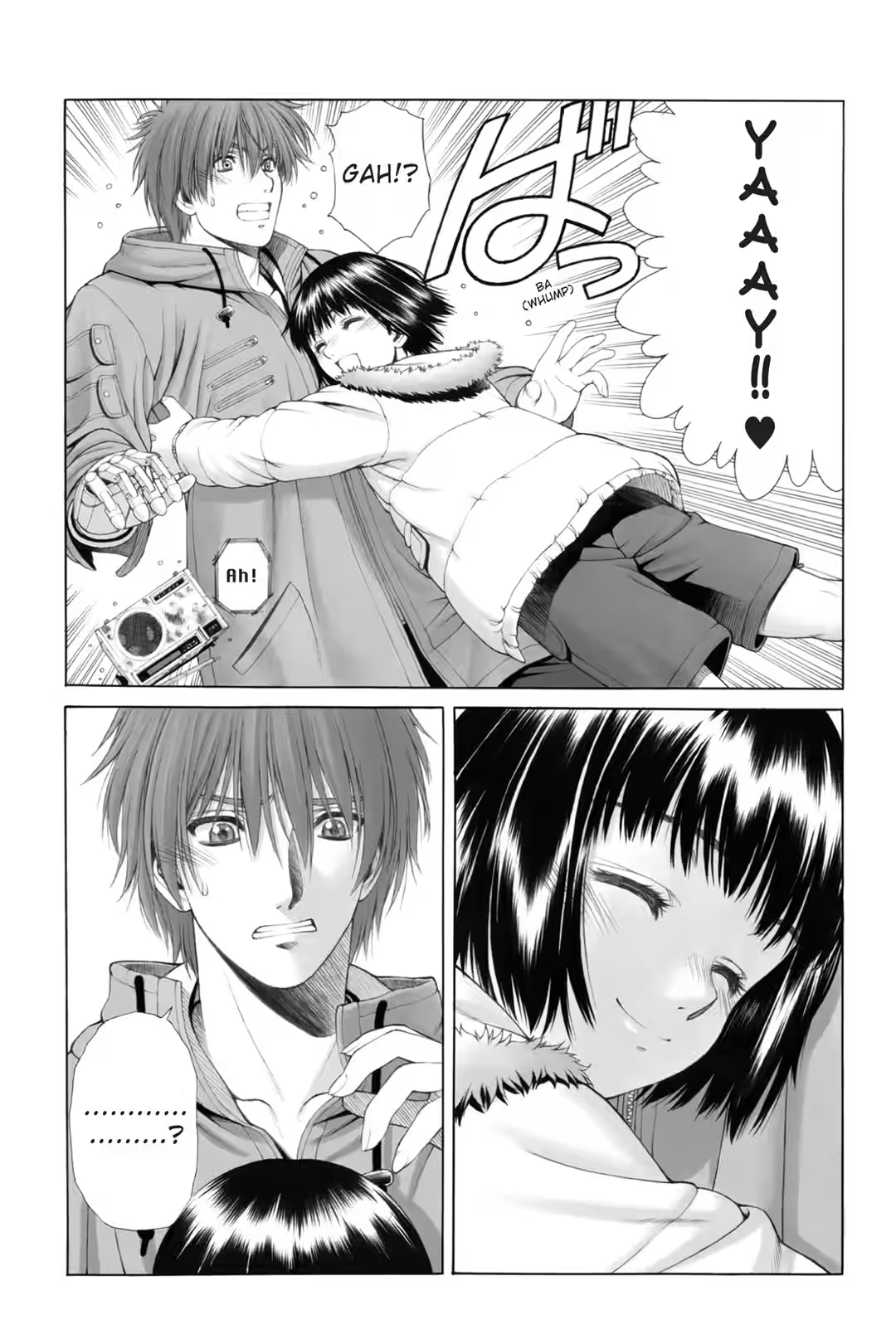
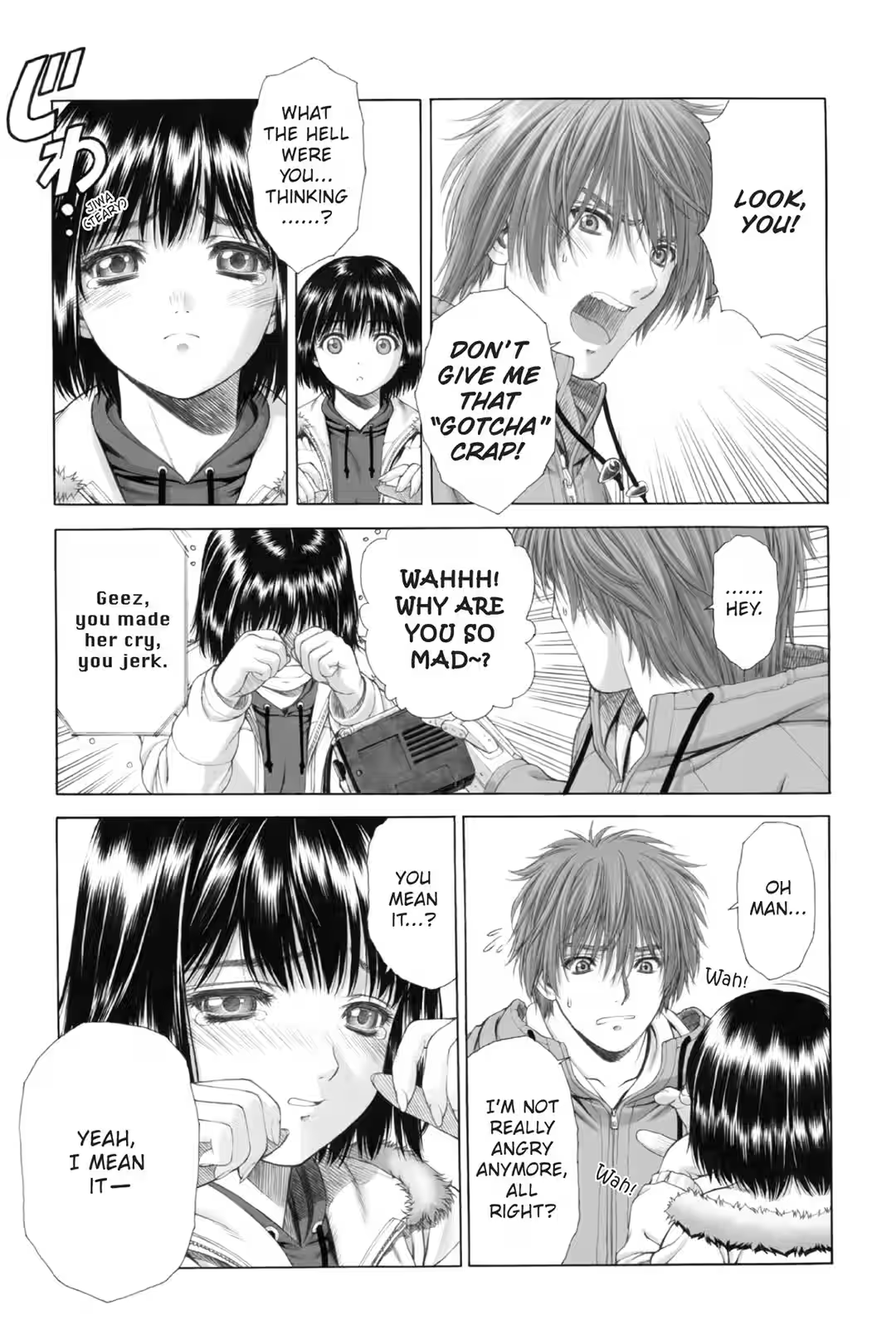
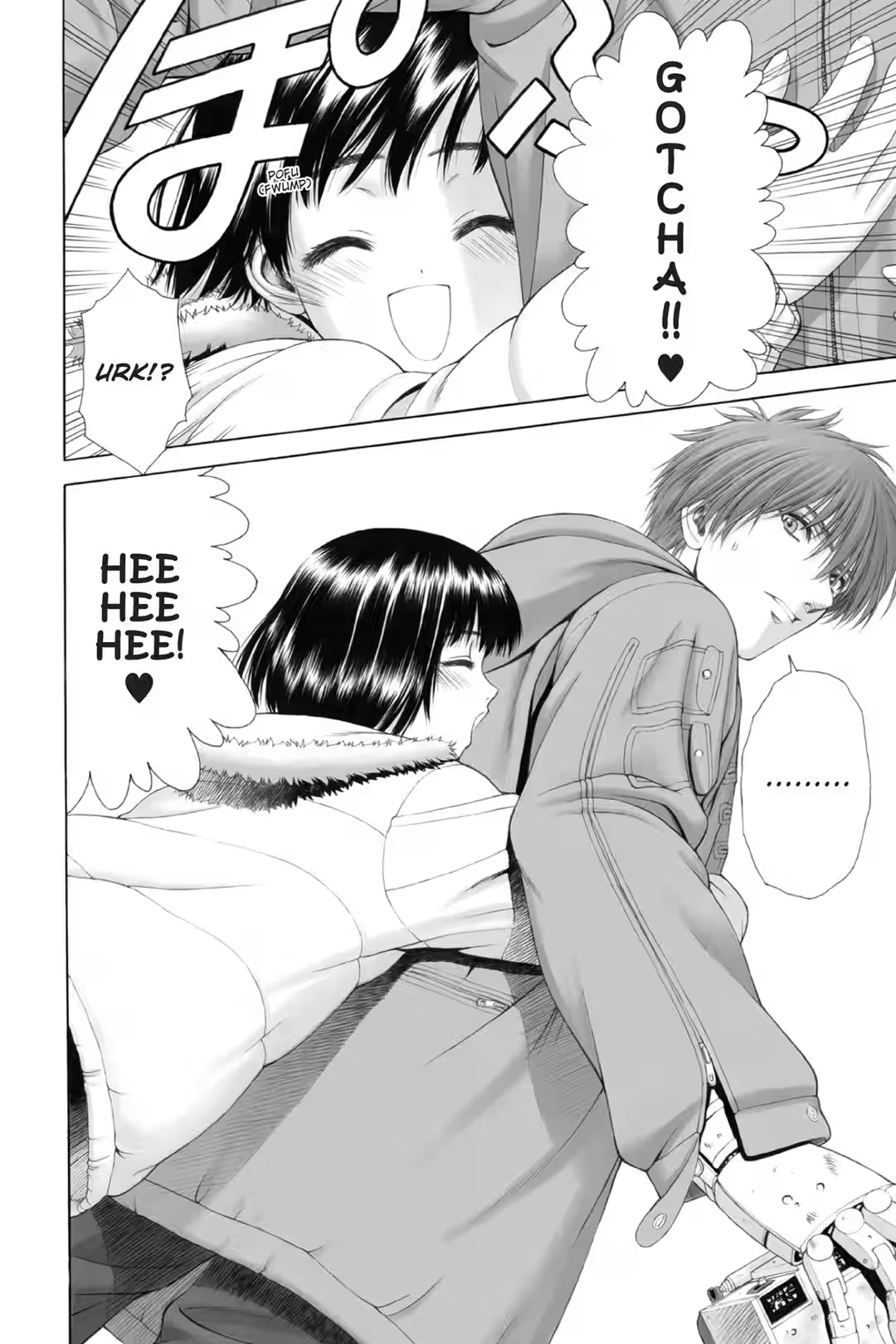
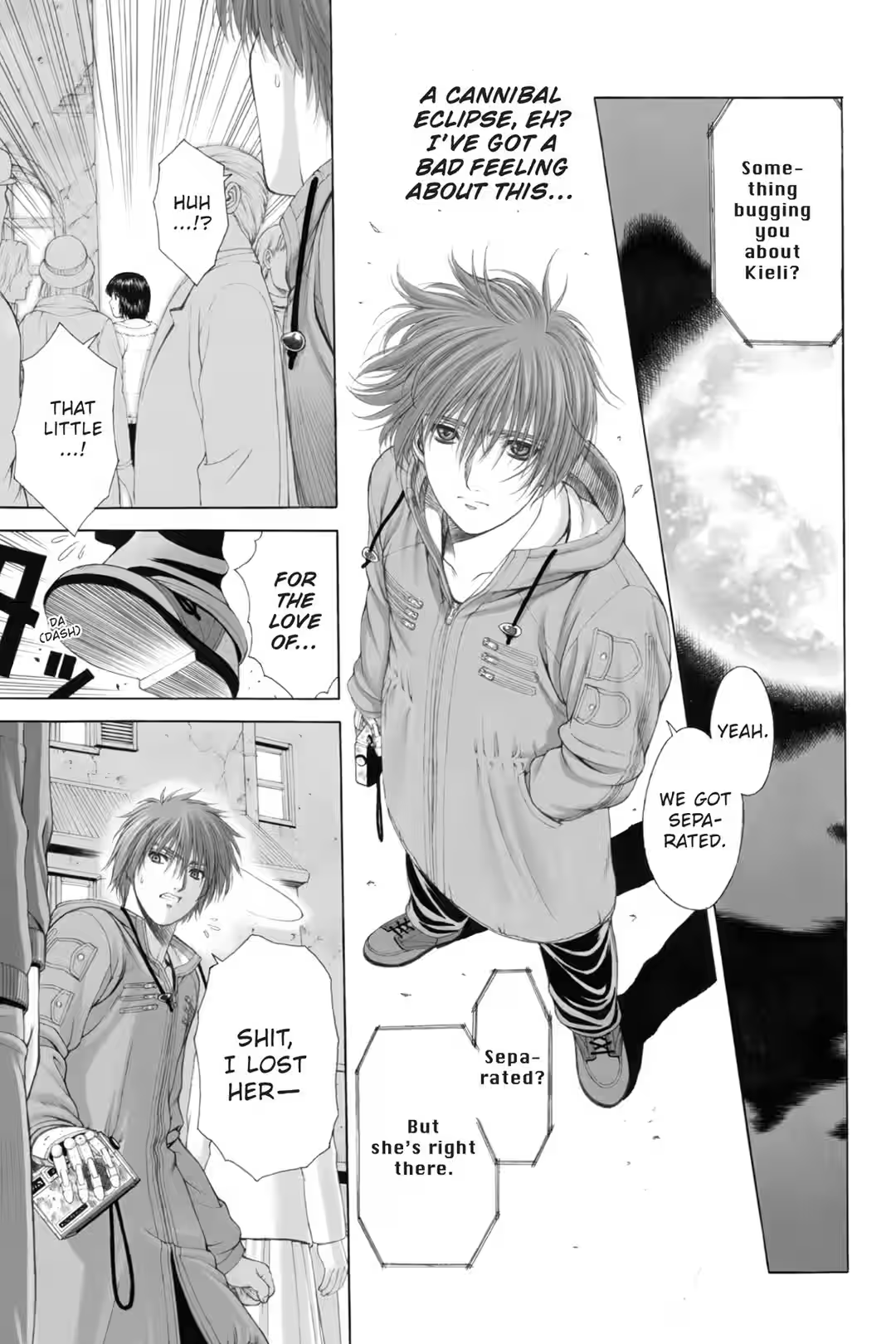
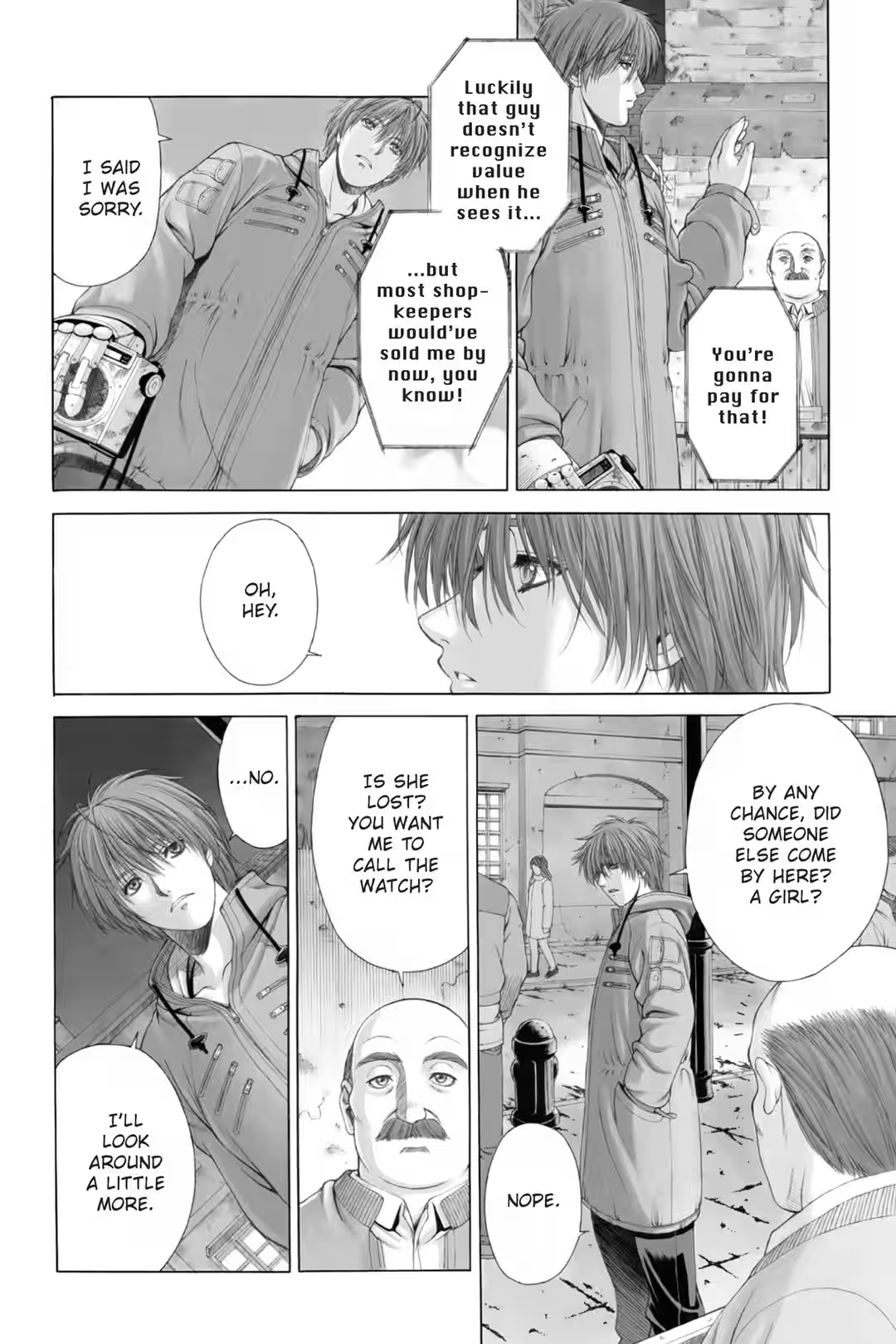
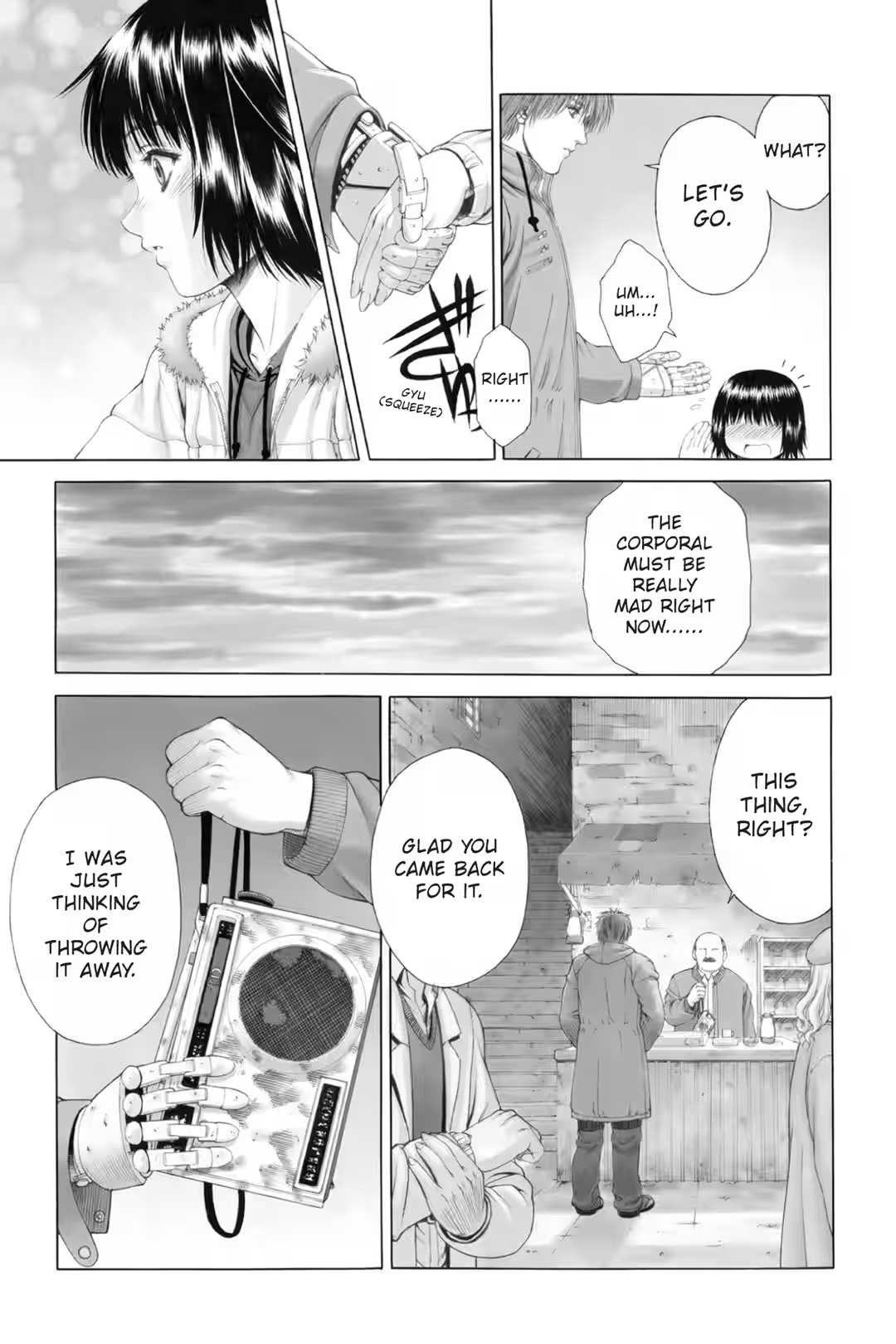
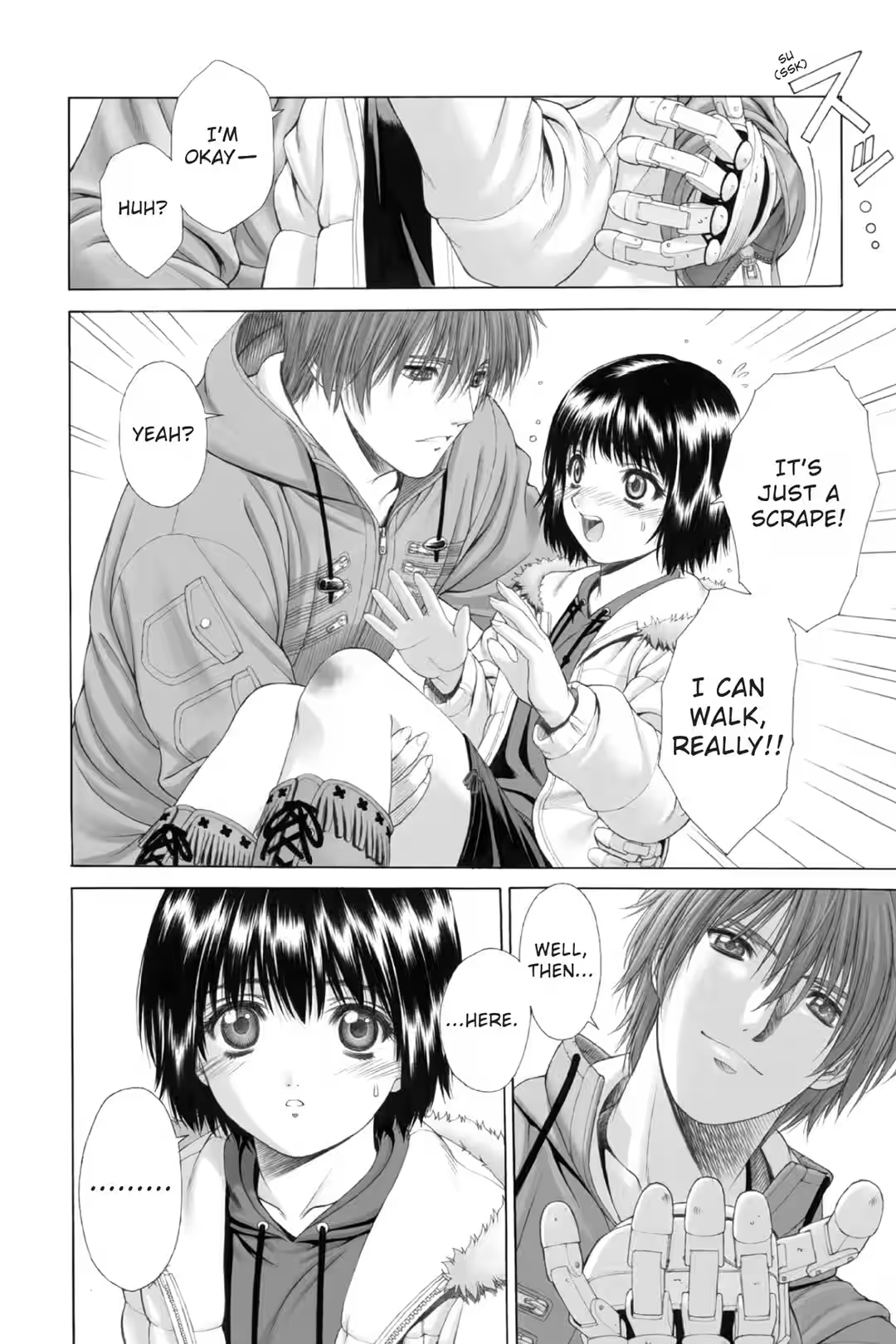
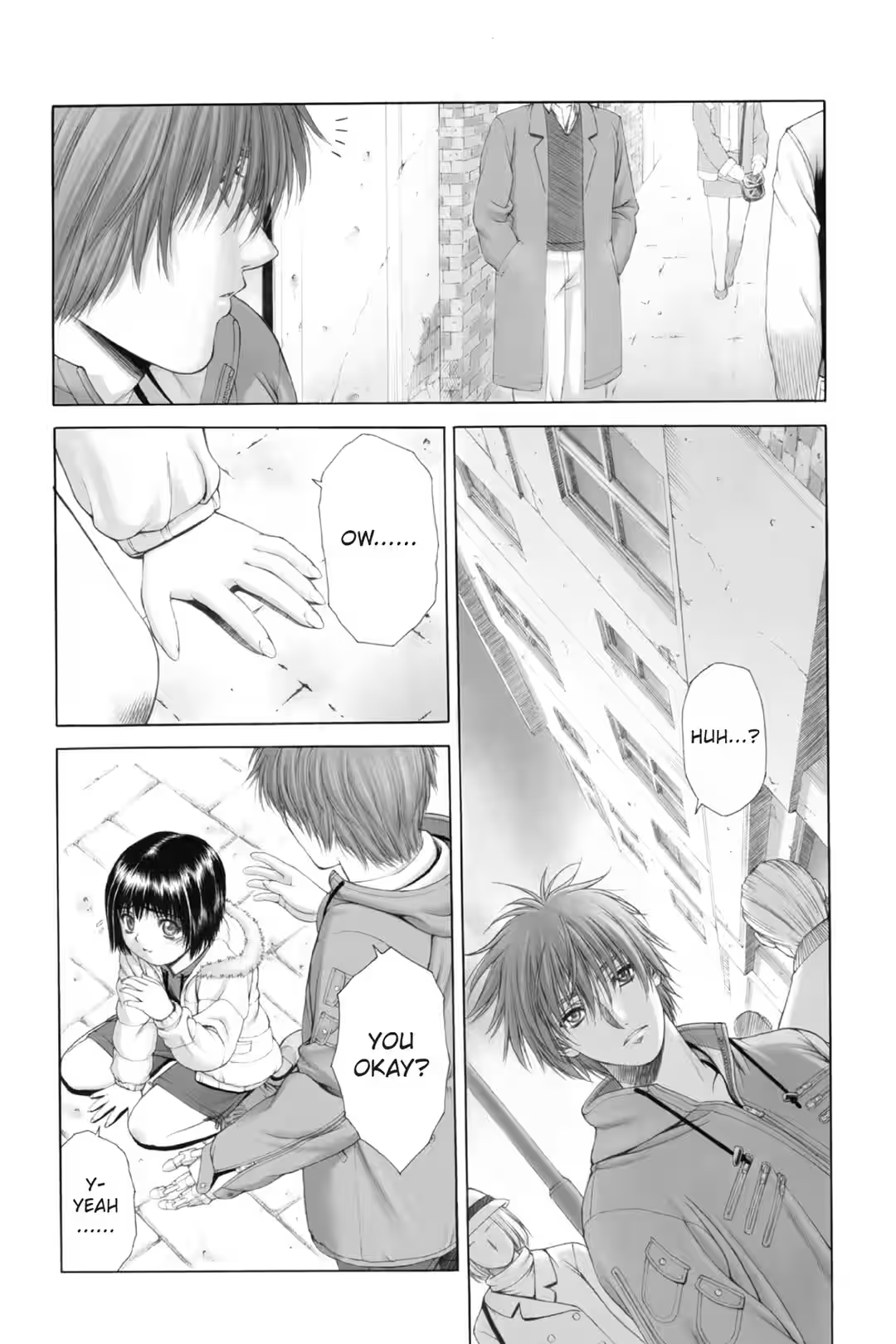
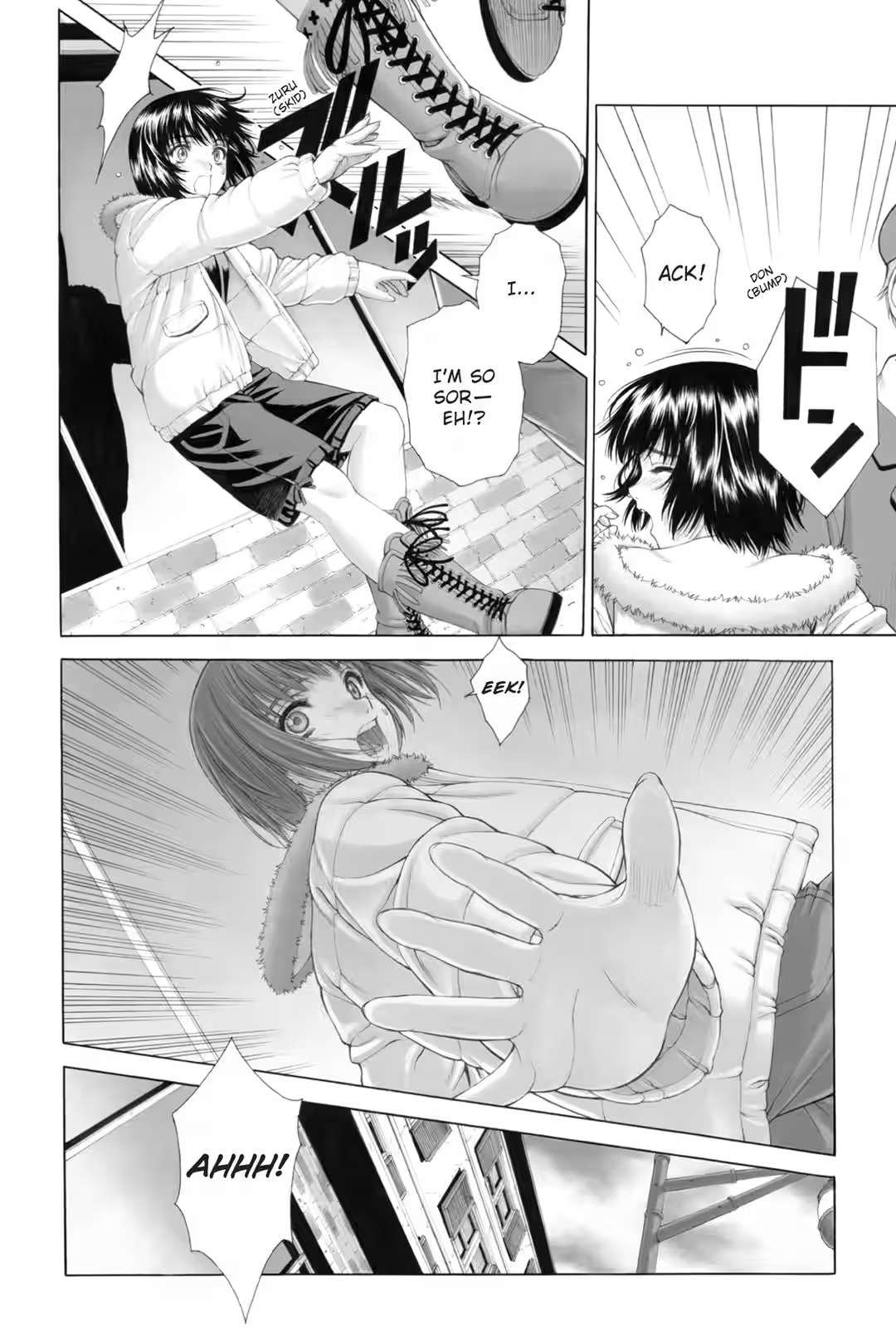
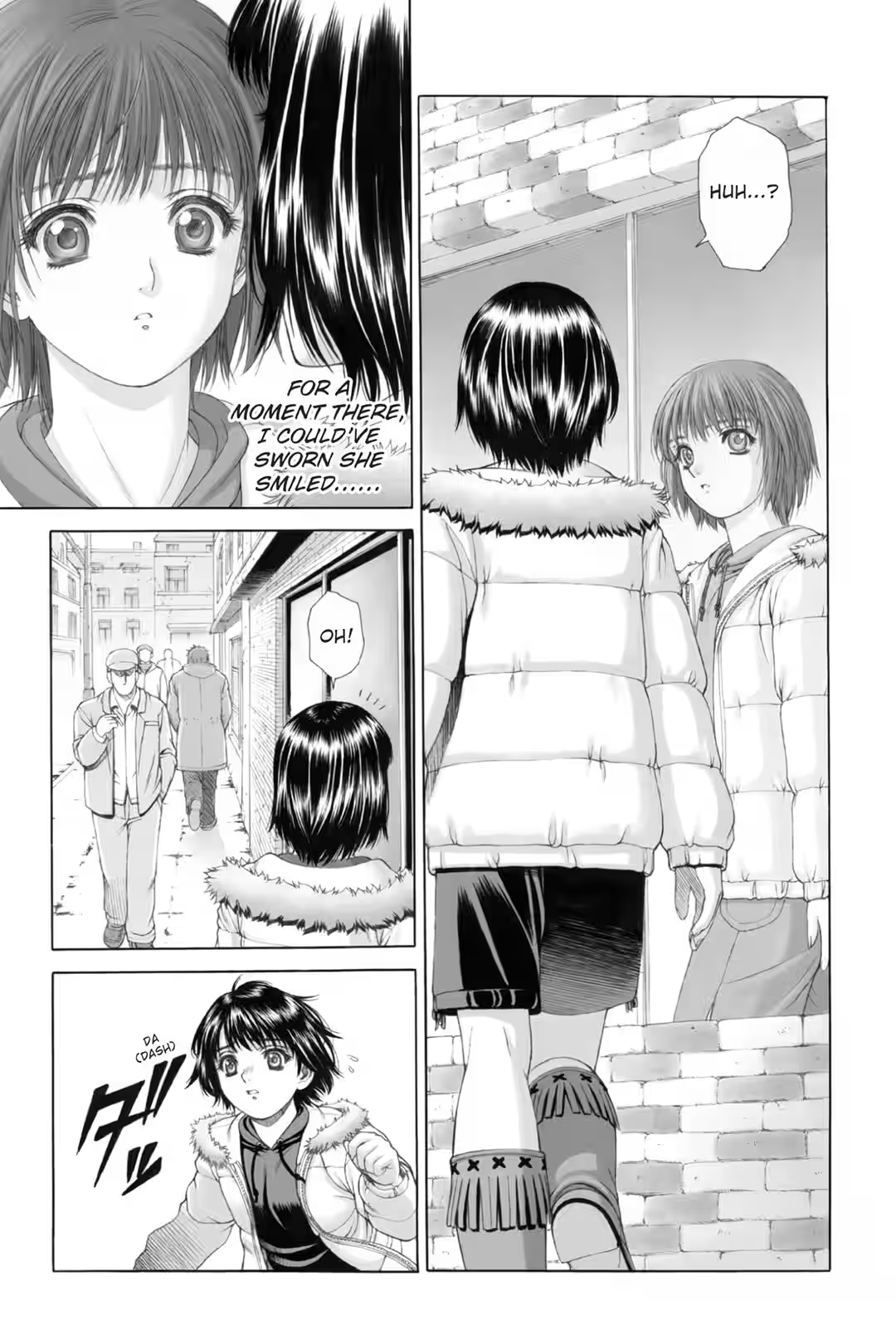
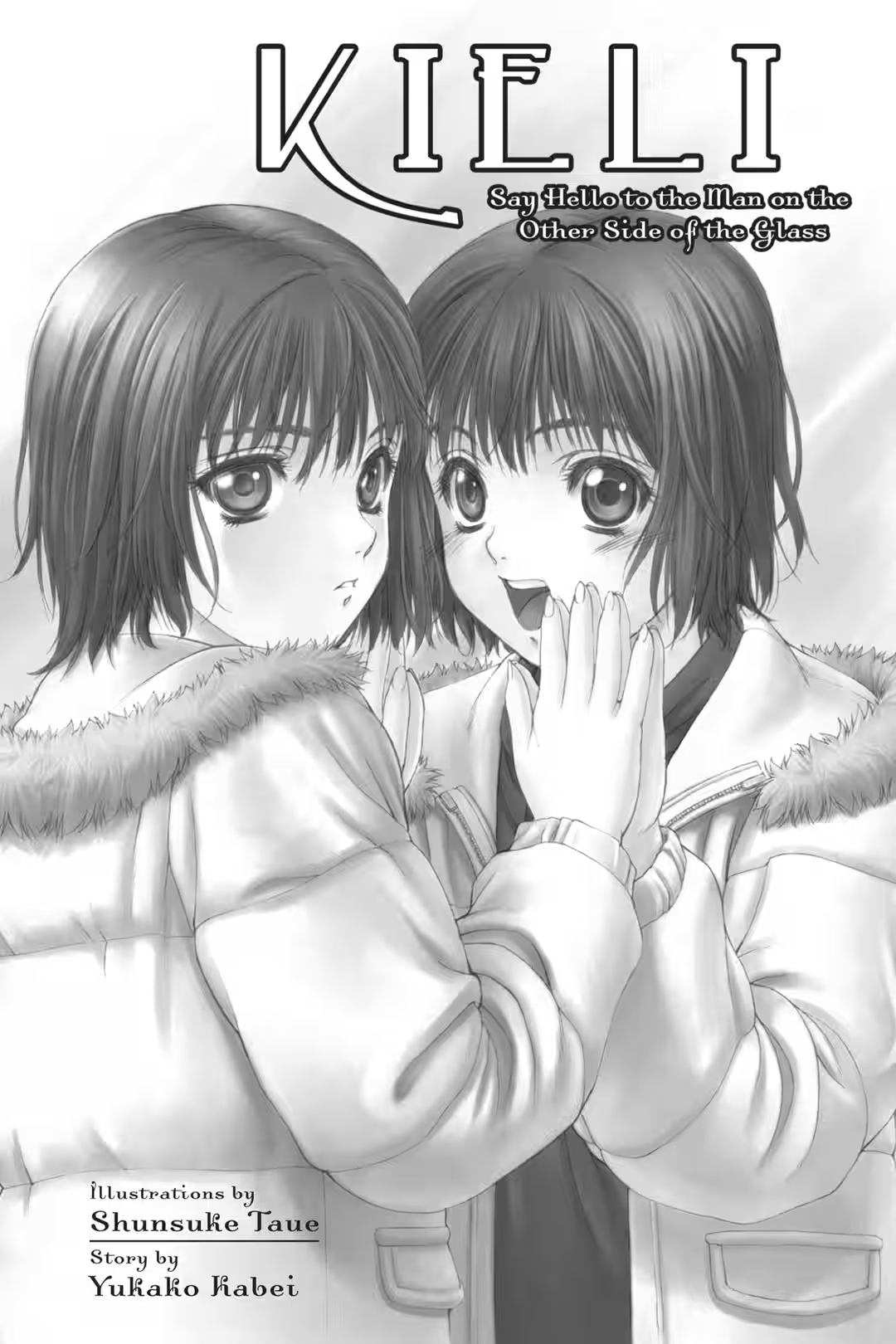
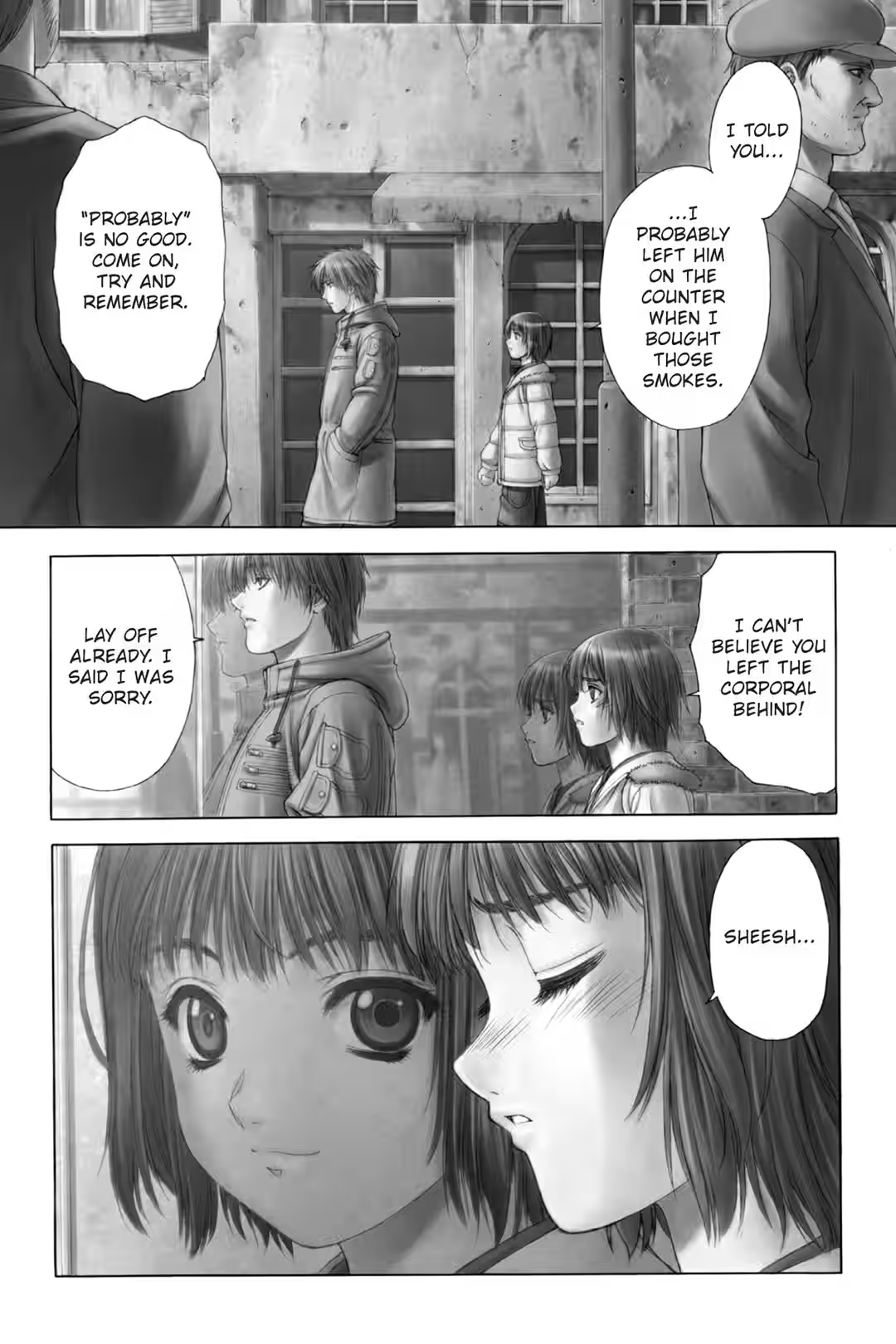
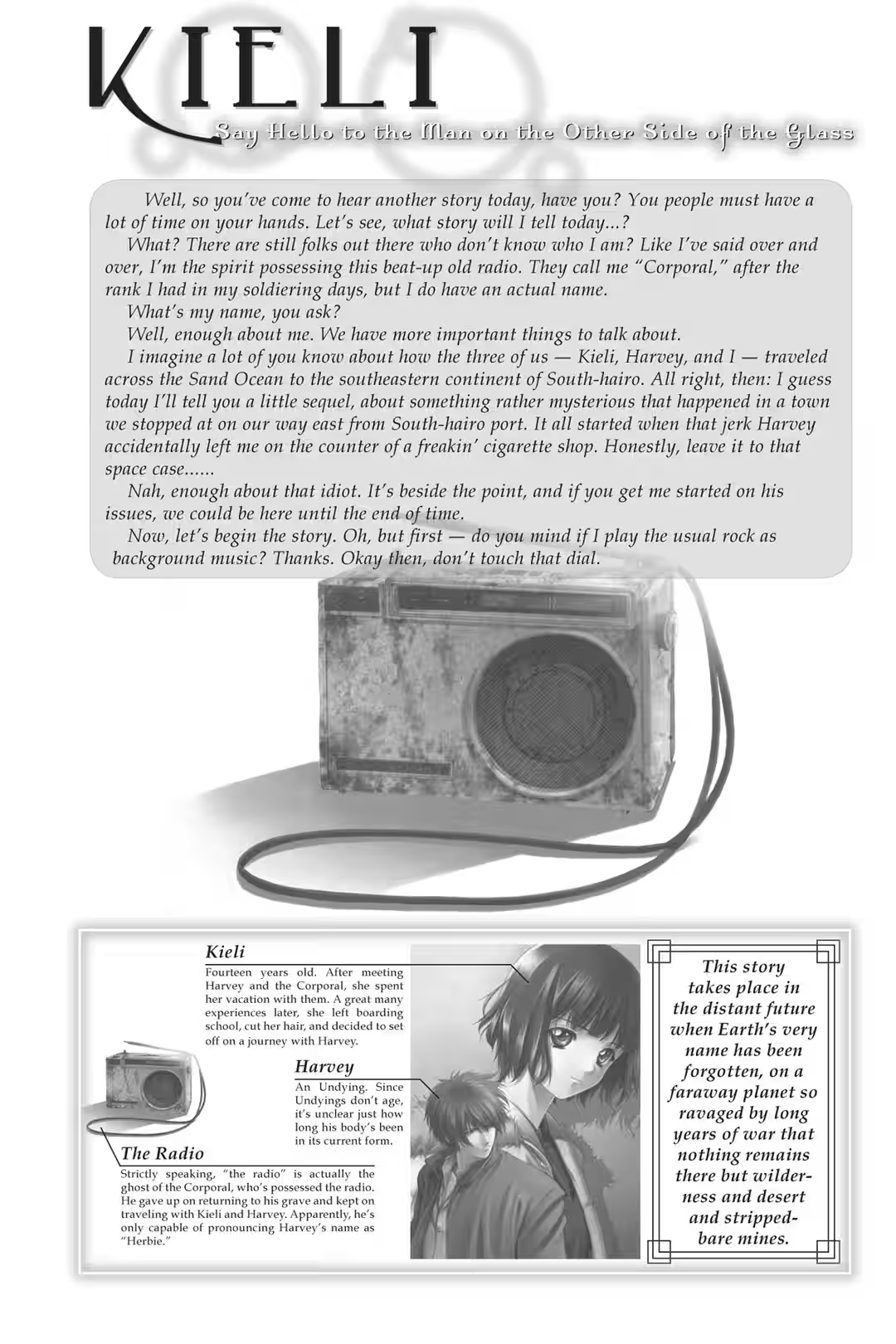
The following manga short originally appeared at the back of the Japanese edition of
KIELI: The Sunlit Garden Where It Began (Part 2).
Yen Press is pleased to present this bonus material in our English language translation of the novel. You should begin reading the manga here, as it has been paginated in such a way so as to preserve the original right-to-left read order of the manga.